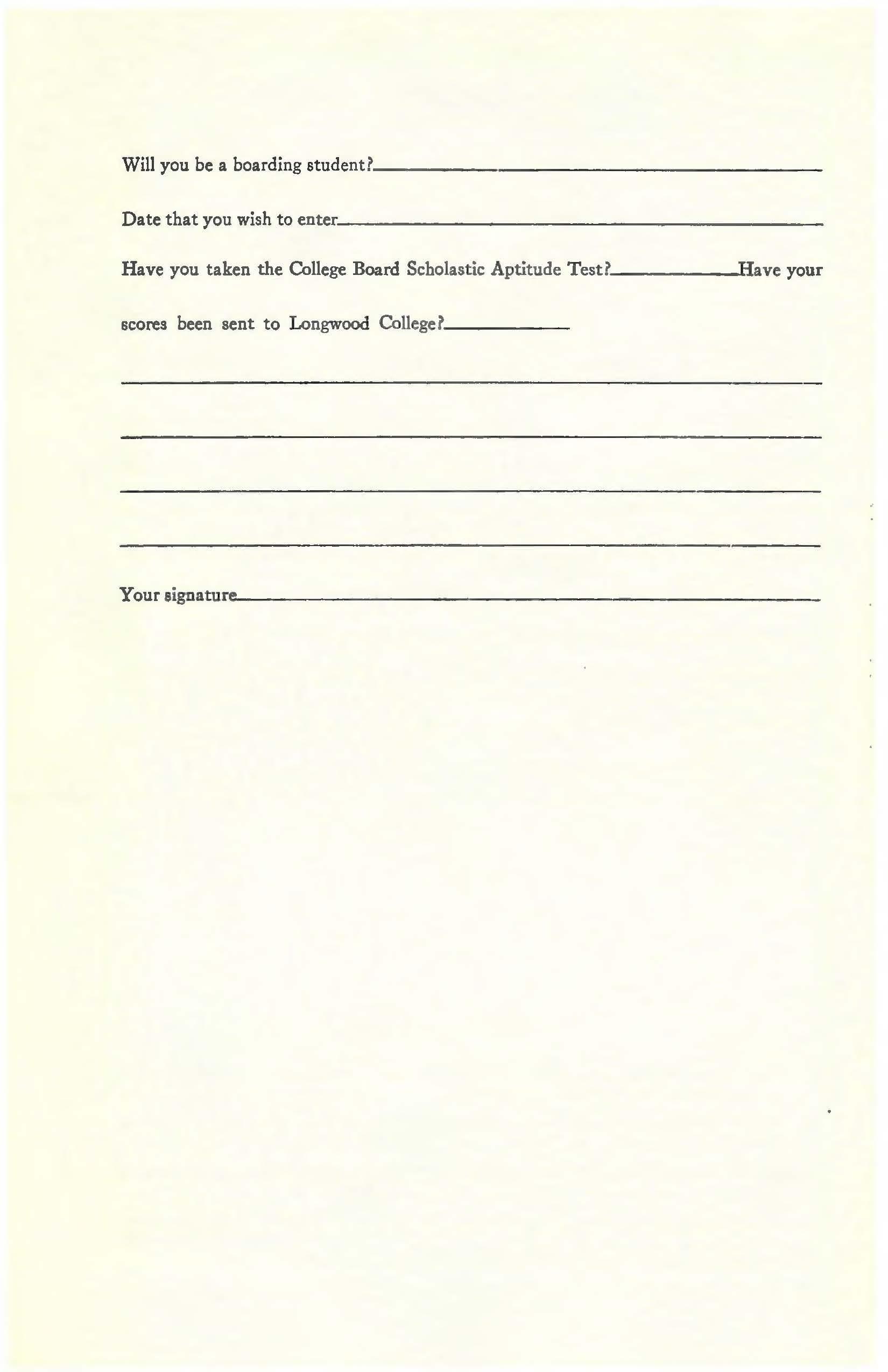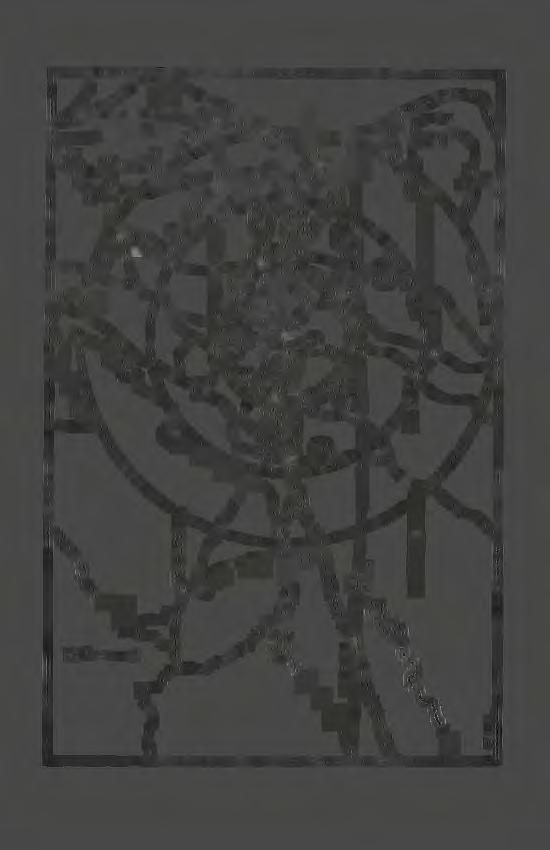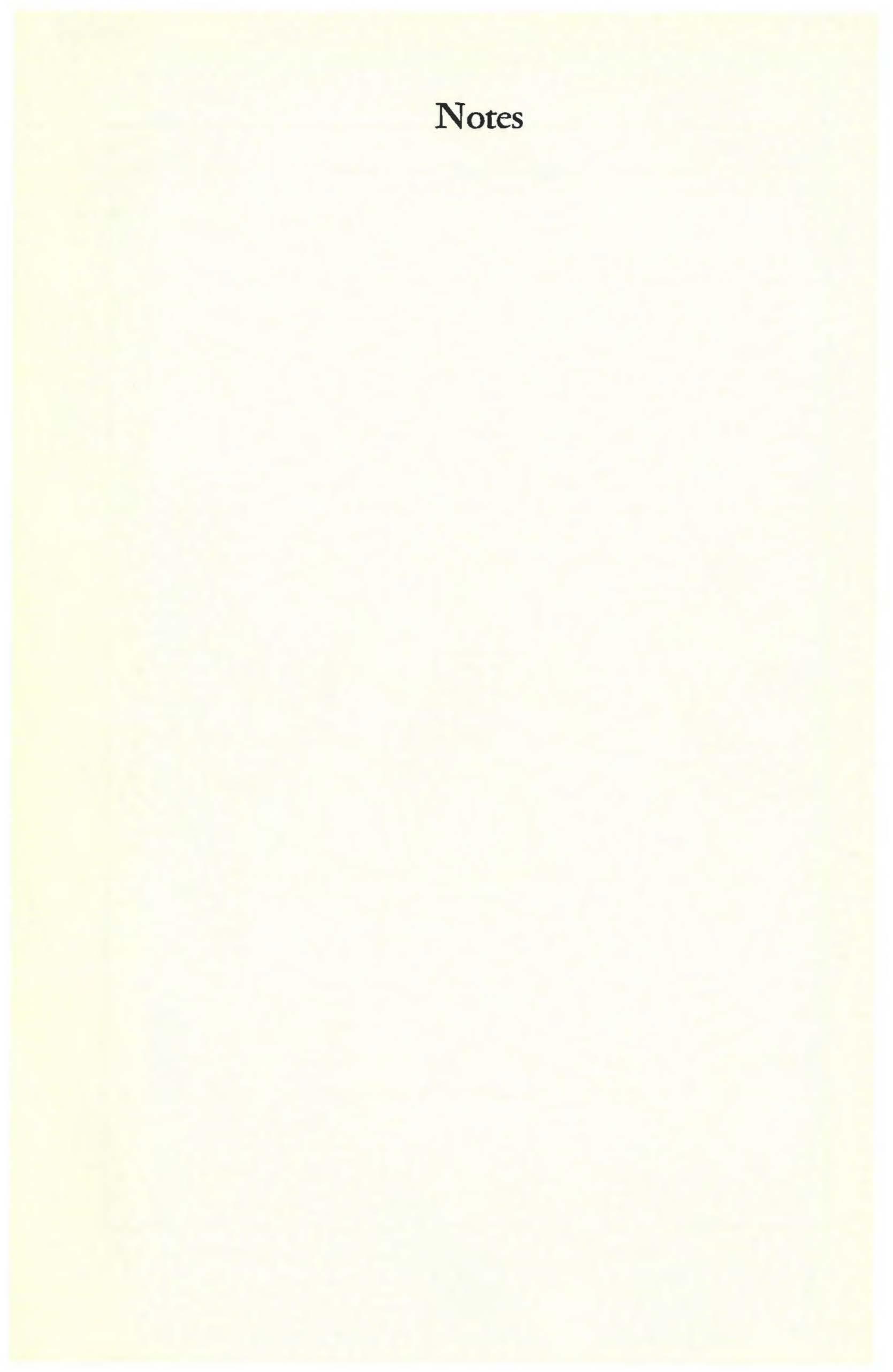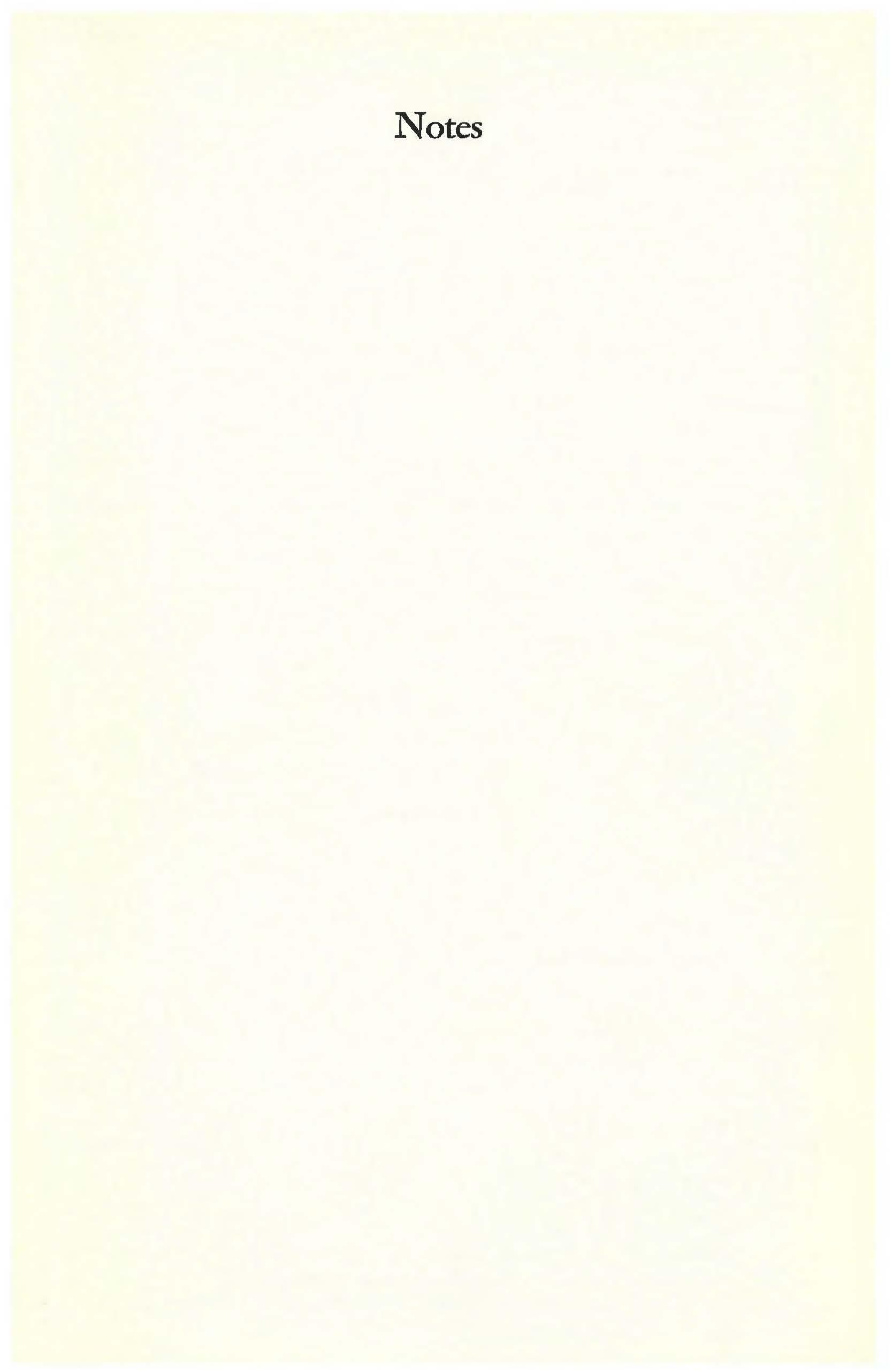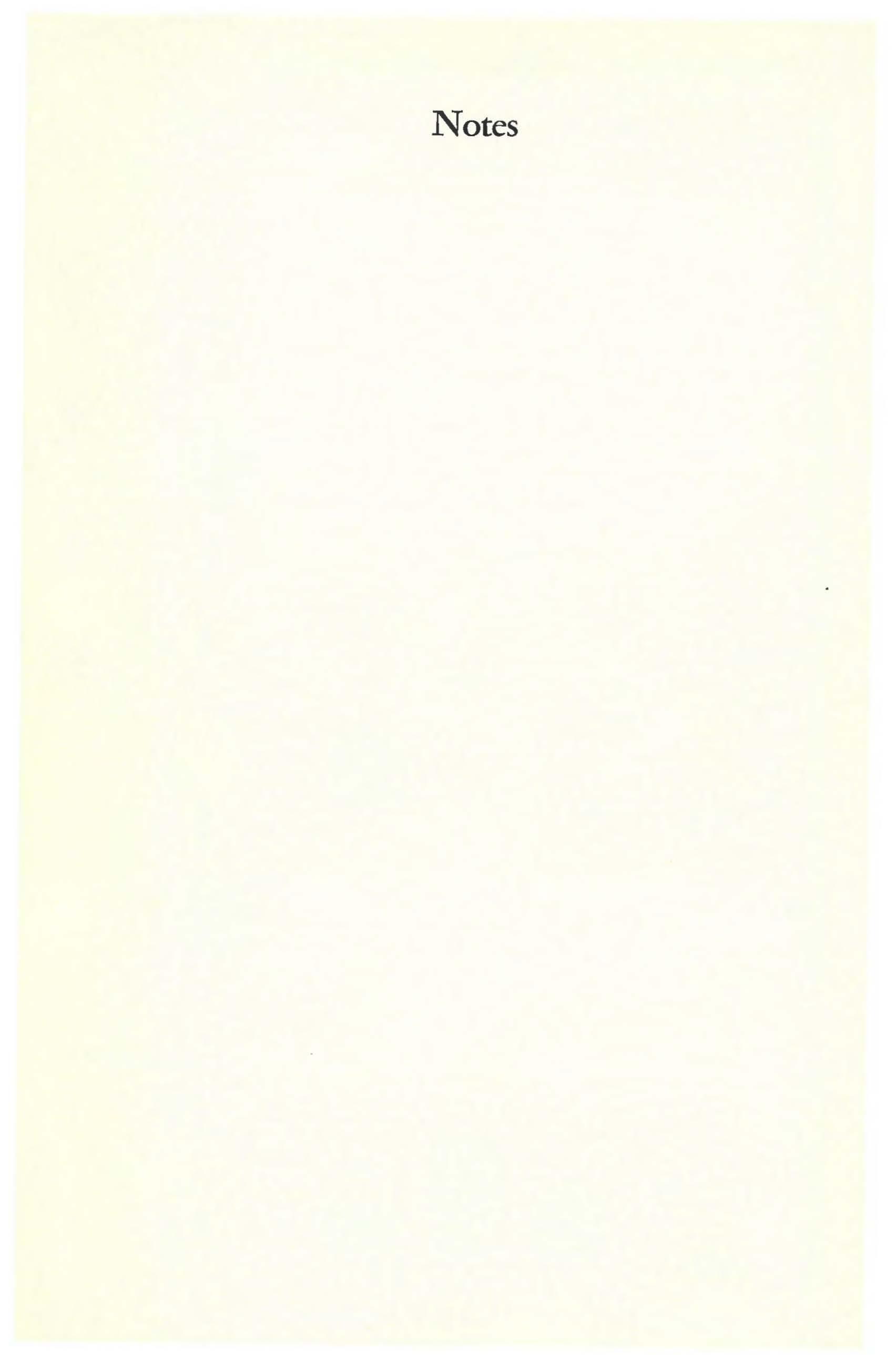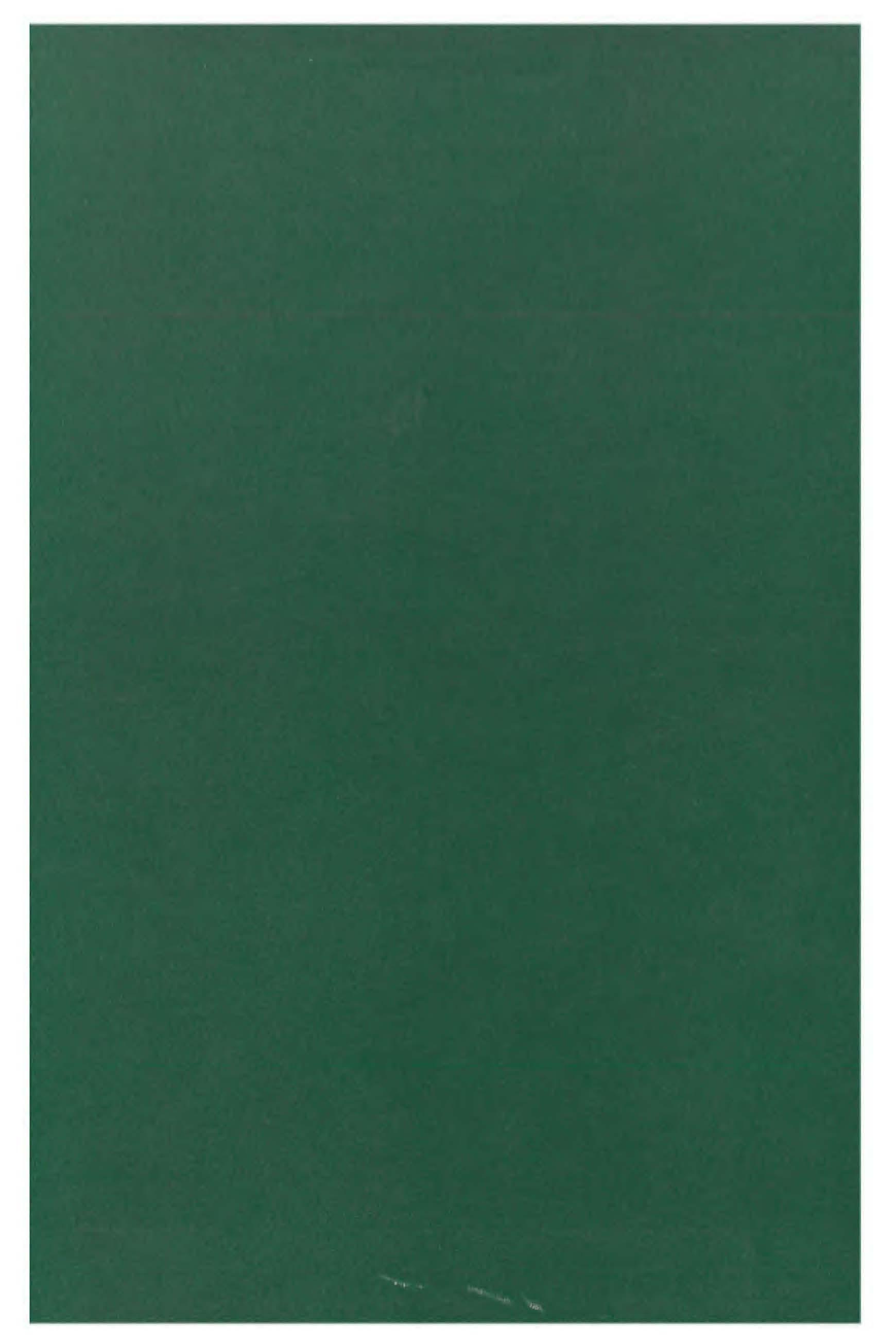




Announcements, Session 1962-63
Virginia 's First State College for Women
Accredited by: Southern Association of Colleges and Secondary Schools, National Council for Accreditation of Teacher Education, Virginia State Board of Education.
Seventy-ninth session begins September 16, 1962 NUMBER
Published quarterly by Longwood College, Farmville, Va. Second class mailing privilege authorized at Farmville, Va.
APRIL , 1962
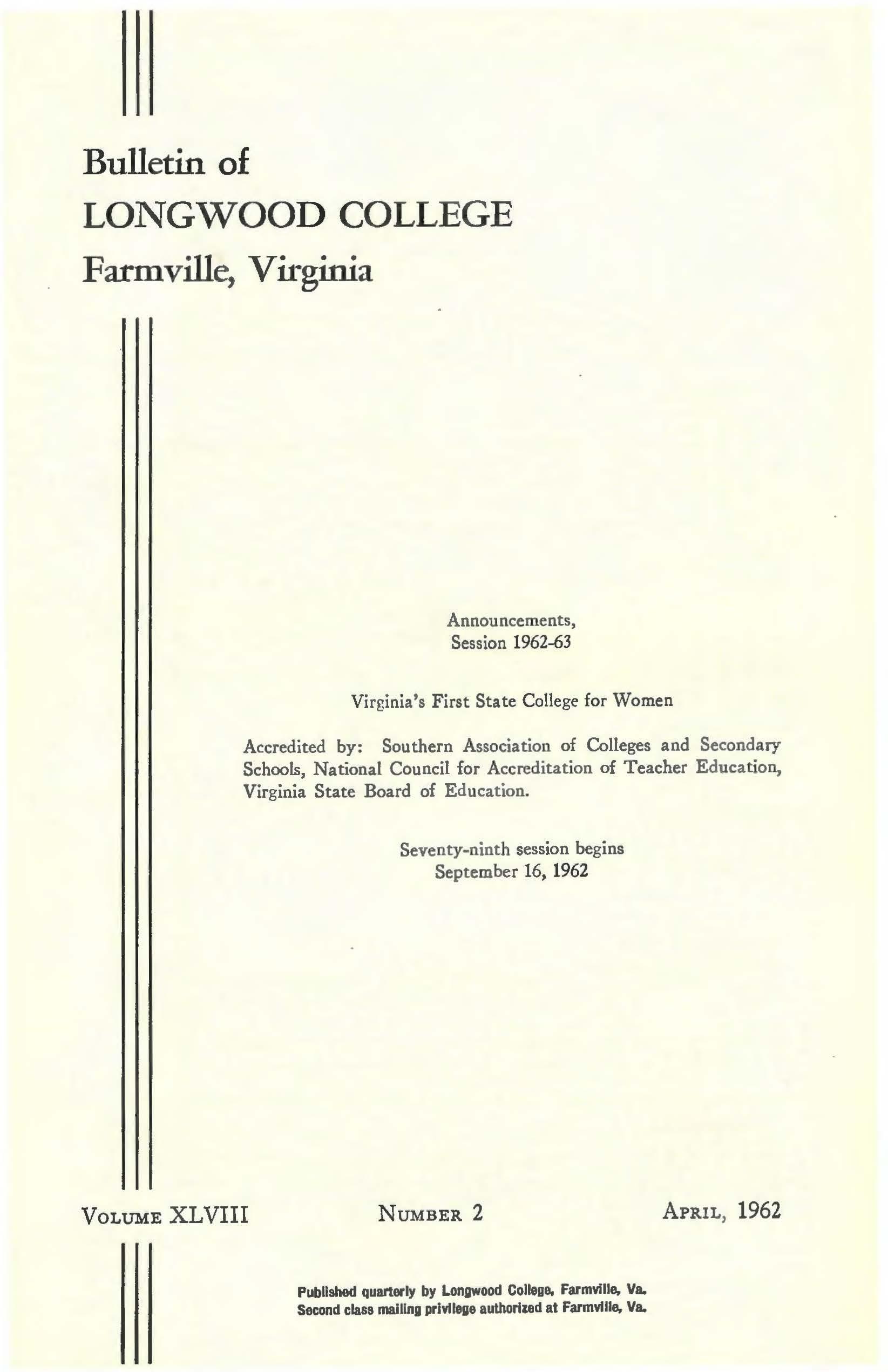
September 13-Thursday-Freshmen and transfer students arrive.
September 14-Friday-Orientation program begins for new students.
September 17-Monday-Freshmen registe!' for classes.
September 18-Tuesday-Sophomores, juniors and seniors register for classes.
September 19-Wednesday-Fall classes begin at 8:05 a.m.
October 3-Wednesday-Last day on which changes in class schedules of students may be made.
October 17-Wednesday-Last day on which classes may be dropped without automatic "F".
November 8-Thursday-Mid-term estimates due at 9:00 a.m.
November 21-Wednesday-Thanksgiving holiday begins at 11:50 a . m.
~ovember 26-Monday-Classes are resumed at 8:05 a .m.
December IS-Saturday-Christmas holiday begins at 11 :00 a.m.
January 2-Wednesday-Classes are resumed at 8:05 a.m.
January 7, 8, 9-Monday, Tuesday, Wednesday-Students register for second semester classes.
January 19-Saturday-Examinations begin.
January 26-Saturday-Examinations end. Semester ends.
February I-Friday-Classes are resumed at 8:05 a.m.
February IS-Friday-Last day on which changes in class schedules of students may be made.
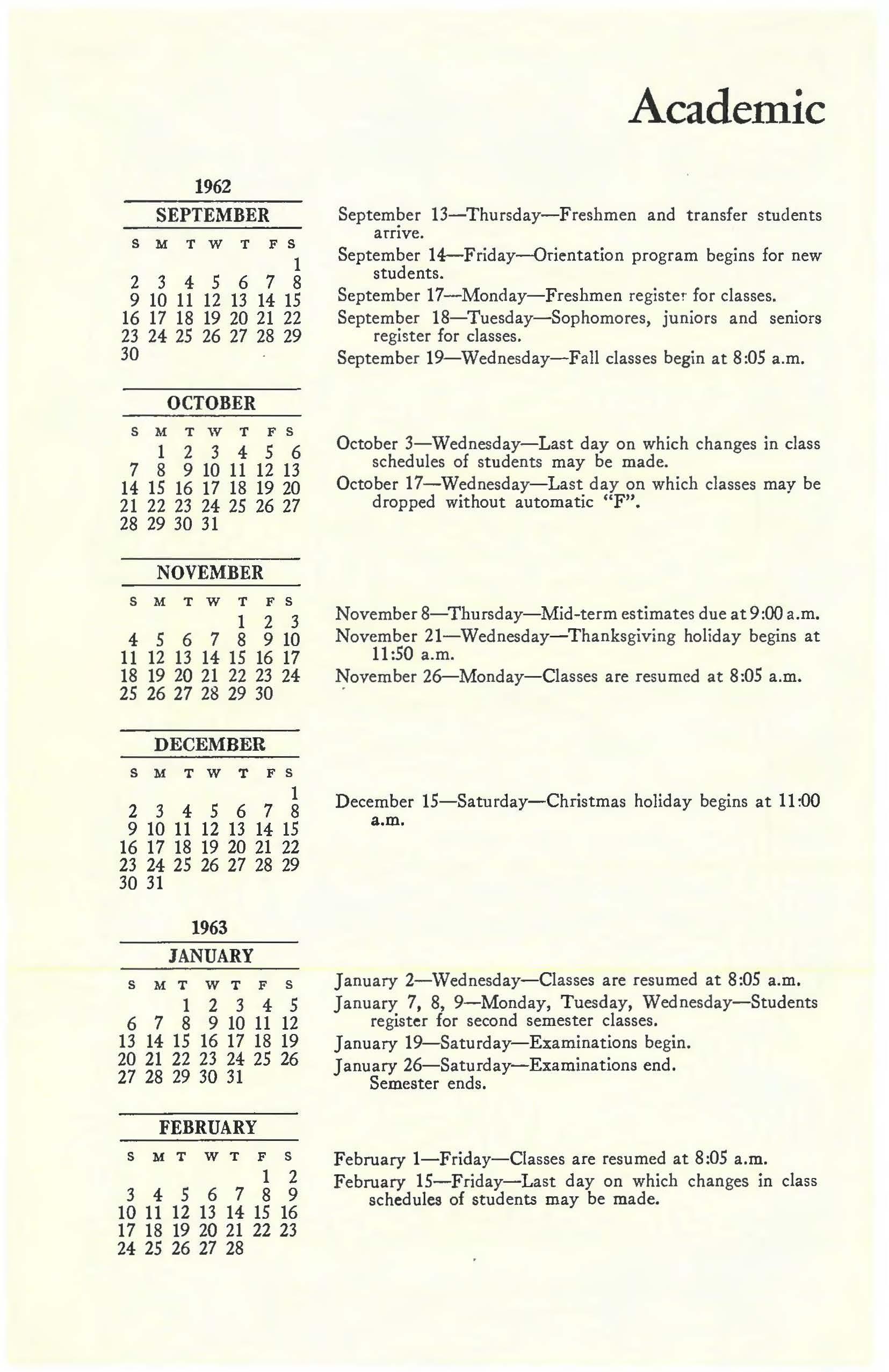
March 1-Friday-Last day on which classes may be dropped without automatic "F".
March 16-Saturday-Founders Day.
March 23-Saturday-Spring vacation begins at 11:00 a.m.
April I-Monday-Classes are resumed at 8:05 a.m.
April 1-Monday-Mid-term estimates due at 9:00 a.m.
May 24-Friday-Examinations begin.
May 31-Friday-Examinations end.
June I-Saturday-Class Day exercises.
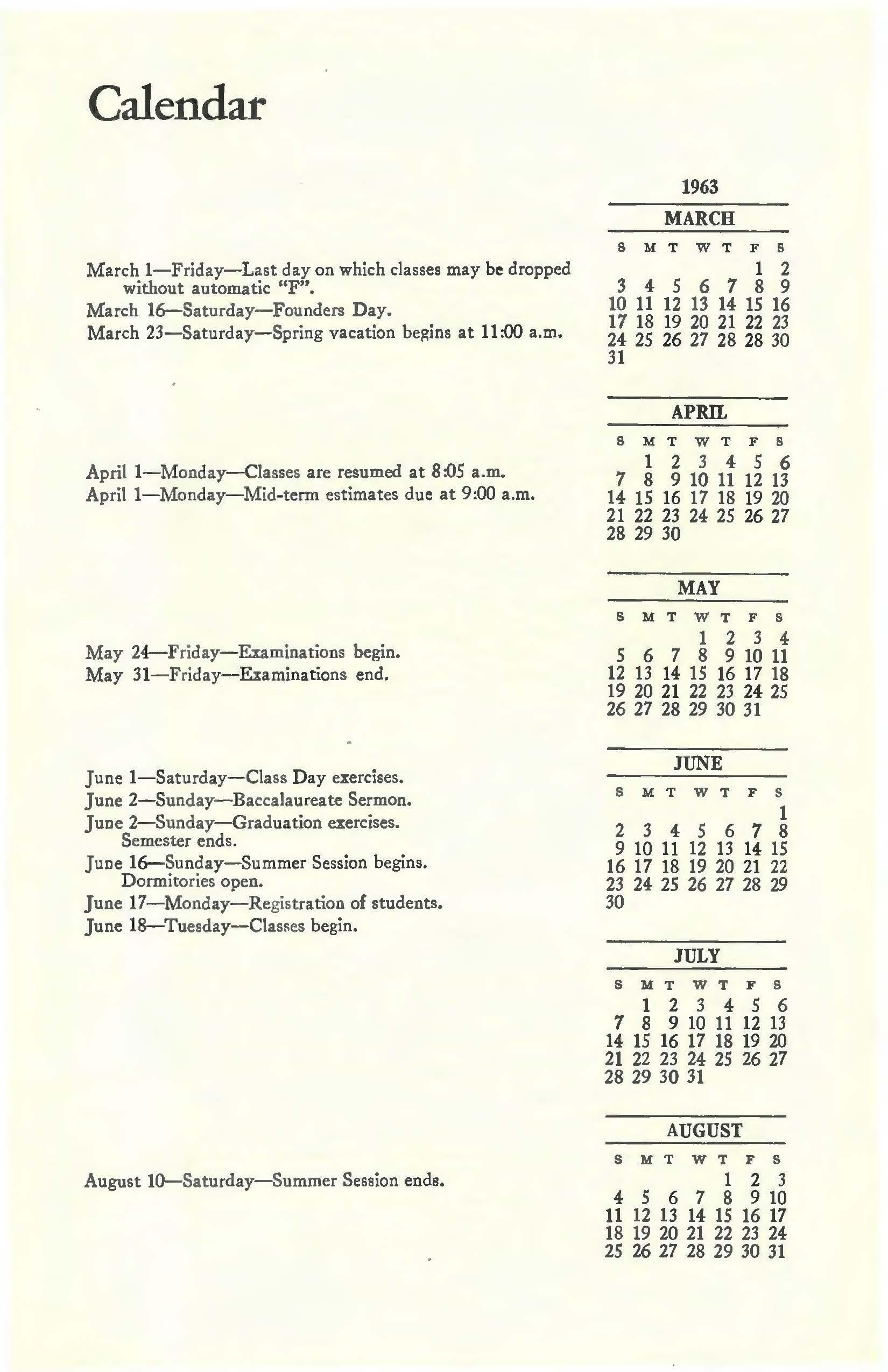
June 2-Sunday-Baccalaureate Sermon.
June 2-Sunday-Graduation exercises. Semester ends.
June 16-Sunday-Summer Session begins. Dormitories open.
June 17-Monday-Registration of students.
June 18-Tuesday-Classes begin.
August IO-Saturday-Summer Session ends.
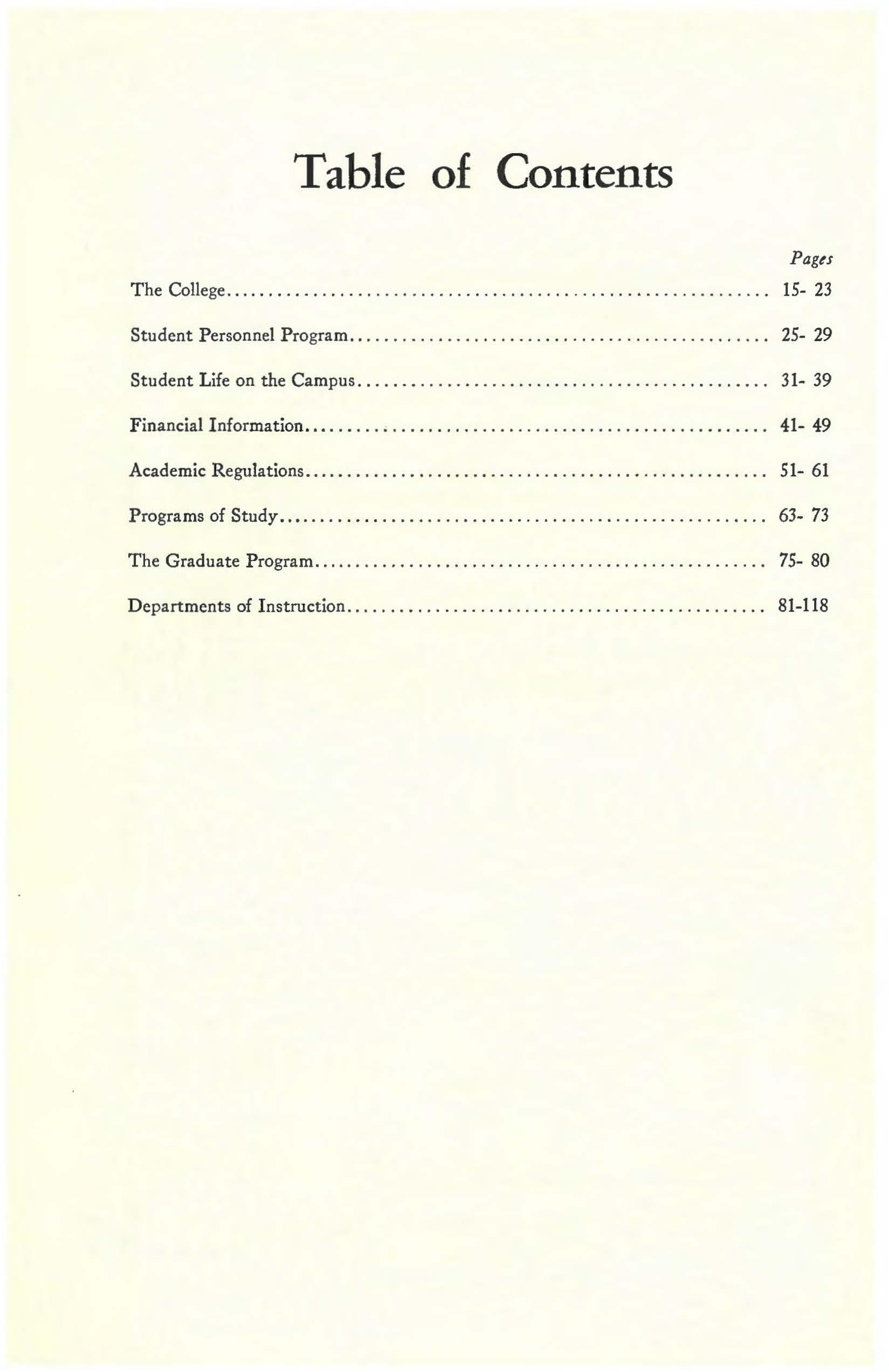
The College . . . . . . . . . . . . . . . . . . . . . . . . . . . . . . . . . . . . . . . . . . . . . . . . . . . . . . . . . . . . . 15- 23
Student Personnel Program.... . . . . . . . . . . . . . . . . . . . . . . . . . . . . . . . . . . . . . . . . . . . 25- 29
Student Life on the Campus. . . . . . . . . . . . . . . . . . . . . . . . . . . . . . . . . . . . . . . . . . . . . . 31- 39
Financial Information 41- 49
Academic Regulations 51- 61
Programs of Study.... 63- 73
The Graduate Program .... ............... ......... .......... . ..... . .. . ... 75- 80 Departments of Instruction 81-118
The State Board of Education of the Commonwealth of Virginia is the governing board of Longwood College.

COLGATE w. DARDEN, JR. NORFOLK
MRS. LOUISE F. GALLEHER MANASSAS
LEONARD G. MusE, President ROANOKE
Mrss ANNE DoBIE PEEBLES SUSSEX MosBY G. PERROW LYNCHBURG
LEwrs F. PowELL, JR. RICHMOND WILLIAM J. STORY CHARLOITESVILLE
C. STUART WHEATLEY, JR. DANVILLE
WooDRow W. WILKERSON
State Superintendent of Public Instruction and Secretary of the Board RICHMOND
*
FRANCIS G. LANKFORD, JR., B.S., M.S., Ph.D., LL.D .. . .... President
DABNEY S. LANCASTER, B.A., M.S., LL.D .......... President Emeritus C. G. GORDON Moss, B.A., M.A., Ph.D ............ .. . Dean of College
VIRGINIA WALL, B.S Registrar MARY W. WATKINS, B.S., M.A . . ............. . Director of Admissions JoaN E. ALLEN, B.S ...... Director of Public Relations and Development
JACOB H. WAMSLEY, B.S .. . ... . .................. . Business Manager
F. WILSON BROWN, B.S Accountant
FLORENCE R. RICHARDSON, B.S., M.A ................ .. . Accountant
MURRAY M. TEMPLETON .... . ....................... .. . . .. Cashier EDNA G. WATKINS ......... .. ...................... . .. . .. Secretary JEAN C. WILSON .................. . ........ . Supervisor of Personnel
RuTH B. WILSON, B.S., M.Lit., Ed.M., Ed.D ......... Dean of Women R. JENELLE SPEAR, B.A., M.A ..... . ....... . Assistant Dean of Women
THELMA BABER ............................ . Head Resident, Wheeler ANTOINETTE GooDMAN .... . . . ..... . Head Resident, Main Cunningham RUBY S. JONES Head Resident, North Cunningham ALICE M. OVERTON .. . ...................... Head Resident, Ruffner BETTY P. REX .... . . . ...... . . .. .. . Head Resident, South Cunningham MARGARET SAMMON, B.S .. . ........ . . Head Resident, Tabb and Student NANNIE P. ORANGE Night Matron
CHARLES E. BuTLER, B.A., B.S., M.A ............... ... .... Librarian
ANNE IRVING ARMSTRONG, B.S., B.S. in L.S ....... . Assistant Librarian
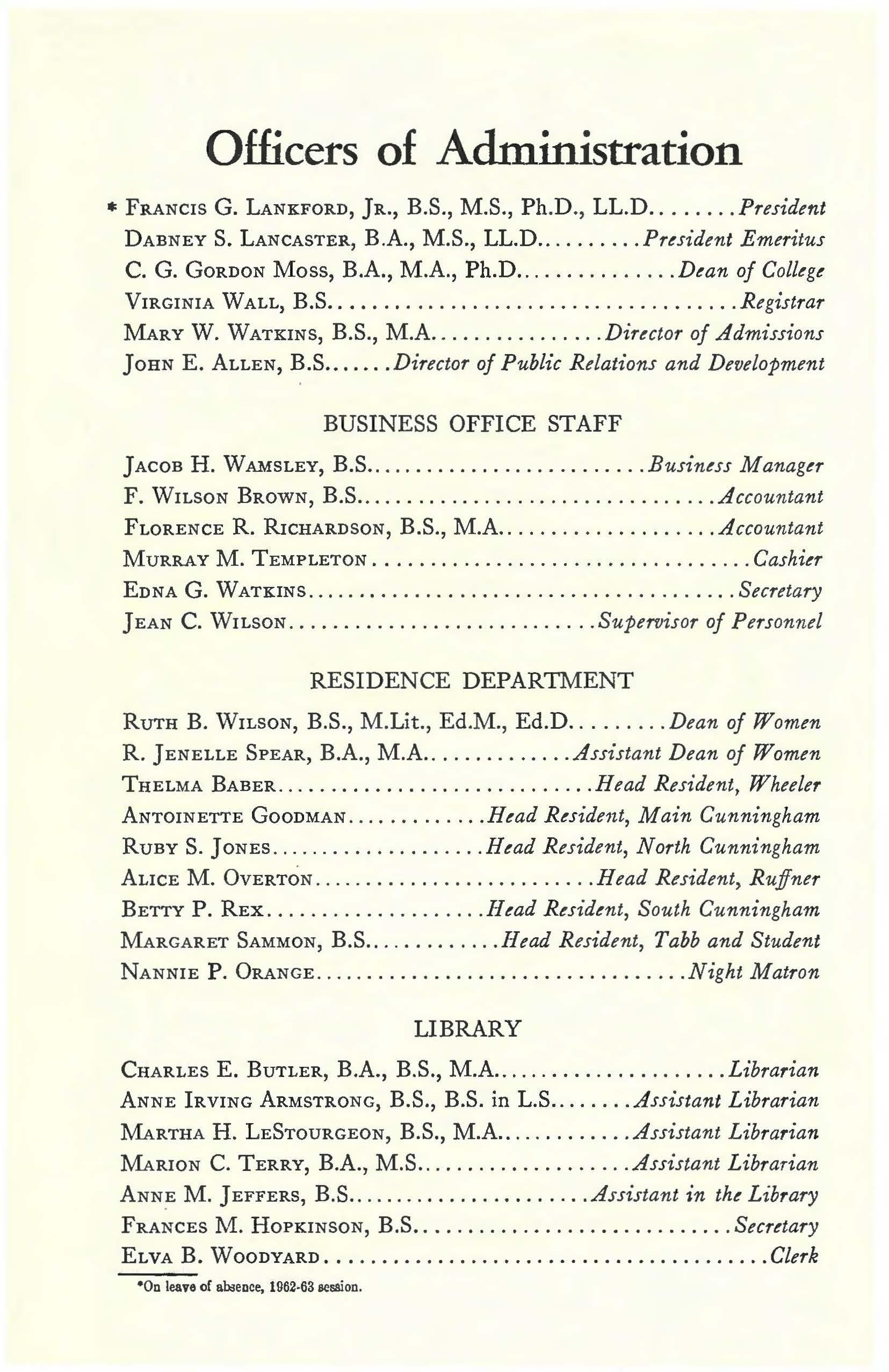
MARTHA H. LESTOURGEON, B.S., M.A ............ . Assistant Librarian
MARION C. TERRY, B.A., M.S Assistant Librarian
ANNE M. JEFFERS, B.S ....... . ............... Assistant in the Library FRANCES 1\1. HOPKINSON, B.S •.. .. ..... . . .. ..... . .... . ... . Secretary ELVA B. WooDYARD ... . ................................... . Clerk •oo leave of abaeoce, 1962-63 session.
JOHN G. GRAZIANI, M.D College Physician
JANIE H. JONES, R.N ................................. . Head Nurse FRANCES W. GARLAND, R.N ................................ . Nurse EvA F. HALEY, R.N ....................................... . Nurse
LEON HENDERSON Supervisor of Buildings and Grounds
VIRGINIA LINDSEY, B.S Manager, Laundry KATHARINE F. WALTON .................... . Housekeeping Supervisor LOUISE B. HUBBARD .............. . Assis ' ant Housekeeping Supervisor
BESS P. DANIEL Postmistress LouISE Y. DuGGER ............................ . Manager, Tearoom
LucILLE P. BRADSHA w ............... Secretary to the Dean of Women EVELYN M. COLEMAN, B.S ................. . Secretary to the President CoNSTANCE H. GILLS ............. Secretary, Audio-Visual Department MARIE A. HUMPHREYS .................... Secretary, Registrar's Office
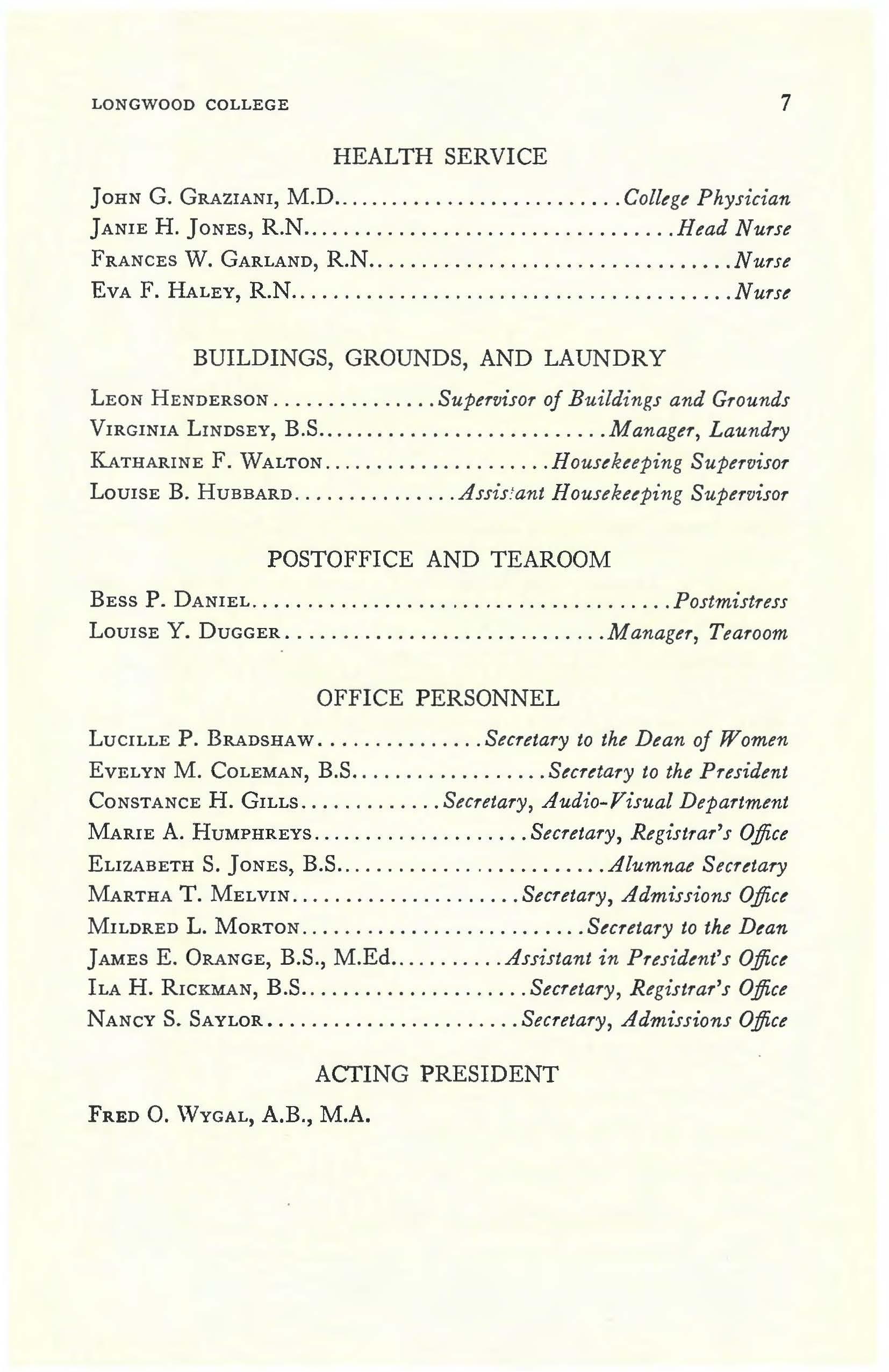
ELIZABETH S. JoNES, B.S ........................ . Alumnae Secretary MARTHA T. MELVIN ..................... Secretary, Admissions Office MILDRED L. MoRTON Secretary to the Dean JAMES E. ORANGE, B.S., M.Ed . . . . .... . . Assistant in President's Office ILA H. RICKMAN, B.S ..................... Secretary, Registrar's Office NANCY S. SAYLOR Secretary, Admissions Office
FRED 0. WYGAL, A.B., M.A.
FRANCIS G. LANKFORD, JR., B.S., M.S., Ph.D., LL.D President B.S., Randolph-Macon College; M.S., Ph.D., University of Virginia; LL.D., Randolph-Macon College.

DABNEY S. LANCASTER, B.A., M.S., LL.D .......... President Emeritus B.A., University of Virginia; M.S., Virginia Polytechnic Institute; LL.D., University of Richmond.
STERLING C. ADAMS, B.Mus., M.Mus Assistant Professor of Music B.Mus., M.Mus., Conservatory of Music, Cincinnati
MERRY LEWIS ALLEN, B.S., M.Ed., M.S .... Instructor in Mathematics B.S., College of-William and Mary; M.Ed., University of Virginia; M.S ., University of Illinois.
ANNE IRVING ARMSTRONG, B.S., B.S. in L.S ....... Assistant Librarian B.S., Longwood College; B S. in L.S., University of North Carolina.
BLANCHE C. BADGER, B.A., M.A., Ph.D ..... . Professor of Mathematics B.A., Winthrop College; M.A., University of Tennessee; Ph.D., George Peabody College for Teachers.
J. HUNTER BALLEW, B.A., M.Ed .... . Assistant Professor of Mathematics B.A., M.Ed., University of North Carolina.
EMILY BARKSDALE, B.A., M.A .. Associate Professor of Foreign Languages B.A., Randolph-Macon Woman's College; M.A., Universidad Nacional de Mexico.
SuzANNE BARNETT, B.A., M.A., Ph.D .... . Assistant Professor of Speech B.A., University of Maryland; M.A ., Teachers College, Columbia University; M.A., Smith College; Ph .D., Indiana University.
VIRGINIA BEDFORD, B.S., M.A .............. Associate Professor of Art B.S., University of Missouri; M.A., Teachers College, Columbia University.
ALEXANDER V. BERKIS, LL.M., M.A., Ph.D ... . Associate Professor of History and Social Sciences LL.M., University of Latvia; M.A., Ph.D., University of Wisconsin.
LORA M. BERNARD, B.S., M.S .. . Assistant Professor of Home Economics B.S., Carson-Newman College; M.S., University of Tennessee.
M. HENRY BITTINGER, B.A., M.A Associate Professor of History and Social Sciences B.A., Hampden-Sydney College; M.A., University of Virginia.
ELEANOR W. BOBBITT, B.S., M.A .... Assistant Professor of Physical and Health Education B.S., Longwood College; M.A., University of Tennessee.
REBECCA L. BROCKENBROUGH, B.A., M.A .... . Associate Professor of Physical and Health Education B.A., Westhampton College; M.A., Teachers College, Columbia University.
RICHARD B. BROOKS, B.P.E., M.A., Ed.D ...... Professor of Education B.P.E., Springfield College; M.A., University of Pennsylvania; Ed.D., University of Virginia.
ROBERT T. BRUMFIELD, B.S., M.A., Ph.D ..... Professor of Natural Sciences B.S., Hampden-Sydney College; M.A., University of Virginia; Ph.D., Yale University.
ELIZABETH BuRGER, B.S., M.A., Ed.D ... . Professor of Natural Sciences B.S., M.A., College of William and Mary; Ed.D., University of Virginia.
CHARLES E. BuTLER, B.A., B.S., M.A ...................... Librarian B.A., B.S., University of Denver; M.A., University of Michigan.

EMILY CLARK, B.S., M.A ............... . Associate Professor of Music B.S., Johns Hopkins University; M.A., Teachers College, Columbia University.
KATHLEEN G. CovER, B.A., M.A ...... . Associate Professor of Sociology B.A., Randolph-Macon Woman's College; M.A., College of William and Mary.
MARY JOANNE CuRNUTT, B.Mus., M.Mus., D.Mus ........ . Assistant Professor of Music B.Mus., Cornell University; M.Mus., Oberlin College; D.Mus., University of Rochester.
MILDRED D. DAVIS, B.S., M.S ......... . Associate Professor of English B.S., Longwood College; M.S., University of Virginia.
HELEN DRAPER, B.S., M.A ........... . Professor of Foreign Languages B.S., Longwood College; M.A., Middlebury College.
ANITA B. ERNOuF, B.A., M.A .. . Assistant Professor of Foreign Languages B.A., Hunter College; M.A., Teachers College, Columbia University.
RAYMOND HOLLIDAY FRENCH, B.S., M.S Associate Professor of Natural Sciences B.S., M.S., Virginia Polytechnic Institute.
FRANCES W. GEE, B.A., B.S., M.A Assistant Professor of Home Economics B.A., B.S., Longwood College; M.A., Virginia Polytechnic Institute.
CARSON GrnB, B.A., M.A ............... Assistant Professor of English B.A., Wesleyan University; M.A., University of Pennsylvania.
FosTER B. GRESHAM, B.A., M.A ....... Associate Professor of English B.A., Randolph-Macon College; M.A., University of Virginia.
NELL H. GRIFFIN, B.A., M.A ........... . Professor of Home Economics B.A., Radford College; M.A., Teachers College, Columbia University.
PHYLLIS W. HARRISS, B.S .. Instructor in Physical and H,a,lth Education B.S., Longwood College.
}AMES MARVIN HELMS, B.A., M.A ..... . Associate Professor of History and Social Sciences B.A., Clemson College; M.A., University of Virginia.
OLIVE T. ILER, B.S., M.A ...... . Associate Professor of Physical and Ifealth Education Graduate, Sargent School of Physical Education; B.S., Longwood College; M.A., Teachers College, Columbia University.
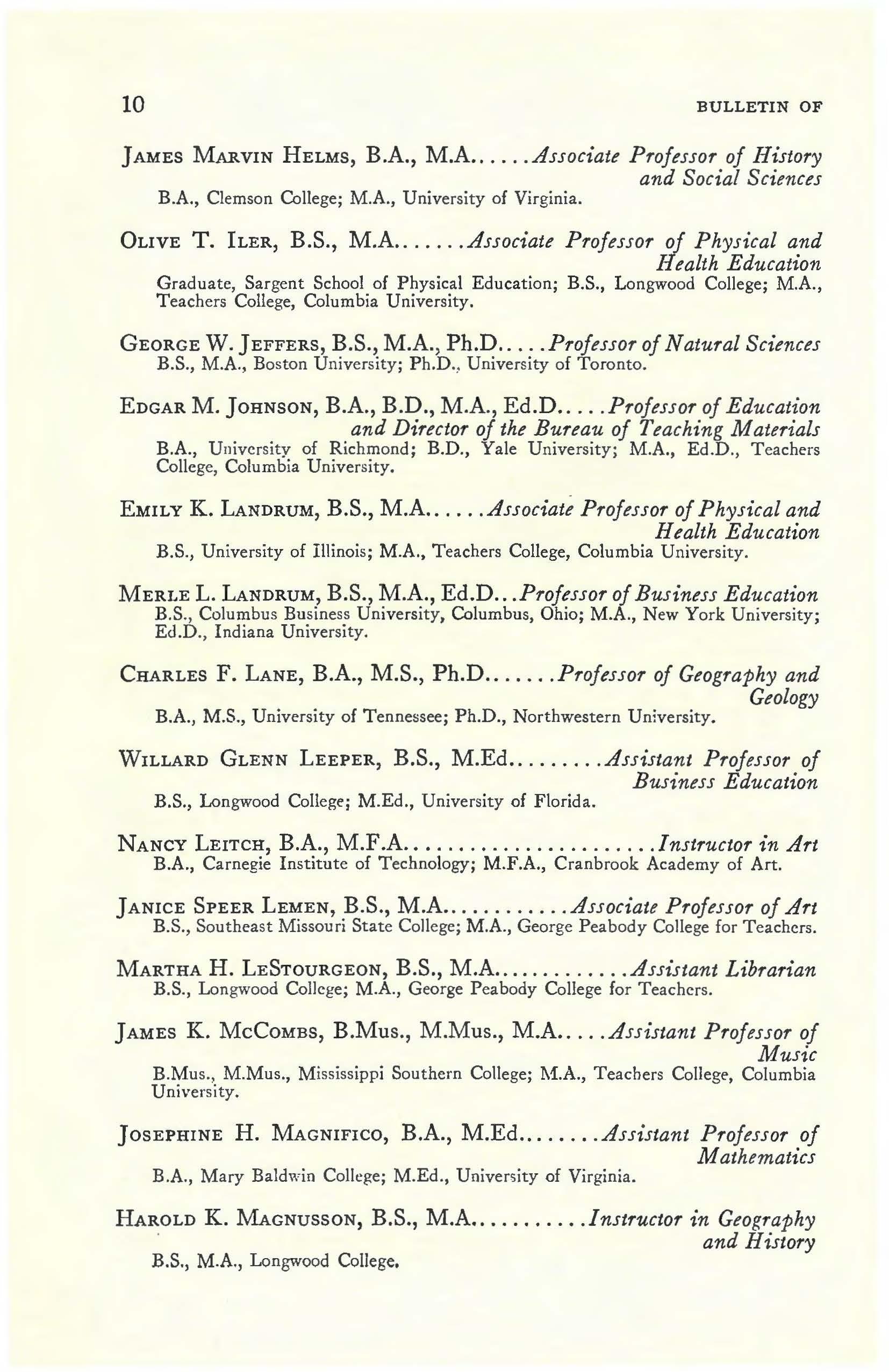
GEORGE W. JEFFERS, B.S., M.A., Ph.D .... . Professor of Natural Sciences B.S., M.A., Boston University; Ph.D. , University of Toronto.
EDGAR M. JOHNSON, B.A., B.D., M.A., Ed.D .... Professor of Education and Director of the Bureau of Teaching Materials B.A., University of Richmond; B.D., Yale University; M.A., Ed .D., Teachers College, Columbia Univer sity.
EMILY K. LANDRUM, B.S., M.A ..... . Associate Professor of Physical and Health Education B.S., University of Illinois; M.A., Teachers College, Columbia University.
MERLE L. LANDRUM, B.S., M.A., Ed.D Professor of Business Education B.S ., Columbus Business University, Columbus, Ohio; M.A., New York University; Ed.D ., Indiana University
CHARLES F. LANE, B.A., M.S., Ph.D ...... . Professor of Geography and B.A., M.S., University of Tennessee; Ph.D., Northwestern University.
WILLARD GLENN LEEPER, B.S., M.Ed ........ . Assistant Professor of Business Education B.S., Longwood College; M.Ed., University of Florida.
NANCY LEITCH, B.A., M.F.A ...................... . Instructor in Art B.A., Carnegie Institute of Technology; M.F.A., Cranbrook Academy of Art.
JANICE SPEER LEMEN, B.S., M.A ........... . Associate Professor of Art B.S ., Southeast Missouri State Coll ege; M.A., George Peabody College for Teachers.
MARTHA H. LESTOURGEON, B.S., M.A Assistant Librarian B.S., Lon gwood College; M.A., George Peabody College for Teachers.
JAMES K. McCOMBS, B.Mus., M.Mus., M.A .... . Assistant Professor of Music B.Mus., M.Mus., Mississippi Southern College; M.A., Teachers College, Columbia University.
JosEPHINE H. MAGNIFICO, B.A., M.Ed ....... . Assistant Professor of Mathematics B.A., Mary Baldwin College; M.Ed., University of Virginia.
HAROLD K. MAGNUSSON, B.S., M.A .......... . Instructor in Geography · and History B.S., M.A., Longwood College,
RICHARD K. MEEKER, B.A., M.A., Ph.D .. . Associate Professor of English B.A., Lafayette College; M.A., Ph.D., University of Pennsylvania.
Ro BERT E. MERRITT, B.A., M.S ... Associate Professor of Natural Sciences B.A., State University of New York; M.S., Cornell University.
JOHN W. MOLNAR, B.Mus., B.S., M.Ed ., Ed.D .... . Professor of Music B.Mus., Conservatory of Music, Cincinnati; B.S., M.Ed., Ed.D., University of Cincinnati.
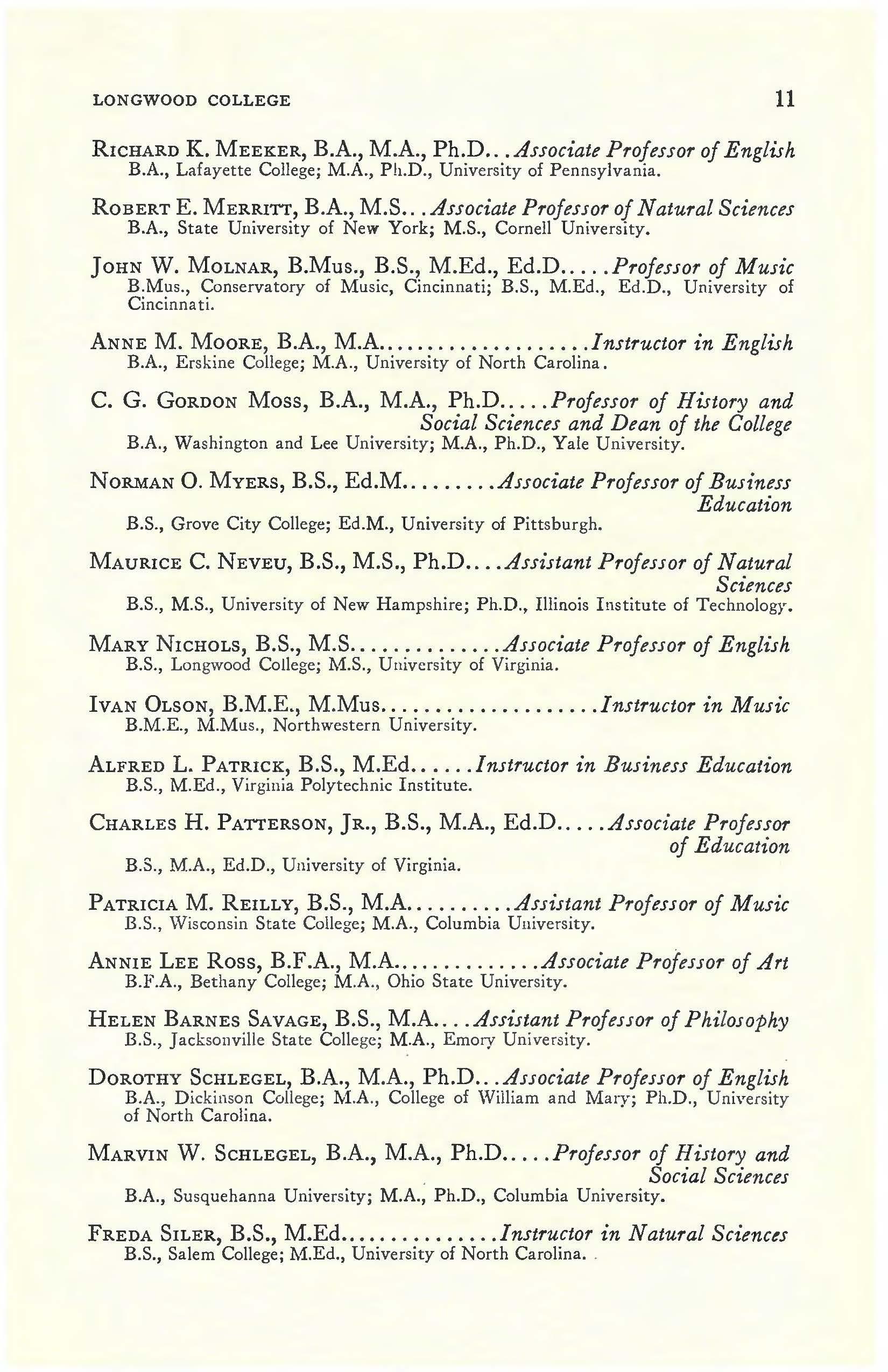
ANNE M. MooRE, B.A., M.A ................... . Instructor in English B.A., Erskine College; M.A., University of North Carolina.
C. G. GoRDON Moss, B.A., M.A., Ph.D .... . Professor of History and Social Sciences and Dean of the College B.A., Washington and Lee University; M.A., Ph.D., Yale University.
NORMAN 0. MYERS, B.S., Ed.M ........ . Associate Professor of Business Education B.S., Grove City College; Ed.M., University of Pittsburgh.
MAURICE C. NEVEU, B.S., M.S., Ph.D ... . Assistant Professor of Natural Sciences B.S., M.S., University of New Hampshire; Ph.D., Illinois Institute of Technology.
MARY NICHOLS, B.S., M.S ............. . Associate Professor of English B.S. , Lon gwood College; M.S., University of Virginia.
IVAN OLSON, B.M.E., M.Mus ................... Instructor in Music B.M.E., M.Mus., Northwestern University.
ALFRED L. PATRICK, B.S., M.Ed Instructor in Business Education B.S., M.Ed., Virginia Polytechnic Institute.
CHARLES H. PATTERSON, JR., B.S., M.A., Ed.D Associate Professor B.S., M.A., Ed.D., University of Virginia. of Education
PATRICIA M. REILLY, B.S., M.A ......... Assistant Professor of Music B.S., Wisconsin State College; M.A., Columbia University.
ANNIE LEE Ross, B.F.A., M.A............. . Associate Professor of Art B.F.A., Bethany College; M.A., Ohio State University.
HELEN BARNES SAVAGE, B.S., M.A... . Assistant Professor of Philosophy B.S., Jacksonville State Colle ge; M.A., Emory University.
DOROTHY ScHLEGEL, B .A., M.A., Ph.D .. Associate Professor of English B.A., Dickinson College; M A., College of Wiiliam and Mary; Ph.D., Universit y of North Carolina.
MARVIN W. ScHLEGEL, B.A., M.A., Ph.D .... . Professor of History and . Social Sciences B.A., Susquehanna University; M.A., Ph.D., Columbia University.
FREDA SILER, B.S., M.Ed .............. . Instructor in Natural Sciences B.S., Salem College; M.Ed., University of North Carolina . .
FRANCIS BUTLER SIMKINS, B.A., M.A., Ph.D ... . . Professor of History and Social Sciences B.A., University of South C a rolina; M.A ., Ph.D., Columbia Un iv ers ity . .
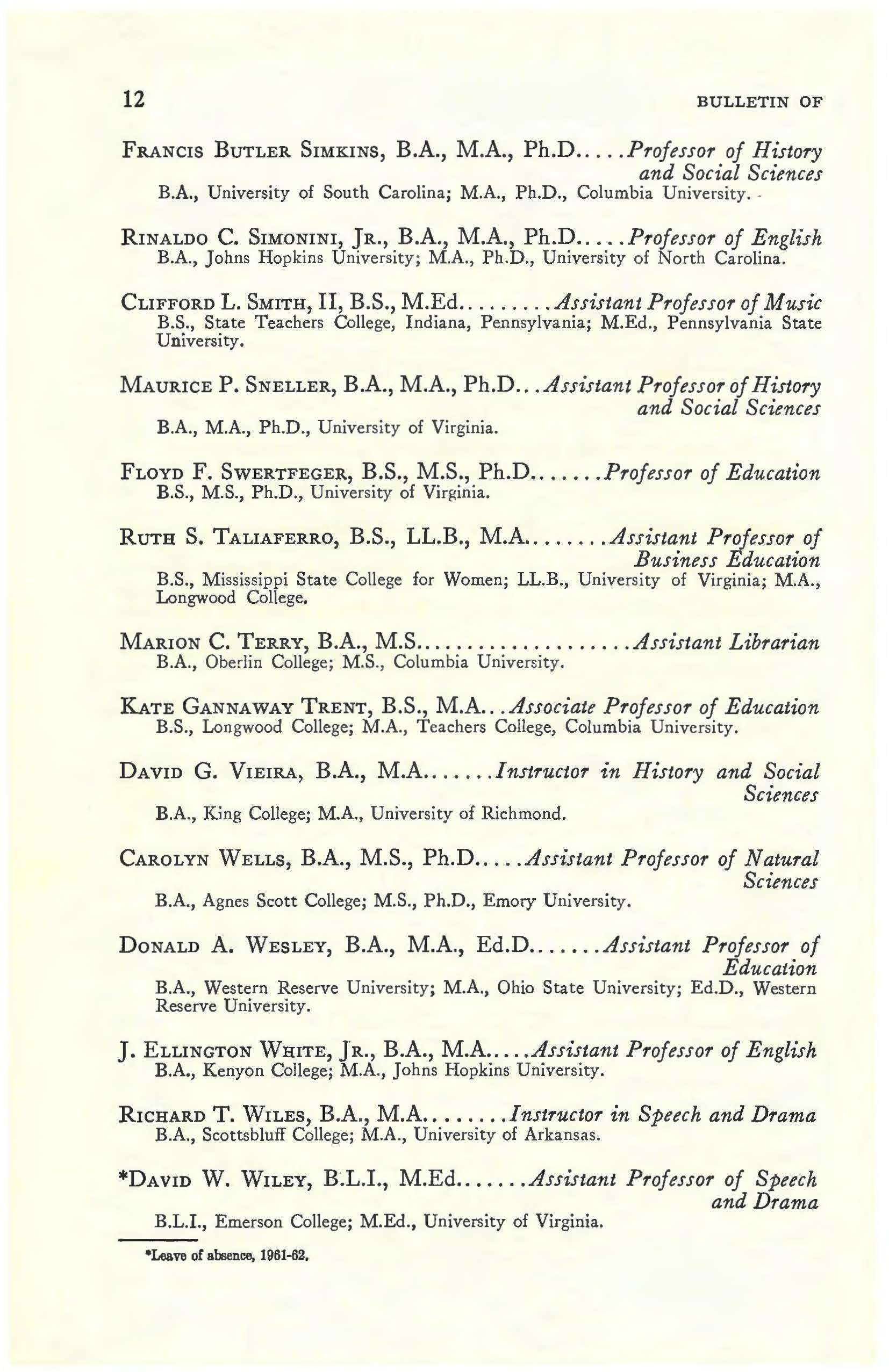
RINALDO C. SIMONINI, JR., B.A., M.A., Ph.D .... Professor of English B.A., Johns Hop k ins Univ er sity; M A. , Ph.D., University of North Carolina.
CLIFFORD L. SMITH, II, B.S., M.Ed ......... Assistant Professor of Music B.S., State Teachers Colle ge, Indiana, Pennsylvania; M.Ed., Pennsylvania State University.
MAURICE P. SNELLER, B.A., M.A., Ph.D .. . Assistant Professor of History and Social Sciences B.A., M.A., Ph.D., Univ ersi t y of Virginia
FLOYD F. SwERTFEGER, B.S., M.S., Ph.D ...... . Professor of Education B S., M.S., Ph.D., Univer sity of Vir ginia.
RUTH S. TALIAFERRO, B.S., LL.B., M.A. ...... . Assistant Professor of Business Education B.S., Mississippi State College for Women; LL.B., University of Virginia; M.A., Longwood College.
MARION C. TERRY, B.A., M.S ......... . .......... Assistant Librarian B A , Oberlin College ; M.S ., Columbia Unive rsi t y
KATE GANNAWAY TRENT, B.S., M.A.. . Associate Professor of Education B.S., Lon gw ood Colle ge; M.A ., T eachers College, Columbia Un ivers ity.
DAVID G. VIEIRA, B.A., M.A ...... . Instructor in History and Social Sciences B.A., King College; M.A., Unive rsity of Richmond.
CAROLYN WELLS, B.A., M.S., Ph.D .... . Assistant Professor of Natural Sciences B.A., Agnes Scott College; M .S., Ph.D., Emory University.
DoNALD A. WESLEY, B.A., M.A., Ed.D ...... . Assistant Professor of Education B.A., Western Reserve University ; M A , Ohio State University ; Ed.D., Western Reserve University.
J. ELLINGTON WHITE, JR., B.A., M.A.... . Assistant Professor of English B.A., Kenyon College; M.A , Johns Hopkins University.
RICHARDT. WILES, B.A., M.A ....... . Instructor in Speech and Drama B.A., Scottsbluff College; M A , University of Arkansas.
*DAVID W. WILEY, B.L.I., M.Ed ...... . Assistant Professor of Speech and Drama B.L I., Emerson College; M.Ed., University of Virginia.
•Leava of absence, 1961-62.
RUTH B. WILSON, B.S., M.Lit., M.Ed., Ed.D ••• Professor of Education · and Dean of Women B.S., State Teachers College, Slippery Rock, Pennsylvania; M.Lit., University of Pittsburgh; M.Ed., Syracuse University; Ed.D., University of Pittsburgh.
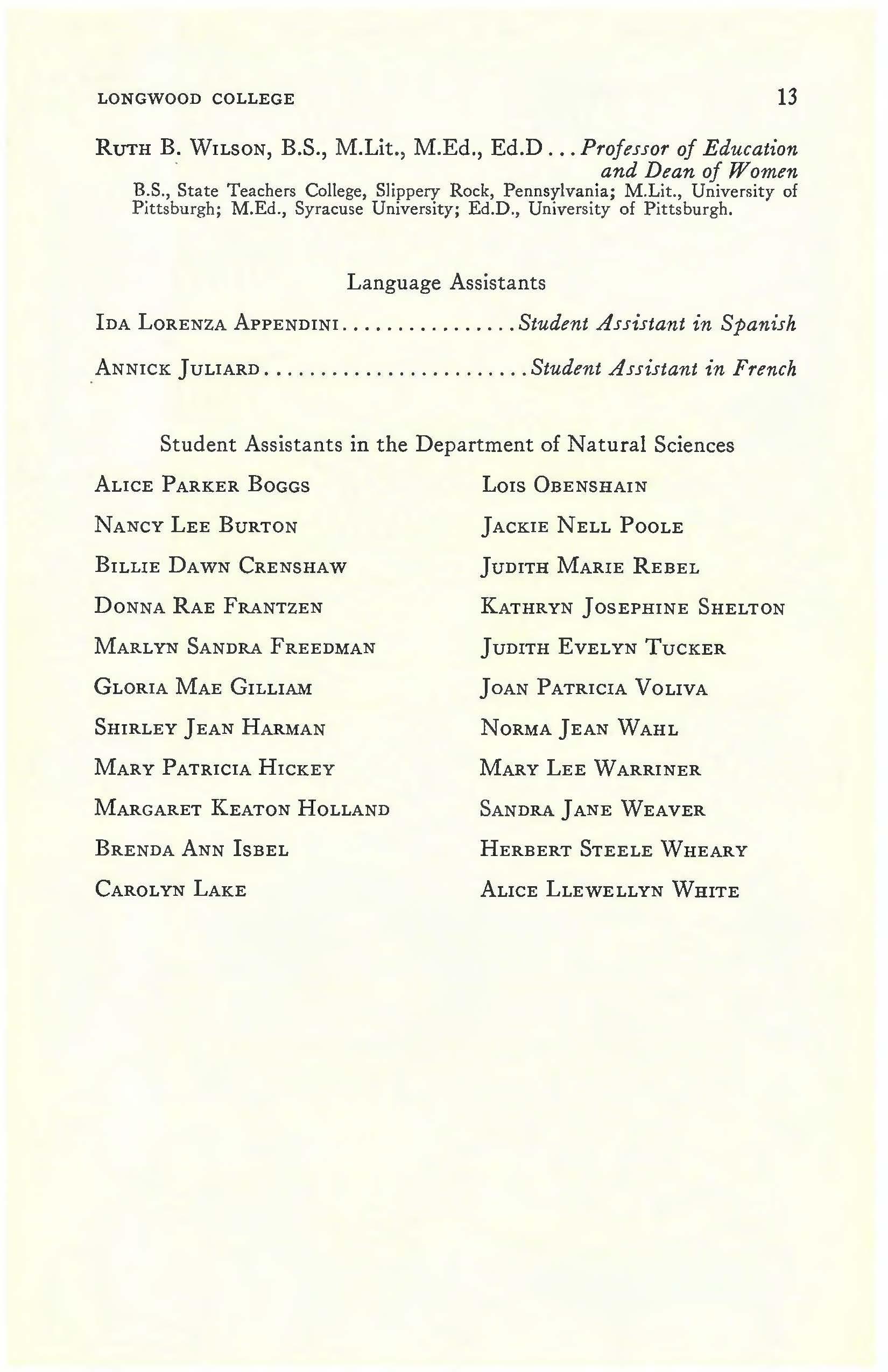
lnA LORENZA APPENDINI .•••••.•.•••••.•
Student Assistant in French
Student Assistant in Spanish AN NICK J ULIARD
Student Assistants in the Department of Natural Sciences
ALICE PARKER BOGGS
NANCY LEE BURTON
BILLIE DAWN CRENSHAw
DONNA RAE FRANTZEN
MARLYN SANDRA FREEDMAN
GLORIA MAE GILLIAM
SHIRLEY JEAN HARMAN
MARY PATRICIA HICKEY
MARGARET KEATON HOLLAND
BRENDA ANN ISBEL
CAROLYN LAKE
LoIS OBENSHAIN
JACKIE NELL POOLE
JUDITH MARIE REBEL KATHRYN JOSEPHINE SHELTON
JUDITH EvEL YN TucKER
JOAN PATRICIA VOLIVA
NORMA JEAN WAHL
MARY LEE w ARRINER SANDRA JANE WEAVER
HERBERT STEELE WHEARY ALICE LLEWELLYN WHITE
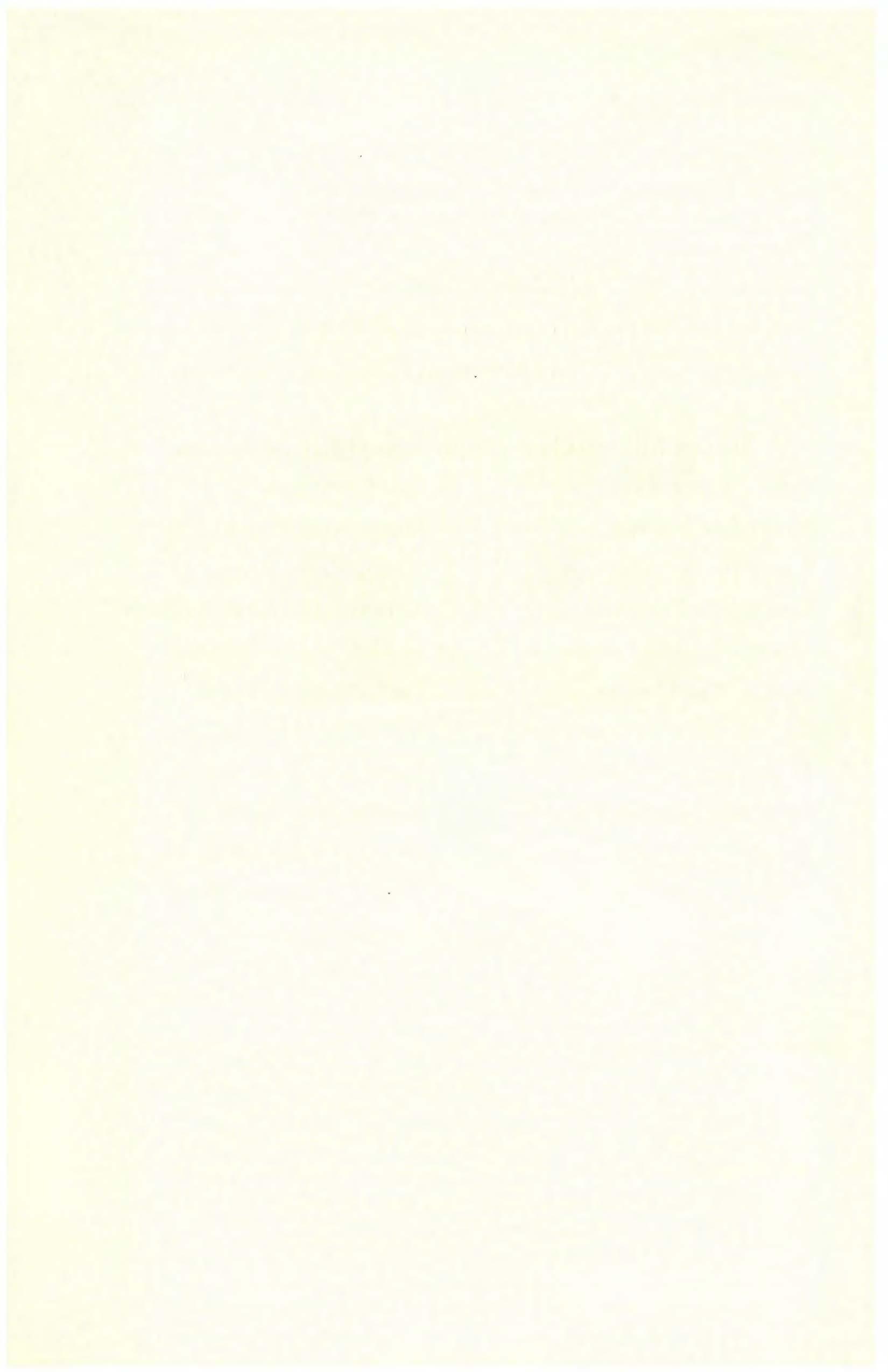
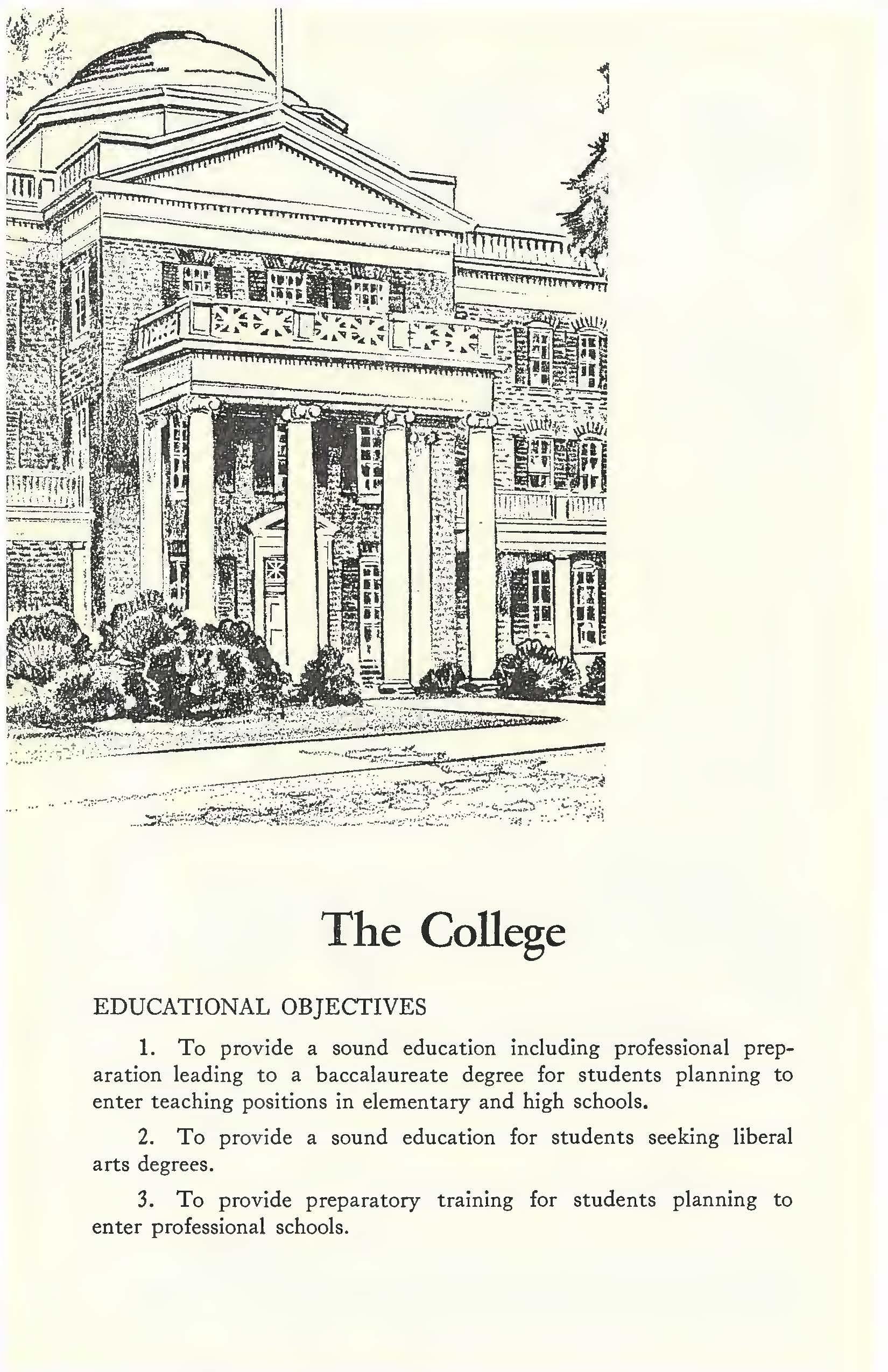
1. To provide a sound education including professional preparation leading to a baccalaureate degree for students planning to enter teaching positions in elementary and high schools.
2. To provide a sound education for students seeking liberal arts degrees.
3. To provide preparatory training for students planning to enter professional schools.
4. To provide graduate study leading to the master's degree for those who wish additional preparation for teaching in the elementary or the high scho ol, or for supervisory work in schools .
Longwood C ollege, a pioneer, first in private, and later in public education, is one of the oldest colleges for women in the United States. The College was founded on March 5, 1839, this being the date that the Farmville Female Seminary Association was incorporated by the General Assembly of Virginia. The seminary opened its doors in an impressive brick building in the Georgian style of architecture, which now forms a part of Ruffner Hall, the administration building at Longwood College. Prior to 1839 there existed the Farmville Female Seminary established in 1833 and another female seminary established in 1835 by the Re v erend A. J. Heustis. It is possible that the seminary of 1839 was an outgrowth of these earlier schools. If this is the case, Longwood College can justifiably claim a founding date of 1833. ·
In succeeding years the increasing prosperity of the Farmville Female Seminary or Female Academy, as it was sometimes called, led the stockholders to expand the seminary into a college, and the Farmville Female College was incorporated in 1860. This college under both private and church management enjoyed a long period of successful operation. Between 1860 and 1884 it was directed in turn by George La Monte, a young graduate of Union College, New York; Arnaud Preot, a distinguished French musician and linguist; Dr. Paul Whitehead, a Methodist minister; and the Misses Fannie and Mary Elizabeth Carter of Mecklenburg County.
The first State legislature to assemble after the adoption of the postbellum constitution established a system of public schools in Virginia on July 11, 1870. For twelve years or more the conduct of these schools was entrusted to such teaching forces as were found ready at hand. Howev er, during this period it became evident to educational leaders that some provision must be made for the training of teachers. To meet this demand, the legislature on March 7, 1884, passed an act establishing a State Female Normal School. On April 7, 1884, the State of Virginia acquired the property of the Farmville Female College, and in October of the same year the Normal School opened with 110 students enrolled. This was the first State institution of higher learning for women in Virginia.
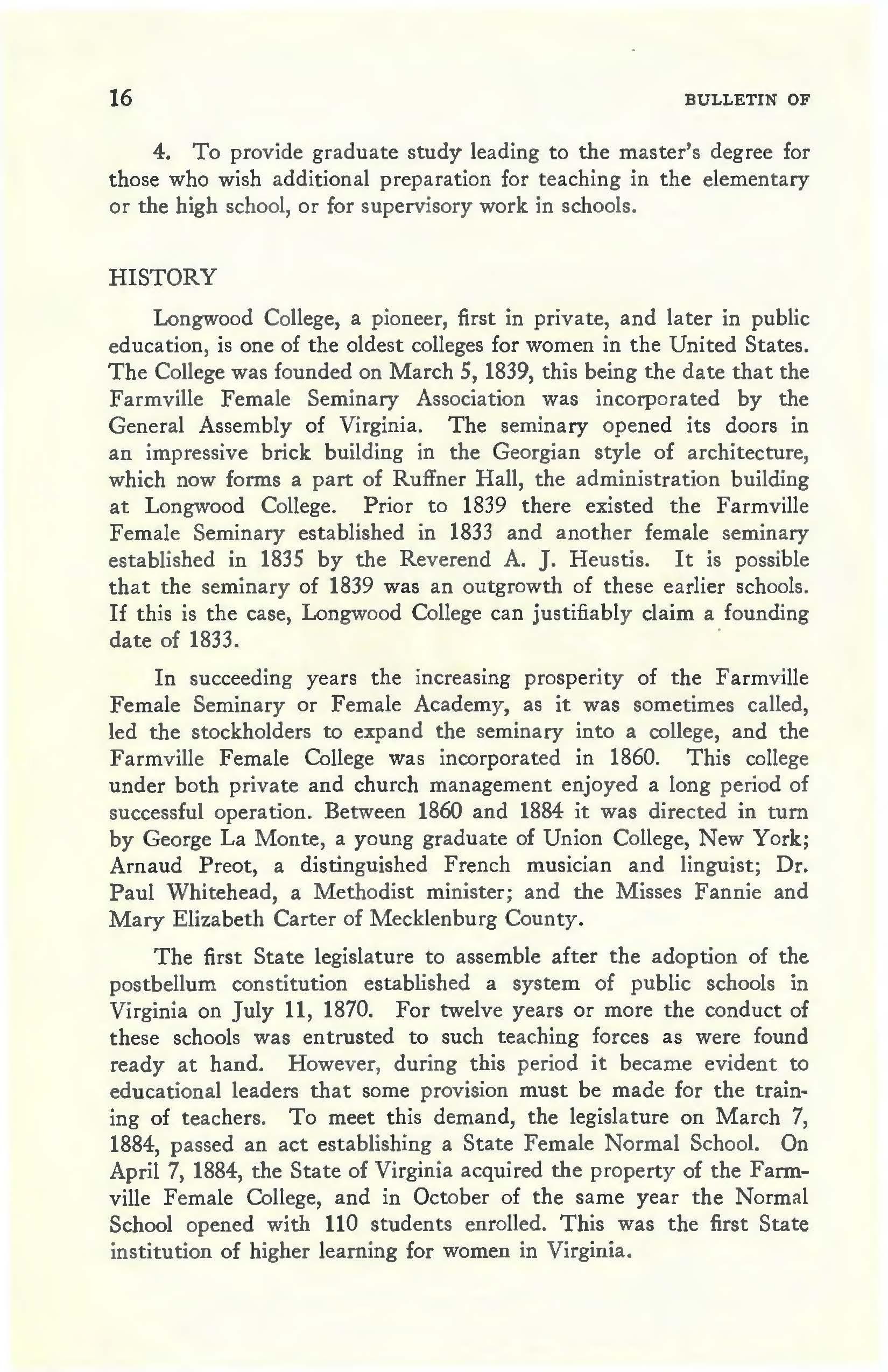
With the passage of the years, the Normal School expanded its curricula and ran through a succession of names. It became the State Normal School for Women in 1914, the State Teachers College at Farmville in 1924, and Longwood College in 1949.
The College's present name was derived from Longwood Estate, a tract of 103 acres acquired by the institution in 1928. This beautiful property, originally· consisting of thousands of acres, was p urchased by Peter Johnston in 1765, and was the home of Peter Johnston, Jr., a lieutenant in Light Horse Harry Lee's famed legion and judge of the Circuit Court of Virg inia . There , also, was born General Joseph E. Johnston, Confederate military figure .
In 1811 the estate was bought by Abram Bedford Venable, a United States Senator and the organizer and first president of the first bank in Virginia. After the destruction by fire of the original house on the estate, the present house was erected in 1815 by Nathaniel E. Venable, an officer in the War of 1812 and a member of the Virginia House of Delegates and the Senate. It is the birthplace of Lieutenant Colonel Charles Scott Venable, who was a member of General Robert E. Lee's staff, and professor of mathematics and chairman of the faculty of the University of Virginia
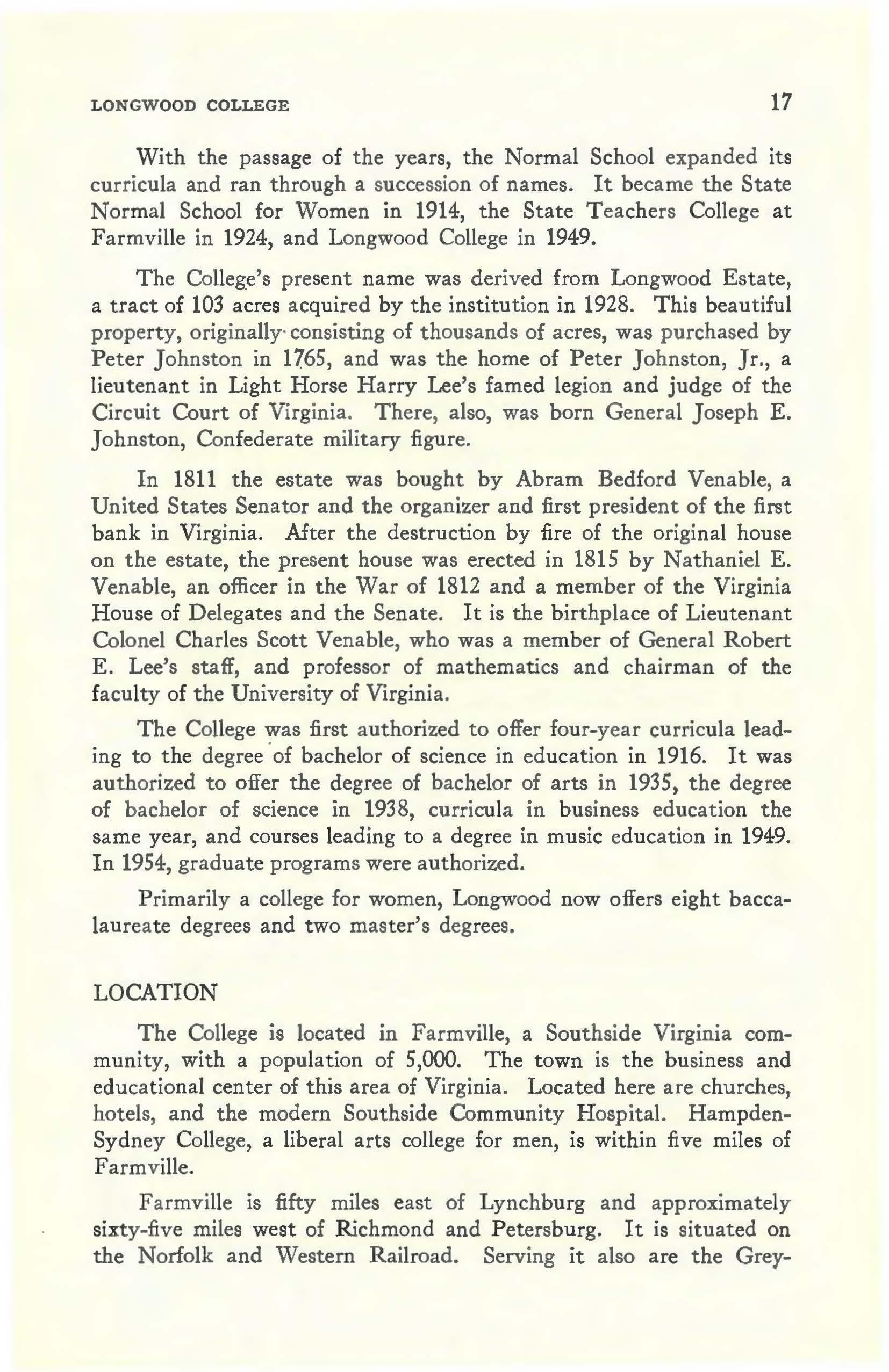
The College was first authorized to offer four-year curricula leading to the degree ·of bachelor of science in education in 1916. It was authorized to offer the degree of bachelor of arts in 1935, the degree of bachelor of science in 1938, curricula in business education the same year, and courses leading to a degree in music education in 1949. In 1954, graduate programs were authorized.
Primarily a college for women, Longwood now offers eight baccalaureate degrees and two master's degrees.
The College is located in Farmville, a Southside Virginia community, with a population of 5,000. The town is the business and educational center of this area of Virginia. Located here are churches, hotels, and the modern Southside Community Hospital. HampdenSydney College, a liberal arts college for men, is within five miles of Farmville.
Farmville is fifty miles east of Lynchburg and approximately sixty-five miles west of Richmond and Petersburg. It is situated on the Norfolk and Western Railroad. Serving it also are the Grey-
hound and Trailways bus systems. Excellent highways, including U. S. 15 and U. S. 460, intersect here.
The climate is pleasant the year around. The geographic location of the College assures the absence of extremes in temperature and weather.
The campus is on a 20 acre plot of ground to the west of the business section of Farmville. The campus is compact; the buildings are arranged for usefulness and convenience. Ruffner Hall is located in the center of the campus and is probably the first building the student will enter upon her arrival at Longwood College. On the first floor of this building is the Rotunda which is attractively furnished as a reception hall. To the east of the Rotunda are the offices of the President, Dean, Director of Admissions, and ,i Business Manager. To the west, is the Home Office and the office of the Dean of Women. Adjoining the Rotunda to the south is the dining hall of the College, which is equipped to seat one thousand persons. Each table in the room seats eight students. At each table a student serves as hostess. The dining facilities of the College are operated by the Slater Food Service Management, Inc., a nation-wide corporation which specializes in college food service management.
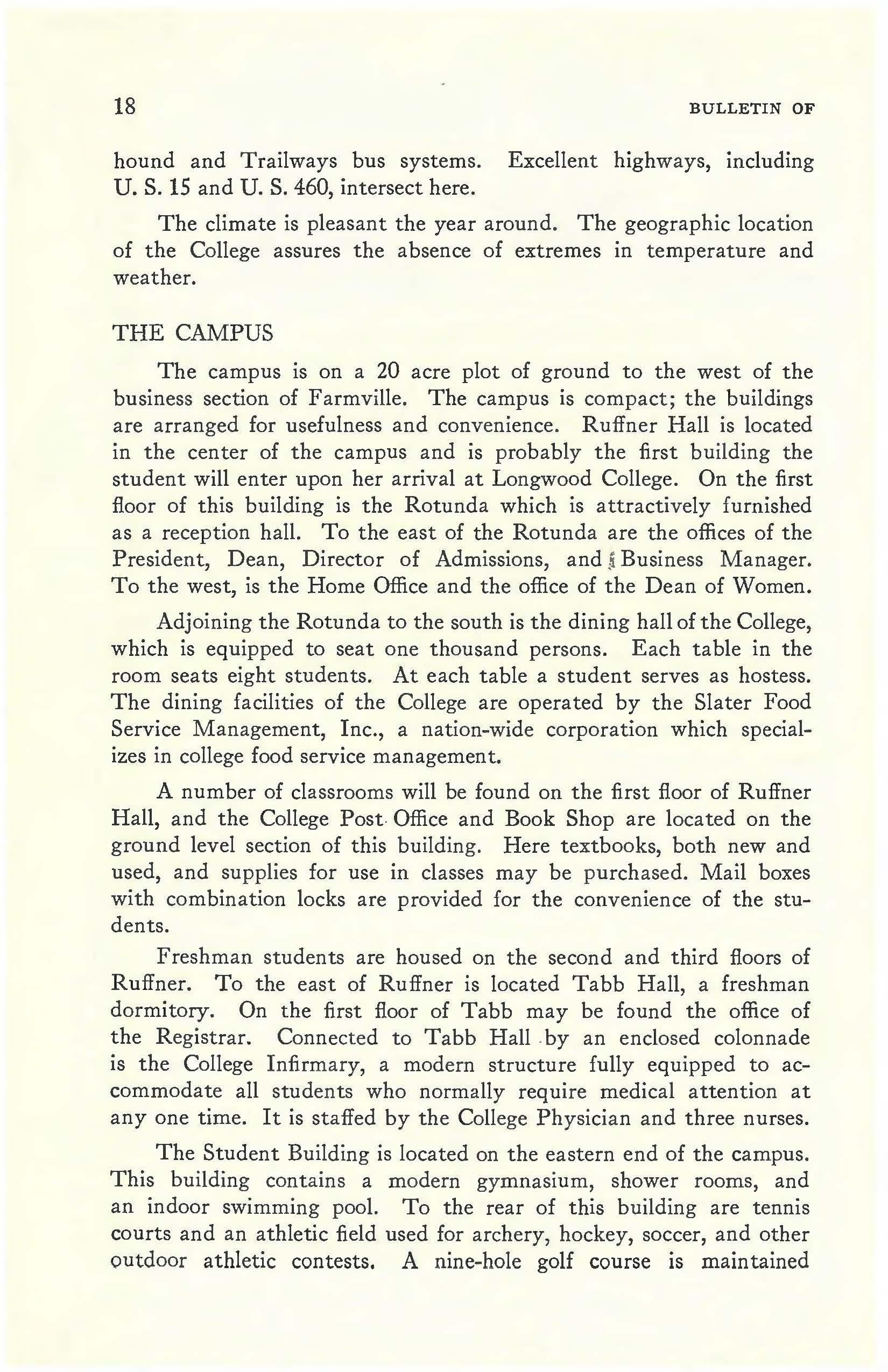
A number of classrooms will be found on the first floor of Ruffner Hall, and the College Post Office and Book Shop are located on the ground level section of this building. Here textbooks, both new and used, and supplies for use in classes may be purchased. Mail boxes with combination locks are provided for the convenience of the students.
Freshman students are housed on the second and third floors of Ruffner. To the east of Ruffner is located Tabb Hall, a freshman dormitory. On the first floor of Tabb may be found the office of the Registrar. Connected to Tabb Hall . by an enclosed colonnade is the College Infirmary, a modern structure fully equipped to accommodate all students who normally require medical attention at any one time. It is staffed by the College Physician and three nurses.
The Student Building is located on the eastern end of the campus. This building contains a modern gymnasium, shower rooms, and an indoor swimming pool. To the rear of this building are tennis courts and an athletic field used for archery, hockey, soccer, and other outdoor athletic contests. A nine-hole golf course is maintained
at Longwood Estate. The Y. W. C. A. cabinet room and reception room, the Student Government Room, Monogram Club Room, Town Students' Room, and a small auditorium are located in the Student Building. Here, too, are rooms for each of the nine national social sororities having chapters at Longwood College.
At the western end of Ruffner Hall is the West Wing, the location of many of the classrooms. Housed on the first floor of this building is the regional Bureau of Teaching Materials which contains a large library of films and slides and numerous types of audio-visual equipment.
To the west of Ruffner we find the Library and the Jarman Auditorium and Music Building. To the south of these buildings are located Stevens Hall, housing the department of natural sciences; Cunningham Hall, and Wheeler Hall, modern dormitories.
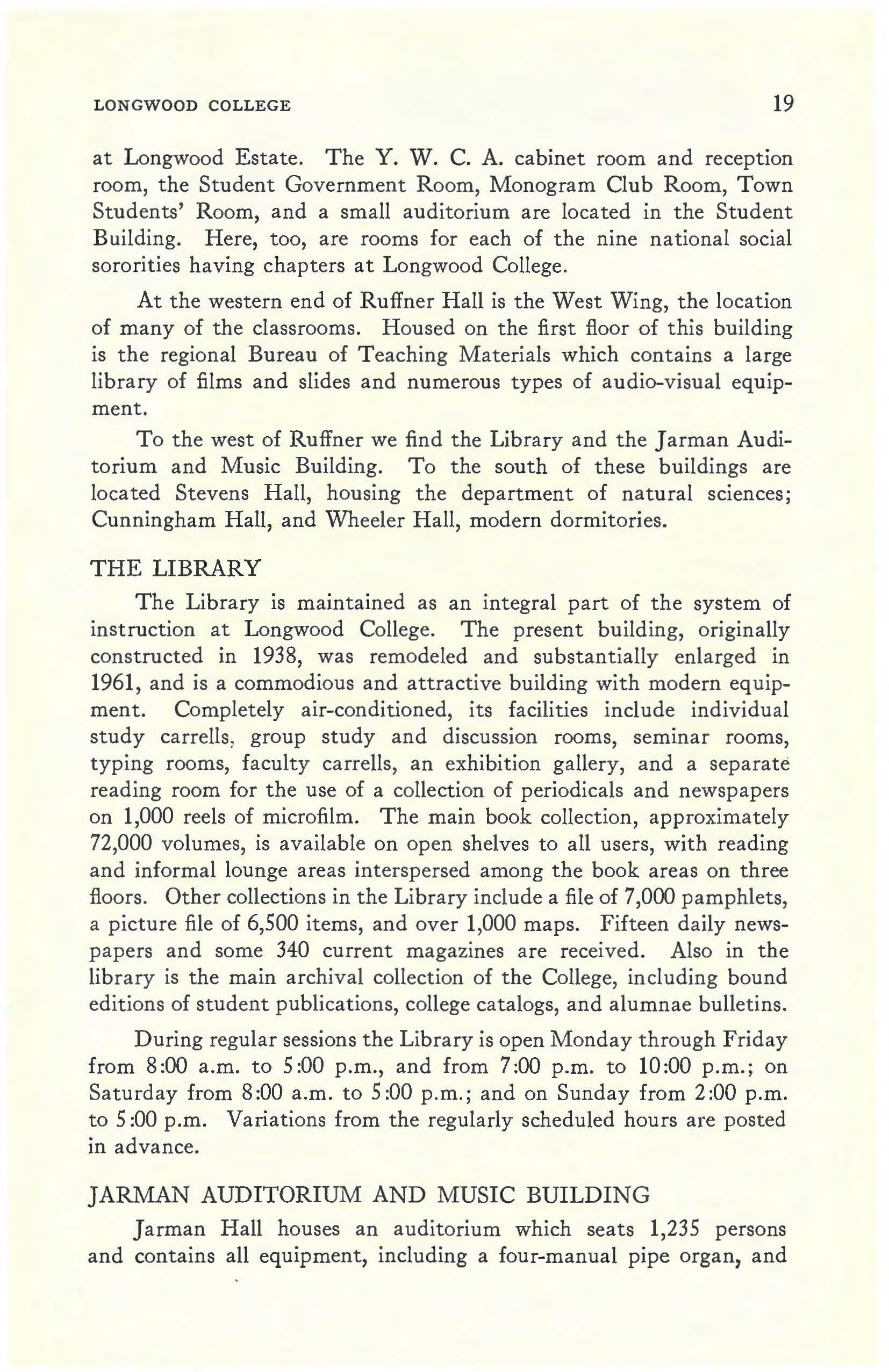
The Library is maintained as an integral part of the system of instruction at Longwood College. The present building, originally constructed in 1938, was remodeled and substantially enlarged in 1961, and is a commodious and attractive building with modern equipment. Completely air-conditioned, its facilities include individual study carrells, group study and discussion rooms, seminar rooms, typing rooms, faculty carrells, an exhibition gallery, and a separate reading room for the use of a collection of periodicals and newspapers on 1,000 reels of microfilm. The main book collection, approximately 72,000 volumes, is available on open shelves to all users, with reading and informal lounge areas interspersed among the book areas on three floors . Other collections in the Library include a file of 7,000 pamphlets, a picture file of 6,500 items, and over 1,000 maps. Fifteen daily newspapers and some 340 current magazines are received. Also in the library is the main archival collection of the College, including bound editions of student publications, college catalogs, and alumnae bulletins.
During regular sessions the Library is open Monday through Friday from 8 :00 a.m. to 5 :00 p.m., and from 7 :00 p.m. to 10 :00 p.m.; on Saturday from 8 :00 a.m. to 5 :00 p.m.; and on Sunday from 2 :00 p.m. to 5 :00 p.m. Variations from the regularly scheduled hours are posted in advance.
Jarman Hall houses an auditorium which seats 1,235 persons and contains all equipment, including a four-manual pipe organ, and
space necessary to stage elaborate productions of varied types. The music building, which is a part of Jarman Hall, contains classrooms, offices, soundproof individual practice rooms and studios, an instrument storage room, and a large band and orchestra rehearsal room. Among the various types of equipment there are twenty pianos; electronic organs; a Steinway and a Mason and Hamlin concert grand piano; a Baldwin small grand piano; a Sperrhake two manual Harpsichord; all types of string, reed, brass, and percussion instruments; a library of recordings and music; phonographs, tape recorders, and a listening room for recorded music.
Stevens Hall, located on the southwestern side of the campus, contains lecture rooms and laboratories for biology, chemistry, geology, geography, general science, and physics. A greenhouse is located in the rear for use by the Department of Natural Sciences. Modern in every respect this hall enables the College to offer excellent preparation in science.
The College Museum, which is located in Stevens Hall, contains more than 1,200 minerals, rocks, fossils, plants, and animals. Most of the geological specimens were gifts from the private collections of D. A. Brodie and H. B. Derr.
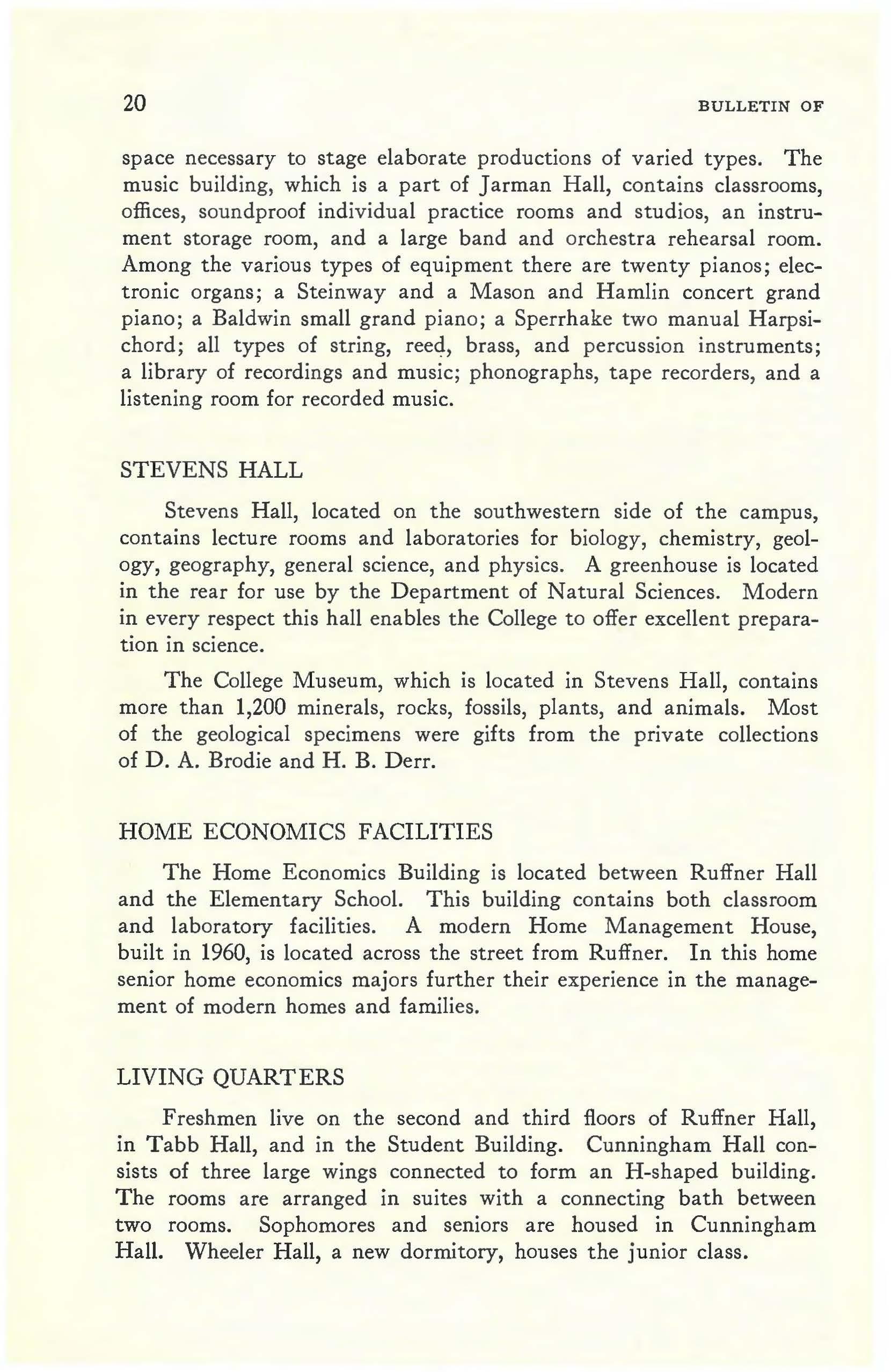
The Home Economics Building is located between Ruffner Hall and the Elementary School. This building contains both classroom and laboratory facilities. A modern Home Management House, built in 1960, is located across the street from Ruffner. In this home senior home economics majors further their experience in the management of modern homes and families.
Freshmen live on the second and third floors of Ruffner Hall, in Tabb Hall, and in the Student Building. Cunningham Hall consists of three large wings connected to form an H-shaped building. The rooms are arranged in suites with a connecting bath between two rooms. Sophomores and seniors are housed in Cunningham Hall. Wheeler Hall, a new dormitory, houses the junior class.
Student life in each dormitory is supervised by a Head Resident. The care of all dormitory rooms and buildings is under the supervision of Housekeeping Supervisors.
The dormitories are designed especially to meet the living needs of college students. A typical room has two single beds, two desks, a dresser, bookshelves, chairs, and two closets. Study lamps, bedspreads, bed linen, blankets, and towels are to be furnished by the student. Drapes and rugs may be furnished by the student if desired. The College Laundry is located on the campus and is equipped with the necessary personnel and machinery to render excellent service to students. Automatic washing machines are also available for student use and are located in the dormitories in rooms planned for this purpose.
Various recreation centers are located on the campus. Beneath the dining room in Ruffner Hall is a recreation hall where students hold dances, play table tennis and shuffleboard, watch television, and meet for various other types of informal gatherings. Located in a part of this recreation center is the "Snack Bar", a modern soda fountain operated by the Alumnae Association.
Each dormitory has a pleasant lounge with television where students can relax when studying is finished for the evening or where relatives and friends can be entertained when they come for a visit. Each dormitory is also equipped with formal entertainment rooms.
A Tearoom, well-known for its delicious food, is operated by the College and is located in Ruffner Hall. Here students, visitors, and faculty members may obtain breakfast and lunch at- reasonable cost.
The Longwood Estate, located at the eastern edge of Farmville, is owned and maintained by the College. (See the section of this catalogue describing the history of the College.) Here, in the atmosphere of the Old South, students have teas, banquets, receptions, and week-end parties in the historic home. The estate comprises 103 acres of beautiful, rolling grounds with a nin~hole golf course. In a wooded section is a natural amphitheatre where May Day festivals are held and a log cabin where students and chaperones may stay overnight.

The· public schools in the counties adjacent to Farmville, the Roanoke City public schools, the Danville City public schools, and the Richmond City public schools cooperate with the College in making facilities available for student teaching.
These schools are well equipped with laboratories, libraries, cafeterias, and workrooms. The faculties include teachers who are well qualified as supervising teachers.
The College program and the program of student teaching are coordinated through the Department of Education.
The c'.)llege year consists of a regular session, including two semester of 18 weeks each, and a summer session of eight weeks. The summer session consists of an eight-week undergraduate term running concurrently with two graduate sessions of three and :five weeks each. Graduate classes are scheduled during the :five-week session six days each week. Students may enter in the summer or at the beginning of either semester of the regular session.
The College is fully accredited as a professional school for the training of teachers and as a liberal arts college. It is accredited by the Southern Association of Colleges and Secondary Schools, the National Council for Accreditation of Teacher Education, and the Virginia State Board of Education. It is on the list of colleges approved by the American Association of University Women. Its premedical curriculum is approved by the Council on Medical Education and Hospitals of the American Medical Association. Its preprofessional curricula in nursing and medical and X-ray techniques prepare students for admission to accredited schools.
The College is a member of the Association of American Colleges, American Association of Colleges for Teacher Education, Association of Virginia Colleges, National Association of Business Teachers Training Institutions, American Association of College Registrars and Admissions Officers, Southern Association of Colleges for Women, American Library Association, and the Virginia Museum of Fine Arts.
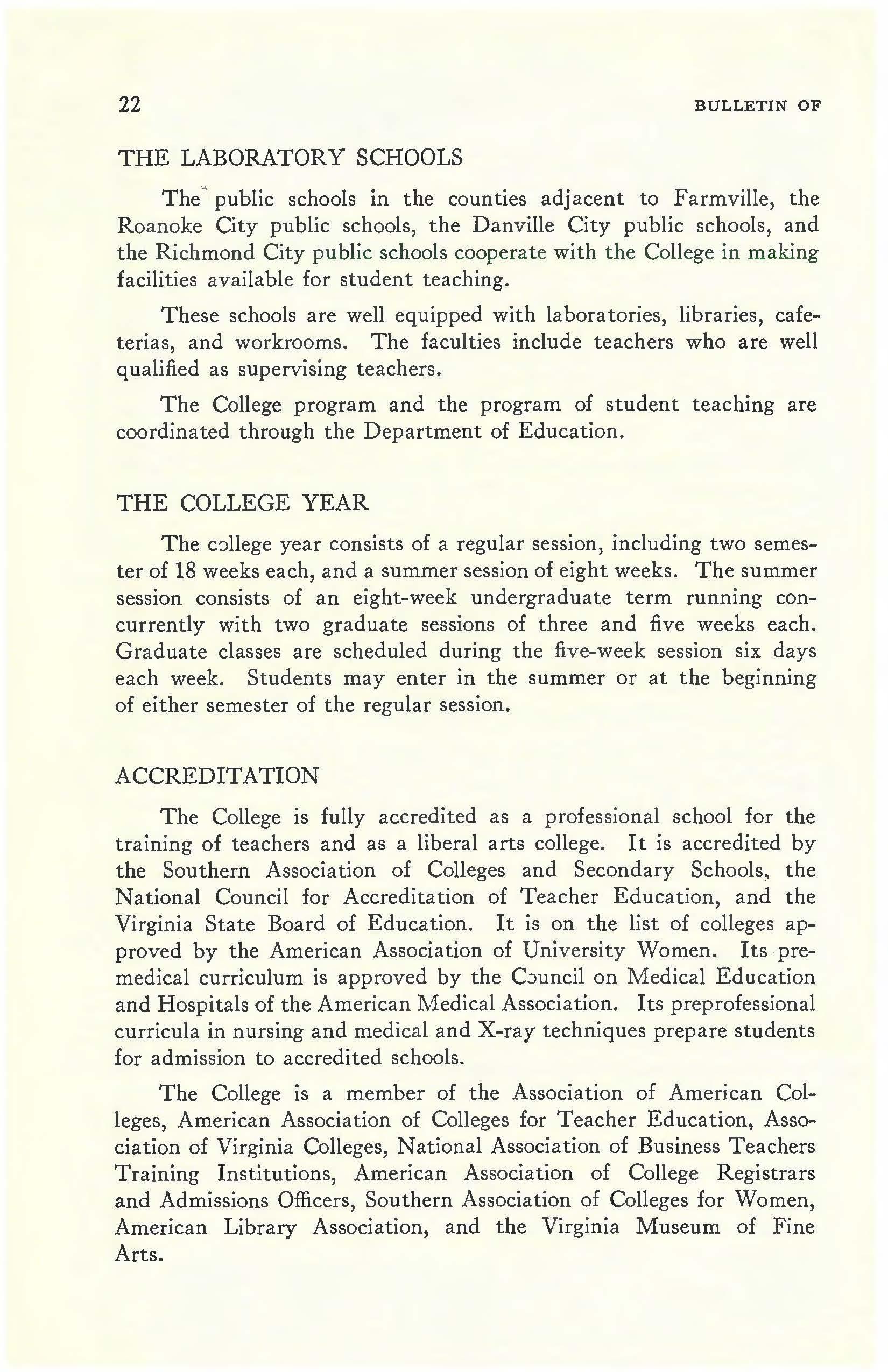
Longwood College is affi liated with the University Center in Virginia, an agency which brings nationally-known scholars and lecturers to the Virginia area and arranges programs of research, cooperative professorships, adult education, and library exchanges among member colleges. Longwood shares directly in the enrich ed educational activity made possible through the joint efforts of the institutions affiliated with the Center.
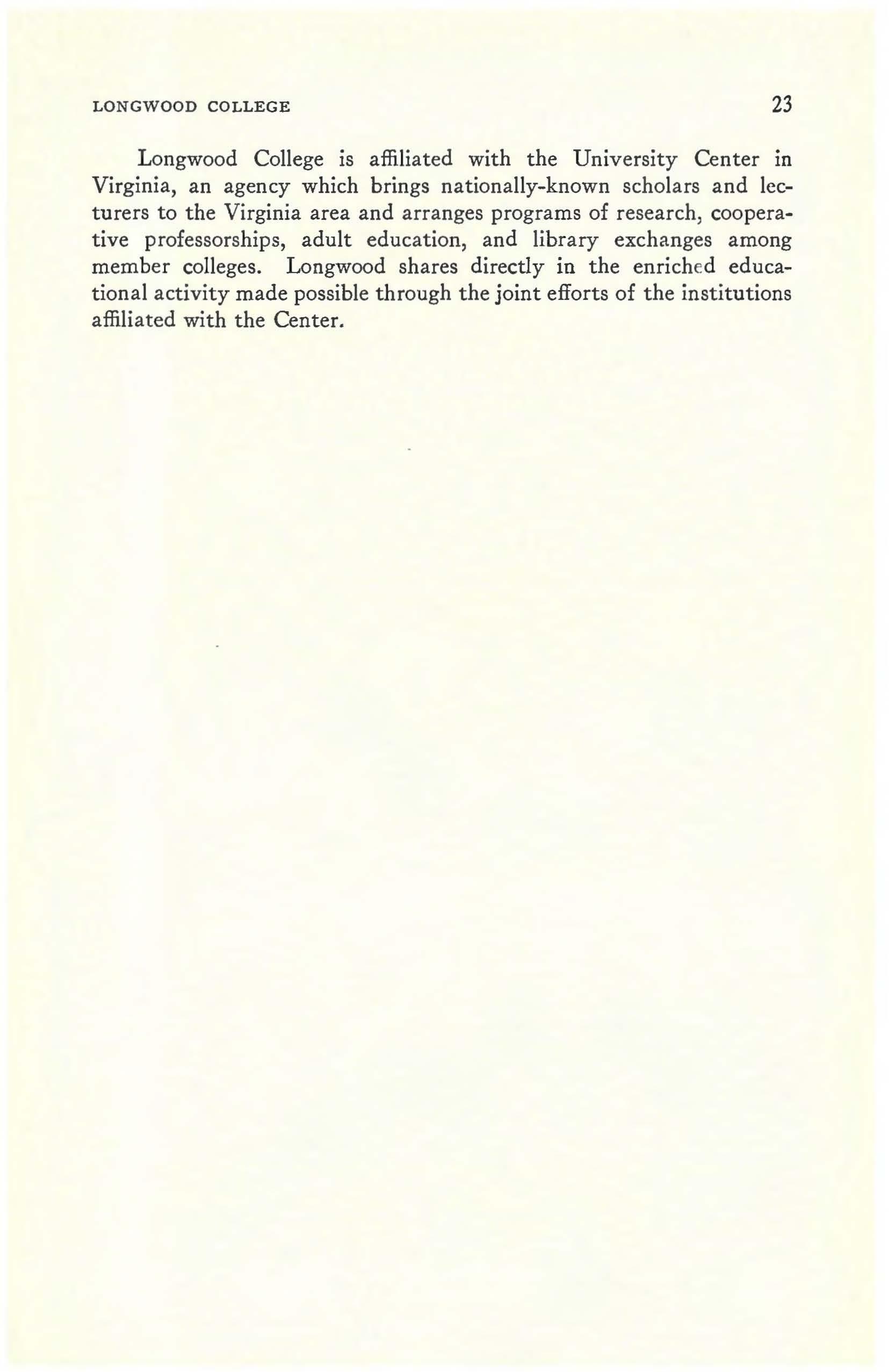
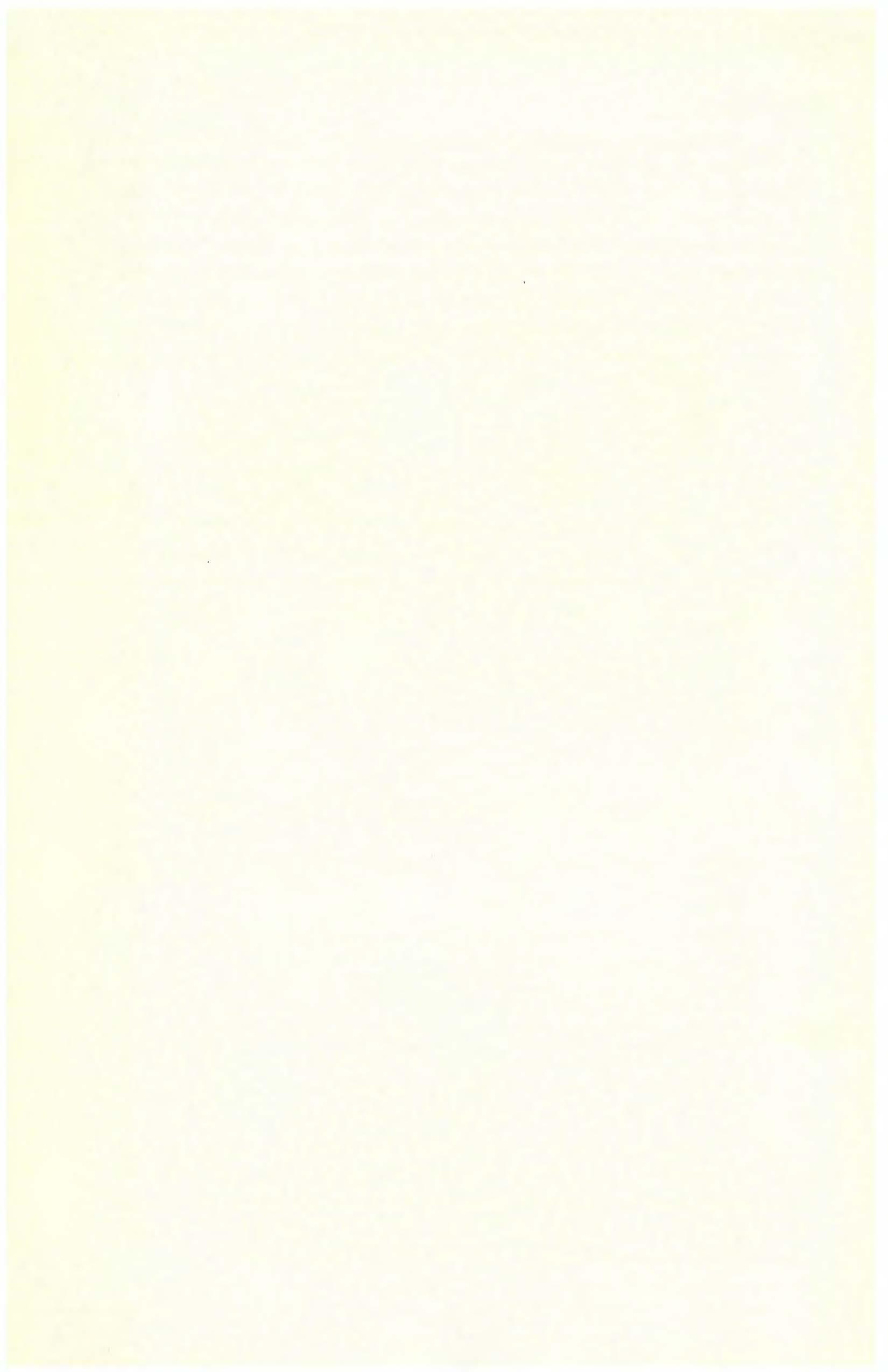
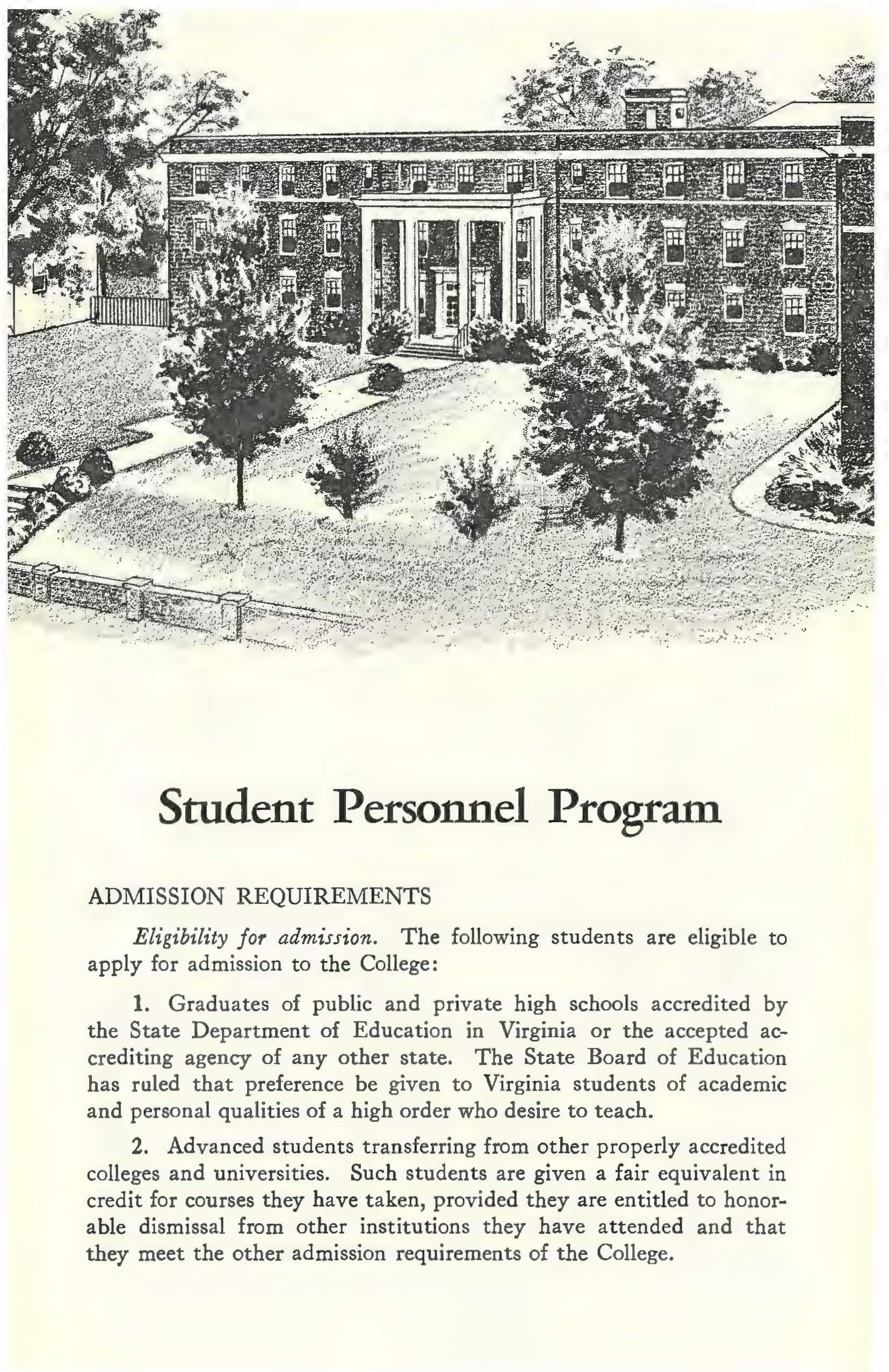
Eligibility for admission. The following students are eligible to apply for admission to the College:
1. Graduates of public and private high schools accredited by the State Department of Education in Virginia or the accepted accrediting agency of any other state. The State Board of Education has ruled that preference be given to Virginia students of academic and personal qualities of a high order who desire to teach.
2. Advanced students transferring from other properly accredited colleges and universities. Such students are given a fair equivalent in credit for courses they have taken, provided they are entitled to honorable dismissal from other institutions they have attended and that they meet the other admission requirements of the College.
High school credits. Longwood College requires for admission: 4 units in English, 1 unit in American history, 1 unit in American government, 1 unit in science, and 1 unit in mathematics.
Longwood College welcomes applications from prospective students. The admission of all students is on a selective basis. Priority is given to the best qualified applicants. A student should rank in the upper half of her class and have made a score on the Scholastic Aptitude Test of the College Entrance Examination Board high enough to indicate success at Longwood College. In order to apply for admission a student must take the following steps:
1. Submit the preliminary application blank found in the back of this catalogue. This must be accompanied by an application fee of ten dollars, which will not be refunded. Checks and money orders should be made payable to Longwood College. ~_-]2. Fill out and return to the Director of Admissions a detailed application blank that will be sent to her when the College receives the preliminary application blank.
3. Request that the principal of the high school from which she was (or is to be) graduated submit to the Director of Admissions a transcript of her high school record on a form provided by the College. Students who have attended other colleges and universities must likewise request that the registrars of those institutions send complete transcripts of their records.
All applicants are required to take the Scholastic Aptitude Test of the College Entrance Examination Board and request that the test score be sent to the Director of Admissions of Longwood College. Data from Scholastic Aptitude tests administered by the State Department of Education in cooperation with the local school divisions will be reported by the high school principal on the transcript form.
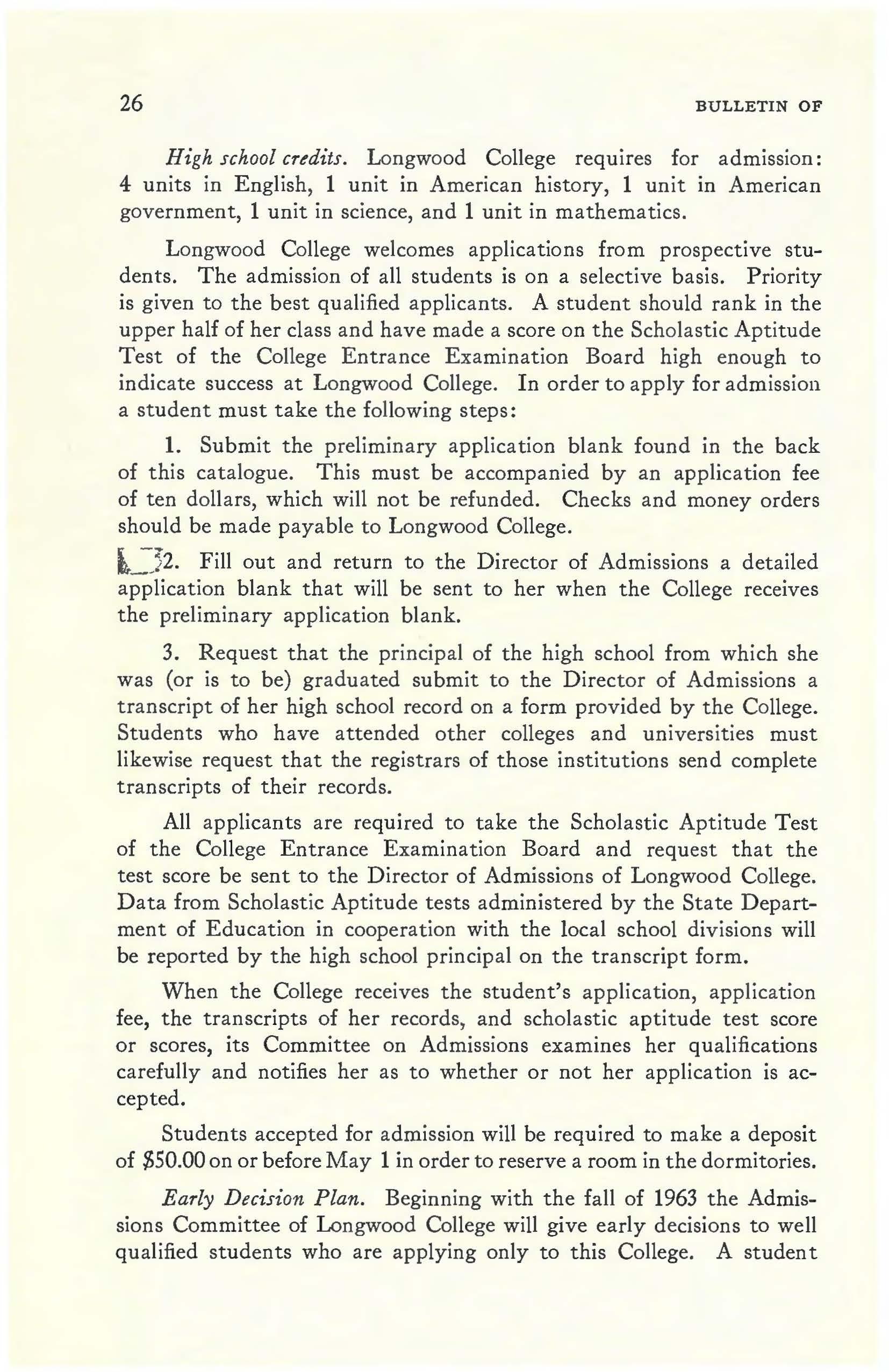
When the College receives the student's application, application fee, the transcripts of her records, and scholastic aptitude test score or scores, its Committee on Admissions examines her qualifications carefully and notifies her as to whether or not her application is accepted.
Students accepted for admission will be required to make a deposit of $50.00 on or before May 1 in order to reserve a room in the dormitories. Early Decision Plan. Beginning with the fall of 1963 the Admissions Committee of Longwood College will give early decisions to well qualified students who are applying only to this College. A student
who wishes to be considered under the Early Decision Plan must apply by October 1 of the senior year and her school must certify that she has filed only one application. A student interested in Early Decision should communicate with the Director of Admissions. Decisions will be based on the applicant's three-year high school record, the school's recommendation, and the Scholastic Aptitude Test of the College Entrance Examination Board taken in the preceding May or August. Decisions of the Committee will be reported to Early Decision applicants in the first half of December.
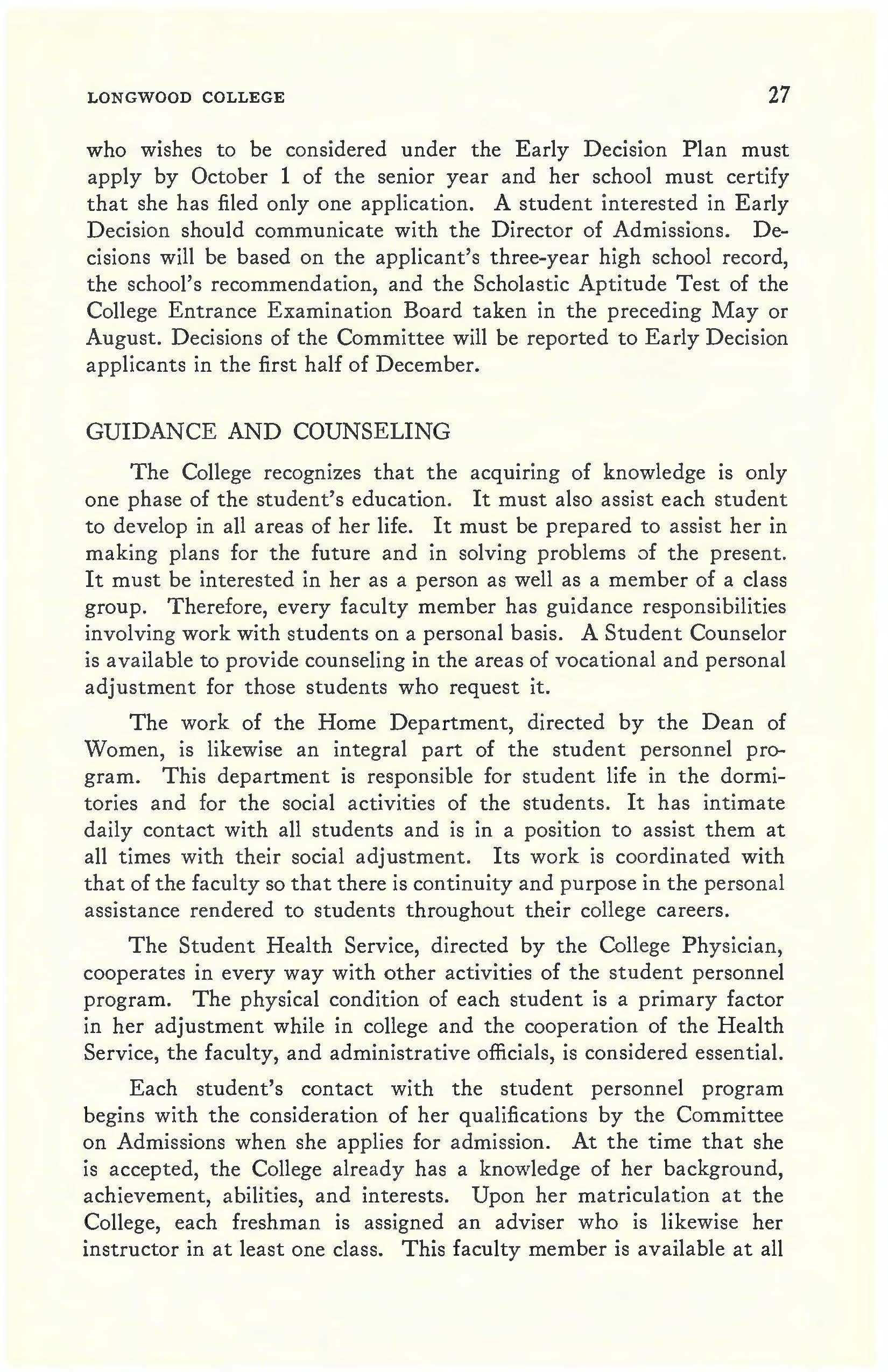
The College recognizes that the acqumng of knowledge is only one phase of the student's education. It must also assist each student to develop in all areas of her life. It must be prepared to assist her in making plans for the future and in solving problems of the present. It must be interested in her as a person as well as a member of a class group. Therefore, every faculty member has guidance responsibilities involving work with students on a personal basis. A Student Counselor is available to provide counseling in the areas of vocational and personal adjustment for those students who request it.
The work of the Home Department, directed by the Dean of Women, is likewise an integral part of the student personnel program. This department is responsible for student life in the dormitories and for the social activities of the students. It has intimate daily contact with all students and is in a position to assist them at all times with their social adjustment. Its work is coordinated with that of the faculty so that there is continuity and purpose in the personal assistance rendered to students throughout their college careers.
The Student Health Service, directed by the College Physician, cooperates in every way with other activities of the student personnel program. The physical condition of each student is a primary factor in her adjustment while in college and the cooperation of the Health Service, the faculty, and administrative officials, is considered essential.
Each student's contact with the student personnel program begins with the consideration of her qualifications by the Committee on Admissions when she applies for admission. At the time that she is accepted, the College already has a knowledge of her background, achievement, abilities, and interests. Upon her matriculation at the College, each freshman is assigned an adviser who is likewise her instructor in at least one class. This faculty member is available at all
times to give her assistance in making her plans and solving her problems in an intelligent manner. The College maintains extensive personnel records on each student . .
The College recognizes that many students have not decided definitely on a specific course of study or vocation at the time that they enter as freshmen. Therefore, they are not required to make a choice at the time that they begin their studies. All freshmen take a common core of general courses. The required subjects in this are English, history or geography, a science, and physical education. In addition, they elect courses in other subjects in which they are interested. This gives them an opportunity to "explore" during their freshman year · in such a way that they are better prepared to make definite choices as to what they will study throughout the remainder of their college career.
The first week of each regular session is known as "Orientation Week" for freshmen and other new students. The administrative officials of the College, in cooperation with the members of the Y. W. C. A. and carefully selected students who serve as orientation leaders, conduct a program of study and activities which acquaints the new students with the customs, traditions, and regulations of the College. This program has proved to be exceedingly valuable to new students as they adjust to the life on the campus. Throughout the country, the College is known for the sincere interest shown by the student body, faculty, and administrative officials in those beginning their study here.
The Student Health Service of the College upholds the highest standards of physical and mental health and emphasizes the prevention of illness. An excellent health record has been maintained here because of the close cooperation between the College Physician and other departments that are in a position to assist in the promotion of student health.
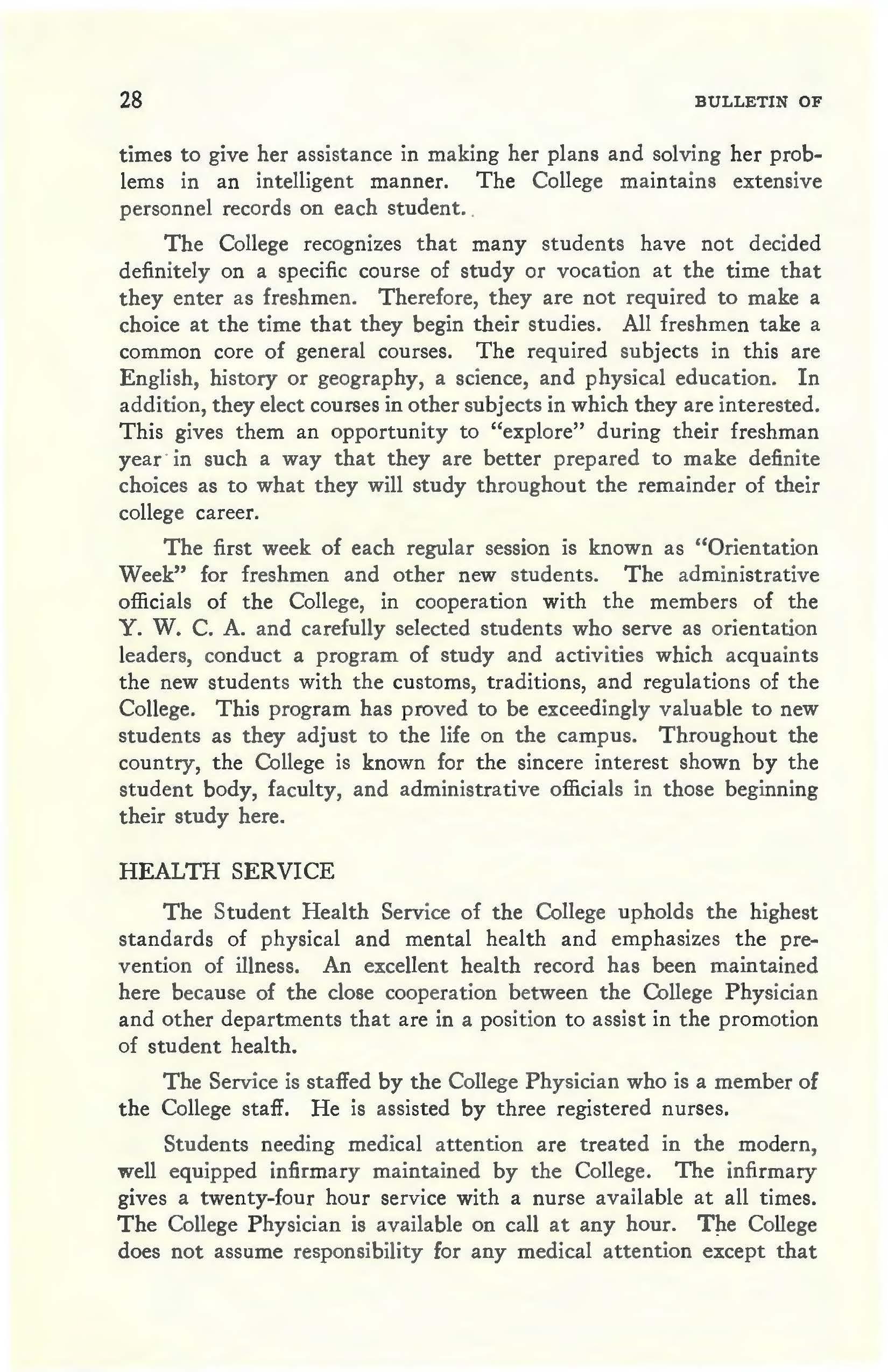
The Service is staffed by the College Physician who is a member of the College staff. He is assisted by three registered nurses.
Students needing medical attention are treated in the modern, well equipped infirmary maintained by the College. The infirmary gives a twenty-four hour service with a nurse available at all times. The College Physician is available on call at any hour. T~e College does not assume responsibility for any medical attention except that
given by the College Physician and by the nurses. Consultants, hospitalization, private nurses, special prescriptions, X-rays, other laboratory work, etc., are at the expense of the student. The College Physician communicates with the parents immediately in case of serious illness.
The Southside Community Hospital is located only a few blocks from the College. It is well equipped and is in the charge of a capable staff of physicians and surgeons. The College Physician is a member of the staff, and a Diplomate of the American Board of Internal Medicine.
A library orientation program, required of all freshmen, is given by members of the English department in cooperation with the library staff. By means of this program students become familiar with the library building and its functional divisions, with the various book collections, and with general and special reference tools. They learn how to borrow library materials, how to use the Faculty Reserve Collection, and how to locate subject material or speci£c books. This program is followed by individual and group instruction throughout the entire four years of college.
Library service to alumnae is rendered locally or by mail. Loan service to teachers in Southside Virginia is formally organized according to the regionii.l plan put into effect by the State Board of Education. It is the aim of the library to obtain maximum use of its materials by students, alumnae, teachers and other friends of the College.
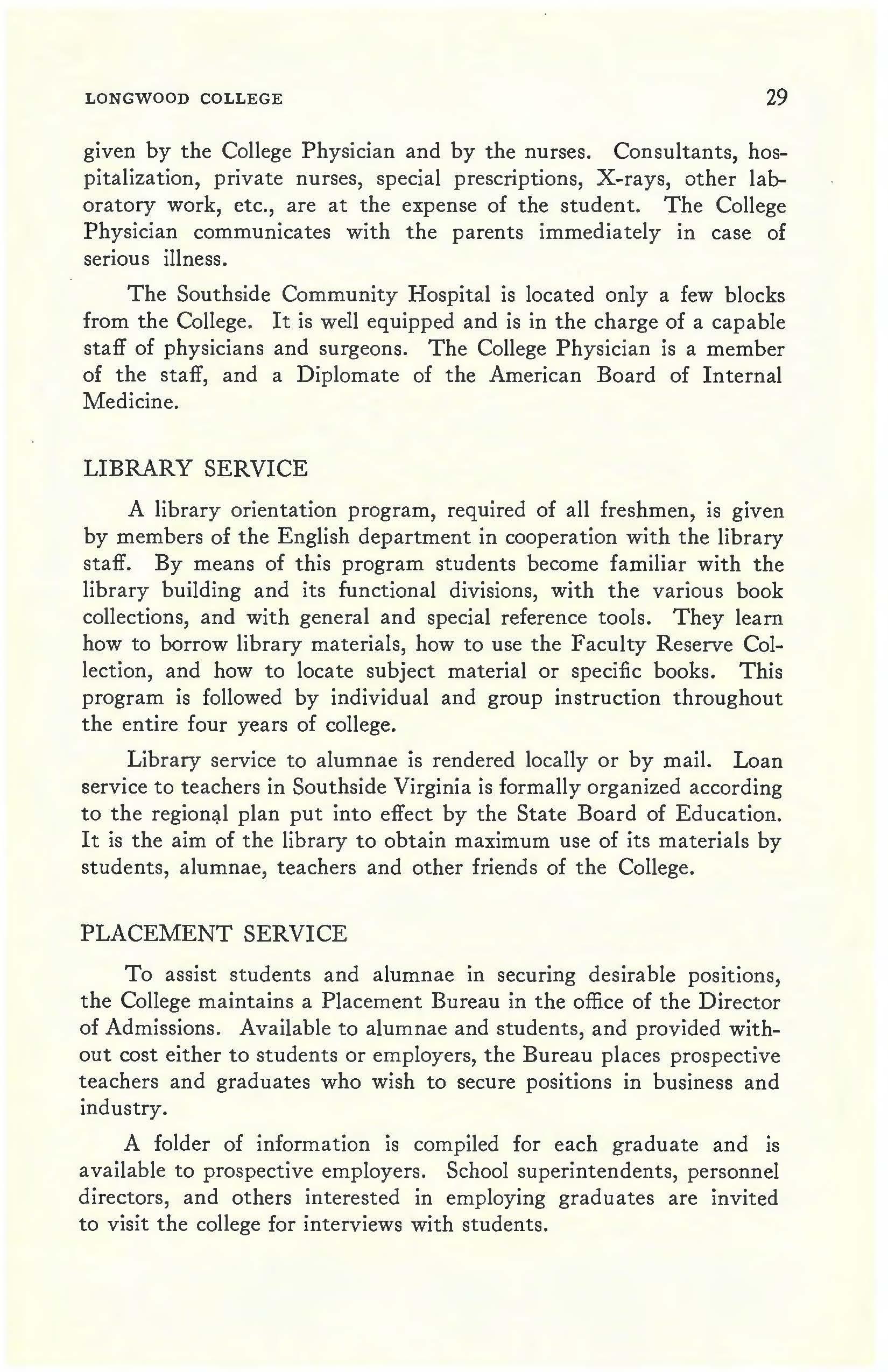
To assist students and a lumnae in securing desirable pos1t1ons, the College maintains a Placement Bureau in the office of the Director of Admissions. Available to alumnae and students, and provided without cost either to students or employers, the Bureau places prospective teachers and graduates who wish to secure positions in business and industry.
A folder of information is compiled for each graduate and is available to prospective employers. School superintendents, personnel directors, and others interested in employing graduates are invited to visit the college for interviews with students.
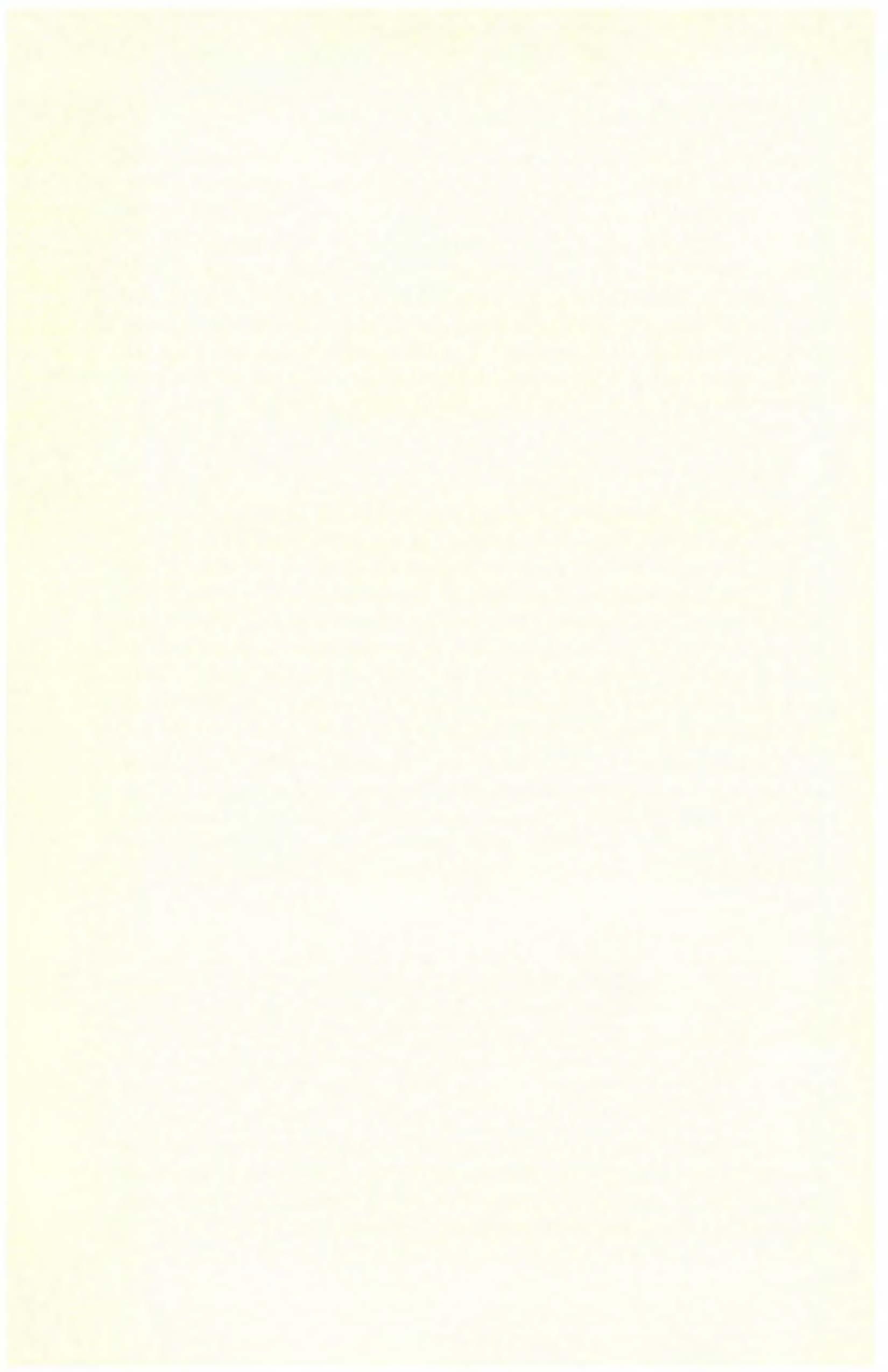
The faculty and administrative officials of the College believe that their primary responsibility is to assist students to be welladjusted, useful citizens in the state and nation. Therefore, attention is given to all aspects of student life on the campus.
In the section of this catalogue describing the Student Health Service, the College's activities relating to physical life are outlined. Summarized below are other aspects of college life which receive careful attention.
The moral and religious aspects of education are considered as important as are the physical and intellectual. During the history of the College a tradition of good will, cooperation, and high standards of personal relationship has developed. Such a stabilizing influence cannot be described; it can be appreciated only through living in the
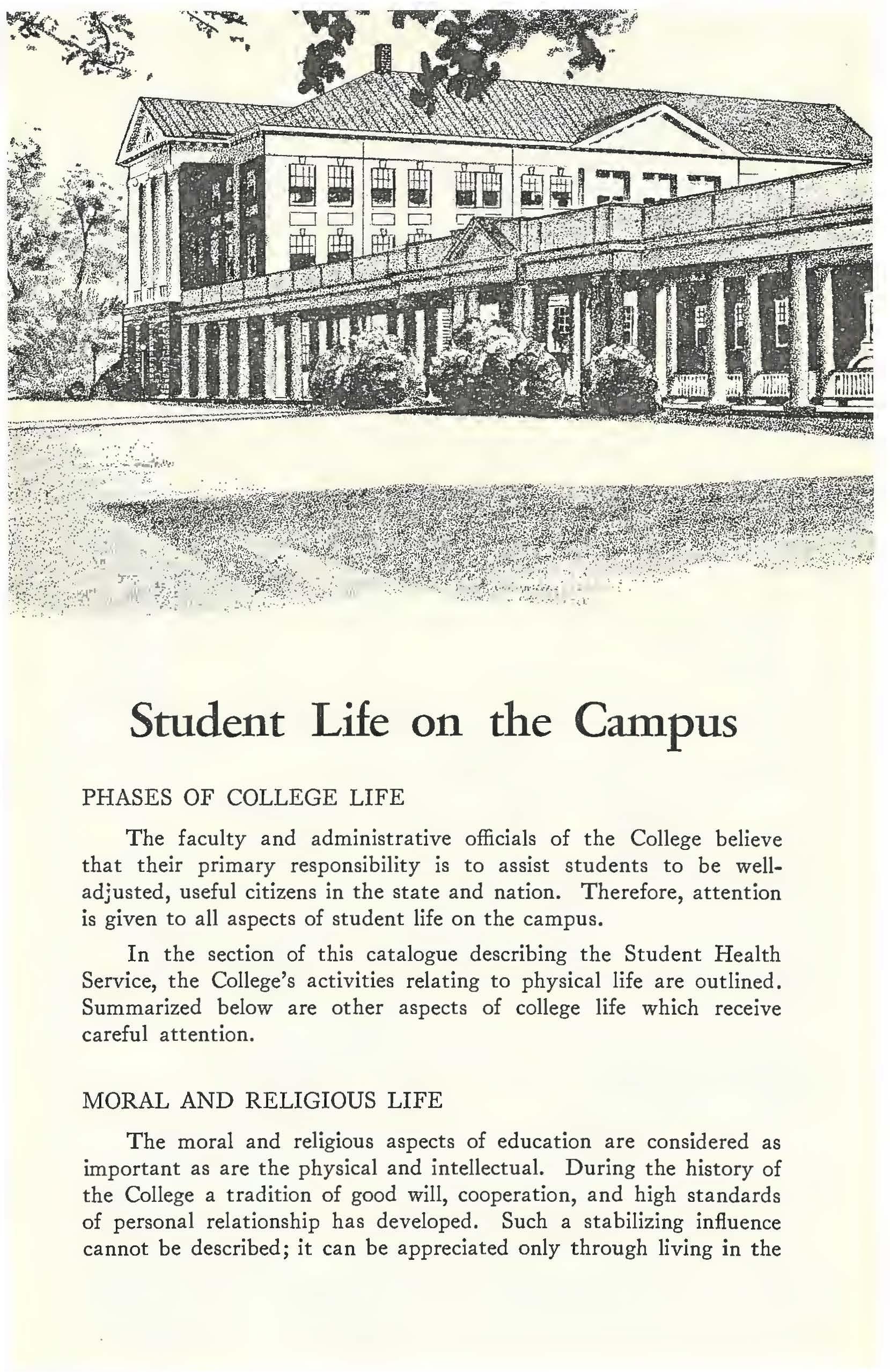
atmosphere it engenders. But this intangible influence is experienced by both students and faculty to such a degree that it has become a distinct moral force in the whole College community.
The College is a home in which everyone is expected to do his part and share in a give-and-take relationship with others. Certain modes of life are prized and valued because in a long history they have proved their worth. In such an atmosphere it is difficult for the young student to fail to develop high ideals and a wholesome moral outlook on life.
The Young Women's Christian Association is a strong religious force in the college. It provides training and experience for the officers and others interested in religious work. The Y. W. C. A. conducts daily evening prayer services, urges attendance at church school and church, and fosters a spirit of religious life and service. Under its auspices a Religious Emphasis Week is observed; a series of addresses by some Christian leader is given each year on the fundamental principles of the Christian religion, and noted speakers representing the international point of view address the students on important current movements.
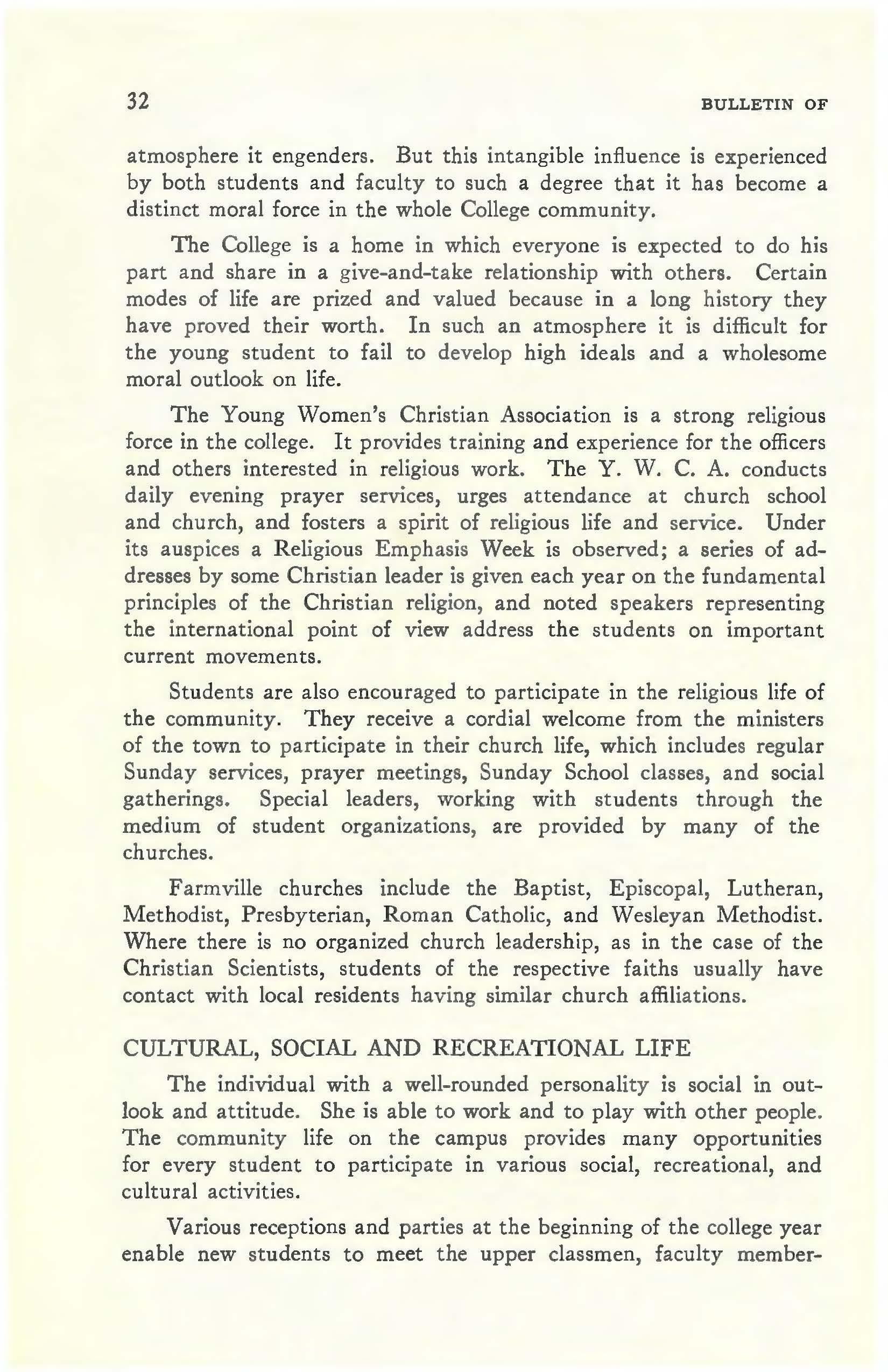
Students are also encouraged to participate in the religious life of the community. They receive a cordial welcome from the ministers of the town to participate in their church life, which includes regular Sunday services, prayer meetings, Sunday School classes, and social gatherings. Special leaders, working with students through the medium of student organizations, are provided by many of the churches.
Farmville churches include the Baptist, Episcopal, Lutheran, Methodist, Presbyterian, Roman Catholic, and Wesleyan Methodist. Where there is no organized church leadership, as in the case of the Christian Scientists, students of the respective faiths usually have contact with local residents having similar church affiliations.
The individual with a well-rounded personality is social in outlook and attitude. She is able to work and to play with other people . The community life on the campus provides many opportunities for every student to participate in various social, recreational, and cultural activities.
Various receptions and parties at the beginning of the college year enable new students to meet the upper classmen, faculty member-
ben, and administrative officials. The College Circus, presented each fall by the four classes, provides entertainment and develops a spirit of cooperation and friendliness among the students. The Founders Day celebration, held yearly in March, brings together alumnae, students, and faculty members. The May Day Festival, held at the Longwood Estate on the first Saturday in May, is an outstanding event sponsored by a general committee chosen from the student body.
Numerous dances and productions are presented during the year by the classes and student organizations. Picnic:s and hikes are held during the fall and spring months. Intramural and varsity competition in various sports, including archery, basketball, golf, hockey, swimming, softball, tennis, and volleyball, provide opportunities for participation on the part of all students.
The College's choir, band, orchestra, Madrigal Singers, and chorus are open to students interested in music. The Longwood Players provides excellent experience for students interested in dramatics. Radio and television programs are presented on the local stations by various student and faculty groups. The College's weekly newspaper, literary magazine, and yearbook are prepared and edited by students interested in writing and editorial work.
A weekly assembly is attended by all students. Distinguished speakers and other programs of interest are presented. Artist series, programs featuring outstanding lecturers and various artists of the entertainment world are presented at intervals during the year. Among the outstanding speakers, artists, and programs presented on the Longwood campus during the 1961-62 session were the following: Dr. Harlow Shapley, Danforth Scholar; Dr. Mortimer Caplin, Commissioner of Internal Revenue; Columbus Boychoir; Cello Concert by Henri Honegger; Fall Play, "The Honorable Crichton", by Sir James Barrie; "Richard III", presented by Players Incorporated; Folk Song Recital by Richard Dyer-Bennett; Theodore Ullman, Pianist; Dr. Stanley Kunitz, Danforth Scholar.
The Institute of Southern Culture was established at Longwood College in 1956 to promote the study of traditional aspects of Southern civilization through academic course work, special lectures, and through the publication of research in the field. The Institute is currently sponsoring two series of lectures in the spring and summer by visiting scholars and members of the faculty. Course work in several de-
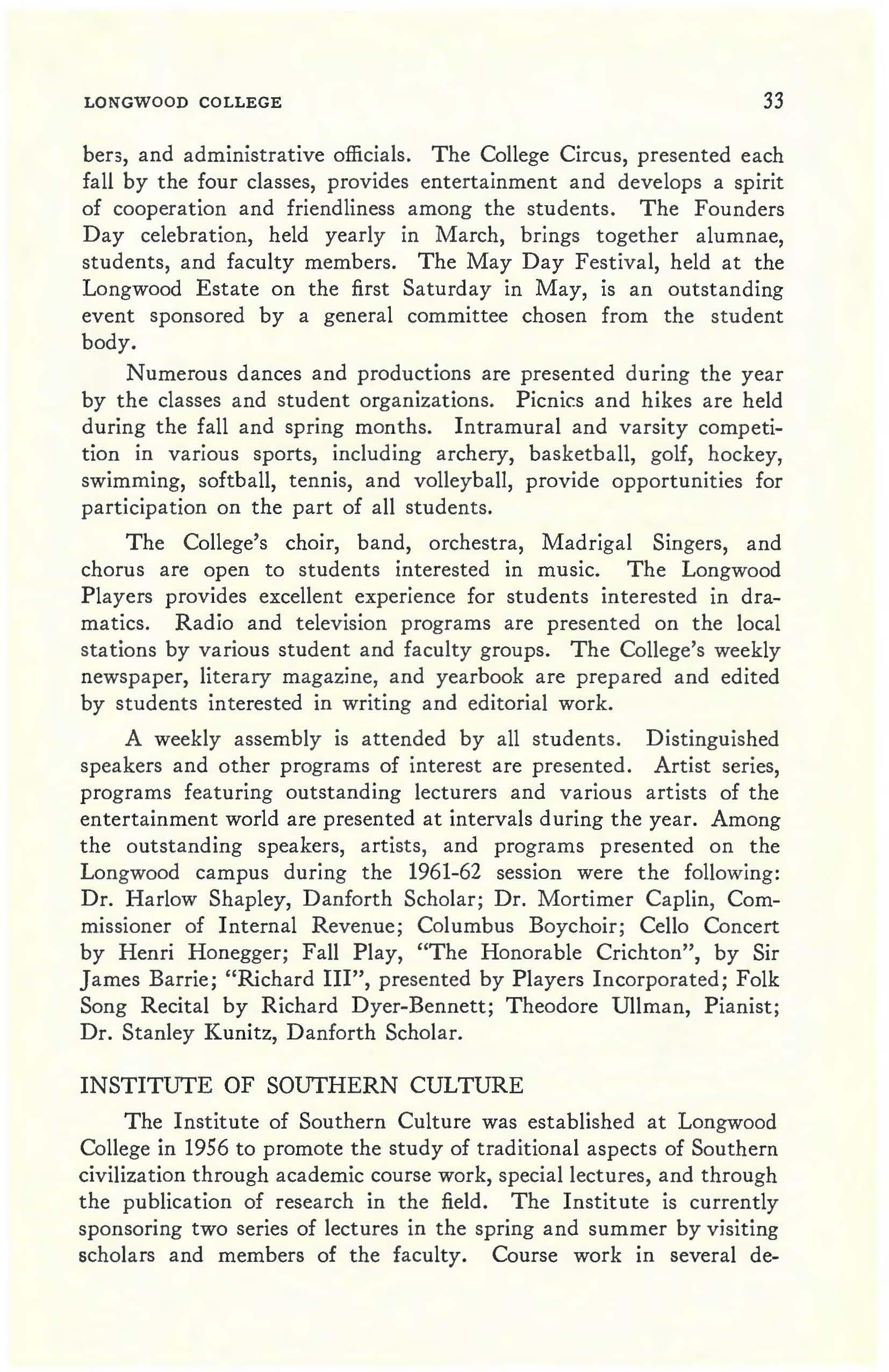
partments of the College also provides a means for exchange of ideas about various aspects of Southern life. Financial support for the Institute is provided by the Longwood College Alumnae Association.
The academic and professional life of the College constitutes the main emphasis to which all other activities are secondary and contributory. It centers around the courses of instruction offered in the various departments of the College. Some courses are primarily cultural, liberal, and broadening in outlook. Others are primarily professional and are designed to prepare students definitely for teaching in the elementary and secondary schools of the State or for other vocations. In still others academic scholarship and the professional spirit are very closely combined.
The College is a community, the residents of which are the students, faculty members, and administrative officials. These persons work together to maintain high standards of conduct and, like all other communities, have developed regulations by which the social life of its members is governed.
Students are expected to conduct themselves as ladies and gentlemen while on the campus, in the community, and at other colleges. They must keep in mind at all times that they are representatives of the College and that their conduct brings credit or discredit to the College as well as to themselves. Any questionable conduct will be dealt with at the discretion of the Student Government Association.
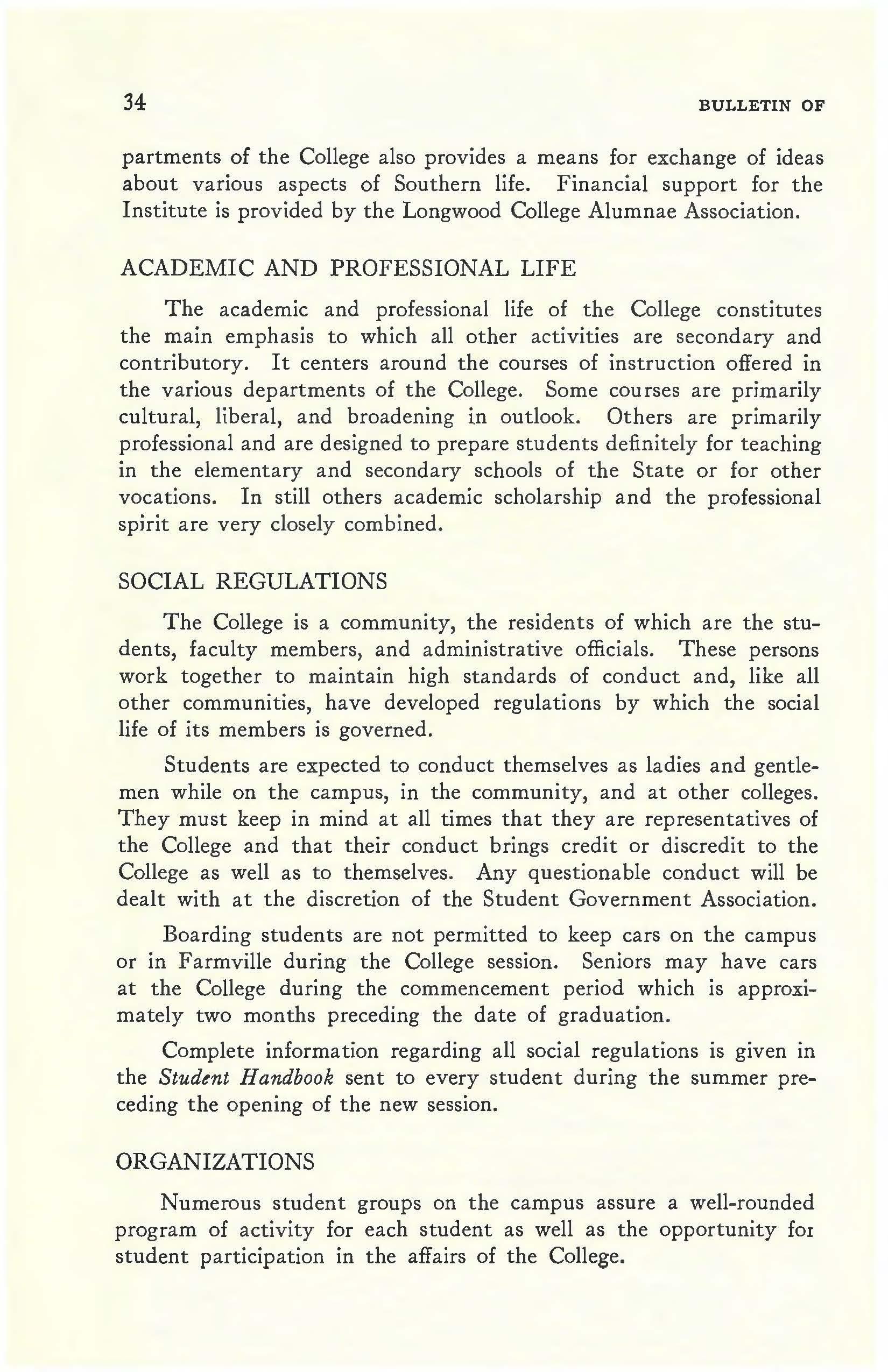
Boarding students are not permitted to keep cars on the campus or in Farmville during the College session. Seniors may have cars at the College during the commencement period which is approximately two months preceding the date of graduation.
Complete information regarding all social regulations is given in the Student Handbook sent to every student during the summer preceding the opening of the new session.
Numerous student groups on the campus assure a well-rounded program of activity for each student as well as the opportunity for student participation in the affairs of the College.
All students of the College are members of the Student Government Association which is directed by a Student Council composed of officers and members elected by the student body. This group manages the affairs of the students in cooperation with the administrative officials of the College. Regulations governing the conduct of students both on and off the campus are enacted and enforced by them.
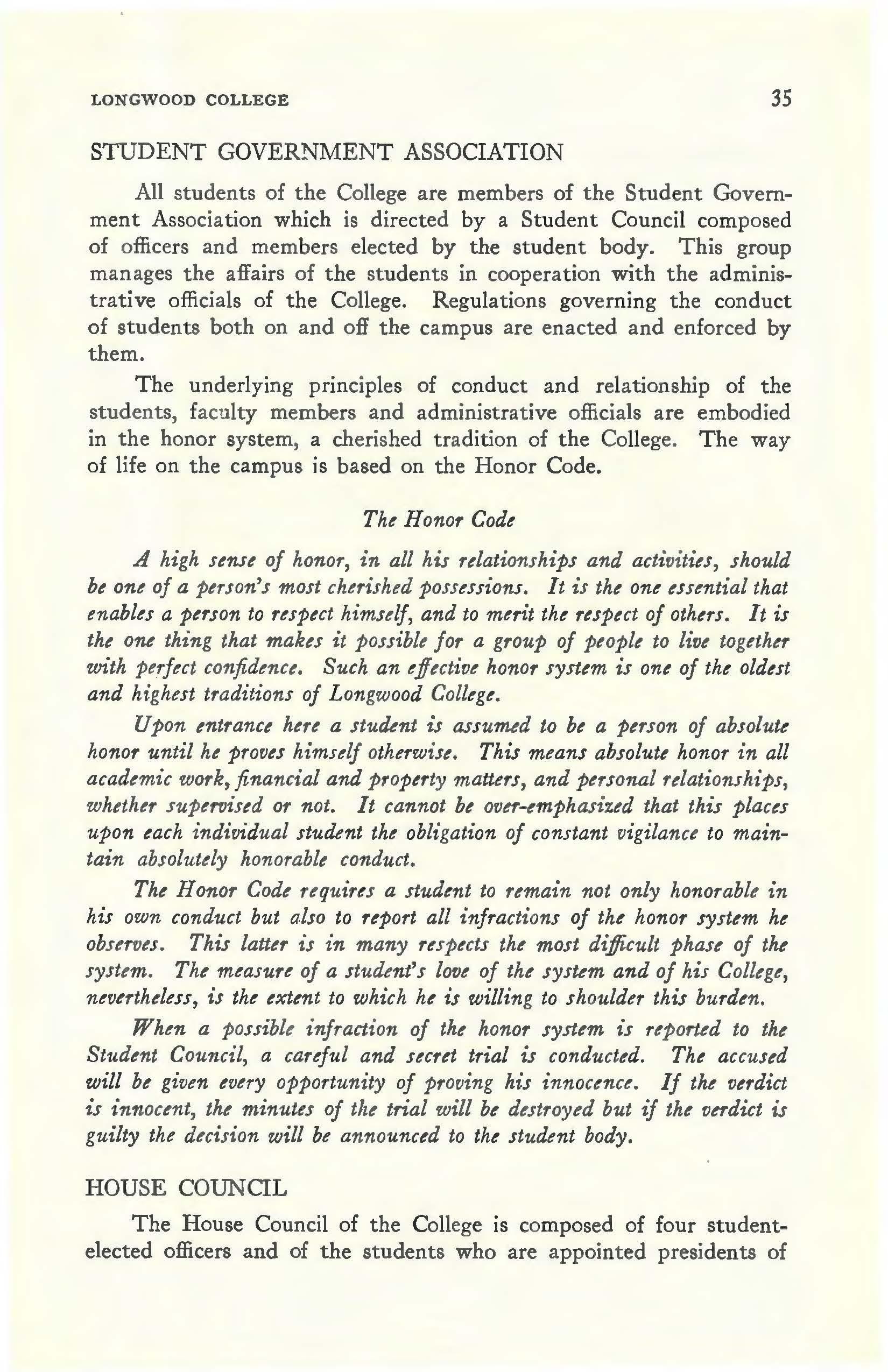
The underlying principles of conduct and relationship of the students, faculty members and administrative officials are embodied in the honor system, a cherished tradition of the Co lleg e. The way of life on the campus is based on the Honor Code.
A high sense of honor, in all his relationships and actir,i ties, should be one of a person's most cherished possessions. It is the one essential that enables a person to respect himself, and to merit the respect of others. It is the one thing that makes it possible for a group of people to lir,e together with perfect confidence. Such an effectir,e honor system is one of the oldest and highest traditions of Longwood College.
Upon entrance here a student is assumed to be a person of absolute honor until he pror,es himself otherwise. This means absolute honor in all academic work, financial and property matters, and personal relationships, whether superoised or not. It cannot be or,er-emphasized that this places upon each indifJidual student the obligation of constant r,igilance to maintain absolutely honorable conduct.
The Honor Code requires a student to remain not only honorable in his own conduct but also to report all infractions of the honor system he obseroes. This latter is in many respects the most difficult phase of the system. The measure of a student's lor,e of the system and of his College, ner,ertheless, is the extent to which he is willing to shoulder this burden.
When a possible infraction of the honor system is reported to the Student Council, a careful and secret trial is conducted. The accused will be given every opportunity of proving his innocence. If the r,erdict is innocent, the minutes of tlze trial will be destroyed but if the r,erdict is guilty the decision will be announced to the student body.
The House Council of the College is composed of four studentelected officers and of the students who are appointed presidents of
the various halls of the dormitories by the President of the Council. It is the responsibility of this group to set up and enforce the regulations governing student life in the dormitories as residences.
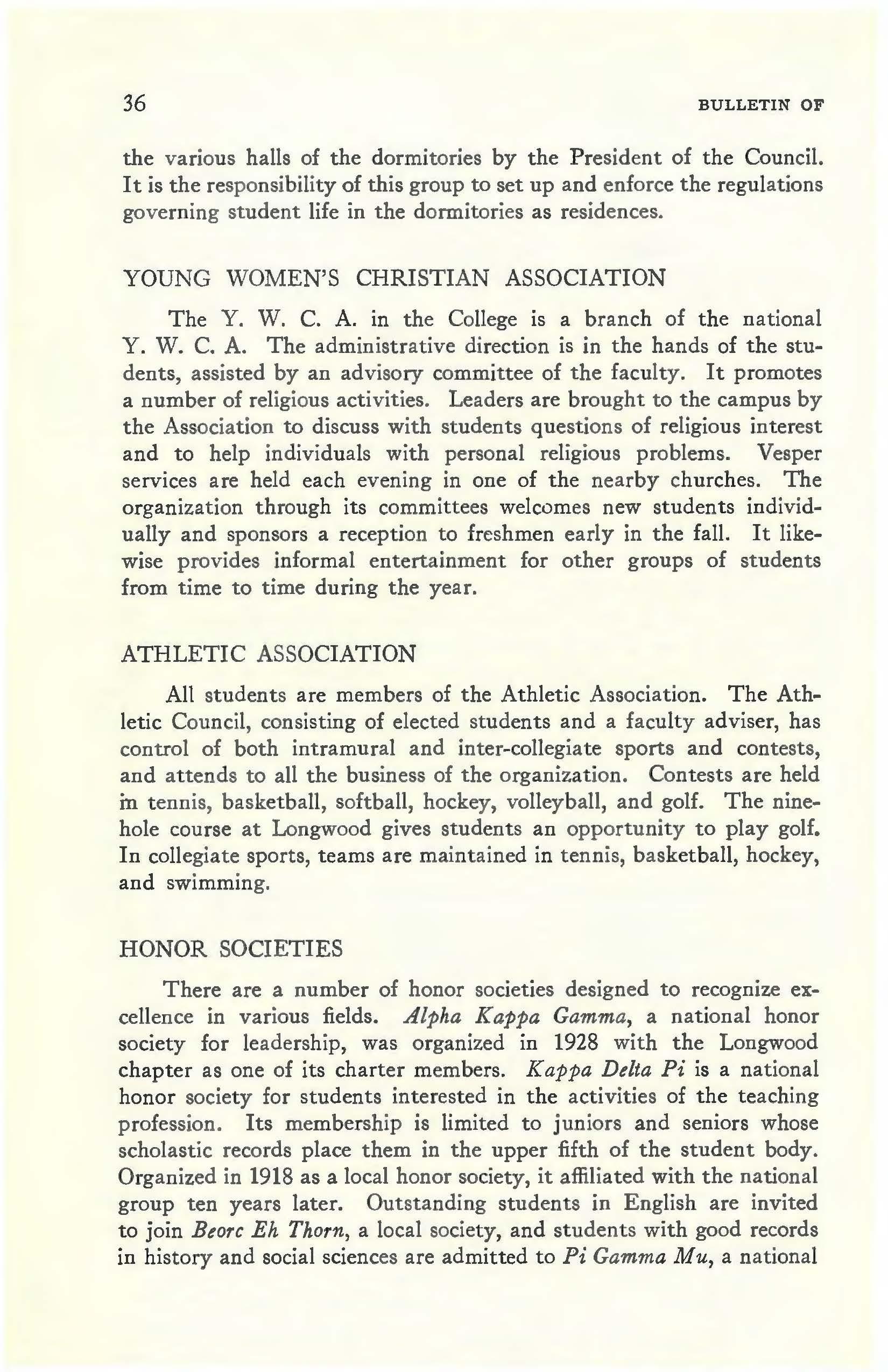
The Y. W. C. A. in the College is a branch of the national Y. W. C. A. The administrative direction is in the hands of the students, assisted by an advisory committee of the faculty. It promotes a number of religious activities. Leaders are brought to the campus by the Association to discuss with students questions of religious interest and to help individuals with personal religious problems. Vesper services are held each evening in one of the nearby churches. The organization through its committees welcomes new students individually and sponsors a reception to freshmen early in the fall. It likewise provides informal entertainment for other groups of students from time to time during the year.
All students are members of the Athletic Association. The Athletic Council, consisting of elected students and a faculty adviser, has control of both intramural and inter-collegiate sports and contests, and attends to all the business of the organization. Contests are held in tenn is, basketball, softball, hockey, volleyball, and golf. The ninehole course at Longwood gives students an opportunity to play golf. In collegiate sports, teams are maintained in tennis, basketball, hockey, and swimming.
There are a number of honor societies designed to recognize excellence in various fields. Alpha Kappa Gamma, a national honor society for leadership, was organized in 1928 with the Longwood chapter as one of its charter members. Kappa Delta Pi is a national honor society for students interested in the activities of the teaching profession. Its membership is limited to juniors and seniors whose scholastic records place them in the upper fifth of the student body. Organized in 1918 as a local honor society, it affiliated with the national group ten years later. Outstanding students in English are invited to join Beorc Eh Thorn, a local society, and students with good records in history and social sciences are admitted to Pi Gamma Mu, a national
honorary social science society. Alpha Pi Omega, a national dramatics organization, recognizes outstanding dramatic achievement. Editors, business managers, and others in key positions on all of the student publications are eligible for membership in Pi Delta Epsilon, a national honorary journalism fraternity. The local chapter was organized in 1950. Sigma Alpha Iota is a national professional music fraternity for women. Lychnos Society is a local honorary organization in science and mathematics. Pi Eta Epsilon, a local honorary organization in home economics, was organized in 1960. The Monogram Club recognizes leadership and participation in sports, its membership being limited to twenty-five.
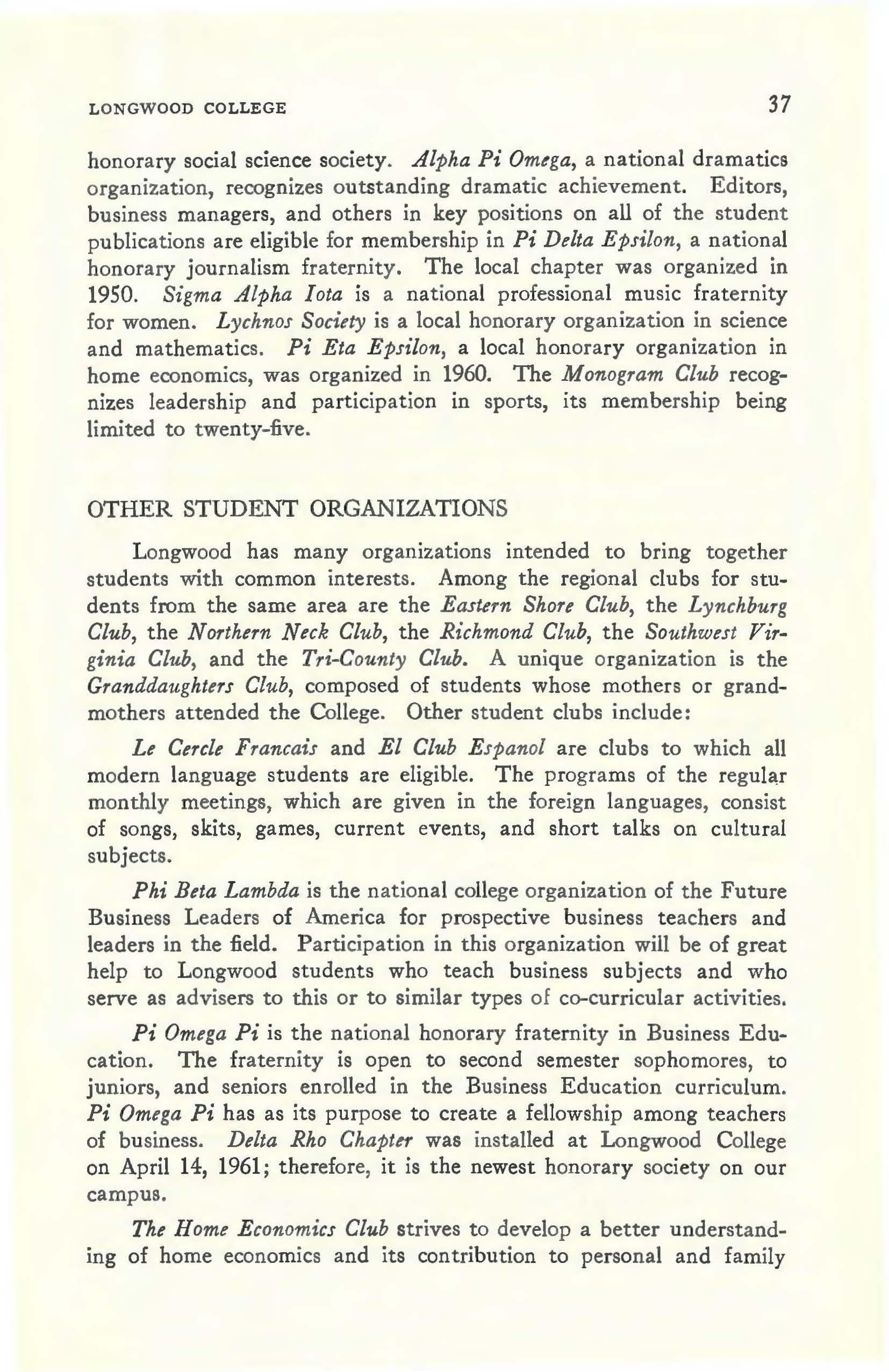
Longwood has many organizations intended to bring together students with common interests. Among the regional clubs for students from the same area are the Eastern Shore Club, the Lynchburg Club, the Northern Neck Club, the Richmond Club, the Southwest Virginia Club, and the Tri-County Club. A unique organization is the Granddaughters Club, composed of students whose mothers or grandmothers attended the College. Other student clubs include:
Le Cercle Francai.r and El Club Espanol are clubs to which all modern language students are eligible. The programs of the regul~r monthly meetings, which are given in the foreign languages, consist of songs, skits, games, current events, and short talks on cultural subjects.
Phi Beta Lambda is the national college organization of the Future Business Leaders of America for prospective business teachers and leaders in the field. Participation in this organization will be of great help to Longwood students who teach business subjects and who serve as advisers to this or to similar types of co-curricular activities.
Pi Omega Pi is the national honorary fraternity in Business Education. The fraternity is open to second semester sophomores, to juniors, and seniors enrolled in the Business Education curriculum. Pi Omega Pi has as its purpose to create a fellowship among teachers of business. Delta Rho Chapter was installed at Longwood College on April 14, 1961; therefore, it is the newest honorary society on our campus.
The Home Economics Club strives to develop a better understanding of home economics and its contribution to personal and family
living. Membership is open to all girls enrolled in home economics courses. The club is affiliated with the state and national Home Economics Association.
The H20 Club is an honorary swimming club. The members are chosen from the student body because of their ability and participation in swimming. Student members must pass the Red Cross Senior Life · Saving Test to be eligible for membership. The annual water pageant, the Intercollegiate Telegraphic Swimming Meet, and recreational swimming are sponsored by this group.
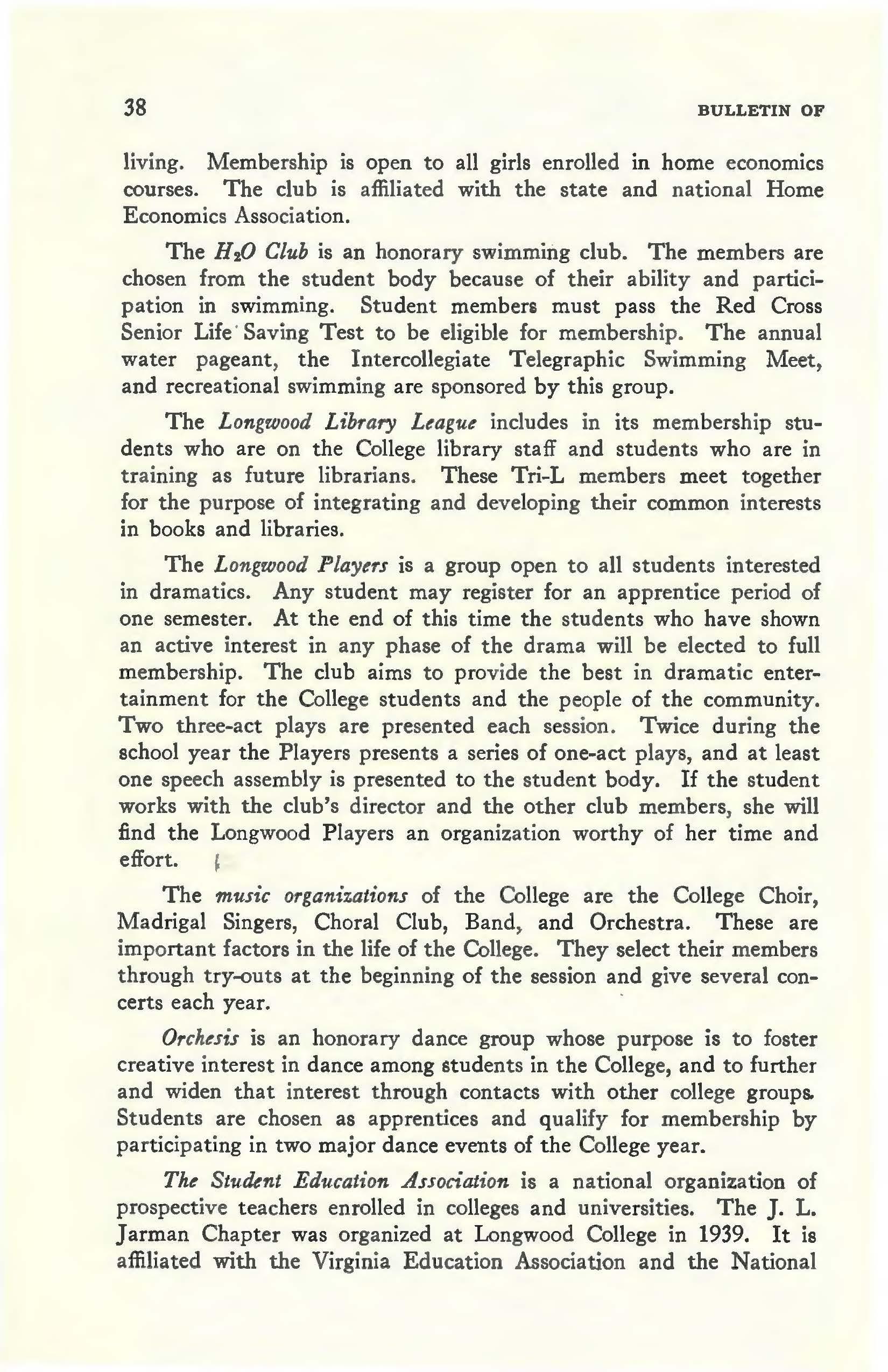
The Longwood Library League includes in its membership students who are on the College library staff and students who are in training as future librarians. These Tri-L members meet together for the purpose of integrating and developing their common interests in books and libraries.
The Longwood Players is a group open to all students interested in dramatics. Any student may register for an apprentice period of one semester. At the end of this time the students who have shown an active interest in any phase of the drama will be elected to full membership. The club aims to prov ide the best in dramatic entertainment for the College students and the people of the community. Two three-act plays are presented each session. Twice during the school year the Players presents a series of one-act plays, and at least one speech assembly is presented to the student body. If the student works with the club's director and the other club members, she will find the Longwood Players an organization worthy of her time and effort. i
The music organizations of the College are the College Choir, Madrigal Singers, Choral Club, Band , and Orchestra. These are important factors in the life of the College. They select their members through try-outs at the beginning of the session and give several concerts each year. ·
Orchesis is an honorary dance group whose purpose is to foster creative interest in dance among students in the College, and to further and widen that interest through contacts with other college groups. Students are chosen as apprentices and qualify for membership by participating in two major dance events of the College year.
The Student Education .Association is a national organization of prospective teachers enrolled in colleges and universities. The J. L. Jarman Chapter was organized at Longwood College in 1939. It is affiliated with the Virginia Education Association and the National
Education Association. Its purpose is to foster professional interest in the field of education.
In addition to these organizations nine national sororities have chapters on the campus. They are Alpha Gamma Delta, Alpha Sigma Alpha, Alpha Sigma Tau, Delta Zeta, Kappa Delta, Phi Mu, Sigma Kappa, Sigma Sigma Sigma, and Zeta Tau Alpha. Another social organization is the Cotillion Club, which sponsors a major dance each spring.
The students of the College sponsor four publications: The Rotunda, The Colonnade, The Yirginian, and The Student Handbook.
The Rotunda is a weekly newspaper which keeps the students and faculty informed of the College news and the interests of the College as observed from the point of view of the students. It not only expresses the attitude of the students towards various phases of College life and current activities but also exerts an important influence in the development of the ideals of the community.
The Colonnade is a literary magazine to which students contribute essays, poetry, short stories, and other writings. It sponsors contests, from time to time, to stimulate literary effort.
The Yirginian is the yearbook of the College. Students are responsible for the art work, the editing, and the management of the publication. Each issue represents a cross section of the College life for the year. It is, therefore, highly valued by the members of the graduating class.
The Student Handbook is the manual of rules and regulations governing the conduct of the students. In addition, it contains the constitutions and by-laws of the Student Government Association, the Young Women's Christian Association, and the Athletic Association, briefer descriptions of other organizations, and a description of the customs and traditions of the College. It serves as the orientation textbook for all new students.
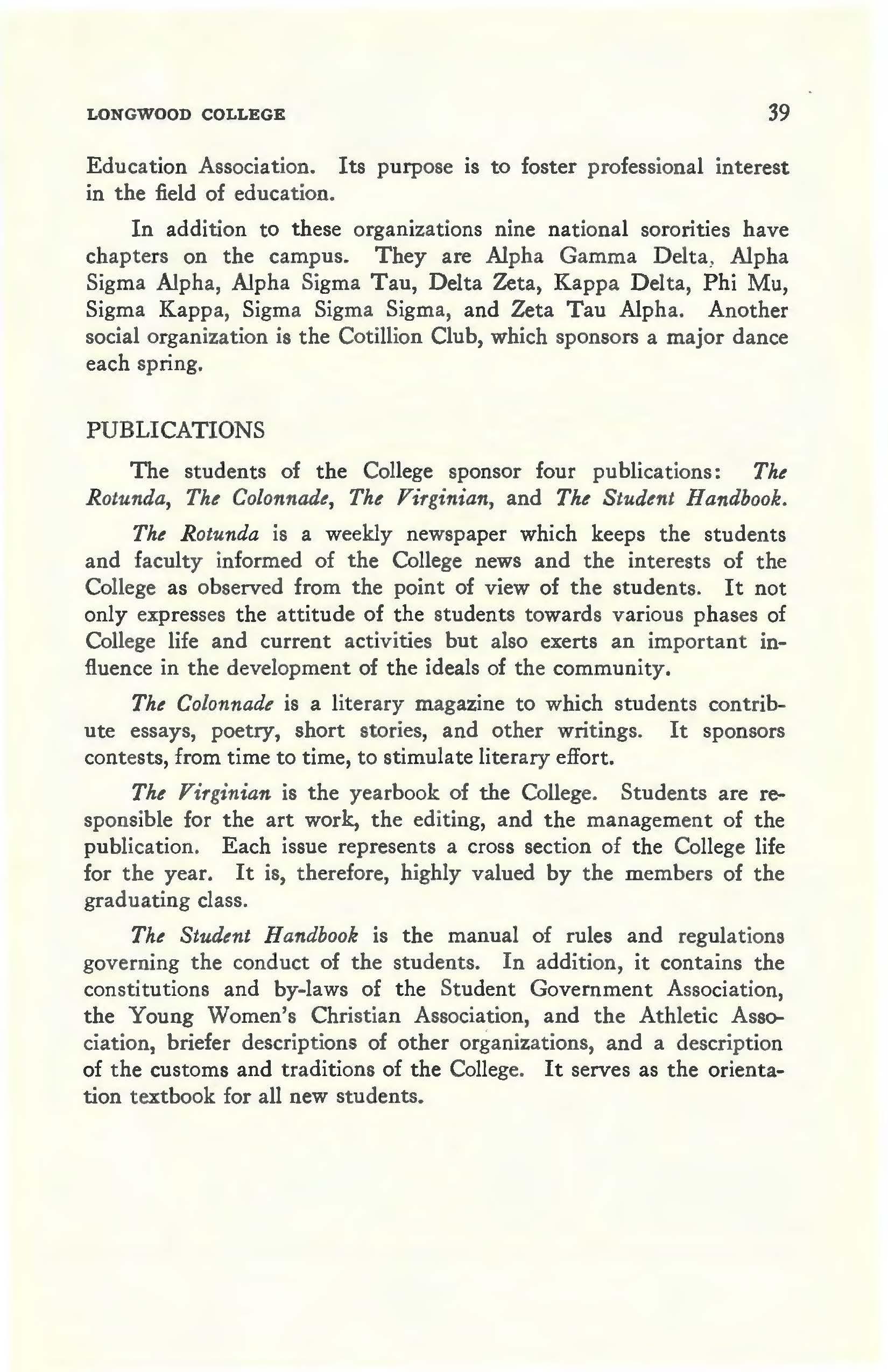
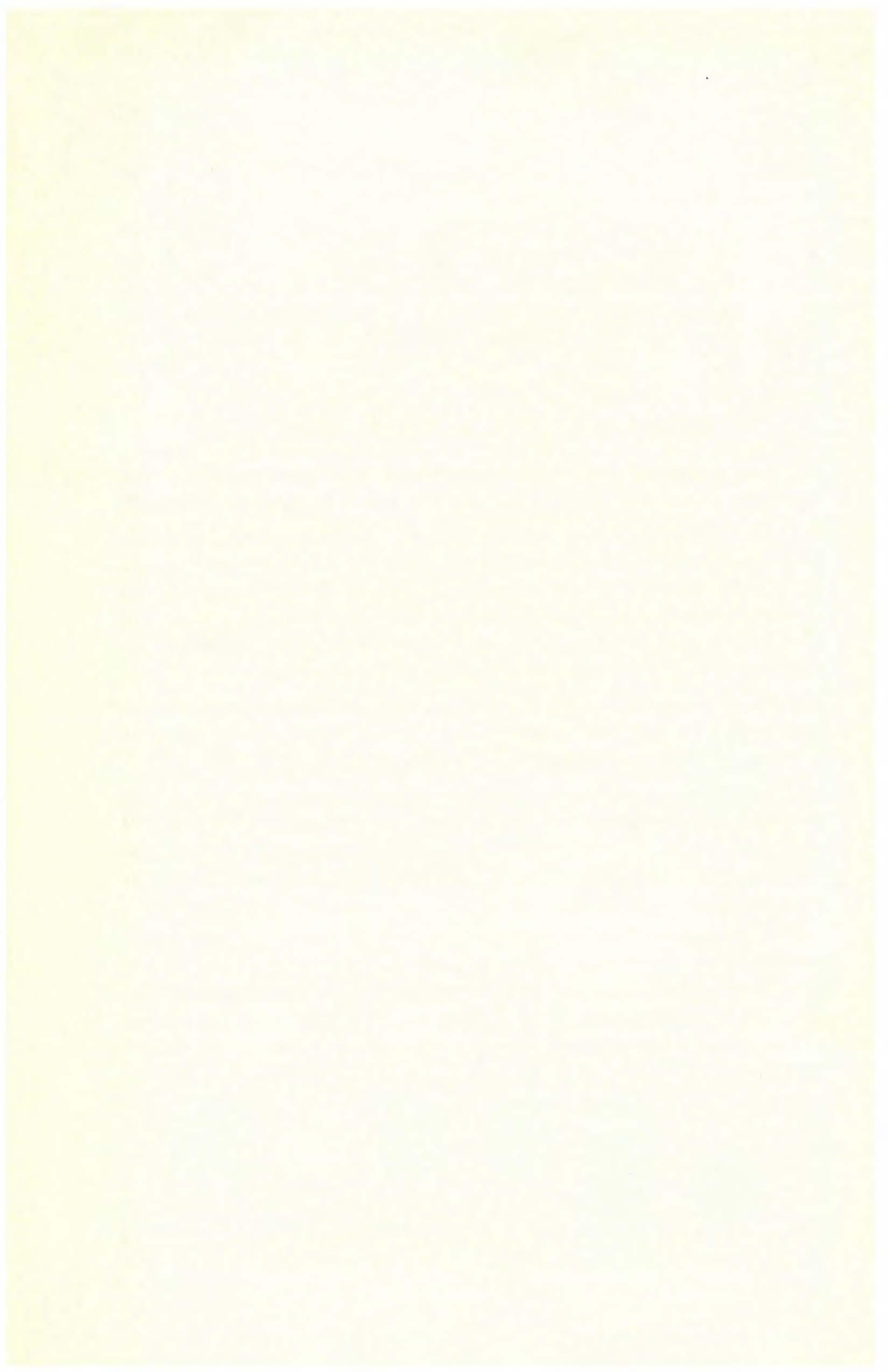
The cost of attending the College is quite moderate. Outlined below are the charges made to both boarding and day students for the session.
Boarding Students:
*College fees (including laboratory fees) ............... . $325 .00
Student activity fee. . . . . . . . . . . . . . . . . . . . . . . . . . . . . . . . . . 20. 00
*Room, board and laundry. . . . . . . . . . . . . . . . . . . . . . . . . . . . 415. 00
Construction fee 25 00
Post Office box rent. . . . . . . . . . . . . . . . . . . . . . . . . . . . . . . . . . 1. 00
Total charge for Virginia students .... ............... $786. 00 •Because of the uncertain conditiona prevailing with respect to the coat of operating the institution, the College reserves the right to change its rii~ at anr tiJne throughout the reiir to !Ileet such a\iditio!l{II ~.

*College fees (including laboratory fees) ........... . ..... $325. 00 Student activity fee................................. 20.00 Construction fee.... 25 .00 Service fee . . . . . . . . . . . . . . . . . . . . . . . . . . . . . . . . . . . . . . . . . . 12. 00
Total charge for Virginia day students .............. $382. 00
Same fees as for Virginia students plus college fee ....... $165 .00
Classification as a Virginia Student:
Title 23, Sec. 7 of the 1950 Code of Virginia states: "No person shall be entitled to the admission privileges, or the reduced tuition charges, or any other privileges accorded by law to residents or citizens of Yirginia, in the State institutions of higher learning unless such person has been a bona fide citizen or resident of Virginia for a period of at least one year prior to admission to said institution, provided that the governing boards of such institutions may require longer periods of residence and may set up additional requirements for admitting students."
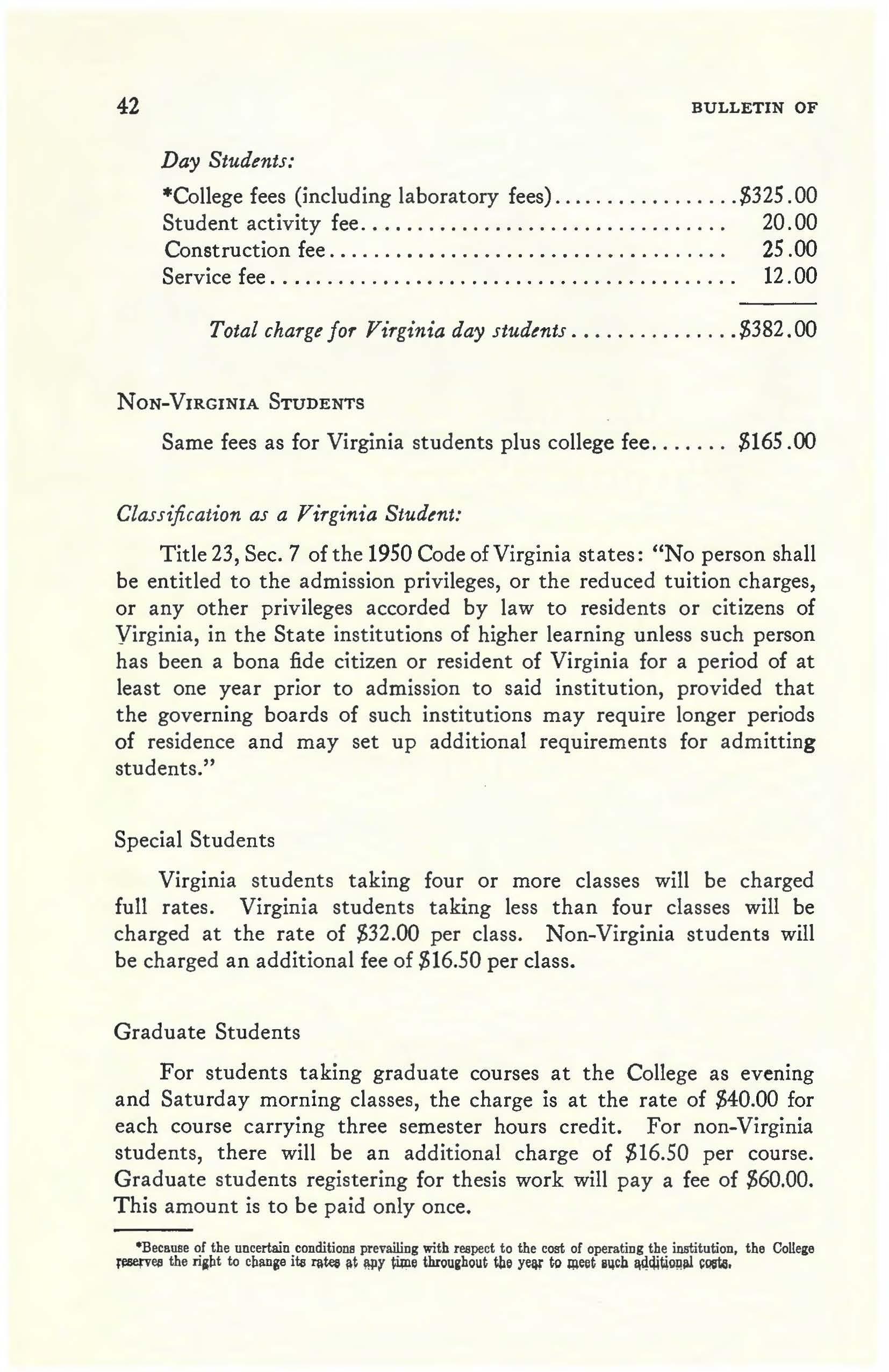
Virginia students taking four or more classes will be charged full rates. Virginia students taking less than four classes will be charged at the rate of $32.00 per class. Non-Virginia students will be charged an additional fee of $16 .50 per class.
For students taking graduate courses at the College as evening and Saturday morning classes, the charge is at the rate of $40.00 for each course carrying three semester hours credit. For non-Virginia students, there will be an additional charge of $16.50 per course. Graduate students registering for thesis work will pay a fee of $60.00. This amount is to be paid only once.
•Becouse of the uncertain conditions prevailing with respect to the cost of operating the institution, tho College ftlUl"Vt!II the riaht to change ito 111tee ~t wr iune throu11hout the y~ to m01:t 111cb 1¢.llitio~!li cQll\e,
Virginia students while enrolled in student teaching will be charged $92.50, which is one-half of the college fees, the activity fee and the construction fee for a semester.
Non-Virginia students while enrolled in student )eaching will be charged $132.50, which is one-half of the college fees, the activity fee and the construction fee for a semester.
Students who do student teaching in nearby schools and are campus boarders will also be charged the pro-rata amount of fees for room, board, laundry and post office box rent.
For the remaining part of the semester in which student teaching is done the charges will be: (a) $92.50 plus a pro-rata amount for room, board, laundry and post office box rent for Virginia students who are campus boarders during this time. (b) $132.50 plus a pro-rata amount for room, board, laundry and post office box rent for non-Virginia students who are campus boarders during this time. (c) $98.50 for Virginia day students and $138.50 for non-Virginia day students.
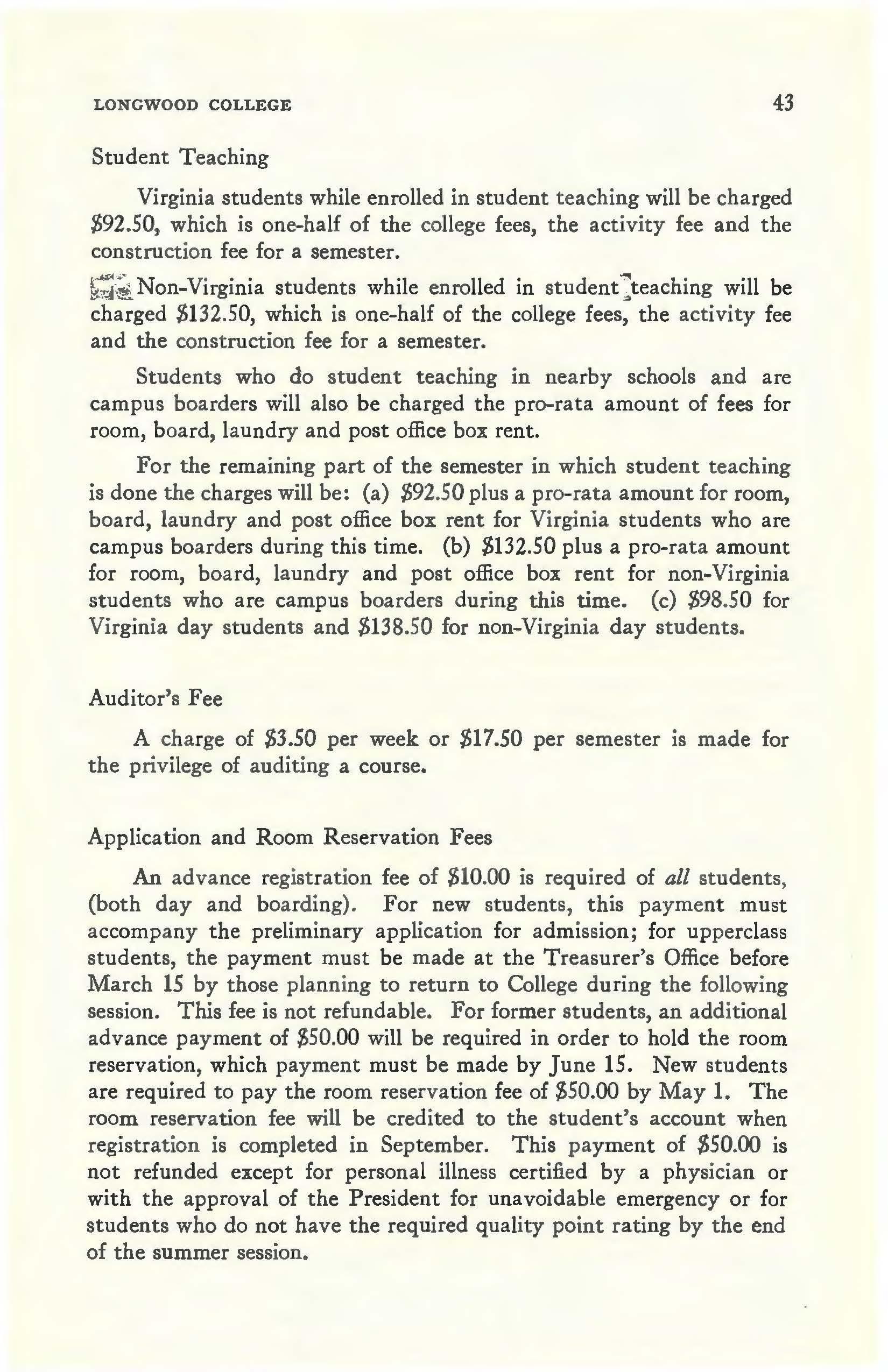
A charge of $3.50 per week or $17.50 per semester is made for the privilege of auditing a course.
An advance registration fee of $10.00 is required of all students, (both day and boarding). For new students, this payment must accompany the preliminary application for admission; for upperclass students, the payment must be made at the Treasurer's Office before March 15 by those planning to return to College during the following session. This fee is not refundable. For former students, an additional advance payment of $50.00 will be required in order to hold the room reservation, which payment must be made by June 15. New students are required to pay the room reservation fee of $50.00 by May 1. The room reservation fee will be credited to the student's account when registration is completed in September. This payment of $50.00 is not refunded except for personal illness certified by a physician or with the approval of the President for unavoidable emergency or for students who do not have the required quality point rating by the end of the summer session.
All freshmen, and all transfer students who do not have credit for courses in physical education, must purchase an official gymnasium outfit of two suits.. The charge for these is $15.45. Order blanks are sent to students after they have been accepted for admission.
A fee of $7.50 will be charged for a Bachelor's diploma and $7.50 for a Master's diploma.
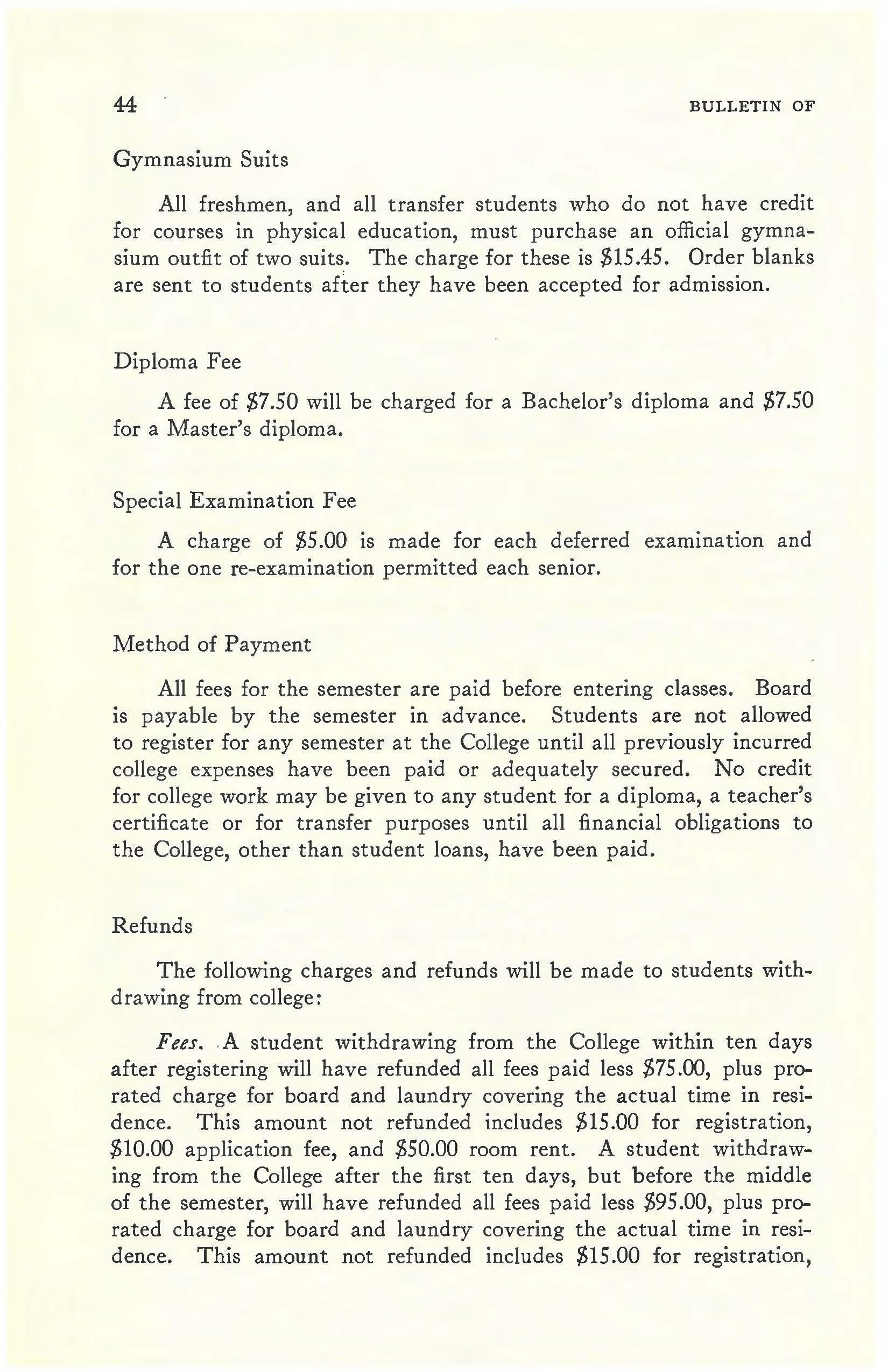
A charge of $5.00 is made for each deferred examination and for the one re-examination permitted each senior.
All fees for the semester are paid before entering classes. Board is payable by the semester in advance. Students are not allowed to register for any semester at the College until all previously incurred college expenses have been paid or adequately secured. No credit for college work may be given to any student for a diploma, a teacher's certificate or for transfer purposes until all financial obligations to the College, other than student loans, have been paid.
The following charges and refunds will be made to students withdrawing from college:
Fees . . A student withdrawing from the College within ten days after registering will have refunded all fees paid less $75 .00, plus prorated charge for board and laundry covering the actual time in residence. This amount not refunded includes $15.00 for registration, $10.00 application fee, and $50.00 room rent. A student withdrawing from the College after the first ten days, but before the middle of the semester, will have refunded all fees paid less $95.00, plus prorated charge for board and laundry covering the actual time in residence. This amount not refunded includes $15 .00 for registration,
$10.00 student activity fee, $10.00 application fee, $50.00 room rent, and $10.00 general expense. In addition to these charges, out-ofstate students will pay full tuition for the semester
After the middle of the semester there will be no refund of fees, out-of-state tuition, or room rent made to a student withdrawing from the College.
Exceptions. Refunds will be made at the discreti o n of the President of the College to students whose connection with the College terminates on account of personal illness, certified by the College Physician, unavoidable emergency, or whose connection with the College terminates on account of disciplinary action or enforced withdrawal.
Students entertaining guests in the College dining hall are charged the following rates: Breakfast, 60c; lunch, 75c; dinner, 90c.
Former students of the College are always welcome, and are not charged for meals or accommodations for a period not exceeding two days, with the exception of two week ends. On the week ends of the College Circus and May Day, guests, including alumnae, are charged for meals at the rate stated above. The Dean of Women must be notified in advance of a contemplated overnight visit to the College by former students. All available space in the dormitories has been used to room students.
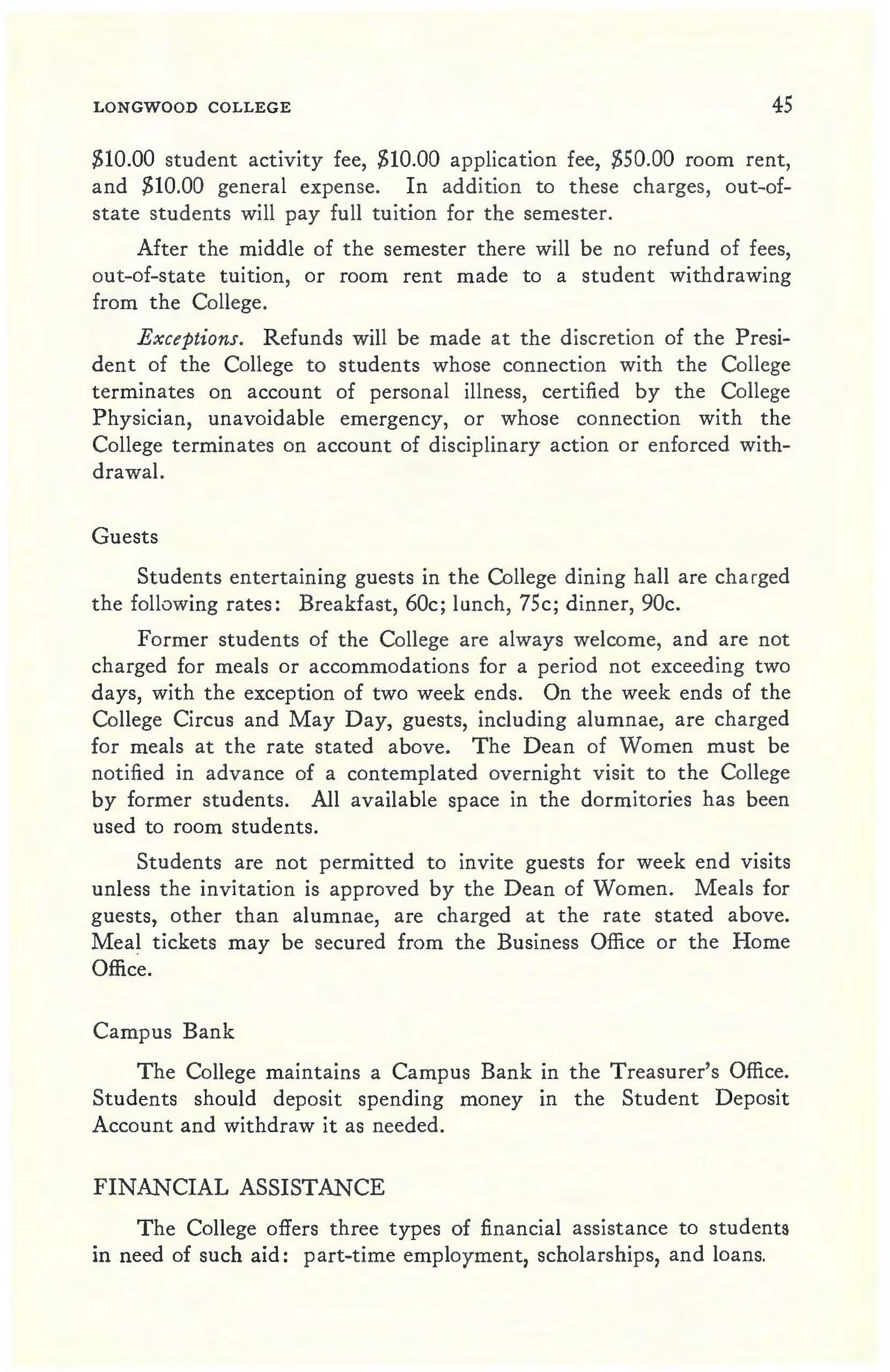
Students are not permitted to invite guests for week end visits unless the invitation is approved by the Dean of Women. Meals for guests, other than alumnae, are charged at the rate stated above. Meal tickets may be secured from the Business Office or the Home Office.
The College maintains a Campus Bank in the Treasurer's Office. Students should deposit spending money in the Student Deposit Account and withdraw it as needed.
The College offers three types of financial assistance to students in need of such aid: part-time employment, scholarships, and loans.
A limited number of part-time pos1t1ons are available each year in the dining room, library, and offices of the College. New students employed in the dining room earn $250.00 per session. After one session, students may earn $325.00 per session. Those employed in clerical and library positions may earn from $100.00 to $150.00 per session. Application for a part-time position should be made to the Director of Admissions before May 1. Early application is advised .
Alumnae Scholarships. The following Alumnae chapt e rs give scholarships to outstanding graduates of high schools in their respective communities: Farmville (Mary White Cox Memorial Scholarship), Lynchburg, Norfolk, Peninsula (J. L. Jarman Scholarship), Richmond, and Roanoke.
Dabney Stewart Lancaster Scholarship. Established in 1955 by the Student Government Association. This scholarship is awarded annually to a member of the sophomore, junior or senior class. The name of the winner of the award is announced at Senior Assembly in May.
Eureka Ashburn Oliver Scholarship. The Mrs. Samuel C. Oliver (Eureka Ashburn, 1891-93) scholarship of $100 each year for four years awarded to lineal descendants. If there should be no lineal descendant, then the scholarship is to be given to students of outstanding ability who need financial assistance from Nansemond County, selected at the discretion of the Admissions Committee of the College. When there are no applicants, the funds shall accumulate until there are applicants from her lineal descendants or from Nansemond County.
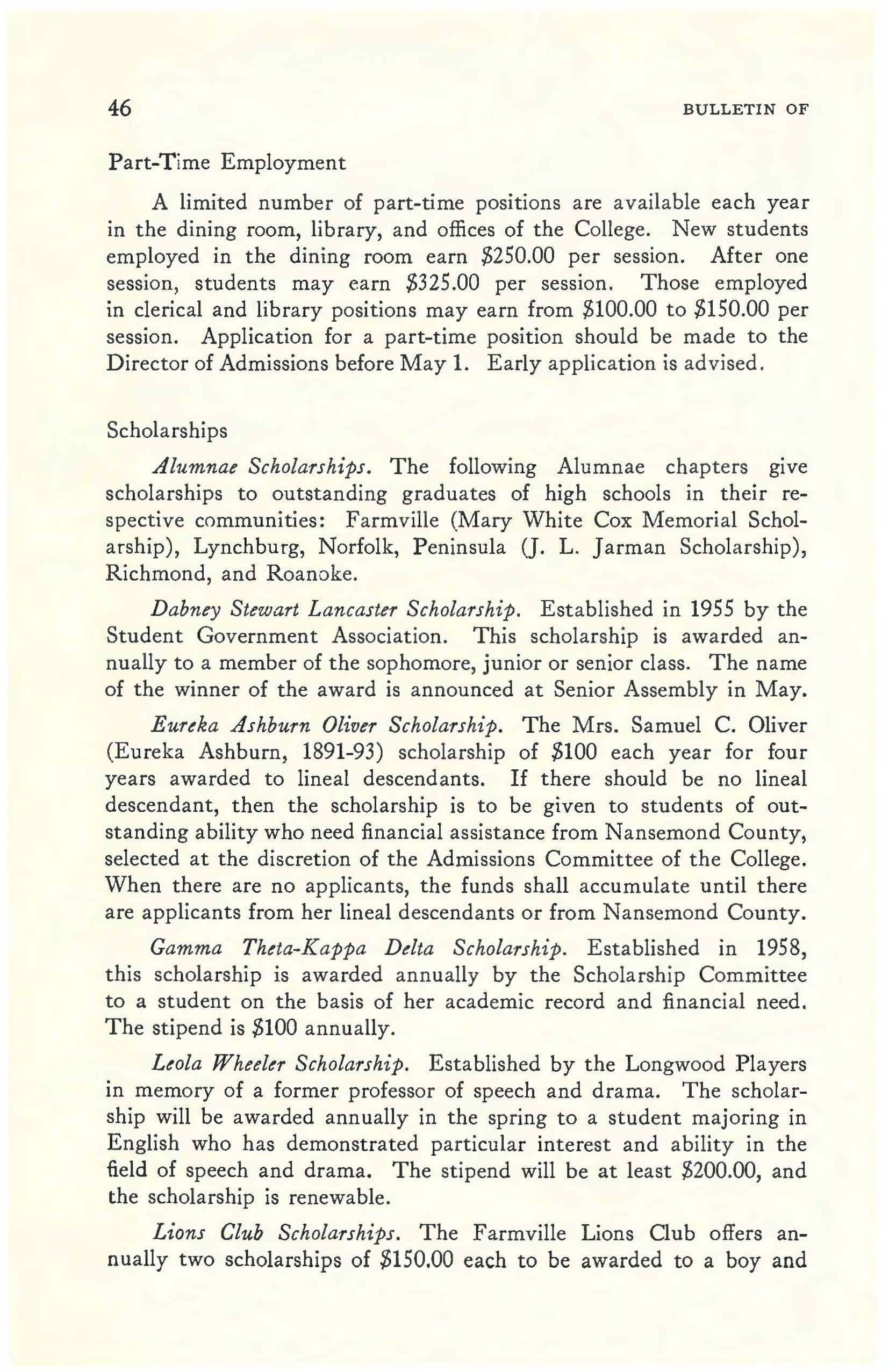
Gamma Theta-Kappa Delta Scholarship. Established in 1958, this scholarship is awarded annually by the Sch o larship Committee to a student on the basis of her academic record and financial need. The stipend is $100 annually.
Leola Wheeler Scholarship. Established by the Longwood Players in memory of a former professor of speech and drama. The scholarship will be awarded annually in the spring to a student majoring in English who has demonstrated particular interest and ability in the field of speech and drama. The stipend will be at least $200.00, and the scholarship is renewable.
Lions Club Scholarships. The Farmville Lions Oub offers annually two scholarships of $150.00 each to be awarded to a boy and
a girl from Prince Edward County or vicinity. The main factor in choosing between acceptable applicants shall be financial need. All other factors being equal, preference shall be given to applicants for Hampden-Sydney College and Longwood College. The scholarships are renewable.
The Mary Clay Hiner Scholarship. Established in 1962 by a gift of Mrs. Earl Crafts. Appropriate officials of the College will select each year the student or students who will receive financial assistance , Scholarships for Prospective Teachers. The General Assembly of Virginia has provided a number of scholarships for students in Virginia colleges who are residents of the State and who are enrolled in approved courses of study preparing them to be teachers in the public elementary and secondary schools. These scholarships are valued at $350.00 per year. They are open to qualified sophomores, juniors, and seniors. Freshmen who have superior academic records in high school, who earn superior scores on a standard scholastic aptitude test, and who appear to be personally qualified for careers in teaching are likewise eligible. For each year that the student receives a scholarship, she must agree to teach in Virginia's public schools one year, thereby cancelling the indebtedness and interest. If she does not teach, she must repay the amount received plus interest.
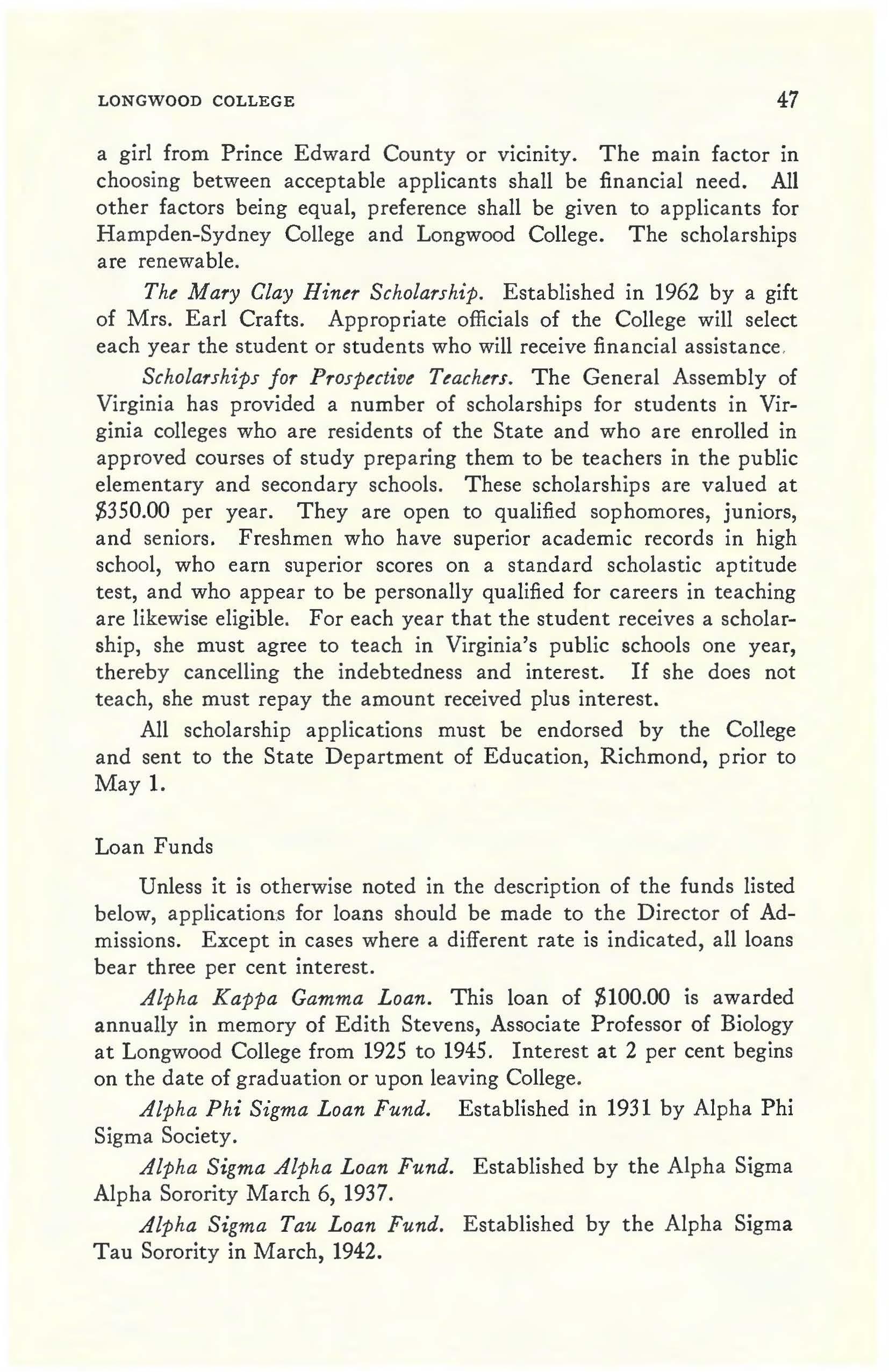
All scholarship applications must be endorsed by the College and sent to the State Department of Education, Richmond, prior to May 1.
Unless it is otherwise noted in the description of the funds listed below, applications for loans should be made to the Director of Admissions. Except in cases where a different rate is indicated, all loans bear three per cent interest.
Alpha Kappa Gamma Loan. This loan of $100.00 is awarded annually in memory of Edith Stevens, Associate Professor of Biology at Longwood College from 1925 to 1945. Interest at 2 per cent begins on the date of graduation or upon leaving College.
Alpha Phi Sigma Loan Fund. Established in 1931 by Alpha Phi Sigma Society.
Alpha Sigma Alpha Loan Fund. Established by the Alpha Sigma Alpha Sorority March 6, 1937.
Alpha Sigma Tau Loan Fund. Established by the Alpha Sigma Tau Sorority in March, 1942.
Carrie Fowles Memorial Loan Fund. Established in 1945 by the will of Mrs. Lula Bradshaw Turpin in memory of Carrie Fowles, who was a student at the College in 1899.
Cunningham Memorial Loan Fund. The alumnae of the College who were graduated during the administration of Dr. John A. Cunningham, from 1886 to 1896, raised a fund, intending to establish a scholarship in memory of his faithful and loving service to them and to the State, feeling that the most fitting tribute that could be paid him would be the effort to give to those who are unable to obtain it for themselves the training for the work to which he devoted his life. When this fund amounted to $1,000 it was changed from a scholarship to a loan fund.
Daughters of the American Revolution Loan Fund. The Daughters of the American Revolution have established a student loan fund for the aid of worthy students in Virginia colleges. Not more than $300 is available for any one institution, and no student may borrow more than a total of $300 or more than $150 in one session. This loan is available only to juniors and seniors.
Daughters of the American Revolution Loan Fund. Thomas Nelson Chapter, Arlington, Virginia. A revolving loan fund of $100, without interest, has been made available by the Chapter. Preference will be given to applicants from the Arlington area of Virginia.
Fay Byrd Johnson Memorial Loan Fund. Established in 1930 by the Mu Omega Sorority.
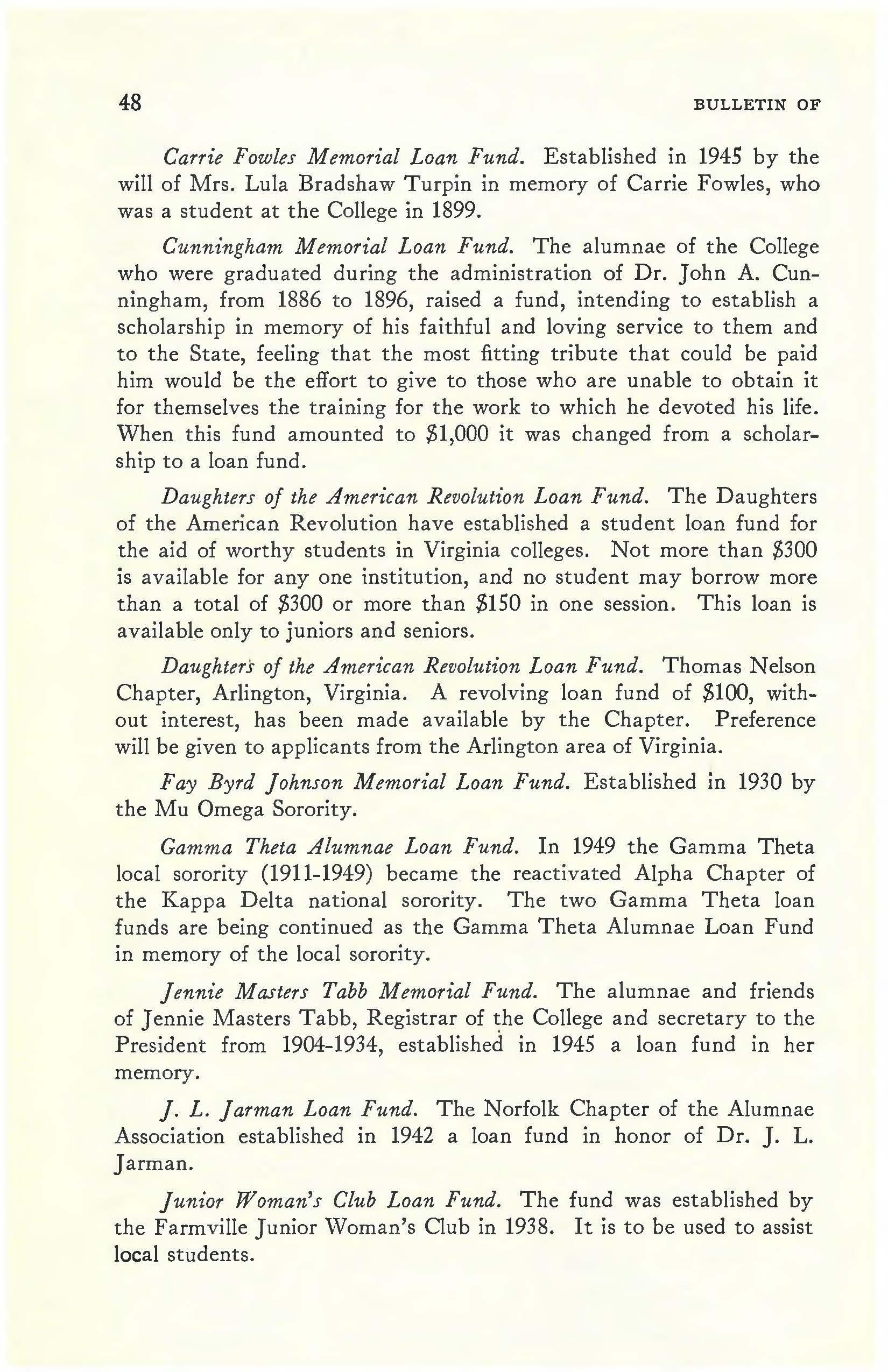
Gamma Theta Alumnae Loan Fund. In 1949 the Gamma Theta local sorority (1911-1949) became the reactivated Alpha Chapter of the Kappa Delta national sorority. The two Gamma Theta loan funds are being continued as the Gamma Theta Alumnae Loan Fund in memory of the local sorority.
Jennie Masters Tabb Memorial Fund. The alumnae and friends of Jennie Masters Tabb, Registrar of the College and secretary to the President from 1904-1934, established in 1945 a loan fund in her memory.
]. L. Jarman Loan Fund. The Norfolk Chapter of the Alumnae Association established in 1942 a loan fund in honor of Dr. J. L. Jarman.
Junior Woman's Club Loan Fund. The fund was established by the Farmville Junior ·woman's Club in 1938. It is to be used to assist local students.
Longwood Players Loan Fund. Established by the Dramatic Club, March, 1940.
Mary White Cox Memorial Loan Fund. Established in 1945 as a memorial to Miss Mary White Cox by a gift from an alumna of the College.
Methodist Student Loan Fund. Available to qualified Methodist students. Application should be made to the Director, Wesley Foundation, Farmville, Virginia.
Prince Edward Chapter Alumnae Loan Fund. This fund was started as a branch of the Virginia Normal League. Loans are interest free. Applications for loans should be made to Mrs. W. J. Sydnor, Farmville, Virginia.
Robert Frazer Memorial (The Virginia Normal League) Loan Fund. The Virginia Normal League, organized by Dr. Robert Frazer in 1899 as a means of establishing a student loan fund, has been changed m name to the Robert Frazer Memorial Loan Fund.
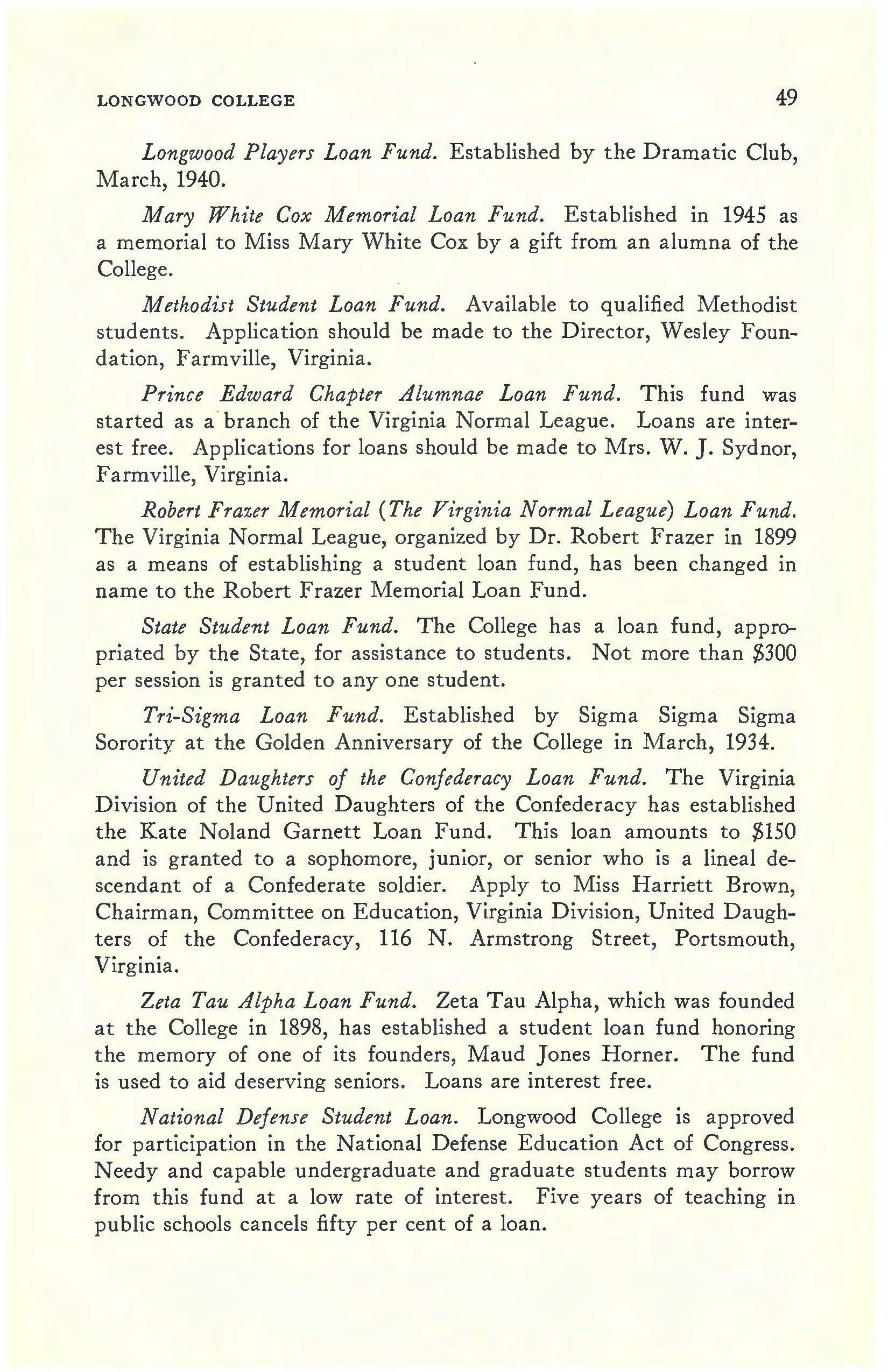
State Student Loan Fund. The College has a loan fund, appropriated by the State, for assistance to students. Not more than $300 per session is granted to any one student.
Tri-Sigma Loan Fund. Established by Sigma Sigma Sigma Sorority at the Golden Anniversary of the College in March, 1934.
United Daughters of the Confederacy Loan Fund. The Virginia Division of the United Daughters of the Confederacy has established the Kate Noland Garnett Loan Fund. This loan amounts to $150 and is granted to a sophomore, junior, or senior who is a lineal descendant of a Confederate soldier. Apply to Miss Harriett Brown, Chairman, Committee on Education, Virginia Division, United Daughters of the Confederacy, 116 N. Armstrong Street, Portsmouth, Virginia.
Zeta Tau Alpha Loan Fund. Zeta Tau Alpha, which was founded at the College in 1898, has established a student loan fund honoring the memory of one of its founders, Maud Jones Horner. The fund is used to aid deserving seniors. Loans are interest free.
National Defense Student Loan. Longwood College is approved for participation in the National Defense Education Act of Congress. Needy and capable undergraduate and graduate students may borrow from this fund at a low rate of interest. Five years of teaching in public schools cancels fifty per cent of a loan.
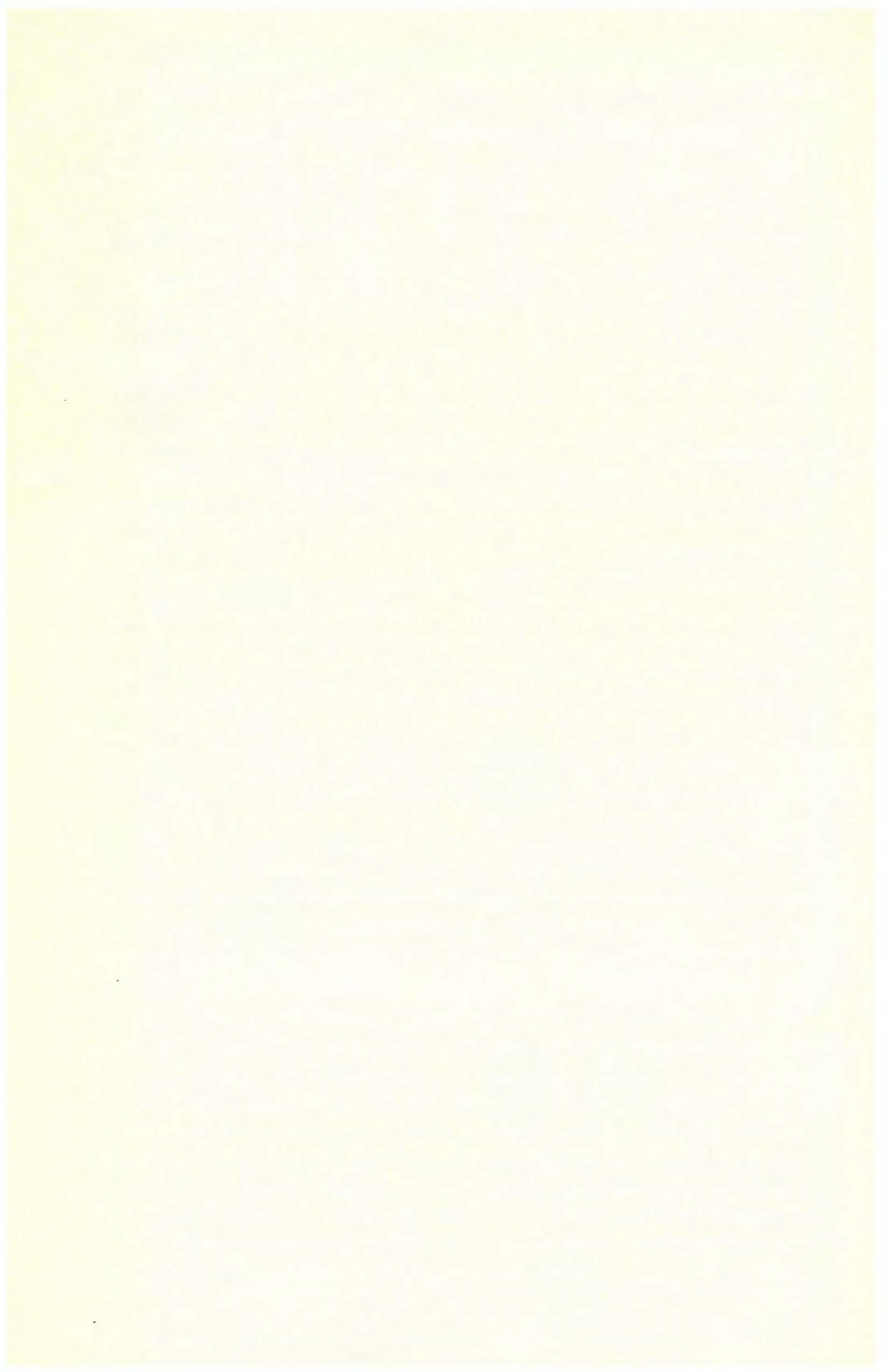
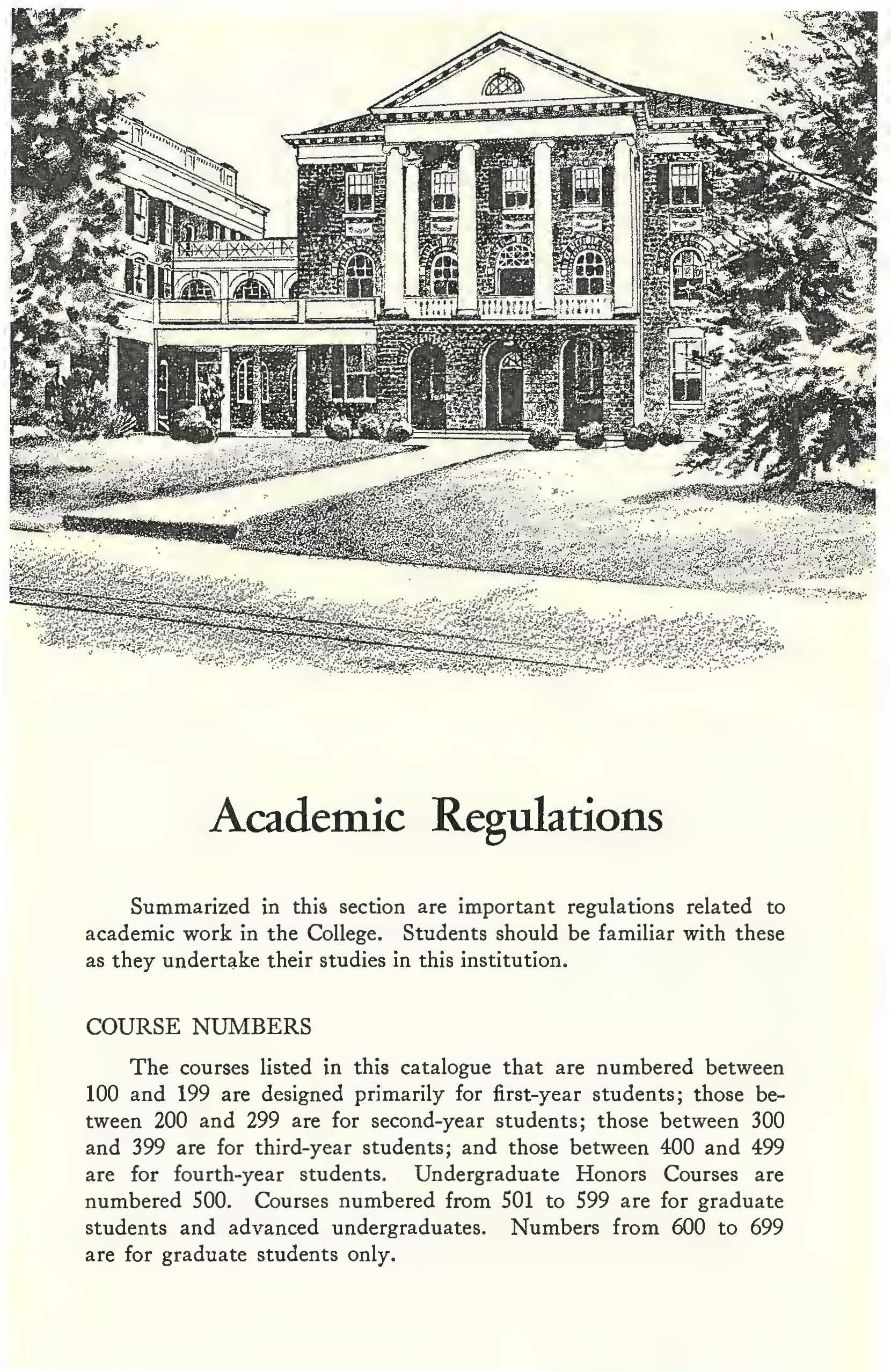
Summarized in thi& section are important regulations related to academic work in the College. Students should be familiar with these as they undert<J.ke their studies in this institution.
The courses listed in this catalogue that are numbered between 100 and 199 are designed primarily for first-year students; those between 200 and 299 are for second-year students; those between 300 and 399 are for third-year students; and those between 400 and 499 are for fourth-year students. Undergraduate Honors Courses are numbered 500. Courses numbered from 501 to 599 are for graduate students and advanced undergraduates. Numbers from 600 to 699 are for graduate students only.
At least 44 of the 126 credits required for graduation must be in courses with numbers of 300 or above.
The college is organized on the semester plan. The credit hour, abbreviated as "credit", is the semester hour. For example, a class meeting three fifty-minute periods a week for one semester gives three credits.
The average schedule of a student during a semester includes classes giving from fifteen through eighteen credits. Boarding and regular students are required to carry a load of work giving a minimum of twelve credits. A student may carry as much as eighteen credits without special permission . A schedule beyond that amount requires special permission from the Dean. Such permission is rarely granted to a student whose academic average for the preceding semester is less than "B".
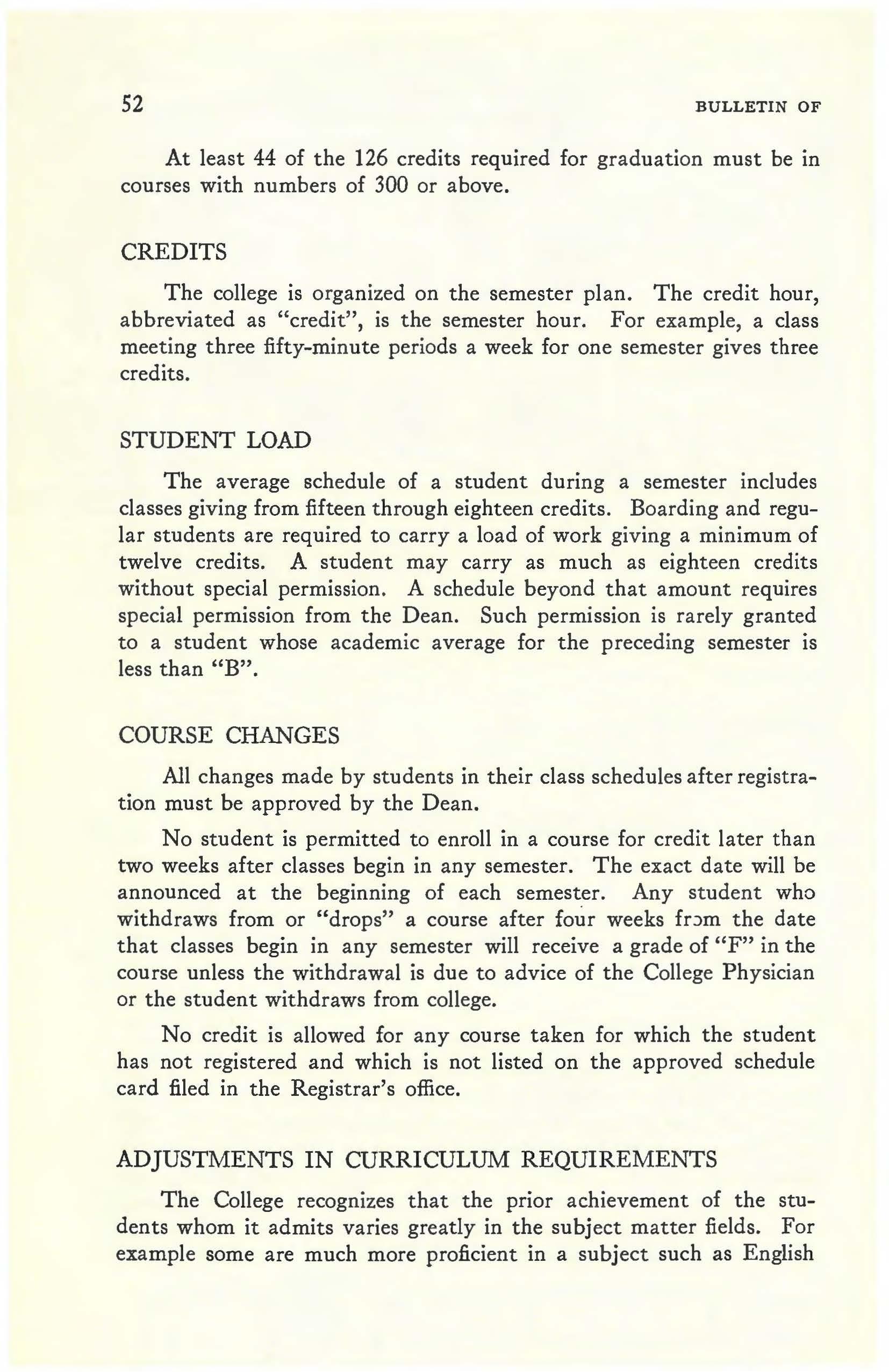
All changes made by students in their class schedules after registration must be approved by the Dean.
No student is permitted to enroll in a course for credit later than two weeks after classes begin in any semester. The exact date will be announced at the beginning of each semester. Any student who withdraws from or "drops" a course after four weeks fr.)m the date that classes begin in any semester will receive a grade of "F" in the course unless the withdrawal is due to advice of the College Physician or the student withdraws from college.
No credit is allowed for any course taken for which the student has not registered and which is not listed on the approved schedule card filed in the Registrar's office.
The College recognizes that the prior achievement of the students whom it admits varies greatly in the subject matter fields. For example some are much more proficient in a subject such as English
grammar than are others. As a result, any requirement that all students must enroll in identical basic courses in the freshman or later years usually results in heterogeneous classes in which the wellprepared student is not challenged or the student with the usual preparation is confronted with exceedingly difficult tasks.
Because of these differences in prior achievement, the College offers every student an opportunity to demonstrate her achievement in a required subject prior to enrolling in it. This may be done by the use of an oral or written examination, or a conference, at the discretion of the faculty member involved. At times, this evaluation may be made after the student has been enrolled in a course for one semester. Unusual proficiency demonstrated in the first semester of a two-semester course may indicate that the student should not continue in the same course but enroll in one of a more advanced nature.
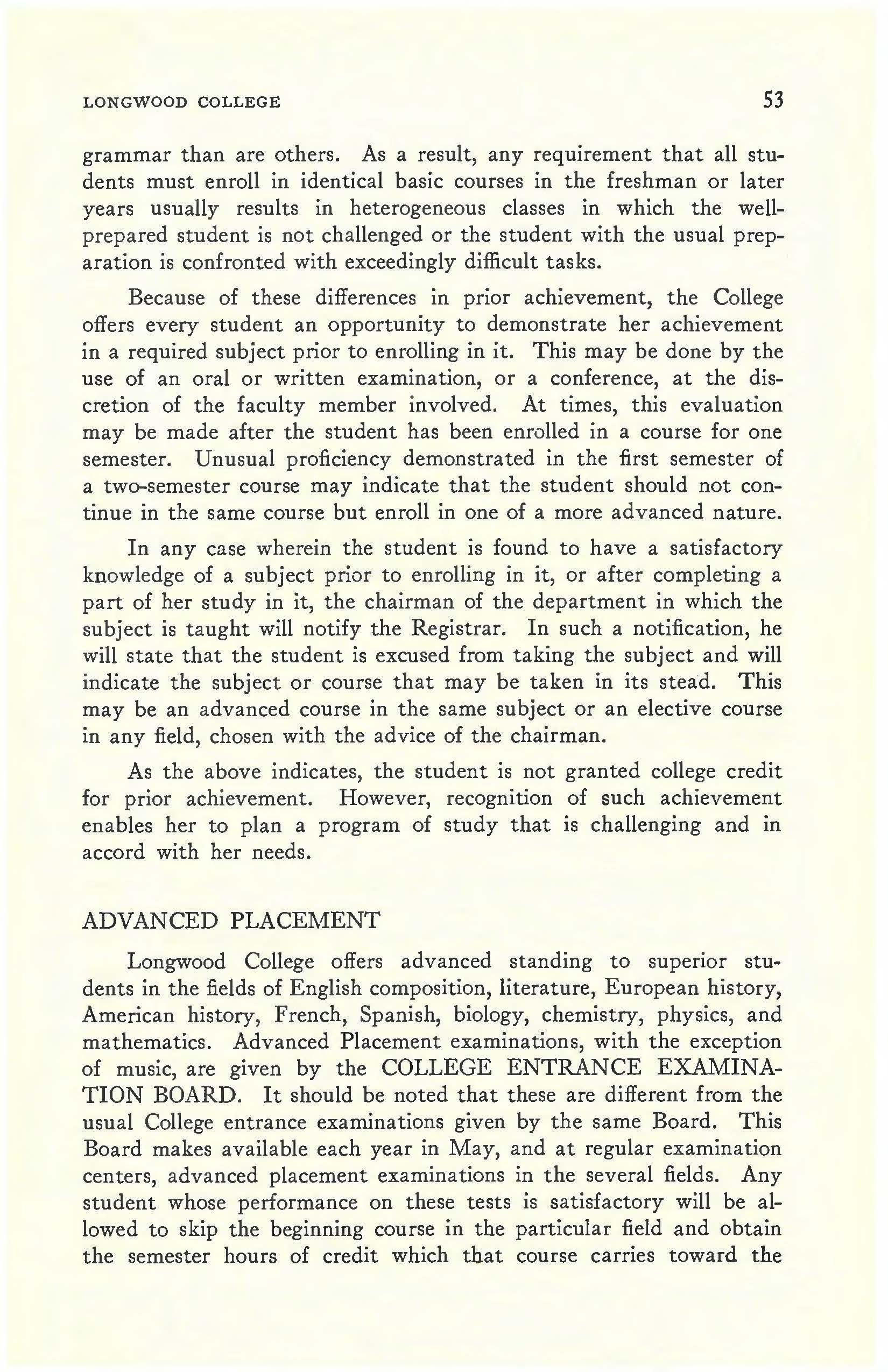
In any case wherein the student is found to have a satisfactory knowledge of a subject prior to enrolling in it, or after completing a part of her study in it, the chairman of the department in which the subject is taught will notify the Registrar. In such a notification, he will state that the student is excused from taking the subject and will indicate the subject or course that may be taken in its stead. This may be an advanced course in the same subject or an elective course in any field, chosen with the advice of the chairman.
As the above indicates, the student is not granted college credit for prior achievement. However, recognition of such achievement enables her to plan a program of study that is challenging and in accord with her needs.
Longwood College offers advanced standing to superior students in the fields of English composition, literature, European history, American history, French, Spanish, biology, chemistry, physics, and mathematics. Advanced Placement examinations, with the exception of music, are given by the COLLEGE ENTRANCE EXAM I NATION BOARD. It should be noted that these are different from the usual College entrance examinations given by the same Board. This Board makes available each year in May, and at regular examination centers, advanced placement examinations in the several fields. Any student whose performance on these tests is satisfactory will be allowed to skip the beginning course in the particular field and obtain the semester hours of credit which that course carries toward the
bachelor's degree. For example, if the student takes the advanced placement examination in American history and makes a satisfactory score, that student will not be required to take the beginning course in American history, and he will be granted six semester hours of credit toward his degree on the basis of the examination. The examinations are administered by the Educational Testing Service. Detailed information on testing dates, examination centers, and all other matters relating to the administration of the examinations, is available without cost in the bulletin of information entitled "Advanced Placement Examinations". This bulletin may be obtained by writing to: College Board Advanced Placement Examinations, Box 592, Princeton, New Jersey.
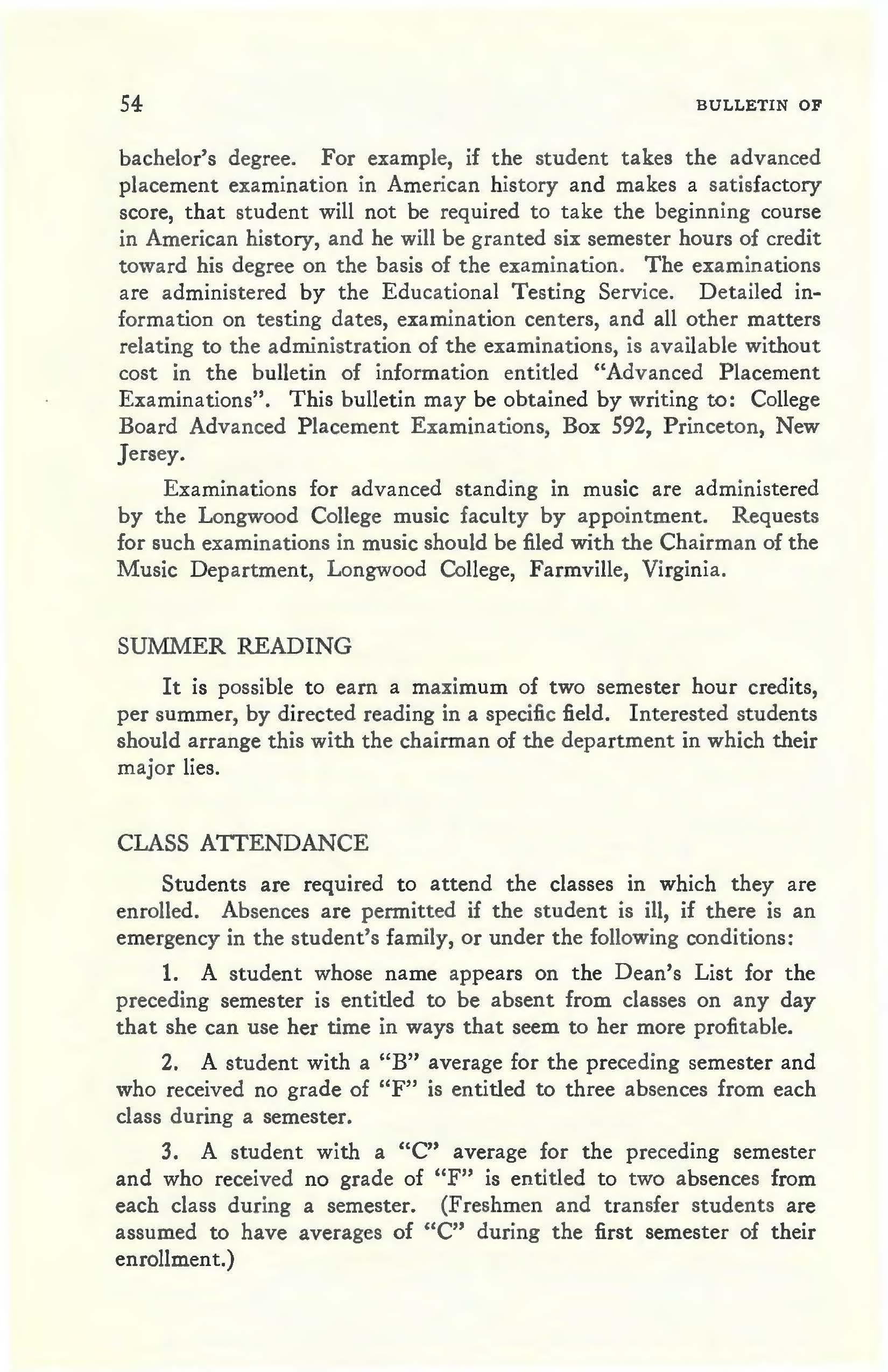
Examinations for advanced standing in music are administered by the Longwood College music faculty by appointment. Requests for such examinations in music should be filed with the Chairman of the Music Department, Longwood College, Farmville, Virginia.
It is possible to earn a maximum of two semester hour credits, per summer, by directed reading in a specific field. Interested students should arrange this with the chairman of the department in which their major lies.
Students are required to attend the classes in which they are enrolled. Absences are permitted if the student is ill, if there is an emergency in the student's family, or under the following conditions:
1. A student whose name appears on the Dean's List for the preceding semester is entitled to be absent from classes on any day that she can use her time in ways that seem to her more profitable.
2. A student with a "B" average for the preceding semester and who received no grade of "F" is entitled to three absences from each class during a semester.
3. A student with a "C" average for the preceding semester and who received no grade of "F" is entitled to two absences from each class during a semester. (Freshmen and transfer students are assumed to have averages of "C" during the first semester of their enrollment.)
4. A student with less than a "C" average for the preceding semester is entitled to one absence from each class during the semester.
No credit will be given for any course in which a student fails to attend at least two-thirds of the class meetings, even though her absences are due to illness or emergency.
Full information regarding class attendance and absences is given in The Student Handbook sent to every student during the summer months.
The achievement of a student in a course is indicated by the grade that she receives. The significance of these marks is indicated below:
A: Superior or excellent college work
B: Above average college work
C: Average college work
D: Below average but passing college work
F: Failure
I: This grade indicates that because of illness or for other good reasons the work of the semester has not been completed. When this work has been completed acceptably, a final grade will be reported. A grade of "I" will become "WP" or "WF" unless removed within one year.
WP: This symbol indicates that a student withdrew from a course but was passing the work at the time that she withdrew. It is used in cases of students dropping courses after the fourweek period at the beginning of a semester for medical reasons and those who withdraw from the College prior to the end of a semester.
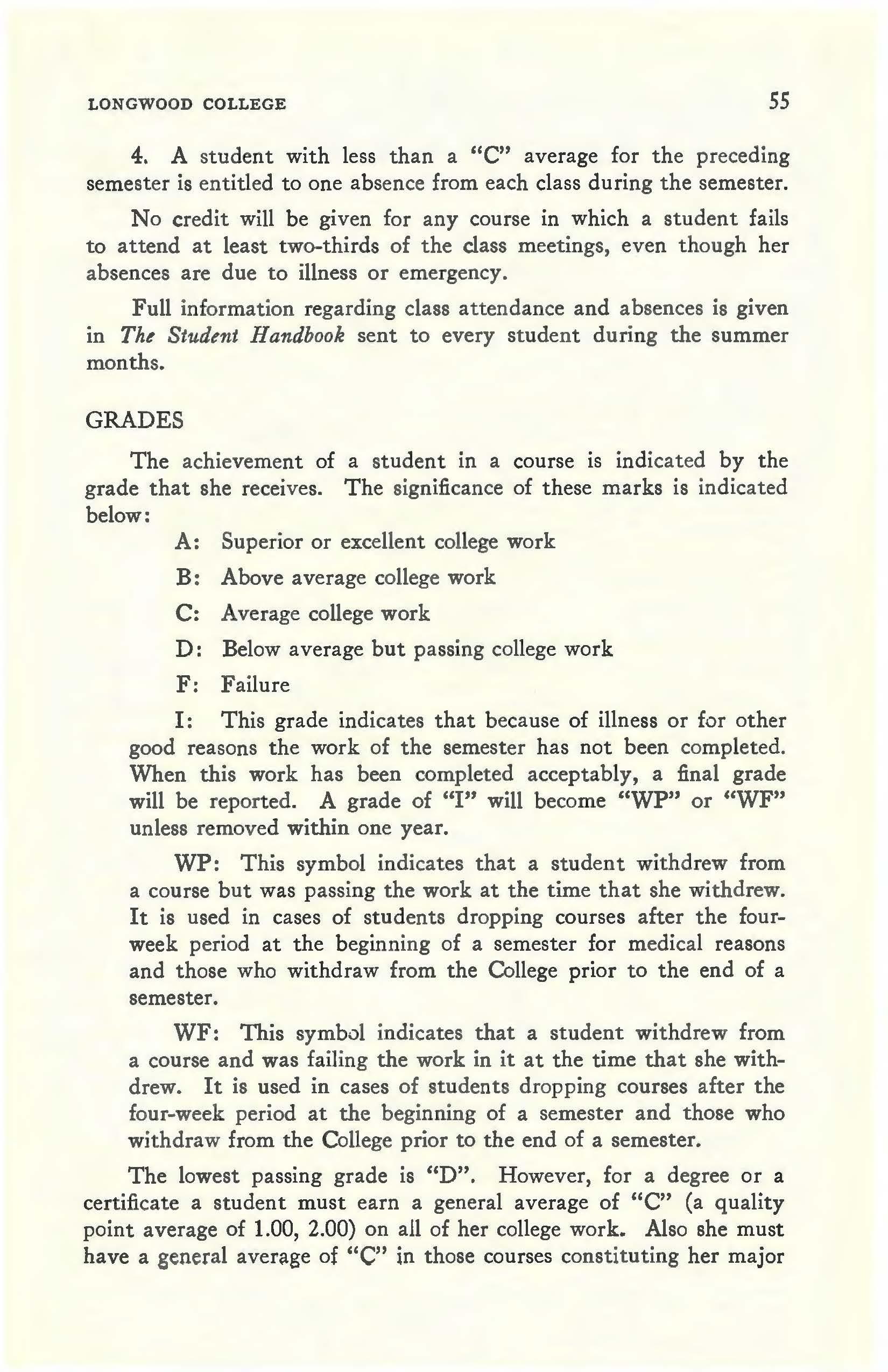
WF: This symbol indicates that a student withdrew from a course and was failing the work in it at the time that she withdrew. It is used in cases of students dropping courses after the four-week period at the beginning of a semester and those who withdraw from the College prior to the end of a semester.
The lowest passing grade is "D". However, for a degree or a certificate a student must earn a general average of "C" (a quality point average of 1.00, 2.00) on all of her college work. Also she must have a general average of "C" in those courses constituting her major
subject or field. At times, it is necessary for a student to repeat certain courses or enroll in additional courses in order to raise her averages to these requirements.
At the end of the first half of each semester of the regular session, mid-semester grade estimates are issued to the students and their parents or guardians. These are not official grades. Instead, they represent the instructors' estimates of the students' progress up to that point. At the end of each semester, reports are issued to students and their parents or guardians showing their final grade in each course in which they are enrolled.
The quality of work completed by a student is recognized by the assignment of points to various grades. For some years Longwood College has used the "Three Point" system. By a faculty decision of December 7, 1961, a change will be made gradually to the "Four Point" system. The old system remains in effect for all students already in college; the new system goes into effect for all students entering in September, 1962, and thereafter.
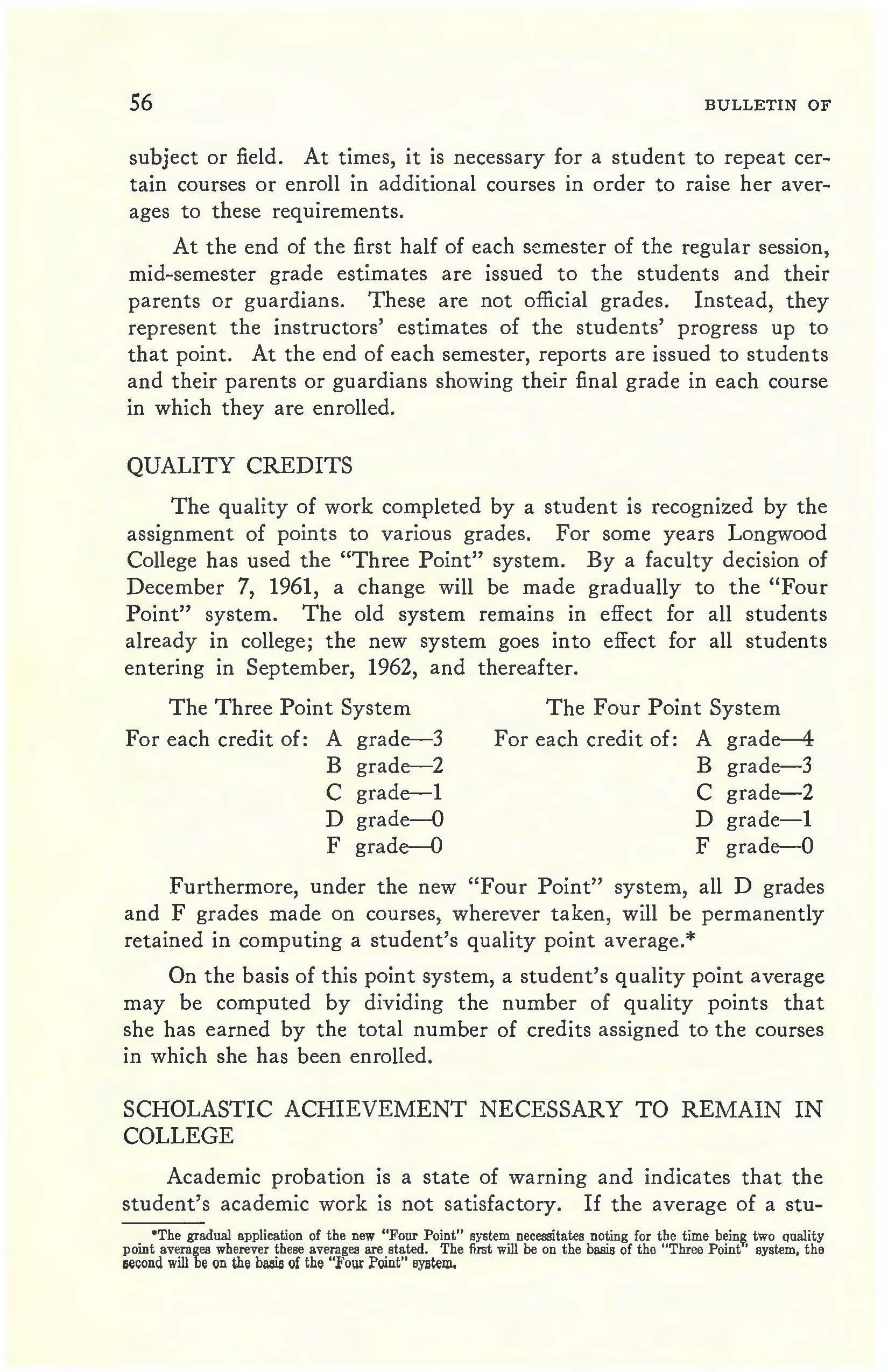
The Three Point System
For each credit of: A grade-3 B grade-2 C grade-I D grade---0 F grade--0
The Four Point System
For each credit of: A grade-4 B grade-3 C grade-2 D grade-I F grade-0
Furthermore, under the new "Four Point" system, all D grades and F grades made on courses, wherever taken, will be permanently retained in computing a student's quality point average.*
On the basis of this point system, a student's quality point average may be computed by dividing the number of quality points that she has earned by the total number of credits assigned to the courses in which she has been enrolled.
Academic probation is a state of warning and indicates that the student's academic work is not satisfactory. If the average of a stu-
•The gradual application of the new "Four Point" system necessitates noting for the time bein~ two quality point averages wherever these averages are stated. The first will be on the baais of the "Tbree Point ' syatem, tho aecond will be on the basis or the "Fo\U" Point" syste111.
dent is not satisfactory during the first semester, she will be placed on academic probation for the second semester.
The minimum academic requirements are as follows: Freshmen entering in 1962, 1.50 (four point system) first semester; 1.60 (four point system) second semester. Sophomores and juniors 1962-63 and juniors 1963-64, 1.00 (three point system).
All students enrolled in curricula leading to degrees in education undertake supervised teaching during their senior year. Each student is assigned to work with a regular teacher in a public school located off the campus. The student teaching period consists of a concentrated eight-week block of full-time teaching and observation. This involves a minimum of 175 clock hours of directed teaching and 25 hours of directed observation. Six semester hours of credit are earned in student teaching for the eight-week period.
Prerequisites. Students must meet the following prerequisites for enrollment in Education 300 or Education 400 for student teaching:
1. They must have completed Psychology 251, 256 and Education 352.
2. They must have completed at least twelve semester hours in appropriate courses in the subject matter fields in which they plan to undertake their student teaching.
3. They must have a cumulative academic average of at least "C" on all college work. Those planning to engage in supervised teaching in the high school must also have an average of at least "C" in the field in which they will teach.
Virginia Certification Requirements. Students seeking certification at a particular level must satisfy the following requirements of the State Board of Education in Virginia:
"When a student seeks endorsement to teach in nursery school, kindergarten, or grades one through three, some of the student teaching shall be in these grades. '\Vhen the student seeks endorsement to teach in grades four through seven, the student teaching may be done on any grade level in grades one through seven. Student teaching in any one or more of the grades four through seven will be accepted as satisfying the student teaching require-
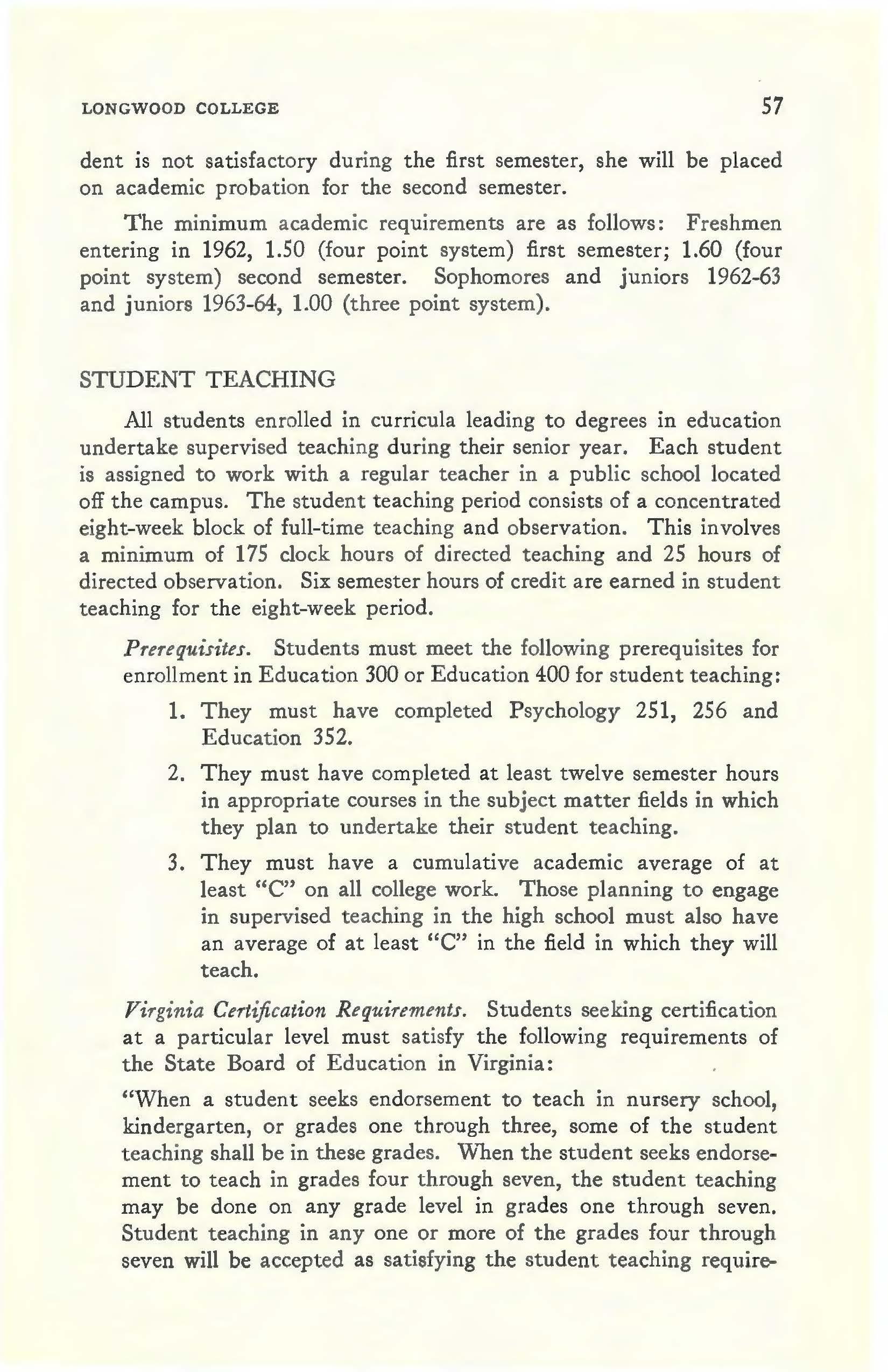
ment for high school endorsement in lieu of student teaching in the high school."
The College recognizes superior scholarship through its Dean's List and the announcement of an honor list at each commencement.
The Dean's List is published at the end of each semester. Students whose names appear on it are those who have earned an academic average of B+ (a quality point average of 2.50, 3.50 or above) on the work taken in the semester with no grade below "C". Special privileges are granted these students. (See the section on "Class Attendance".) A student's name may be removed from the list at the middle of the semester if her mid-semester grade estimates do not meet the required standard.
Those students whose general averages for four years of study are above B+ (a quality point average of 2.35, 3.35 or above) are graduated "With Honor''.
Written examinations are given during a designated period at the end of each semester and summer session to every student enrolled in each course in the College. These are each three hours in length.
Deferred examinations for the first semester must be taken within thirty days after the beginning of the second semester. Those deferred from the second semester must be taken during the summer session or during the last two days preceding the date set for the return of upperclassmen to the College in September. Those deferred from the summer session must be removed during the same two days. (See page 44 for fees.)
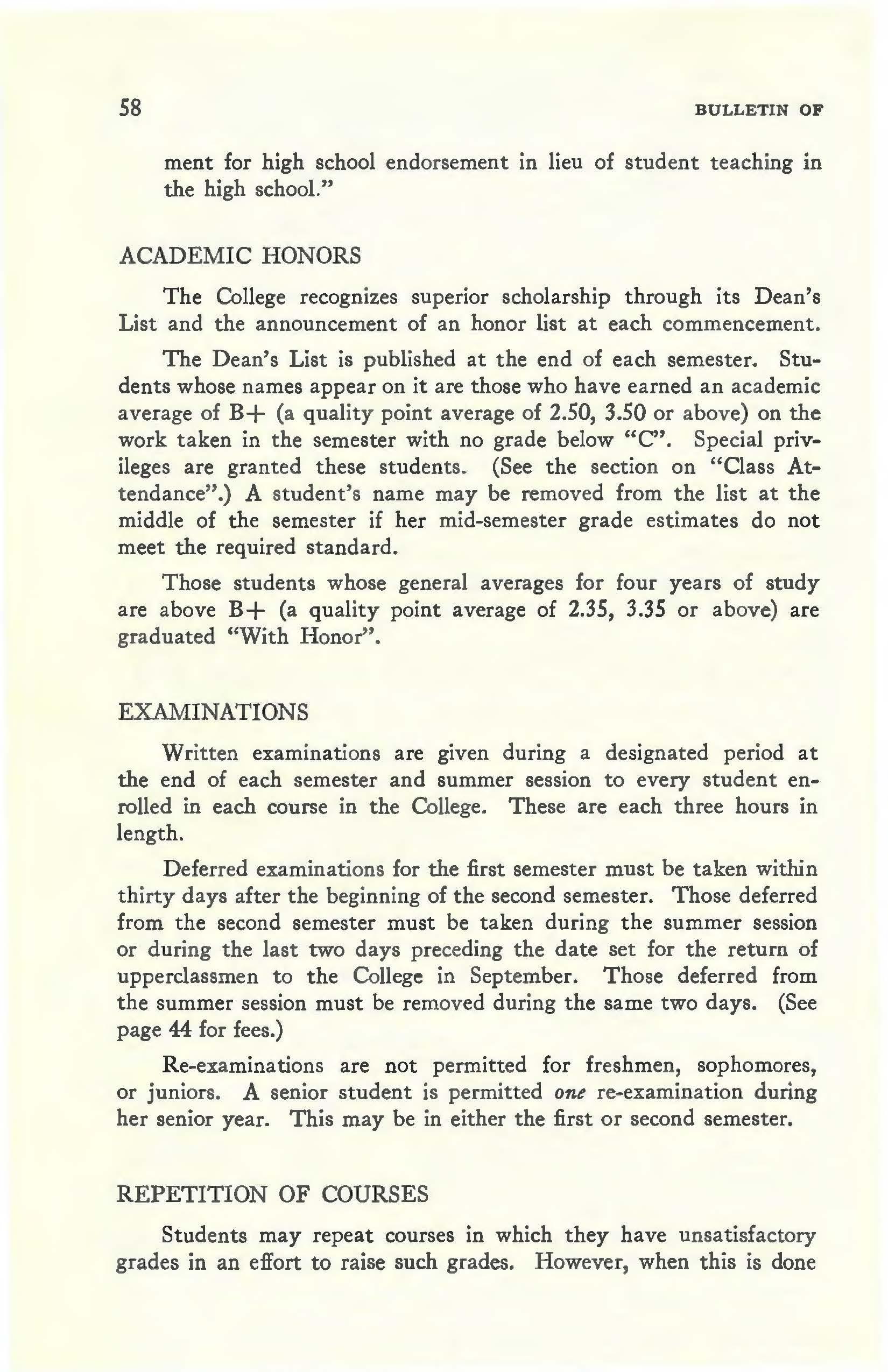
Re-examinations are not permitted for freshmen, sophomores, or juniors. A senior student is permitted one re-examination during her senior year. This may be in either the first or second semester.
Students may repeat courses in which they have unsatisfactory grades in an effort to raise such grades. However, when this is done
the grade earned when the course is repeated will also be the one utilized by the College in computing the student's average, or in evaluating her record for the purposes of graduation even if the grade is lower than the one received when the student enrolled in the course for the first time.
The College accepts, on transfer, credits of acceptable grade earned in other accredited colleges and universities provided such credits may be applied toward the requirements for a degree in this institution. Credits of a grade quality of below "C'' are not accepted on transfer unless there is definite evidence that the student has attained a greater mastery of the subject than the grade indicates
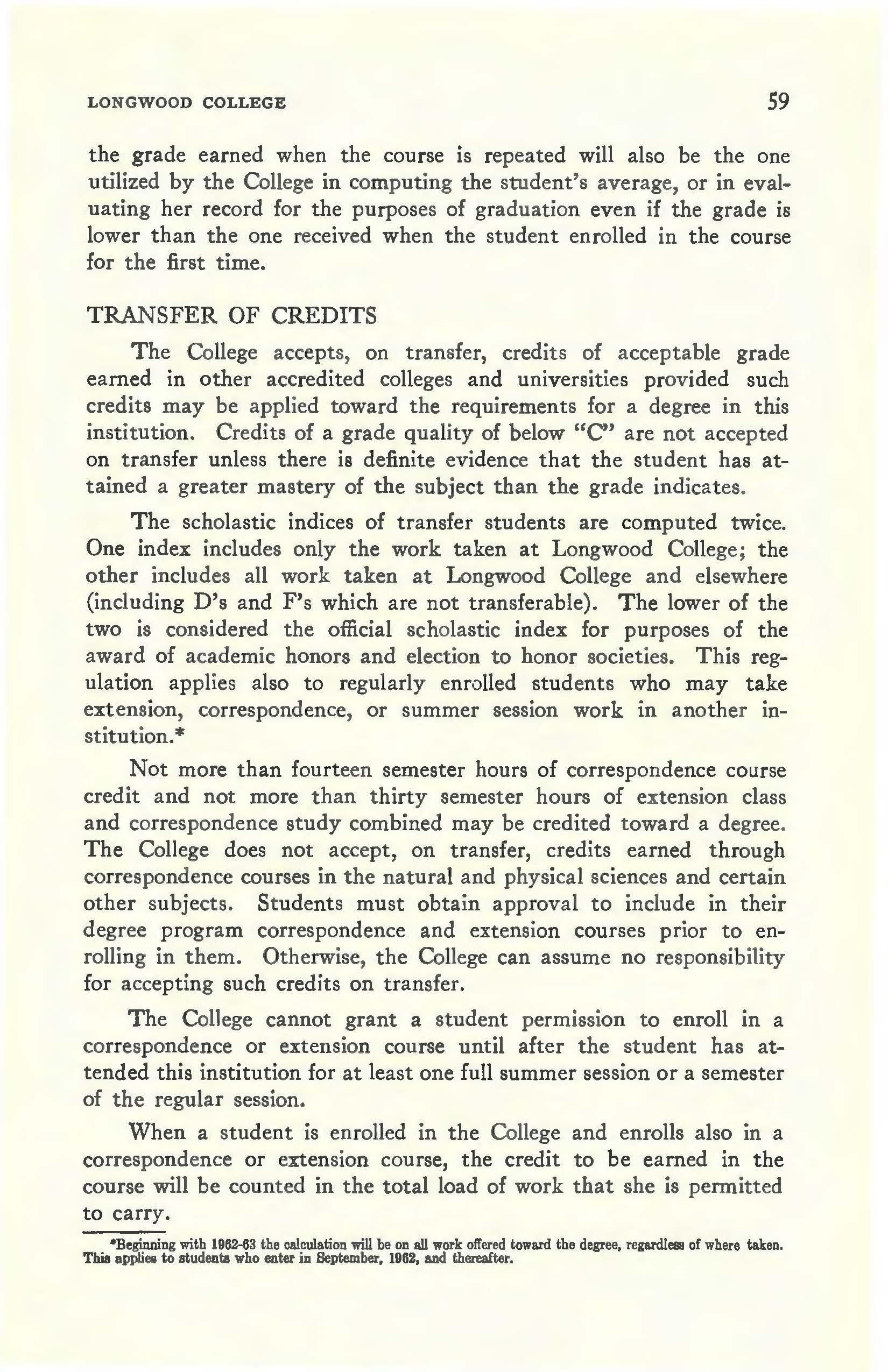
The scholastic indices of transfer students are computed twice. One index includes only the work taken at Longwood College; the other includes all work taken at Longwood College and elsewhere (including D's and F's which are not transferable). The lower of the two is considered the official scholastic index for purposes of the award of academic honors and election to honor societies. This regulation applies also to regularly enrolled students who may take extension, correspondence, or summer session work in another institution.*
Not more than fourteen semester hours of correspondence course credit and not more than thirty semester hours of extension class and correspondence study combined may be credited toward a degree. The College does not accept, on transfer, credits earned through correspondence courses in the natural and physical sciences and certain other subjects. Students must obtain approval to include in their degree program correspondence and extension courses prior to enrolling in them. Otherwise, the College can assume no responsibility for accepting such credits on transfer.
The College cannot grant a student permission to enroll in a correspondence or extension course until after the student has attended this institution for at least one full summer session or a semester of the regular session.
When a student is enrolled in the College and enrolls also in a correspondence or extension course, the credit to be earned in the course will be counted in the total load of work that she is permitted to carry.
•Beginning with 1962-63 the calculation will be on all work offered toward the degree, rega:dlea, of where taken. Thia appliea to studeota who enter in September, 1962, and thereafter.
The College awards the bachelor's degree to a student who has fulfilled the following requirements:
1. Completion of all study required in one of the eight curricula offered by the College.
2. Completion of a course of study giving a minimum of 126 semester hours of credit with a minimum general average of "C" in all work taken and a minimum general average of "C" in courses taken in the major subject or field.
3. Attendance as a student for at least one session consisting of two semesters, including the last semester immediately preceding graduation. (Two consecutive summer sessions may be substituted for one semester. A summer session would consist of one eight-week term or one three-week term plus one five-week term.)
4. Passage of the swimming test.
5. Forty-four hours on the 30MOO level.
6. Not more than fourteen hours by correspondence, nor more than thirty hours by correspondence and/or extension.
7. Approval of the individual by the general faculty as a worthy candidate for graduation.
Progressive development in the College forces frequent rev1s10n of curricula. In every new catalogue some improvements are indicated. When no hardship is imposed on the student because of changes, and when the facilities of the College permit, the student is expected to meet the requirements of the latest catalogue. In this way, the student may realize the benefits of improvements in her curriculum that she would be unable to realize were she to follow the curriculum tabulated in the catalogue at the time that she entered the College.
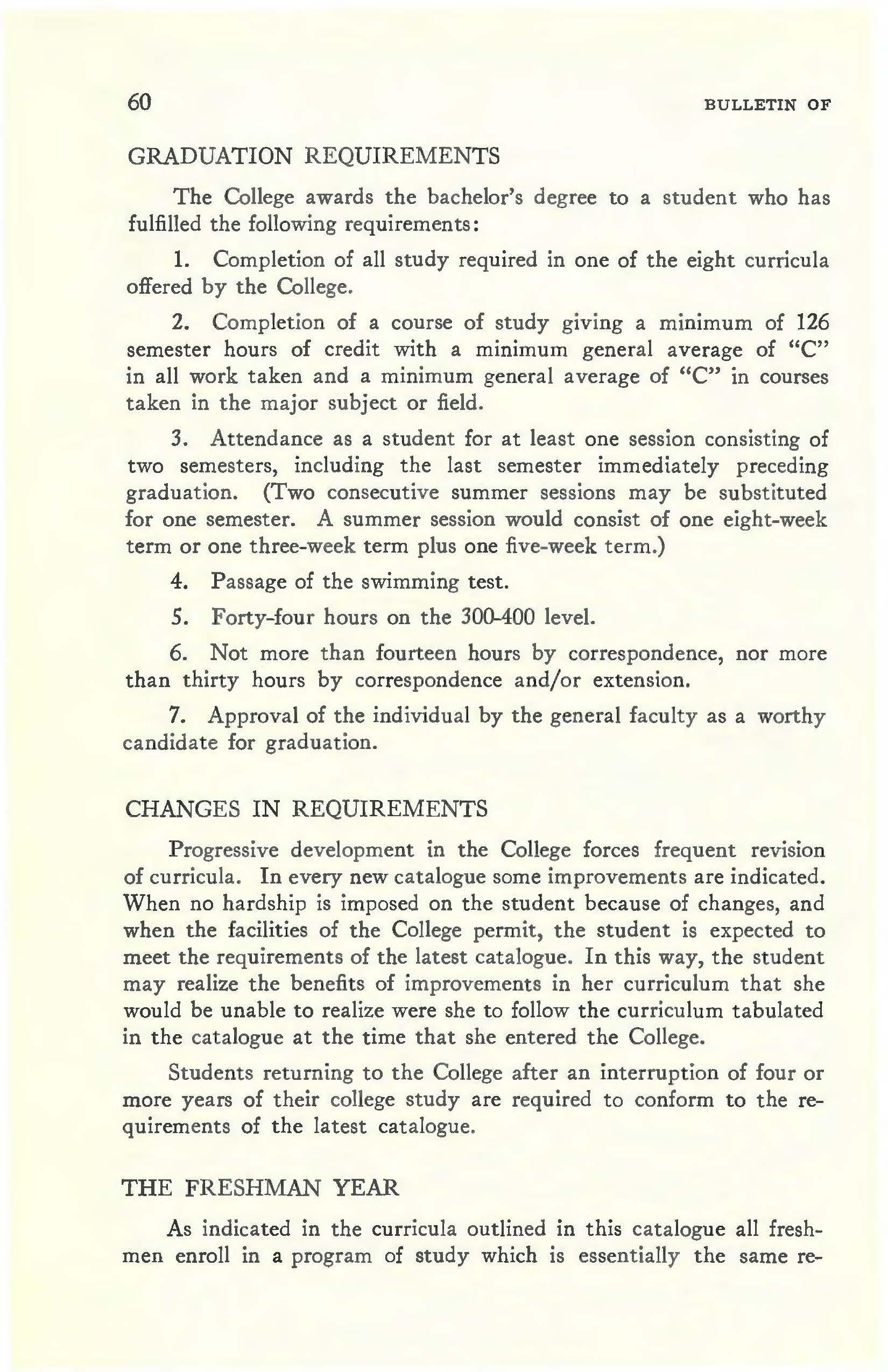
Students returning to the College after an interruption of four or more years of their college study are required to conform to the requirements of the latest catalogue.
As indicated in the curricula outlined in this catalogue all freshmen enroll in a program of study which is essentially the same re-
gardless of the curricula in which they plan to major or specialize. During the first year, the student studies English; history or geography; a science; physical education, and two courses selected on the basis of her tentative plans for the future. Suggestions are made in the outline of each curriculum regarding these elective courses. A definite choice of a curriculum and major is not made until the beginning of the sophomore year. Thus, the student who is uncertain as to her choice of a major or a curriculum may explore the opportunities available to her. The College offers assistance to her in making such a choice. See the section of this catalogue entitled "Student Personnel Program".

The course of study outlined below leads to the degree of Bachelor of Science in Elementary Education. Students receiving this degree are fully qualified to be teachers in elementary schools. The Virginia State Board of Education will issue to them the Collegiate Professional Certificate. Students enrolled in this curriculum may obtain sufficient credit, through elective courses, to qualify for teaching in one of the high school subject matter fields. Such endorsement necessitates that the student teaching be done in the fourth grade, or higher.
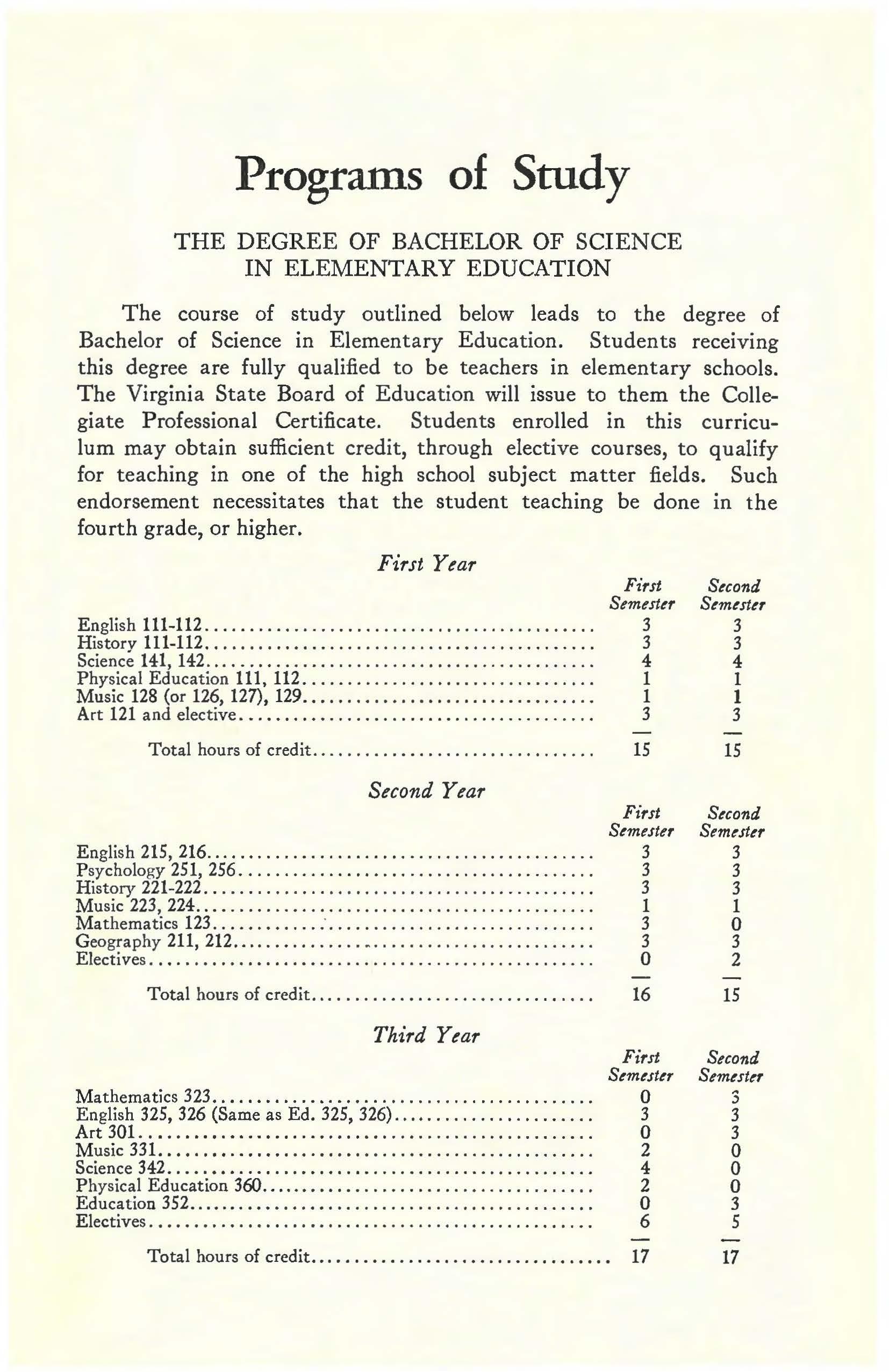
English 111-112 . .......................................... . History 111-112
. Science 141, 142 ..................... . .................... . . Physical Education 111, 112 .......... .. ................. .. . . Music 128 (or 126, 127), 129 ............................... .. Art 121 and elective .................................. . .... .
Total hours of credit ..... . ......................... .
English 215, 216 Psychology 251, 256 ....................................... . History 221-222 Music 223, 224 Mathematics 123 : Geography 211, 212 ...............•... Electives
Total hours of credit
Mathematics 323 English 325, 326 (Same as Ed. 325, 326) ...................... . Art 301 ........•.•...•.................................... Music 331. .••. , ••......................................... Science 342 .....••.........................................
Education
Total hours of credit.................................. 17 17
Education 357 ............................................ . Philosophy 460 .....•....................................... Health Education 341. *Education 300 ..••..•..................................... Electives .........•..••....................................
Total hours of credit ............................... .
First Semester 3 0 0 6 6 15
Semestl'r
The course of study outlined below leads to the degree of Bachelor of Science in Secondary Education. Students receiving this degree are fully qualified as teachers in junior and senior high schools. The Virginia State Board of Education will issue to them the Collegiate Professional Certificate. Students enrolled in this curriculum must select a major subject and fulfill the requirements set up for it by the department in which it is taught. From 24 to 36 semester hours of credit are required for a major, depending on the subject. Students may major in art, biology, chemistry, English, general science, geography, history, mathematics, physical education, social sciences, or sociology. Students who wish to become qualified to teach in the elementary schools of Virginia must take Education 325, English 326, Geography 211 or Geography 212, Mathematics 323, eight semester hours of science including both physical and biological science, and six semester hours of courses in art and music. In addition to these courses six semester hours credit in student teaching must be completed in accordance with the State Board of Education certification regulations in regard to student teaching. See page 57.
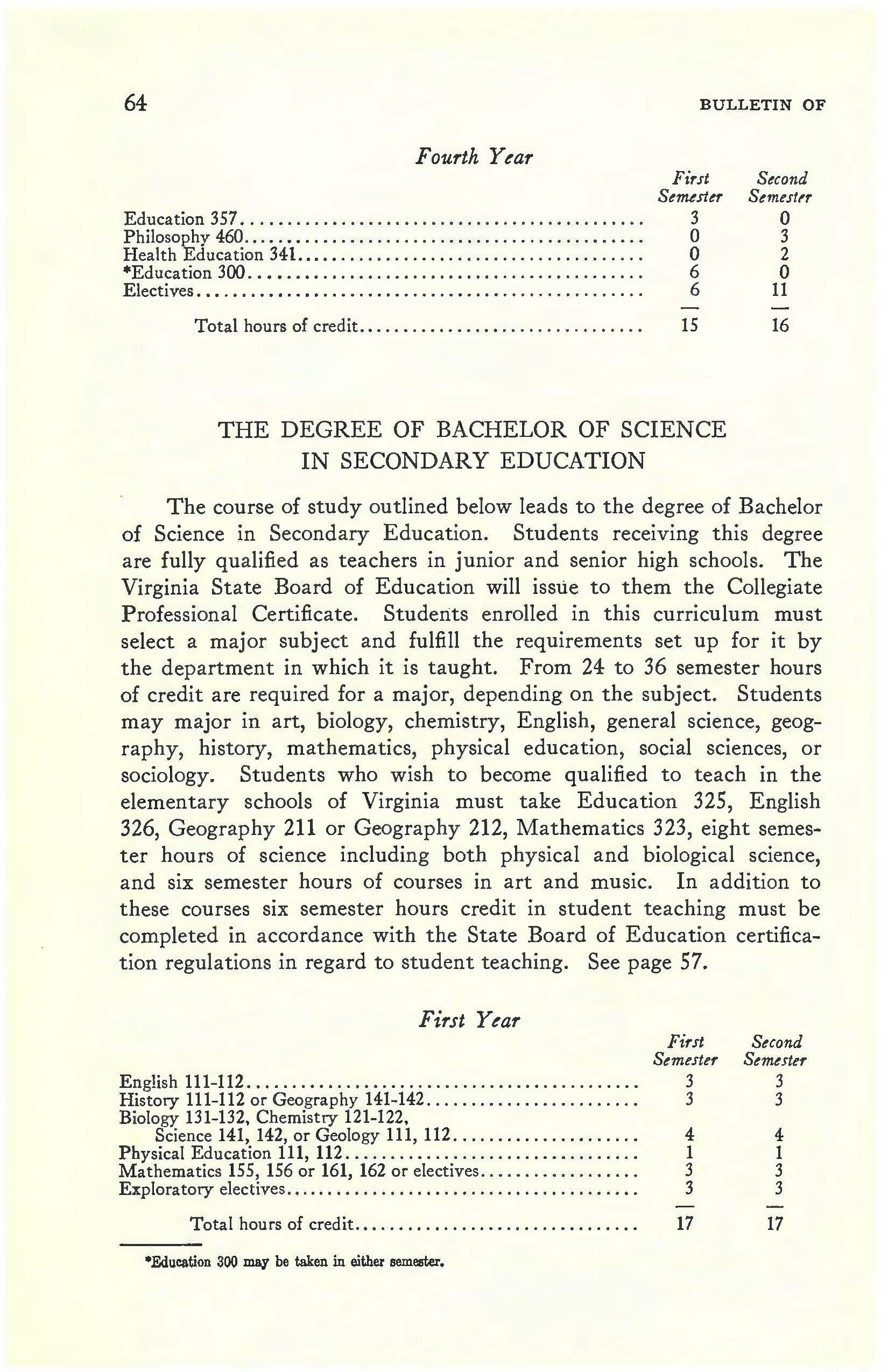
English 111-112 .........•..................................
History 111-112 or Geography 141-142 Biology 131-132, Chemistry 121-122, Science 141, 142, or Geology 111, 112 Physical Education 111, 112 Mathematics 155, 156 or 161, 162 or electives Exploratory electives .•......................................
Total hours of credit .•..............................
*Education 300 may be taken in either semester,
Fir1t Semester
Ps y cholo gy 251, 256 3 3 Hi story 221-222 .................. . . . . . . ... . . .............. . 3
En glish elective (literature)
Math e matics 155, 156 or 161, 162 or e lective s . ................ . 3
Physical education electives 1 Major subject. 3 4
Second Semester 3 3 3 3 1 3-4
Total hours of credit. 16-17 16-17
Education 352 Art or mu sic (all in one subject) Health Education 341. .......... .......... ... . .......... . .. . Major subject ................... .. . . .. .. . ... .............. . Electives
First Semester 0 3 2 3-4 7
Second Semester 3 3 0 3-4 6
Total hours of credit 15-16 15-16
Philosophy 460
400
Education 357
Major subject or electives ,
Total hours of credit
Fir1t Semester 0 6 3 6 15
Second Semester 3 0 0 12 15
The course of study outlined below leads to the degree of Bachelor of Arts in Secondary Education. Students receiving this degree are fully qualified as teachers in junior and senior high schools. The Virginia State Board of Education will issue to them the Collegiate Professional Certificate. Students enrolled in this curriculum must select a major subject and fulfill the requirements set up for it by the department in which it is taught. From 24 to 36 semester hours of credit are required for a major, depending on the subject. Students may major in art, biology, chemistry, English, French, general science, geography, history, Latin, mathematics, philosophypsychology, social sciences, sociology, or Spanish. Students who wish to become qualified to teach in the elementary schools of Vir-
•Education 400 may be taken in either semester.
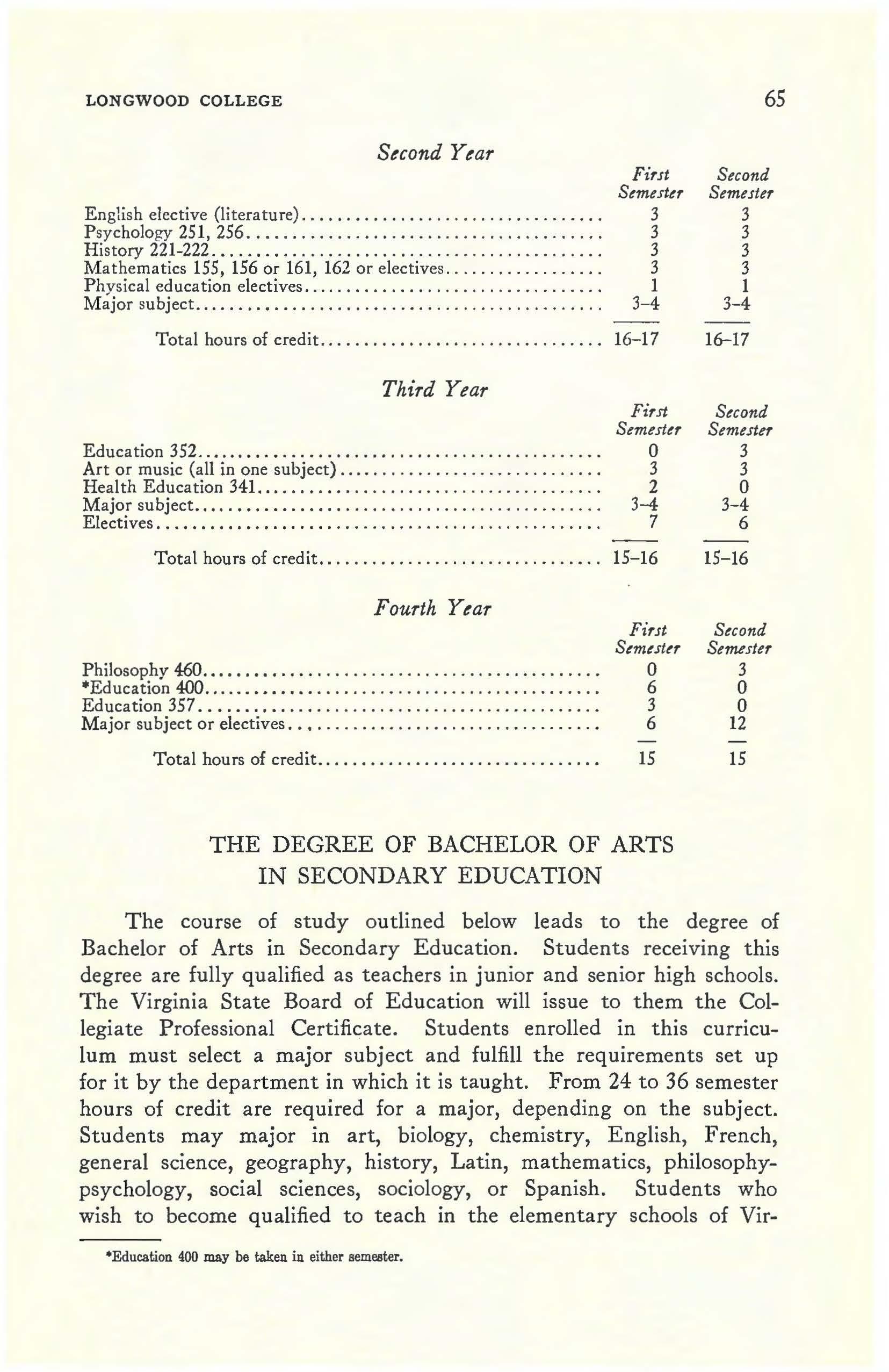
ginia must take Education 325, English 326, Geography 211 or Geog raphy 212, Mathematics 323, eight semester hours of science including both physical and biological science, and six semester hours of courses in art and music. In addition to these courses six semester hours credit in student teaching must be completed in accordance with the State Board of Education certification regulations in regard to student teaching. l_See page 57.
English 111-112 ........................................... . History 111-112 or Geography 141-142 Biology 131-132, Chemistry 121-122, Science 141 , 14-2, or Geology 111, 112
Physical Education 111, 112
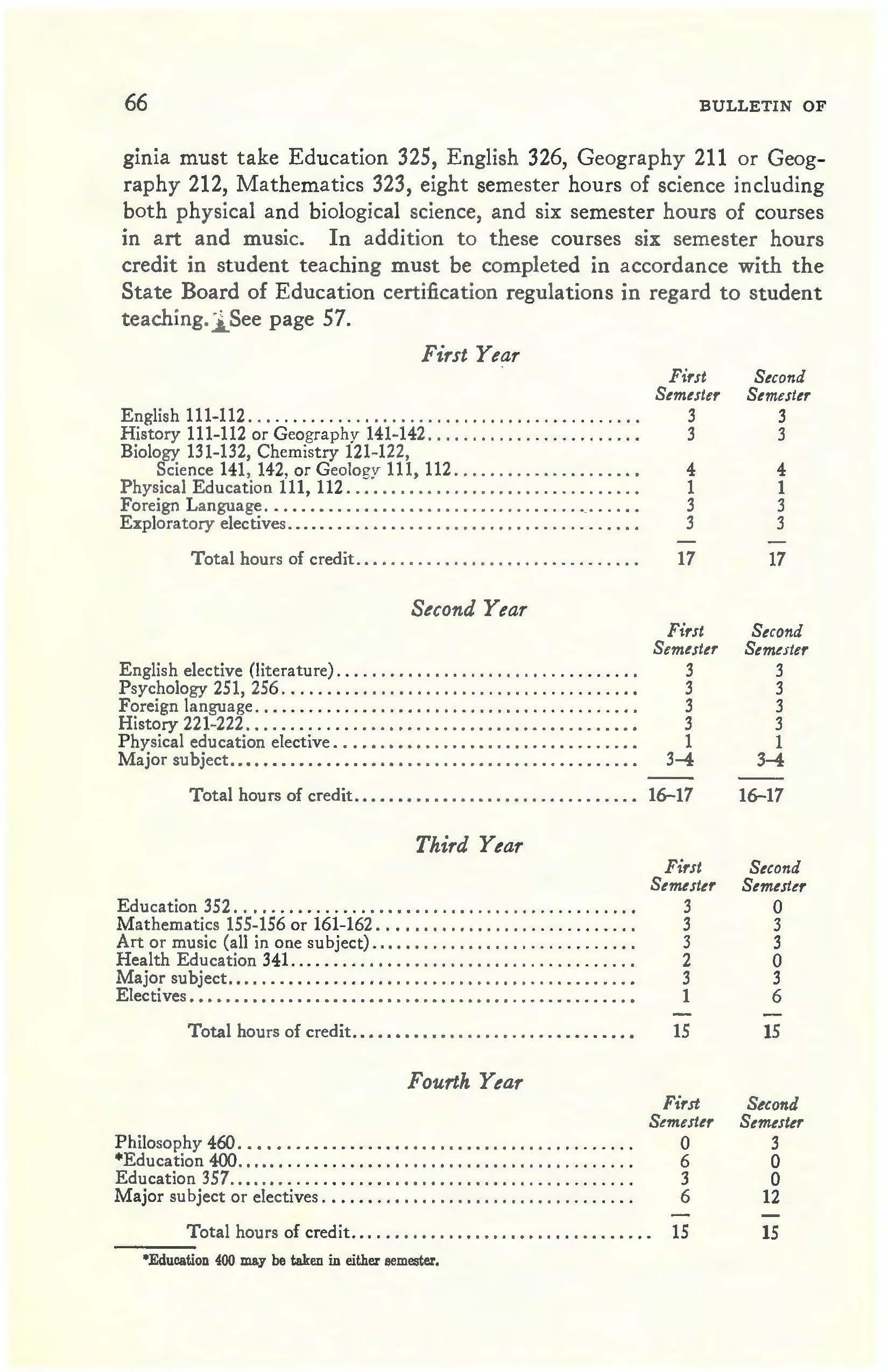
Total hours of credit. , .................•
English elective (literature)
The program of study outlined below leads to the degree of Bach elor of Sc ience in Home Economics E ducation. Students receiving this degree are fully qu alified to be teachers of home economics in secondary schools. The Virginia State Board of Educ ation will issue to them the Collegiate Professional Certific ate.
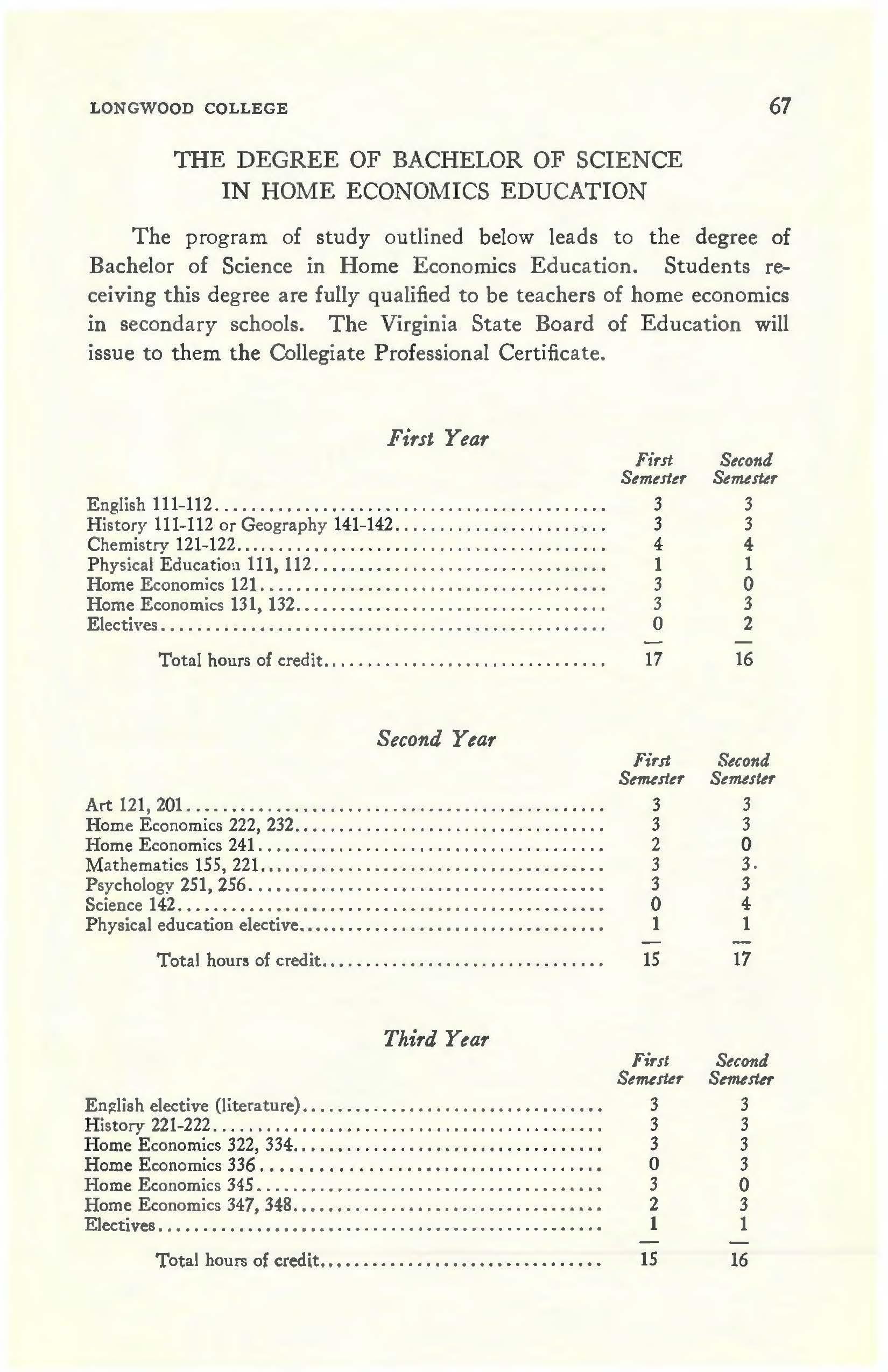
English 111-112 ..... ........ ......... ........... ...... .... . History 111-112 or Geography 141-142 Chemistry 121-122 .................... ........... ..... ..... . Ph ysical Education 111, 112 Home Economics 121 Home Economics 131, 132 .................................. . Electives ...........•......................................
Total hours of credit
Year
Art 12 1, 201 Hom e Economics 222, 232 .... .. ............................ . Home Economics 241 M athematics 155, 221 ... ...•................................ Psychology 251, 256 ......••..............................•. Science 142 ............................................... . P hysical education elective ..••...............................
Total hours of credit
Third Year
Fir.rt Second Seme rter Seme .rter
3 3 4 1 3 3 0 17
3 3 4 1 0 3 2 16 Fir.rt Second Semester Semester
3 3 2 3 3 0 1 15 First Semester
En:zlish elective (literature).. . . . . . . . . . . . . . . . . . . . • . . . .. .. . . . • • 3 Hi story 221-222. 3 Home Economics 322, 334. . . . . . . . . . . . . . . . . . . . . . . . . . . . . . . . . . . 3 Home Economics 336 0 Home Economics 345 . . . . . . . . . . . . . . . . . . . . . . . . . . . . . . . . . . . . . . • 3 Home Economics 347,348................................... 2 Electives. . . . . . . . . . . . • • . • . . • . . . . . . . . . . . . . . . . . . . . . . . . . . . . . . . 1
hours of credit...
Education 357 . ............................................ . *Education 400 ............................................ . Health Education 341 ...................................... . Home Economics 431 ...................................... . Home Economics 441 Home Economics 443 Philosophy 460 Sociology 441 Electives
Total hours of credit ............................... .
The course of study outlined below leads to the degree of Bachelor of Science in Business Education. Students receiving this degree are fully qualified to be teachers of bookkeeping, typewriting, shorthand, office and secretarial practice, and social business subjects in high schools. The Virginia State Board of Education will issue to them the Collegiate Professional Certificate. A total of 12 semester hours in social business subjects and 6 semester hours in clerical practice and office machines is required for complete endorsement in business education by the State Department of Education. Students will be qualified for secretarial and other clerical positions of responsibility.
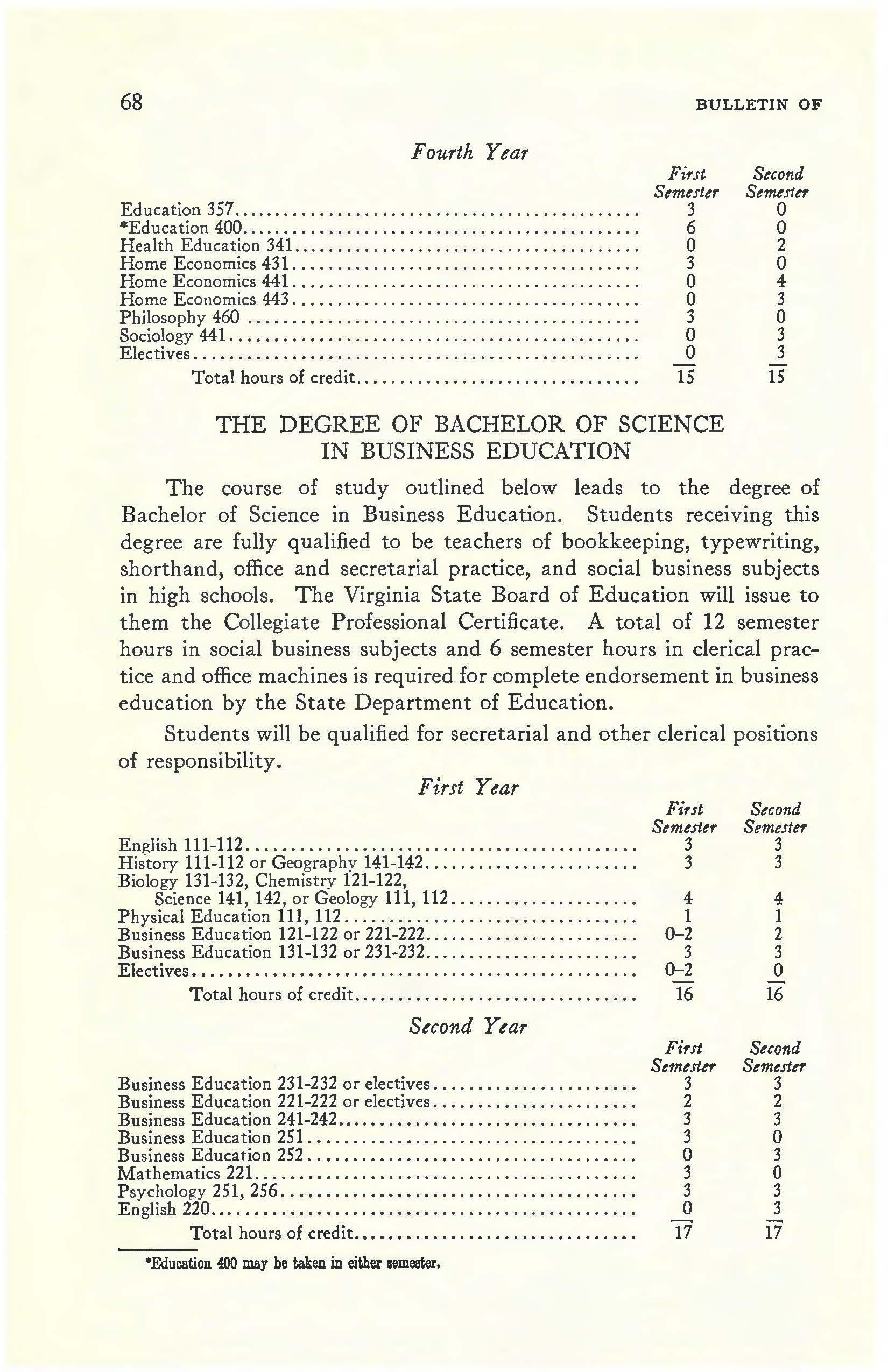
English 111-112 ...........................................
History 111-112 or Geography 141-142 .......................
Biology 131-132, Chemistry 121-122, Science 141, 142, or Geology 111,112 .................... . Physical Education 111,112 ................................ . Business Education 121-122 or 221-222 ....................... . Business Education 131-132 or 231-232 ....................... . Electives ••...........••... , •..............................
Total hours of credit ............................... .
Business Education 231-232 or electives
. Business Education 221-222 or electives
Business Education 241-242 .. Business Education 251 .. ..................................
Business Education 252 . ...................................
Mathematics 221. . ........................................
Psycholo11y 251, 256 ...•........•........................... English 220 ..........••....................................
Total hours of credit .••.••..........................
•Education 400 lllllY be taken in either ,emeeler,
Business Education 341, 342 ................................ . Business Education 351 ••••••..............•......•....•..•• Business Education 352 .••............. , , History 221-222 •.•.....••••....................•......•.... English elective (literature) •.•...••..•..•........•...•....... Education 352 .••••....•••.•.....................•.....•••• Mathematics 155 or 161. •.•..... , . , ....... , , , .............. . Health Education 341 .••••..•.............••..............•• Physical education electives ................................. .
Total hours of credit .............................•..
Business Education 451 •.................................... Business Education 452 .•.......•....................... , ... Business Education 454 ....••......•....•..........•.....••• Philosophy 460 .•••••...••.........................•......•• •Education 400 ..•. , ....................................... . Education 357 •. •••• ....••....•........................•• Art or Music or Language .•................................. Electives, ••....••••...........••.•.......•...............•
Total hours of credit
The detailed program for the degree of Bachelor of Music will be found in a separate Bulletin of the College listin g the offerings of the Music Department. Students receiving this degree are fully qualified to be teachers or supervisors of music in the elementary or high schools. The Virginia State Board of Education will issue to them the Collegiate Professional Certificate,
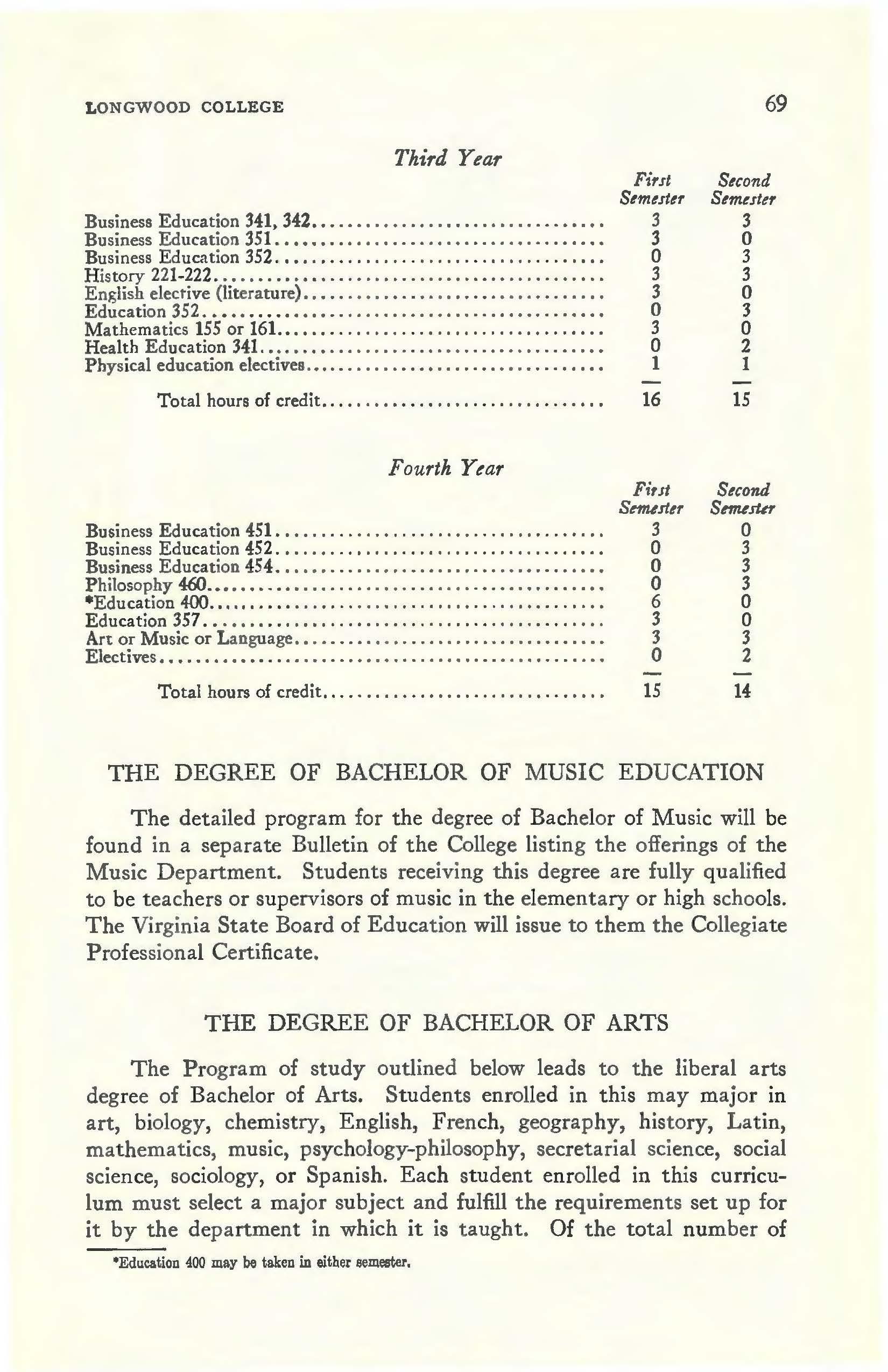
The Program of study outlined below leads to the liberal arts degree of Bachelor of Arts. Students enrolled in this may major in art, biology, chemistry, English, French, geography, history, Latin, mathematics, music, psychology-philosophy, secretarial science, social science, sociology, or Spanish. Each student enrolled in this curriculum must select a major subject and fulfill the requirements set up for it by the department in which it is taught. Of the total number of
•Education 400 may be taken in either semester,
credits required for graduation, the College requires the following credits for this degree: English, 12; foreign language , 18, or 12 beyond the beginning course; mathematics, 6; music or art, 6 (all in one field); history and social science, 12 (six must be in History 221-222) ; philoso p hy, 3; psych ology, 6; physical and health educati on, 6; and science (biology, chemistry, geology, or physics), 8.
En gli sh 111-112 Histo ry 111-112 or Geograph y 141-142 . .. .. . ............ . .... . Biology 131-132 , Chemistry 121-122, or Geology 111, 112 ............. ... . .. . . . . .... .. ...... . . Physical Education 111,112 F ore ign Lan gua ge . .....• . .. ... . . .... . ..... ... . ... . ........ . Elect ives
Total hours of credit.
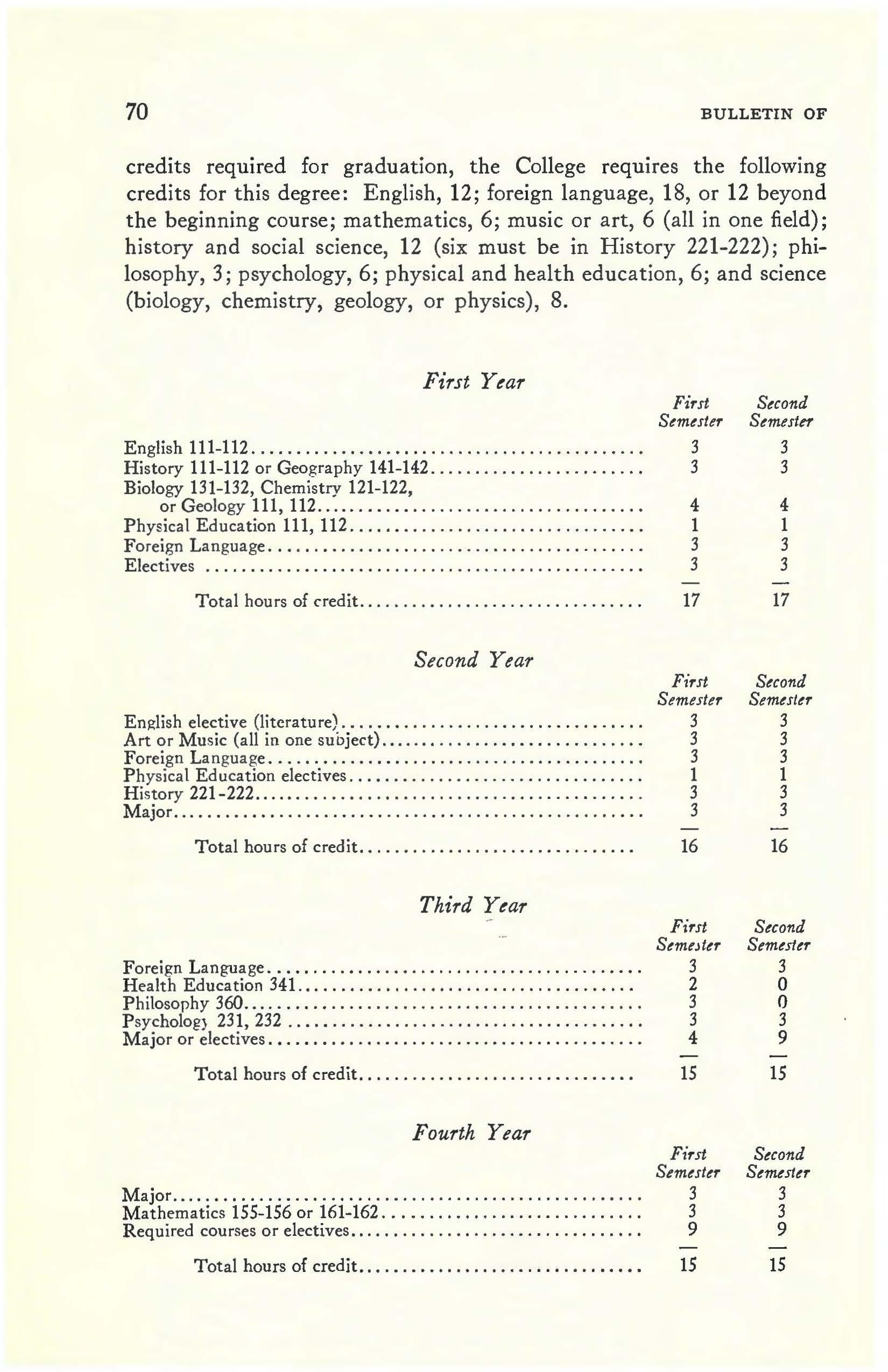
English elective (l iterature ) ....... . .... ... .................. . Art or Mu sic (all in one suoject} .... .. . . . . . .. .............. .. .
Forei gn Lan guage Ph ys ical Edu cation electives Hi stor y 221-222 Major
Total hour s of credit. .. . .. . ..... . ... . .. ... .. ... . . . .
Forei gn Langua ge Health Education 341 Philos op hy 360 P sycholo g) 231 , 232 .......... . .... . . . . . . . . . . . ....... . ..... . Major or electives .•...... . . . . . ... . . ... ... .. ......... . .... . .
Total hours of credit ...... . .. . ........ .. ... . ... ... .
Major ...................... . ... .. . . .... . ............ .. . .. . Mathematic s 155-156 or 161-162 .... . ..................... .. . Required courses or electives
Total hours of credit .......•......................•.
The program of study outlined below leads to the liberal arts degree of Bachelor of Science. Students enrolled in this may major in biology, chemistry, geography, history, mathematics, secretarial science, social science, or sociology. Each student enrolled in this curriculum must select a major subject and fulfill the requirements set up for it by the department in which it is taught. Of the total number of credits required for graduation, the college requires the following credits for this degree: English, 12; social science, 12 (six must be in History 221-222); science (biology, chemistry, geology, or physics), 30 (24 hours required of mathematics majors); foreign language, 12; mathematics, 6; art or music, 6 (all in one field); psychology, 6; and physical and health education, 6. Students enrolled in this degree program may arrange their electives during the first three years at Longwood College in a manner to enable them to qualify for admission to the School of Medicine of the University of Virginia in the field of medical technology. After a year of successful study in the field at the University of Virginia, a student may transfer sufficient credits to Longwood College to complete the requirements for the B.S. degree. A student interested in this possibility should, before registering as a freshman at Longwood, seek the help of the faculty advisor for this field in arranging her program of studies.
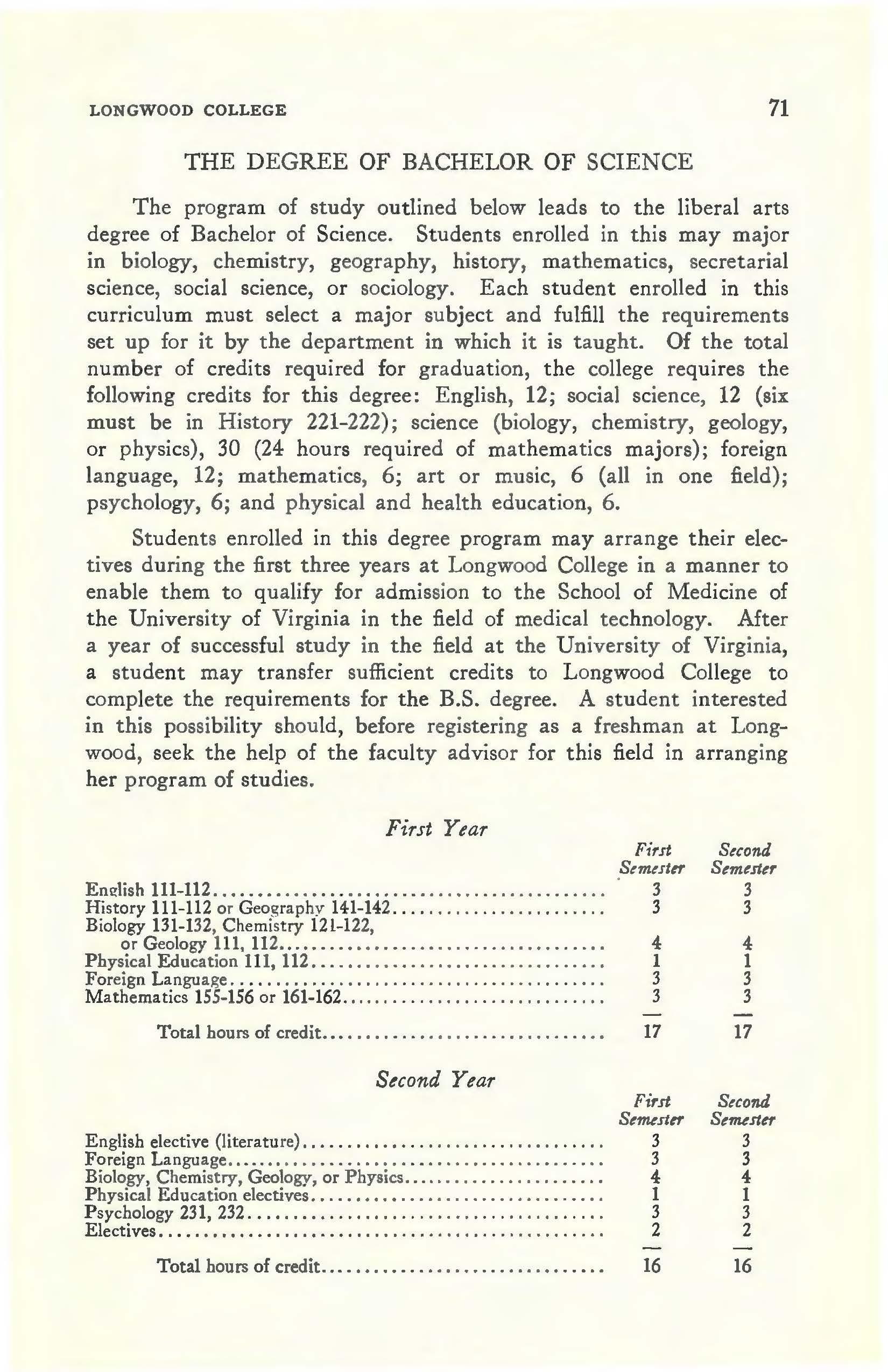
English 111-112
History 111-112 or Geography 141-142
Biology 131-132, Chemistry 12!-122, or Geology 111, 112
Physical Education Ill, 112
Foreign Language
Mathematics 155-156 or 161-162
Total hours of credit
English elective (literature)
Foreign Language
Physical Education electives
Psychology 231, 232
Electives
Major or electives ...•........ ................•.... History 221-222 ......•••................................... Health Education 341. Biology, Chemistry, Geology, or Physics
Fir1t Semuter 7 3 2 3-4
Second Semuter 9 3 0 3-4
Total hours of credit 15-16 15-16
Major ••••.••..•........................................... Science and electives .......................................• Art or Music (all in one subject)
Total hours of credit .•• . ....•.........•.......•....•
Fir1t Semester 3 9 3 15

Second Semester 3 9 3 15
This curriculum prepares students for admission to accredited schools of nursing, medical and X-ray technology, pharmacy, dentistry and medicine. Since special requirements of professional schools vary considerably, students should communicate with the professional schools in which they plan to enroll prior to registration for classes at Longwood College. The advisor to pre-medical students at Longwood College will plan the student's schedule according to selection of the professional school.
Students planning to enter schools of medicine or dentistry should complete!work for the Bachelor of Science degree. In general, the first year requirements for all pre-professional courses in any of the medical sciences are:
Fir1t Semater
English 111-112 ...............• . ........•....•............. History 111-112 or 221-222 ................................. . 3 3 Biology 131-132 ........................................... . Chemistry 121-122 ................... .•. .................... 4 4 Physical Education 111, 112 ................................ . 1
Total hours of credit ............................... . 15
Second Semater 3 3 4 4 1 15
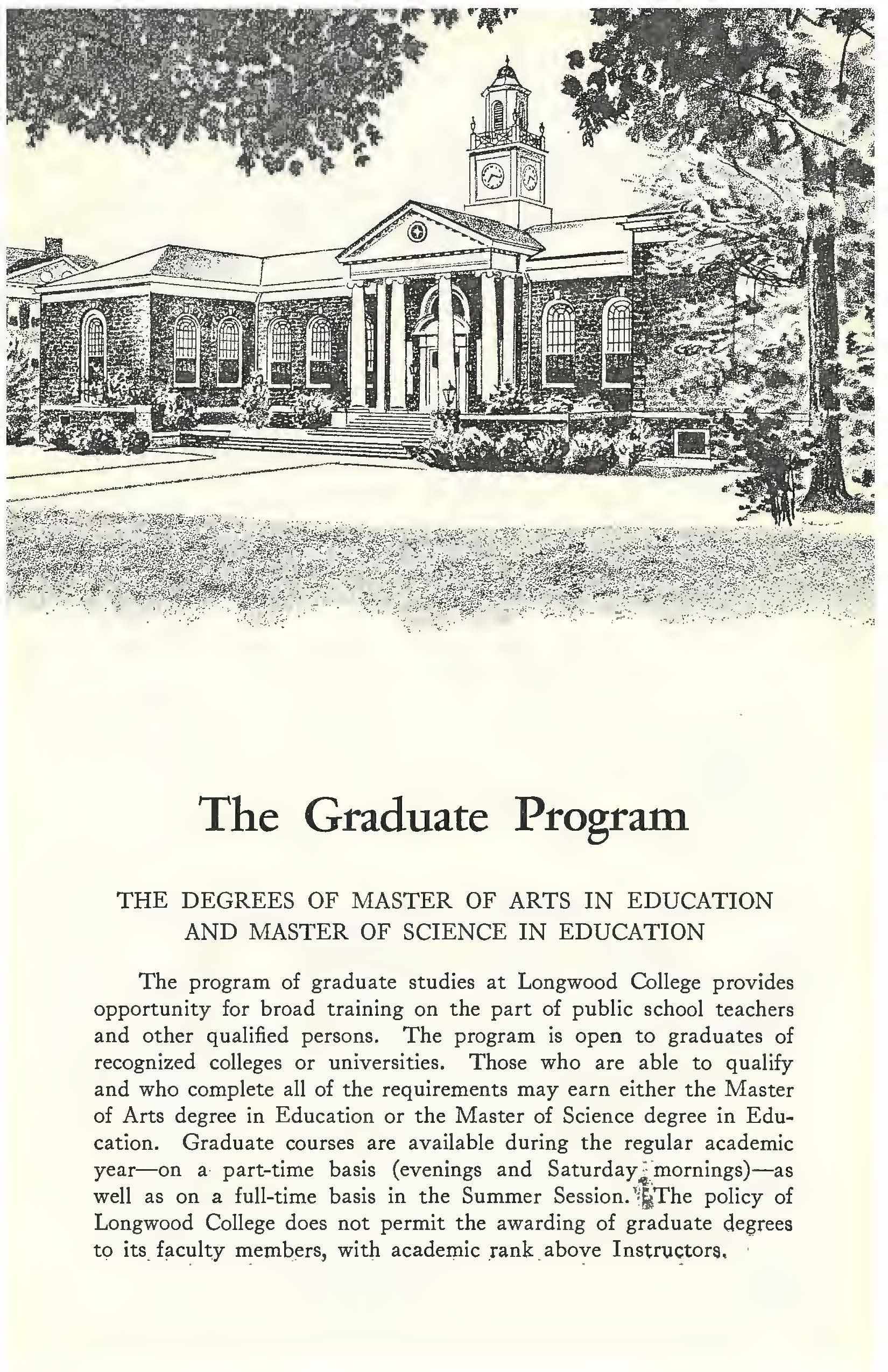
The program of graduate studies at Longwood College provides opportunity for broad training on the part of public school teachers and other qualified persons. The program is open to graduates of recognized colleges or universities. Those who are able to qualify and who complete all of the requirements may earn either the Master of Arts degree in Education or the Master of Science degree in Education. Graduate courses are available during the regular academic year-on a part-time basis (evenings and Saturday;:mornings)-as well as on a full-time basis in the Summer Session. 'i,The policy of Longwood College does not permit the awarding of graduate degrees to its_ fac1;1lty ~embers, with academic rank _abo-ye Instructors.
A student who holds the baccalaureate degree from an accredited institution may apply for admission to graduate study. For this purpose he should obtain from the Dean of the College an admissions form. The applicant should have official transcripts of all undergraduate and graduate work taken at other institutions sent to the Dean at least one month prior to the opening of the session. All documents become the property of Longwood College. A student may enroll in graduate courses without becoming a candidate for a degree.

Admission to graduate courses will be granted to persons who meet the following qualifications:
1. United States citizenship, or, in the case of foreign students, possession of an appropriate Department of State study permit.
2. The Bachelor's degree from a college or university accredited by the National Council of Accreditation of Teacher Education, the Southern Association of Colleges and Secondary Schools, or other regional agency.
3. An academic aptitude for graduate work, which will be determined principally from the applicant's undergraduate record.
Conditional Admission
The following applicants may be admitted conditionally:
a. Applicants for whom all of the necessary entrance information has not yet been received and approved by the Graduate Council.
b. Students whose undergraduate records are not entirely satisfactory or who show minor deficiencies in their major fields.
c. Capable students who lack not more than five semester hours to complete their undergraduate program at Longwood College.
cl. Mature persons who have special or personal interest not covered by the above.
The conditional status, however, should be regarded as temporary, and the students should seek to remove all conditions as soon as possible .
The special requirements of the several College departments
are designed to insure that the student is able to take advantage of the opportunities provided for advanced study. These requirements relate as a rule to the completion of certain undergraduate "prerequisites" but may include satisfactory performance on aptitude or achievement tests. Details will be furnished by the department.
After admission to graduate study a student should seek an early conference with the chairman of the department in which he plans to specialize. On the basis of this conference, the department chairman will aid the student in selecting his advisory committee which will assist the student in planning his program and be available whenever counsel is desired. If the student is uncertain as to the area in which he wishes to specialize, he should confer with a member of the Graduate Council. ·

A student is considered ready to seek admission to candidacy for a Master's degree when he has:
a. Demonstrated his aptitude to undertake graduate work for at least one summer term or one semester at the graduate level.
b. Removed any conditions attendant upon his admission to the Graduate Program and removed any deficiencies in prerequisites established by his department.
c. Formulated a program of study approved by the student's advisory committee.
d. Satisfied other requirements of the College.
A satisfactory graduate program represents more than a series of courses or an accumulation of credits, imporLnt as these may be. The additional and indispensable element prerequisite to receiving the Master's degree consists of the development of some special competence by the student, together with the satisfactory completion of an approved program of study in which he has displayed a degree of mastery in his field of specialization. A candidate for a degree may either:
A. Complete 24 semester hours of credit and a thesis, or
B. Complete 30 semester hours of credit without a thesis.
In plan "A," the thesis is approved by major and minor pro-
fessors as well as by the student's advisory committee, and two typewritten copies of the thesis are presented to the Graduate Council at least four weeks before the degree is to be conferred.
At the time the graduate degree is awarded, the student must either hold or be eligibl ., for the Collegiate Professional certificate, issued by the Virginia State Board of Education.
The number of departments prepared to offer a graduate major, will be expanded as rapidly as possible. For the present, courses leading to the degree of Master of Arts in Education may be taken when the major is chosen from one of the following fields:
For the degree of Master of Science in Education, the corresponding choice may be made from the following departments: Biology
A major in any subject consists of 18 semester hours of work, or 12 hours of course work plus a thesis. Either the major or the minor must be in the field of education. Furthermore, in order to insure the breadth of training necessary for a teacher, a student may not elect more than 18 semester hours in his major subject.
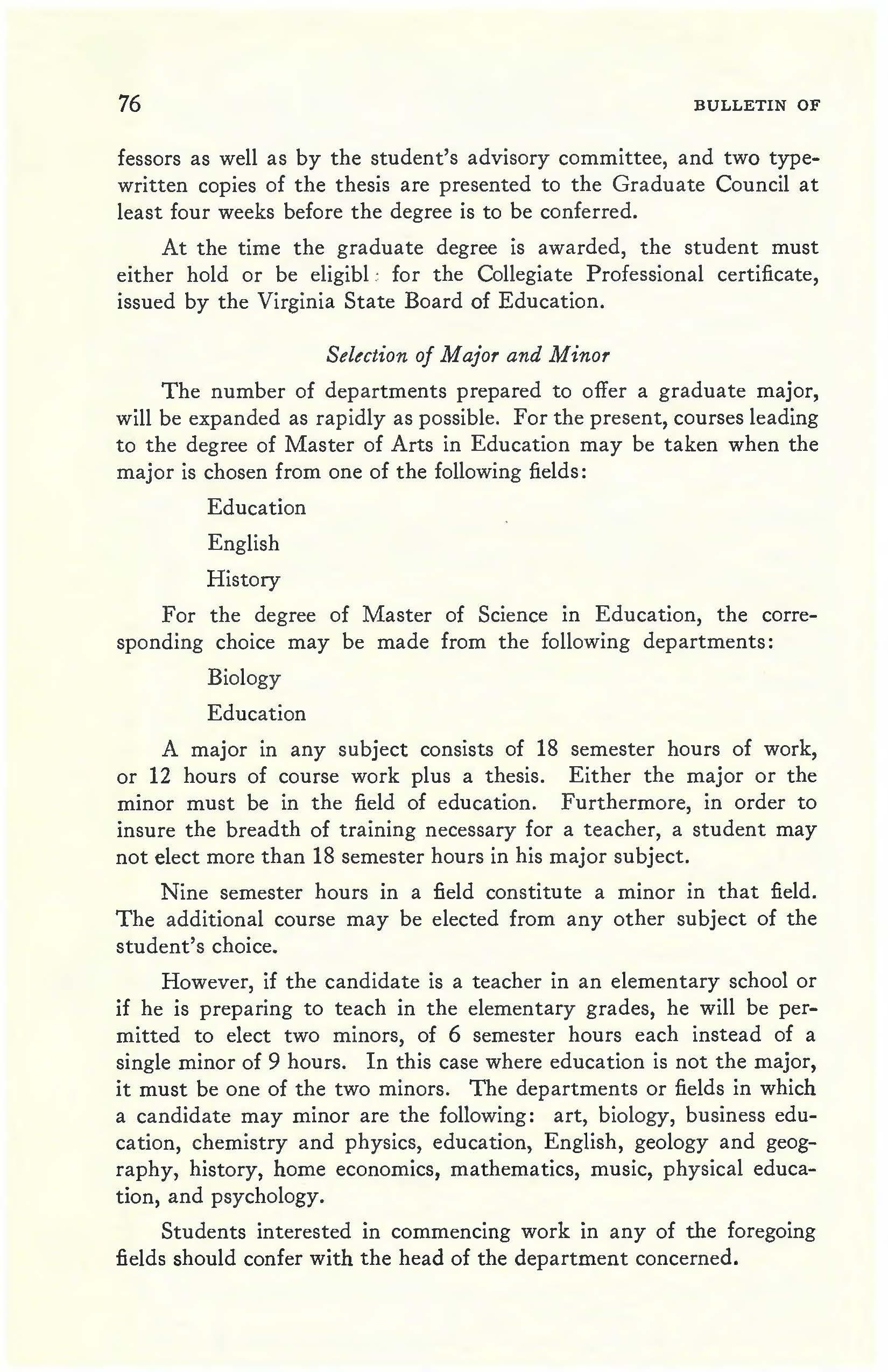
Nine semester hours in a field constitute a minor in that field. The additional course may be elected from any other subject of the student's choice.
However, if the candidate is a teacher in an elementary school or if he is preparing to teach in the elementary grades, he will be permitted to elect two minors, of 6 semester hours each instead of a single minor of 9 hours. In this case where education is not the major, it must be one of the two minors. The departments or fields in which a candidate may minor are the following: art, biology, business education, chemistry and physics, education, English, geology and geography, history, home economics, mathematics, music, physical education, and psychology.
Students interested in commencing work in any of the foregoing fields should confer with the head of the department concerned.
Students expecting to graduate in June who do not submit a thesis take an essay type written examination, not to exceed 3 hours' duration, covering the student's major field of study. This examination is designed to evaluate competency in written expression, ability to reason within an area, and the ability to apply information. This examination will be administered by the Graduate Council the first Saturday in May, 9:00 a.m.
A student electing to do a thesis (Plan A) is, in general, exempted from taking the comprehensive written examination. An oral examination, not to exceed one hour's duration, is required as a defense of the thesis. The Graduate Council may require a written comprehensive examination if it is recommended by the Head of the Department of the student's major field.
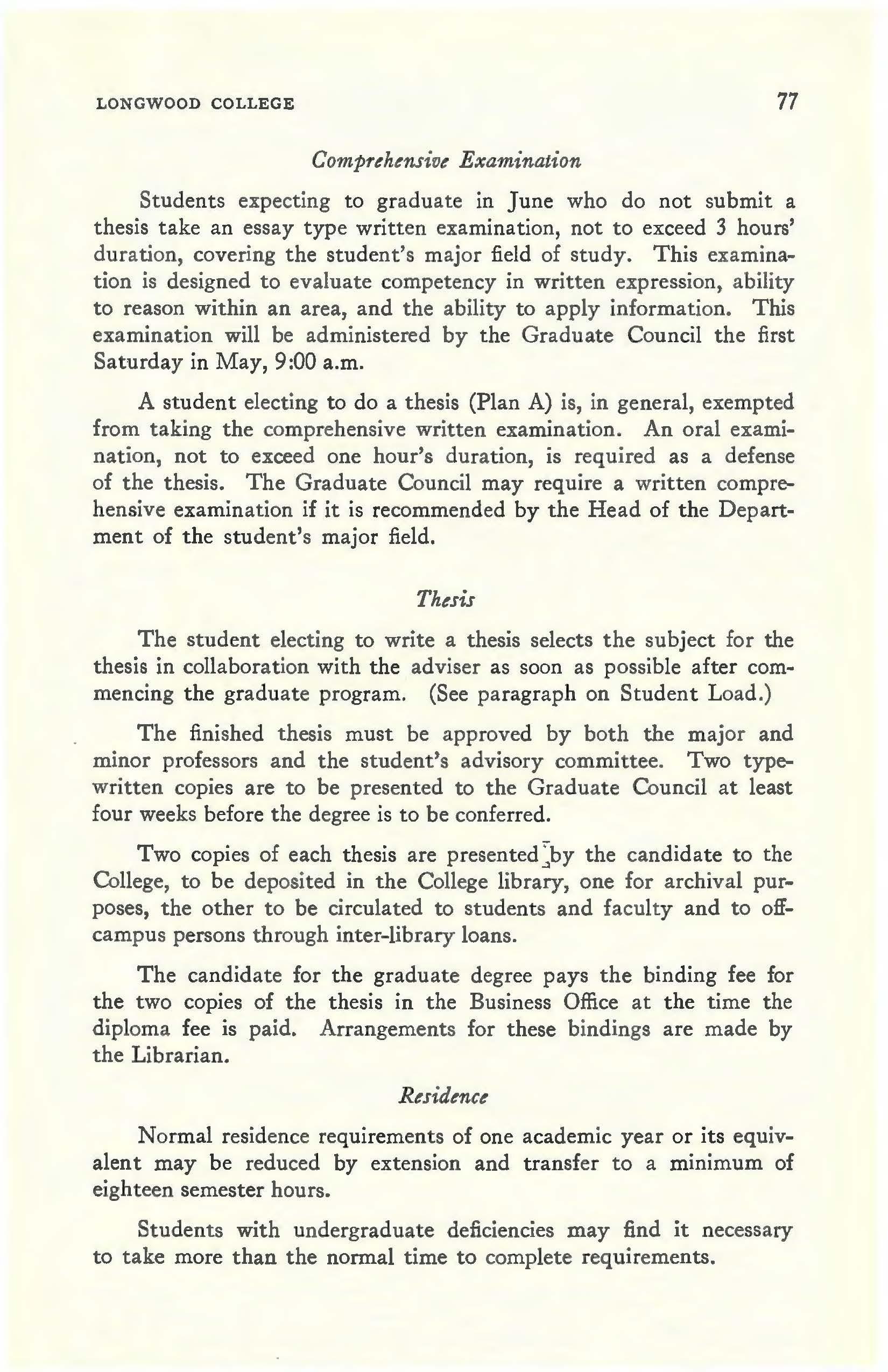
The student electing to write a thesis selects the subject for the thesis in collaboration with the adviser as soon as possible after commencing the graduate program. (See paragraph on Student Load.)
The finished thesis must be approved by both the major and minor professors and the student's advisory committee. Two typewritten copies are to be presented to the Graduate Council at least four weeks before the degree is to be conferred.
Two copies of each thesis are presented )y the candidate to the College, to be deposited in the College library, one for archival purposes, the other to be circulated to students and faculty and to offcampus persons through inter-library loans.
The candidate for the graduate degree pays the binding fee for the two copies of the thesis in the Business Office at the time the diploma fee is paid. Arrangements for these bindings are made by the Librarian.
Normal residence requirements of one academic year or its equivalent may be reduced by extension and transfer to a minimum of eighteen semester hours.
Students with undergraduate deficiencies may find it necessary to take more than the normal time to complete requirements.
Transfer of credit from another institution 1s permitted up to 6 credit hours.
Beginning with the fall semester of 1962, by arrangement with the University of Virginia Extension Division, Longwood College will offer graduate courses by extension. The number and location of these courses will be determined by demand. Six semester hours will be the maximum an individual student may offer in fulfillment of his degree requirement.
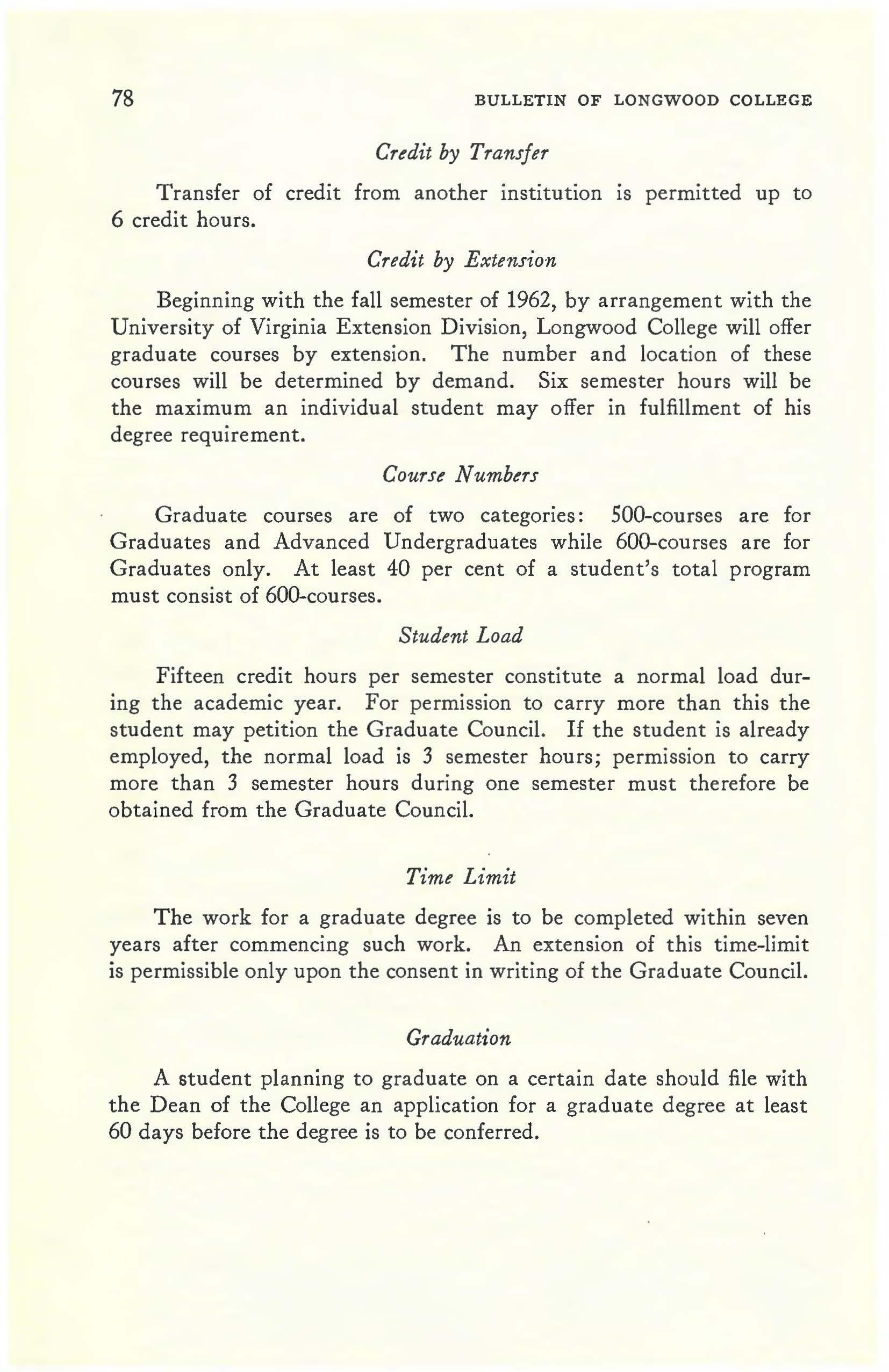
Graduate courses are of two categories: 500-courses are for Graduates and Advanced Undergraduates while 600-courses are for Graduates only. At least 40 per cent of a student's total program must consist of 600-courses.
Fifteen credit hours per semester constitute a normal load during the academic year. For permission to carry more than this the student may petition the Graduate Council. If the student is already employed, the normal load is 3 semester hours; permission to carry more than 3 semester hours during one semester must therefore be obtained from the Graduate Council.
The work for a graduate degree is to be completed within seven years after commencing such work. An extension of this time-limit is permissible only upon the consent in writing of the Graduate Council.
A student planning to graduate on a certain date should file with the Dean of the College an application for a graduate degree at least 60 days before the degree is to be conferred.
Instruction in the College is offered by the departments described in this section of the catalogue. Included in the description of each department are the requirements for a major therein and the courses which it offers.
Numerous courses in most departments have prerequisites. These will be noted in the descriptions of the courses. Generally, courses numbered between 100 and 199 are for freshmen. Those numbered between 200 and 299 are for sophomores; those between 300 and 399 are for juniors; and those 400 and above are for seniors. Undergraduate Honors Courses are numbered 500. Courses numbered from 501 to 599 are for graduate students and advanced undergraduates. Numbers from 601 to 699 are for graduate students only and 600 courses are graduate thesis courses. Courses with numbers divided by commas, such as 111, 112 are semester courses. This means that the College gives credit toward a degree for the satisfactory completion of one semester of the course even though the student may not enroll in it for the second. Courses in which the numbers are hyphenated, such as 111-112 are year courses. In these, the College grants credit toward a degree only upon the successful comp letion of both semesters of work.
The honors program was inaugurated by the College in 1930. Students in all departments of the College are eligible to participate in this program.
Honors courses are designed for capable students who wish to pursue under individual instruction an intensive study of a subject of their choice, thereby becoming acquainted with methods of research, organization of materials, and the presentation of results in a scholarly manner. Such intensive study is intended also to stimulate initiative, resourcefulness, and original thought ,
Under this plan, the student is directed in creative research by an instructor who has specialized in the field and who acts as her sponsor. Candidates for honors must be enrolled in honors courses for two semesters, not necessarily consecutively. They may withdraw from such courses only with the consent of the Honors Committee.
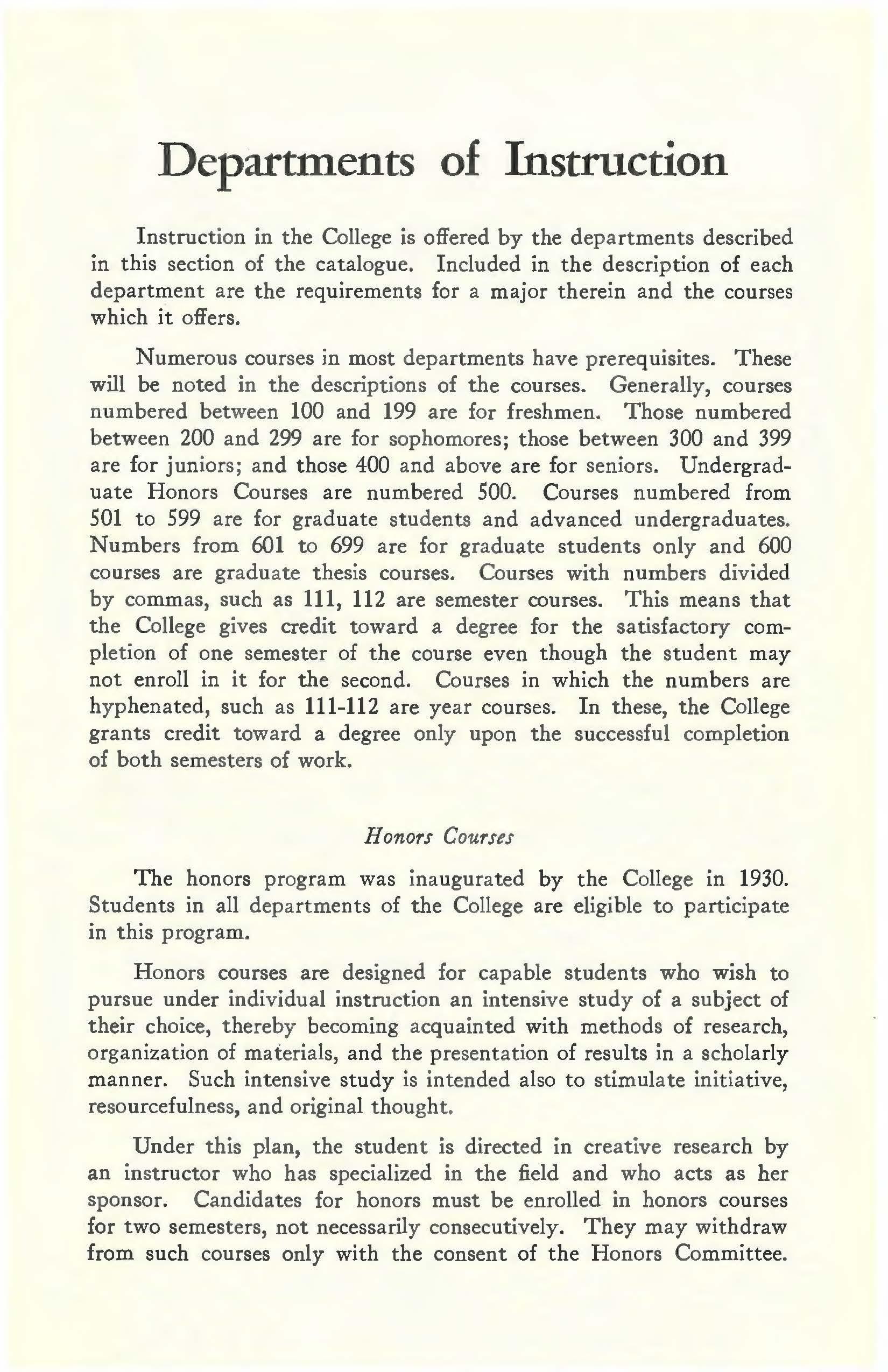
The subject and plan of the research are decided in conferences between the student and the faculty member sponsoring the program. Students interested in honors courses should submit a brief outline describing their projected research to the chairman of the department in which the work is to be done. The department chairman will present each student's application to the Honors Committee for approval.
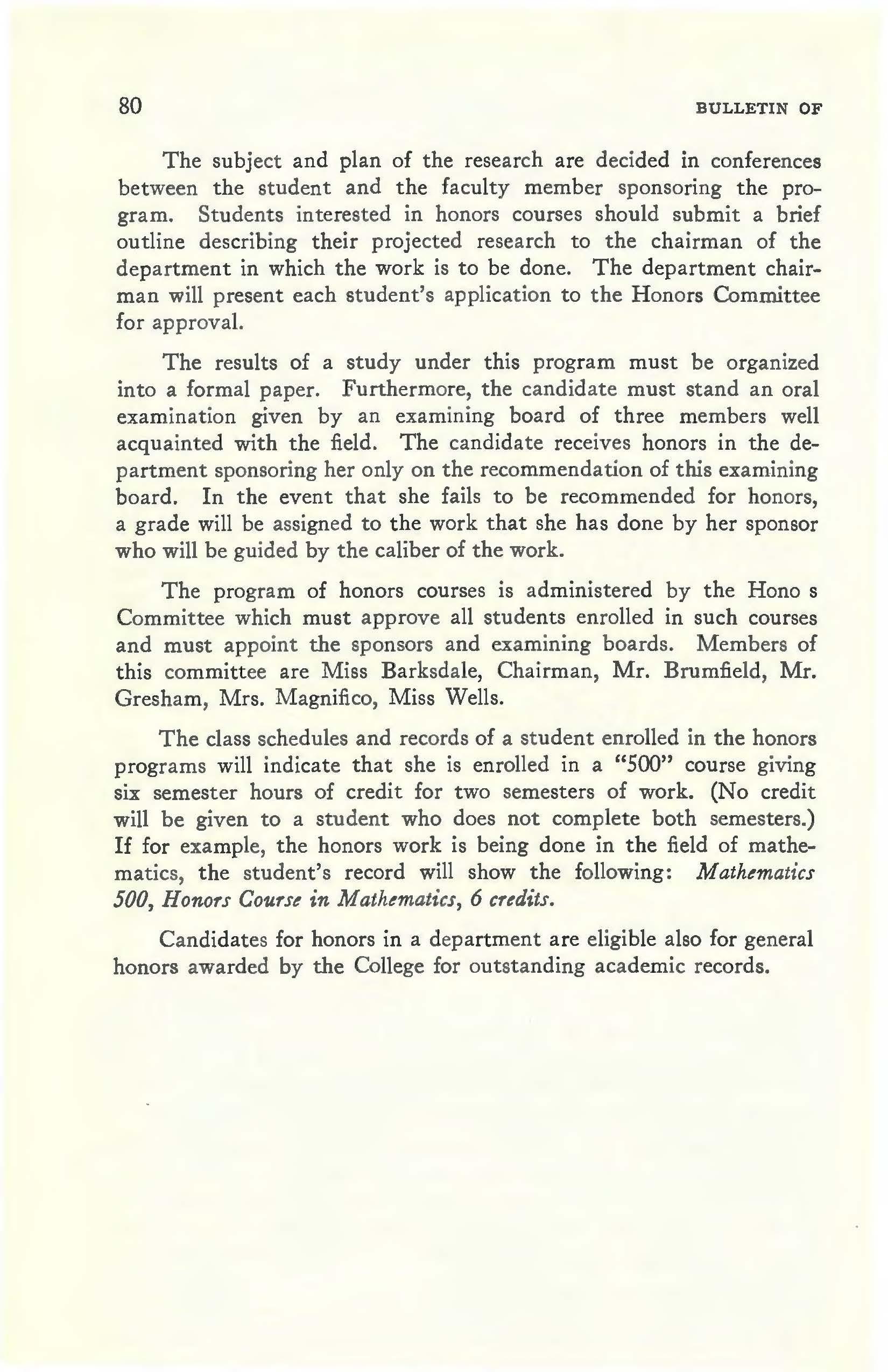
The results of a study under this program must be organized into a formal paper. Furthermore, the candidate must stand an oral examination given by an examining board of three members well acquainted with the field. The candidate receives honors in the department sponsoring her only on the recommendation of this examining board. In the event that she fails to be recommended for honors, a grade will be assigned to the work that she has done by her sponsor who will be guided by the caliber of the work.
The program of honors courses is administered by the Hono s Committee which must approve all students enrolled in such courses and must appoint the sponsors and examining boards. Members of this committee are Miss Barksdale, Chairman, Mr. Brumfield, Mr. Gresham, Mrs. Magnifico, Miss Wells.
The class schedules and records of a student enrolled in the honors programs will indicate that she is enrolled in a "500" course giving six semester hours of credit for two semesters of work. (No credit will be given to a student who does not complete both semesters.) If for example, the honors work is being done in the field of mathematics, the student's record will show the following: Mathematics 500, Honors Course in Mathematics, 6 credits.
Candidates for honors in a department are eligible also for general honors awarded by the College for outstanding academic records.
The Department of Art offers courses in visual and tactile arts, and art education for teachers in the elementary and secondary school.
Freshmen may choose exploratory electives from the following: Art 121, 122, 201, 221, 222.
A major in art in secondary education requires 30 semester hours as follows: Art 121, 122, 201, 221, 222, 301, 314, 421, 422, and one semester of painting. A major for the Bachelor of Arts Degree requires: Art 121, 122, 201, 221, 222, 314, 421, 422, and two elective courses in art.
Art 121,122. General Art Structure. Understanding the major and minor arts of past and present civilizations through laboratory experiments, criticisms, and discussions to develop appreciation and to give a basis for good judgment as consumers. Art 121: color, compositions, painting, and interior design. Art 122: architecture, city planning, sculpture, and graphics. First and second semesters; 5 periods a week; 3 credits each semester. Instructors: The Staff.
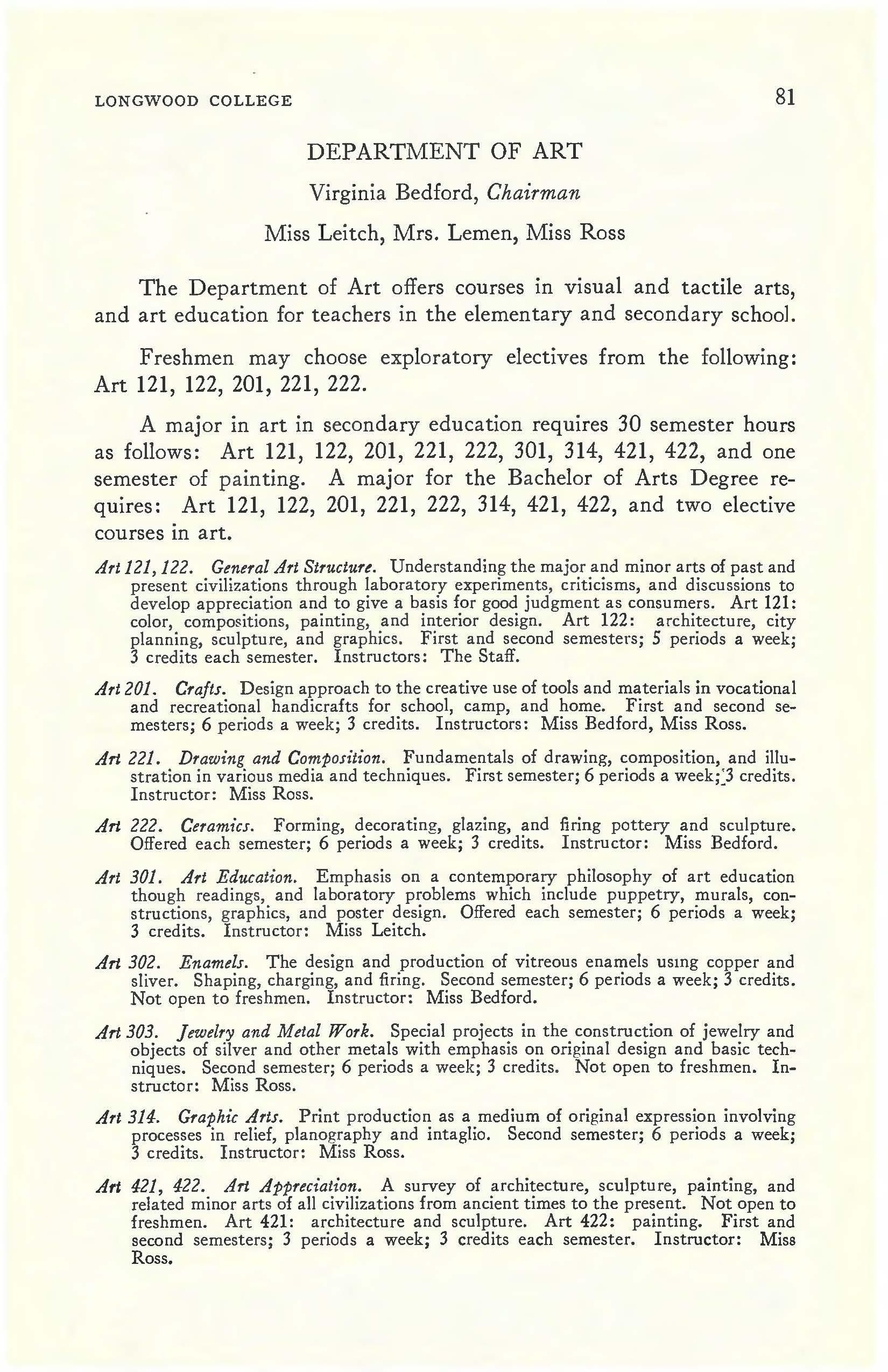
Art 201. Crafts. Design approach to the creative use of tools and materials in vocational and recreational handicrafts for school, camp, and home. First and second semesters; 6 periods a week; 3 credits. Instructors: Miss Bedford, Miss Ross.
Art 221. Drawing and Composition. Fundamentals of drawing, composition, and illustration in various media and techniques. First semester; 6 periods a week;'3 credits. Instructor: Miss Ross.
Art 222. Ceramics. Forming, decorating, glazing, and firing pottery and sculpture. Offered each semester; 6 periods a week; 3 credits. Instructor: Miss Bedford.
Art 301. Art Education. Emphasis on a contemporary philosophy of art education though readings, and laboratory problems which include puppetry, murals, constructions, graphics, and poster design. Offered each semester; 6 periods a week; 3 credits. Instructor: Miss Leitch.
Art 302. Enamels. The design and production of vitreous enamels usmg copper and sliver. Shaping, charging, and firing. Second semester; 6 periods a week; 3 credits. Not open to freshmen. Instructor: Miss Bedford.
Art 303. Jewelry and Metal Work. Special projects in the construction of jewelry and objects of silver and other metals with emphasis on original design and basic techniques. Second semester; 6 periods a week; 3 credits. Not open to freshmen. Instructor: Miss Ross.
Art 314. Graphic Arts. Print production as a medium of original expression involving processes in relief, planography and intaglio. Second semester; 6 periods a week; 3 credits. Instructor: Miss Ross.
Art 421, 422. Art Appreciation. A survey of architecture, sculpture, painting, and related minor arts of all civilizations from ancient times to the present. Not open to freshmen. Art 421: architecture and sculpture. Art 422: painting. First and second semesters; 3 periods a week; 3 credits each semester. Instructor: Miss Ross.
Art 431. Painting: Oil. Students will furnish all equipment and materials. Not open to freshmen. Each semester; 6 periods a week; 3 credits, Instructor: Mrs. Lemen.
Art 441. Painting: Water Color. Students will furnish all materials and equipment. Not open to freshmen. Each semester; 6 periods a week; 3 credits. Instructor: Mrs. Lemen.
Art 442. Painting and Composition. Open to students who have completed Art 431 or 441 or equivalent. (May be repeated as 443,444, etc., with permission of instructor). First and second semesters. Hours to be arranged. Students will furnish all materials and equipment. 6 periods a week; 3 credits. Instructor: Mrs. Lemen.
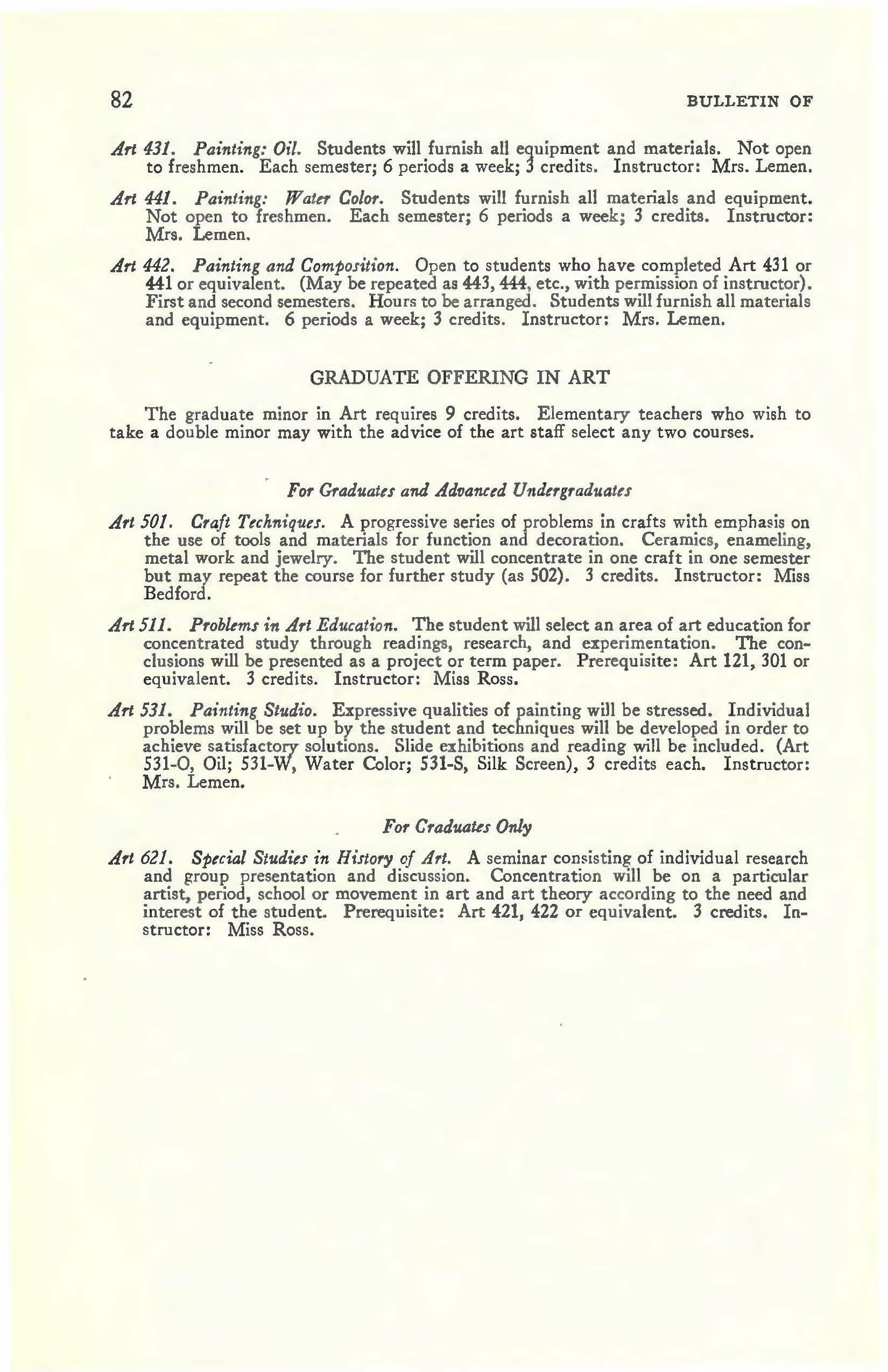
The graduate minor in Art requires 9 credits. Elementary teachers who wish to take a double minor may with the advice of the art staff select any two courses.
Art 501. Craft Ttchniques. A progressive series of problems in crafts with emphasis on the use of tools and materials for function and decoration. Ceramics, enameling, metal work and jewelry. The student will concentrate in one craft in one semester but may repeat the course for further study (as 502). 3 credits. Instructor: Miss Bedford.
Art 511. Problems in Art Education. The student will select an area of art education for concentrated study through readings, research, and experimentation. The conclusions will be presented as a project or term paper. Prerequisite: Art 121, 301 or equivalent. 3 credits. Instructor: Miss Ross.
Art 531. Painting Studio. Expressive qualities of painting will be stressed. Individual problems will be set up by the student and techniques will be developed in order to achieve satisfact~g solutions. Slide exhibitions and reading will be included. (Art 531-0, Oil; 531-W, Water Color; 531-S, Silk Screen), 3 credits each. Instructor: Mrs. Lemen.
Art 621. Sptcial Studiu in History of Art. A seminar consisting of individual research and group presentation and discussion. Concentration will be on a particular artist, period, school or movement in art and art theory according to the need and interest of the student. Prerequisite: Art 421, 422 or equivalent. 3 credits. Instructor: Miss Ross.
Mr. Leeper, Mr. Myers, Mr. Orange, Mr. Patrick, Mrs. Taliaferro
The Department of Business Education offers courses leading to the degree of bachelor of science in business education which qualifies students to teach business subjects in secondary schools and to hold office positions in the field of business.
Students who plan to major in secretarial science for the Bachelor of Arts degree or the Bachelor of Science degree must elect a minimum of 32 semester hours in business subjects. In order to facilitate scheduling, all courses in typewriting and shorthand should be completed by the end of the second year. Course work with the required number of semester hours of credit is as follows: Shorthand 6-12, Typewriting 4-8, Accounting 12, Office Machines 3, Business Law, Insurance and other social business subjects to total a minimum of 32 semester hours.
Students who have successfully completed courses in typewntmg and/or shorthand before entering Longwood College may, with the approval of the chairman of the department, be permitted to start work in business education with more advanced courses. This procedure permits such students to be placed in classes with others who have reached similar levels of achievement.
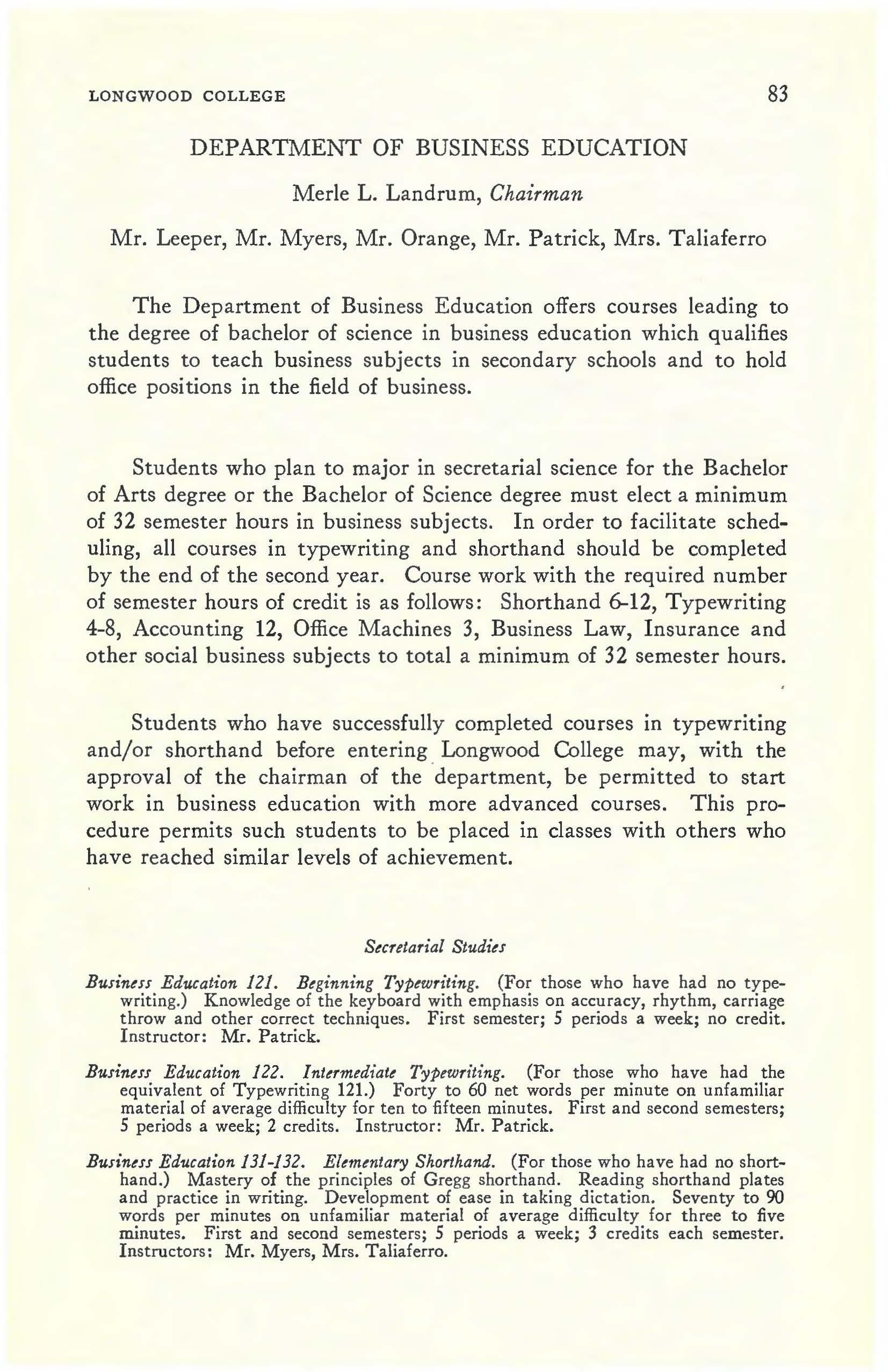
Business Education 121. Beginning Typewriting (For those who have had no typewriting ) Knowledge of the keyboard with emphasis on accuracy, rhythm, carriage throw and other correct techniques. First semester; 5 periods a week; no credit. Instructor: Mr. Patrick.
Business Education 122. Intermediate Typewriting. (For those who have had the equivalent of Typewriting 121.) Forty to 60 net words per minute on unfamiliar material of average difficulty for ten to fifteen minutes. First and second semesters; 5 periods a week; 2 credits. Instructor: Mr. Patrick.
Business Education 131-132. Elementary Shorthand. (For those who have had no shorthand.) Mastery of the principles of Gre gg shorthand. Reading shorthand plates and practice in writing. Development of ease in taking dictation Seventy to 90 words per minutes on unfamiliar material of average difficulty for three to five minutes. First and second semesters; 5 periods a week; 3 credits each semester Instructors: Mr. Myers, Mrs. Taliaferro.
Business EducaJion 133-134. Intermediate Shorthand. (For those who have had the equivalent of one year of shorthand.) Eighty to 100 words per minute on unfamiliar material of average difficulty for four to six minutes. First and second semesters; S periods a week; 3 credits each semester, Instructor: Mrs. Taliaferro.
Business Education 221-222. Adr,anced Typewriting and Transcription. (For those who have had the equivalent of two yea!'ll oI typewriting and shorthand in high school or one year of typewriting and shorthand in college.) Ability to transcribe an acceptable number of business letters within an hour. First and second semesters; S periods a week; 2 credits each semester. Instructors: Mr. Leeper, Mr. Patrick, Mrs. Taliaferro.
Business Education 231-232. Adr,anced Shorthand. (For those who have had the equivalent of two years of shorthand in high school or one year of shorthand in college.) Ninety to 120 words per minute on unfamiliar material of average difficulty with the ability to transcribe an acceptable number of letters within an hour. First and second semesters; 3 periods a week; 3 credits each semester. Instructors: Mr. Leeper, Mr. Patrick, Mrs. Taliaferro.
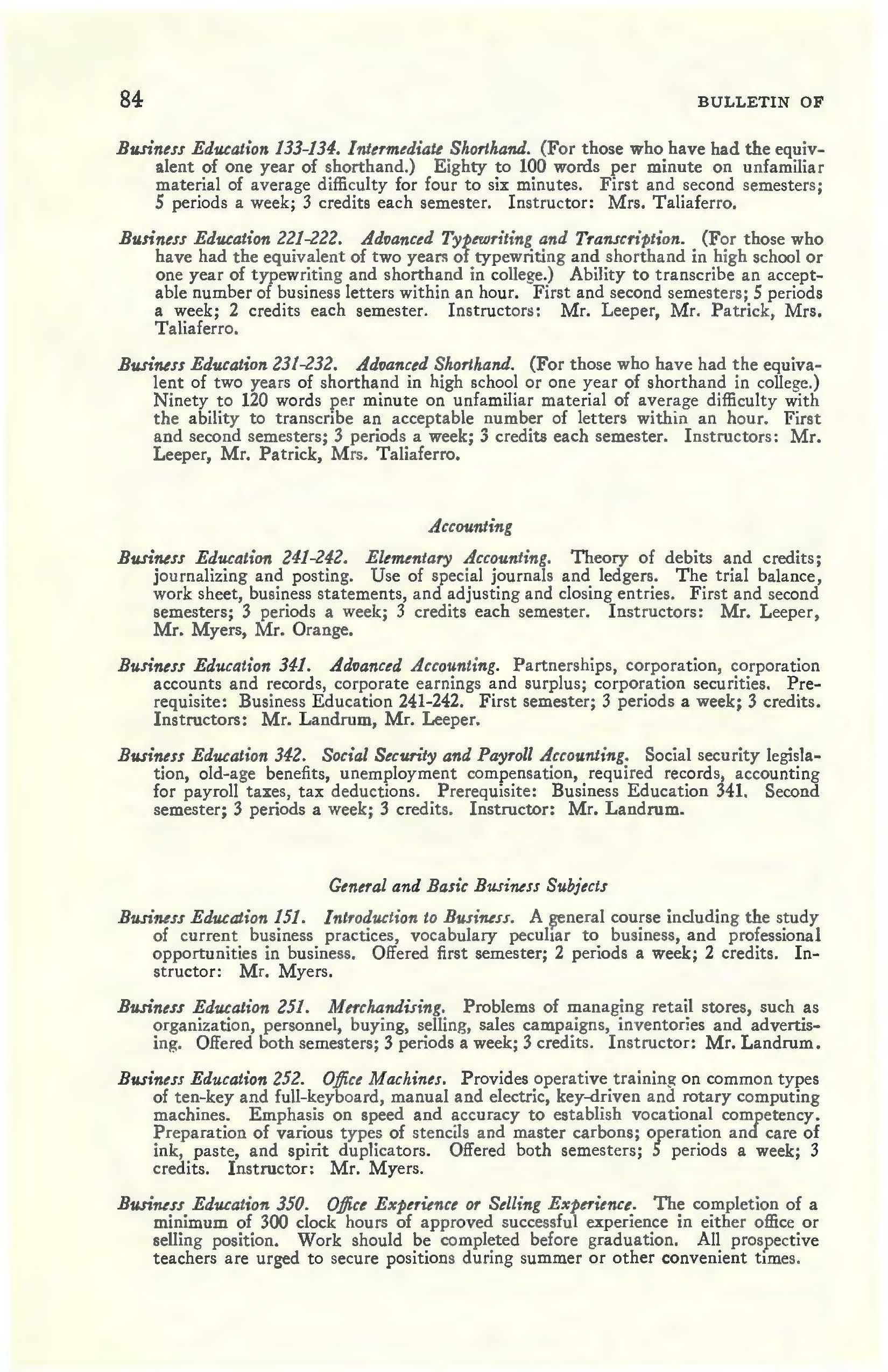
Business Education 241-242. Elementary Accounting. Theory of debits and credits; journalizing and posting. Use of special journals and ledgers. The trial balance, work sheet, business statements, and adjusting and closing entries. First and second semesters; 3 periods a week; 3 credits each semester. Instructors: Mr. Leeper, Mr. Myers, Mr. Orange.
Business Education 341. Adr,anced Accounting. Partnerships, corporation, corporation accounts and records, corporate earnings and surplus; corporation securities. Prerequisite: Business Education 241-242. First semester; 3 periods a week; 3 credits. Instructors: Mr. Landrum, Mr. Leeper.
Business Education 342. Social Security and Payroll Accounting. Social security legislation, old-age benefits, unemployment compensation, required records, accounting for payroll taxes, tax deductions. Prerequisite: Business Education 341. Second semester; 3 periods a week; 3 credits. Instructor: Mr. Landrum.
Business Education 151. Introduction to Business. A ~neral course including the study of current business practices, vocabulary peculiar to business, and professional opportunities in business. Offered first semester; 2 periods a week; 2 credits. Instructor: Mr. Myers.
Business EducaJion 251. Merchandising. Problems of managing retail stores, such as organization, personnel, buying, selling, sales campaigns, inventories and advertising. Offered both semesters; 3 periods a week; 3 credits. Instructor: Mr. Landrum.
Business Education 252. Office Machines. Provides operative training on common types of ten-key and full-keyboard, manual and electric, key-driven and rotary computing machines. Emphasis on speed and accuracy to establish vocational competency. Preparation of various types of stencils and master carbons; operation and care of ink, paste, and spirit duplicators. Offered both semesters; 5 periods a week; 3 credits. Instructor: Mr. Myers.
Business Education 350. Office Experience or Selling Experience. The completion of a minimum of 300 clock hours of approved successful experience in either office or selling position. Work should be completed before graduation. All prospective teachers are urged to secure positions during summer or other convenient times.
Bwineu Education 351. Insurance Life insurance , property insurance, health and accident in surance, social insurance and liability insurance. Emphasis on the economic importance of insurance in community and individual living. First semester; 3 periods a week; 3 credits. Instructor: Mr. Leeper
Business Education 352. Business Law. Technical principles involved in contracts, ne gotiable instruments, and agency. Law of contracts as applied to partnerships, corporations, bailments, carriers, and sales of real and personal property. Practical drafting of legal documents. Second semester; 3 periods a week; 3 credits. Instructor: Mrs. Taliaferro.
Business Education 353. General Business Principles. A general business education course designed to give a broader understanding of the practices of present-day business societ y . (Offered only in the summer session.) 3 credits. Instructors: Mr. Landrum, Mr. Leeper.
Business Education 451. The Teaching of Business Subjects. Organization of subject matter for teachers who plan to guide the learning activities of high school and junior college students in the vocational busines s subjects. Offered both semesters; 3 periods a week; 3 credits. Instructo r : Mr. Landrum.
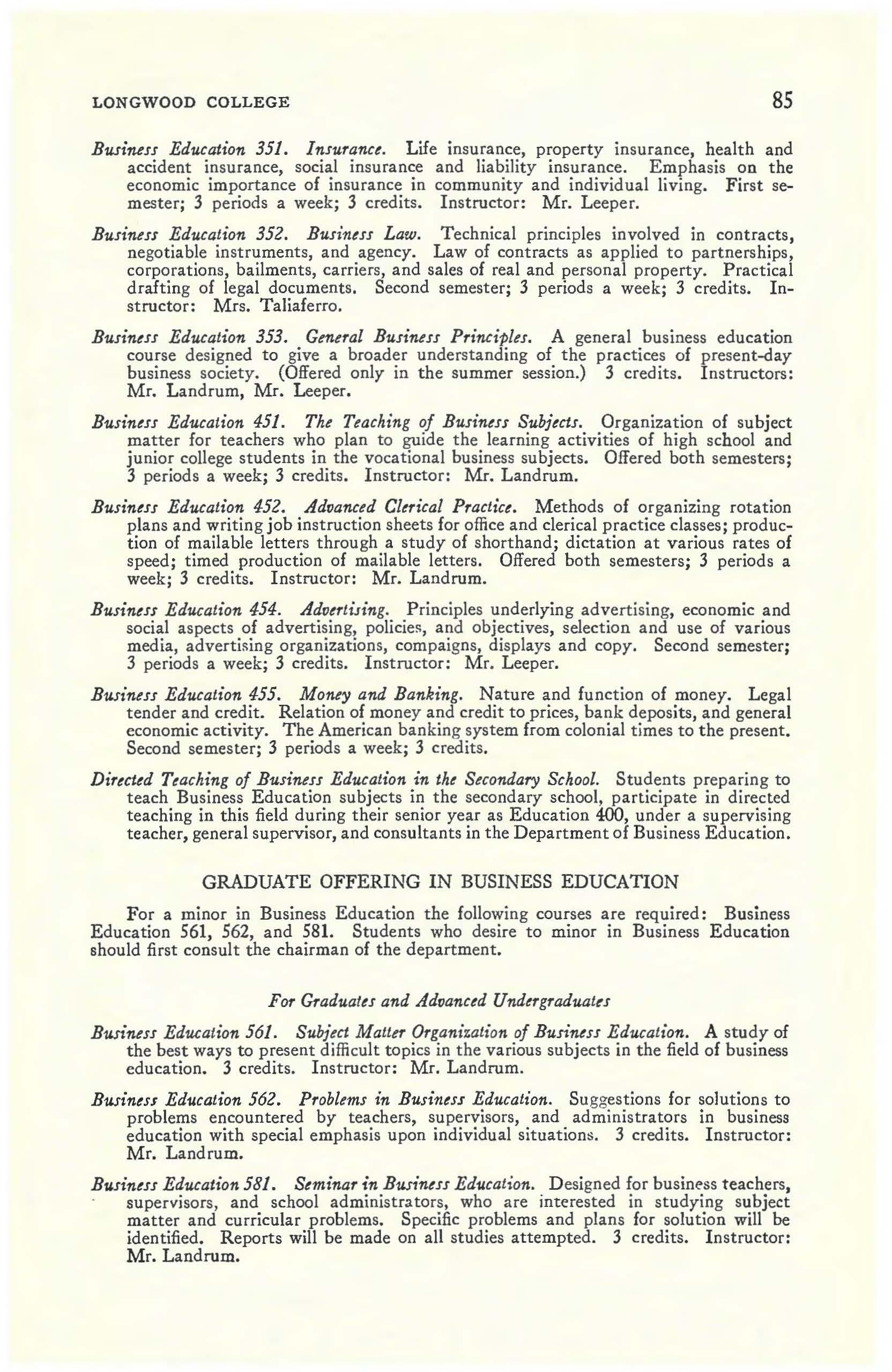
Business Education 452. Adoanced Clerical Practice. Methods of organizing rotation plans and writing job instruction sheets for office and clerical practice classes; production of mailable letters through a study of shorthand; dictation at various rates of speed; timed production of mailable letters. Offered both semesters; 3 periods a week; 3 credits. Instructor: Mr. Landrum.
Business Education 454. Adoertising Principles underlying advertisin g, economic and social aspects of advertising, policies, and objectives, selection and use of various media, adverti s ing organizations, campai gns, di s plays and copy. Second semester; 3 periods a wee k ; 3 credits. Instructor: Mr Leeper.
Bwiness Education 455. Money and Bank i ng. Nature and function of money. Legal tender and credit. Relation of money and credit to prices, bank deposits, and general economic activity. The American bankin g system from colonial times to the present. Second semester; 3 periods a week; 3 credits.
Directed Teaching of Business Education in the Secondary School. Students preparing to teach Business Education subjects in the secondary school, participate in directed teaching in this field during their senior year as Education 400, under a supervising teacher, general supervisor, and consultants in the Department of Business Education.
For a minor in Business Education the following courses are required: Business Education 561, 562, and 581. Students who desire to minor in Business Education should first consult the chairman of the department.
Business Education 561. Subject Matter Organization of Business Education. A study of the best ways to present difficult topics in the various subjects in the field of business education. 3 credits. Instructor: Mr. Landrum.
Business Education 562. Problems in Business Education. Su ggestions for solutions to problems encountered by teachers, supervisors, and administrators in business education with special emphasis upon individual situation s 3 credits. Instructor: Mr. Landrum.
Business Education 581. Seminar in Business Education. Designed for business teachers, supervisors, and school administrators, who are interested in studying subject matter and curricular problems. Specific problems and plans for solution will be identified. Reports will be made on all studies attempted. 3 credits. Instructor: Mr. Landrum.
Mr. Johnson, Mr. Patterson, Mrs. Savage, Mr. Swertfeger, Miss Trent, Mr. Wesley, Miss Wilson
The Department of Education, Psychology, and P hilosophy contributes to general education, professional education and specialized education in the program of the College. In some courses the primary emphasis is on general education; in others it is on professional education, and in still others it is on specialized education.
For a major in psychology and philosophy 24 semester hours are required, including Philosophy 361, 362 and Psychology 231, 232.
EducaJ.ion 325. Language Arts and Reading in the Elementary School. (Same as English 325.) Required for the B.S. degree in Elementary Education. Prerequisites: English 111, 112, 215 and 216. Offered each semester; 3 periods a week; 3 credits. Instructor: Miss Trent.
Education 347. Audio-Yisual Education. The improvement of instruction through the use of Audio Visual equipment, techniques and materials. Offered each semester; 3 periods a week; 3 credits. Instructors: Mr. Johnson, Mr. Patterson.
Education 352. Principles of Elementary and Secondary_ Education. Principles of elementary and secondary school practices. Section E required for the B.S. in Elementary Education, Section S required in all curricula leading to the Collegiate Professional certificate. Offered each semester; 3 periods a week; 3 credits. Instructors: Mr. Johnson , Mr. Patterson, Miss Trent, Mr. Wesley.
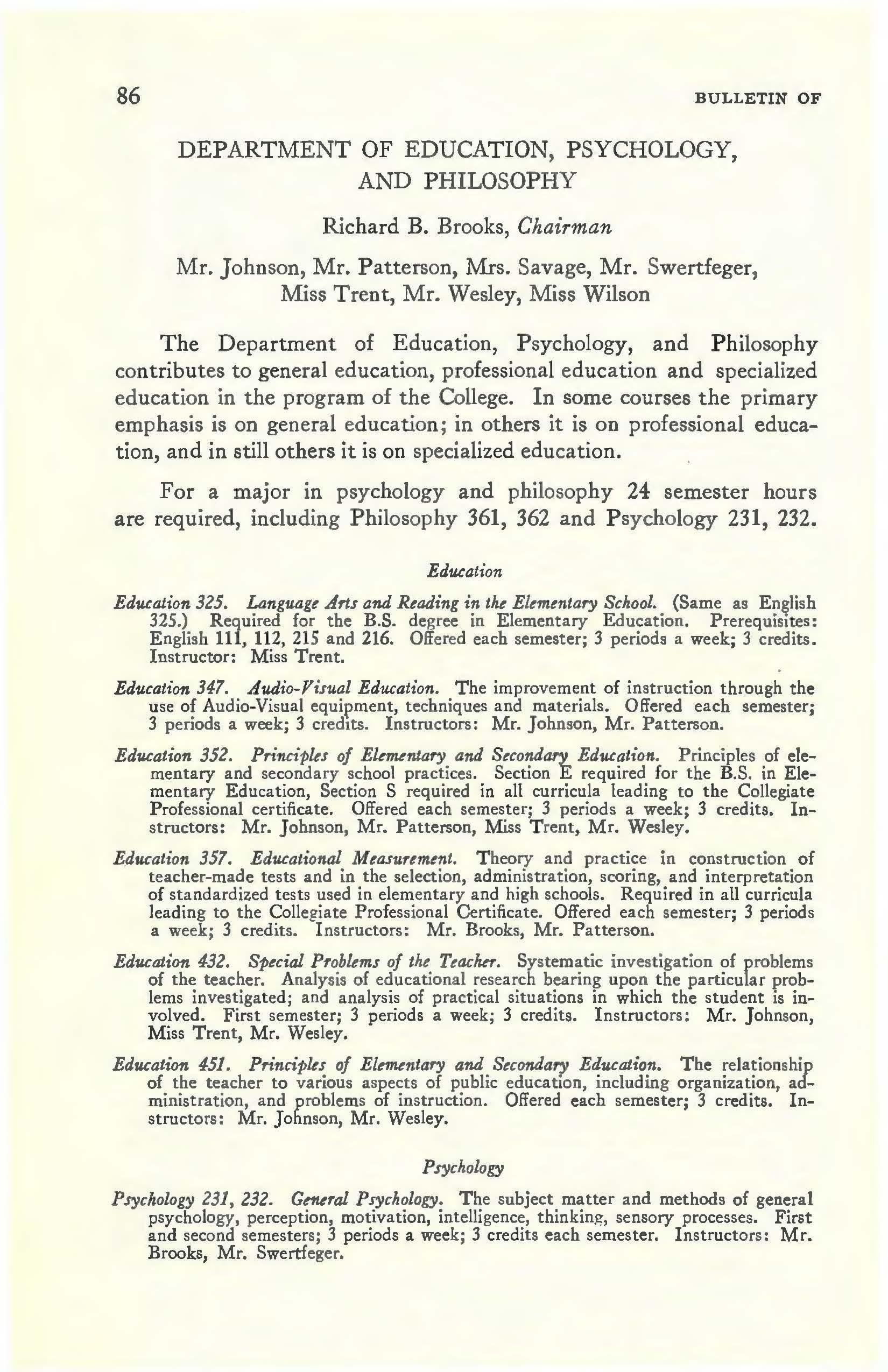
Education 357. Educational Measurement. Theory and practice in construction of teacher-made tests and in the selection, administration, scoring, and interpretation of standardized tests used in elementary and high schools. Required in all curricula leading to the Colle giate Professional Certificate. Offered each semester; 3 periods a week; 3 credits. Instructors: Mr. Brooks, Mr. Patterson.
Education 432. Special Problems of the Teacher. Systematic investigation of problems of the teacher. An alysis of educational research bearing upon the particular problems investigated; and analysis of practical situations in which the student is involved. First semester; 3 periods a week; 3 credits. Instructors: Mr. Johnson, Miss Trent, Mr. Wesley.
Education 451. Principles of Elementary and Secondary Education. The relationship of the teacher to various aspects of public education, including organization, administrat ion, and problems of instruction. Offered each semester; 3 credits. Instructors: Mr. Johnson, Mr. Wesley.
Psychology 231, 232. General Psychology. The subject matter and methods of general psychology, perception, motivation, intelligence, thinking, sensory processes. First and second semesters; 3 periods a week; 3 credits each semester. Instructors: Mr. Brooks, Mr. Swertfeger.
Psychology 251. Educational Psychology. The application of general psychology to education. Emphasis is placed on the study of the learning process. Required in all curricula leading to the Collegiate Professional certificate. First semester; 3 periods a week; 3 credits. Instructors: Mr. Brooks, Mr. Patterson, Mr. Swertfeger.
Psychology 256. Developmental Psychology. Development of physical traits, learning and intelligence, social and emotional behavior, personality and adjustment from conception to senescence. Emphasis upon childhood and adolescence. Second semester; 3 periods a week; 3 credits. Instructors: Mr. Brooks, Mr. Patterson, Mr. Swertfeger.
Psychology 353. The Psychology of Adjustment. A dynamic and experimental approach to the study of personality. Second semester; 3 periods a week; 3 credits. Instructors: Mr. Brooks, Mr. Patterson, Mr. Swertfeger.
Psychology 355. Individual Differences. Nature and significance of individual differences. First semester; 3 periods a week; 3 credits. Instructors: Mr. Brooks, Mr. Swertfeger.
Psychology 457. History and Systems of Psychology. The development of psychology from ancient to modern times. Consideration of important men and significant ideas contributing to current systematic psychology. 3 periods a week; 3 credits. Instructors: Mr. Brooks, Mr. Swertfeger.
Religion 302. Religions of the World. A study of the frincipal religions of the world including readings in the history and literature o the peoples whose religions are discussed. Second semester; 2 periods a week; 2 credits. Instructor: Miss \\7ilson.
Psychology 351. Logic. The fundamentals of deduction and induction to aid the student in developing habits of valid thinking and in understanding the scientific method. Second semester; 3 periods a week; 3 credits. Instructor: Mrs. Savage.
Philosophy 360. Philosophy of Life. Critical examination of the foundations and development of historical and current systems of thought. Required for the Bachelor of Arts degree. Offered each semester; 3 periods a week; 3 credits. Instructor: Mrs. Savage.
Philosophy 361. History of Western Philosophy: Ancient and Medieval. A survey of the development of the European thought from its early Greek origins to the seventeenth century. First semester; 3 periods a week; 3 credits. Instructor: Mrs. Savage.
Philosophy 362. History of Western Philosophy: Modern and Contemporary. A survey of the history of European and American philosophy from the seventeenth century to the present. Second semester; 3 periods a week; 3 credits. Instructor: Mrs. Savage.
Philosophy 381. Aesthetics. A study of some problems in aesthetics, including the relation between beauty and the arts, the function and value of the arts in culture, and a consideration of standards for criticism and judgments of beauty. Offered each semester; 3 periods a week; 3 credits. Instructor: Mrs. Savage.
Philosophy 460. Philosophy of Education. Critical analysis of foundations, implications and applications of the different philosophies of education exemplified in current practice. Required in all curricula leading to the Collegiate Professional certificate. Offered each semester; 3 periods a week; 3 credits. Instructors: Mrs. Savage, Mr. Swertfeger.
Education 300. Directed Teaching in the Elementary School. Offered in two eight-week blocks during the fall semester and the first eight-week block of the spring semester; 6 credits. Required in the elementary education curriculum. (See prerequiEites for student teaching on page 57.) Instructors: Mr. Brooks, Mr. Johnson, Mr. Patterson, Miss Trent.
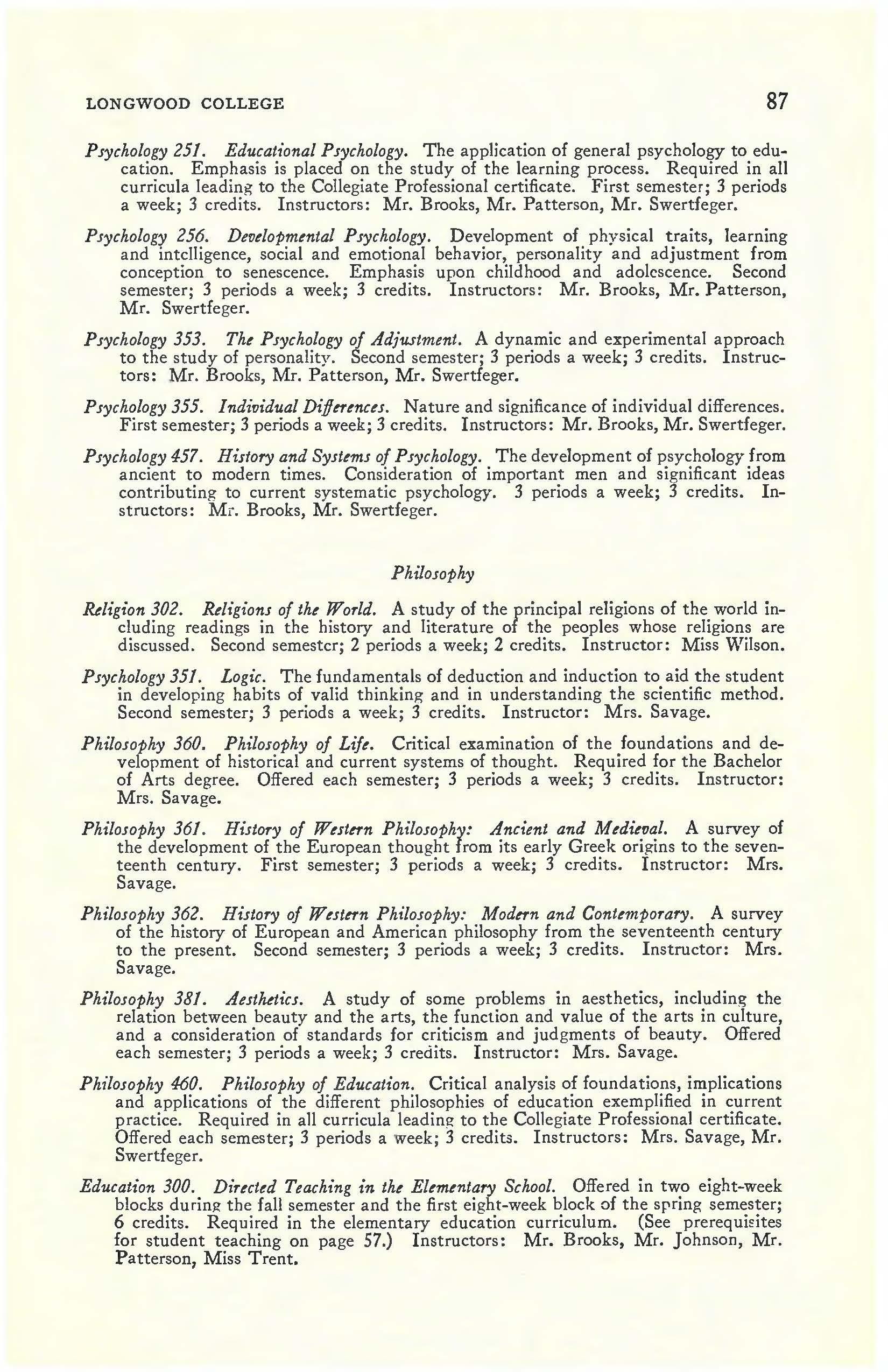
Education 400. Directed Teaching in the Secondary School. Offered in two eight-week blocks during the fall semester and the first eight-week block of the spring semester; 6 credits. Required in secondary education curricula. (See prerequisites for student teaching on page 57.) Instructors: Mr. Brooks, Mr. Johnson, Mr. Patterson, Mr. Wesley.
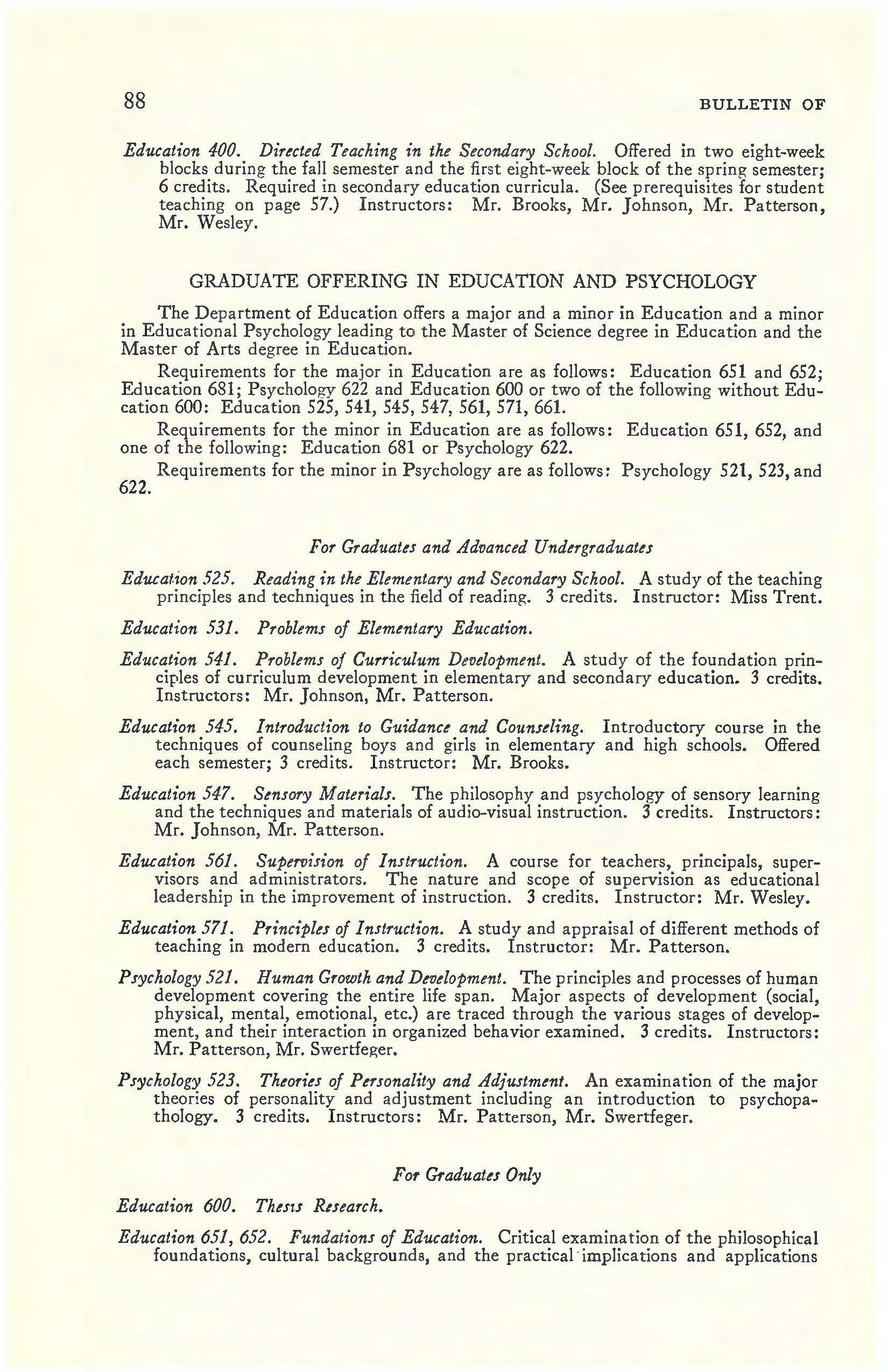
The Department of Education offers a major and a minor in Education and a minor in Educational Psychology leading to the Master of Science degree in Education and the Master of Arts degree in Education.
Requirements for the major in Education are as follows: Education 651 and 652; Education 681; Psychology 622 and Education 600 or two of the following without Education 600: Education 525, 541, 545, 547, 561, 571, 661.
Requirements for the minor in Education are as follows: Education 651, 652, and one of the following: Education 681 or Psychology 622.
Requirements for the minor in Psychology are as follows; Psychology 521, 523, and 622.
Education 525. Reading in the Elementary and Secondary School. A study of the teaching principles and techniques in the field of reading. 3 credits. Instructor: Miss Trent.
Education 531. Problems of Elementary Education.
Education 541. Problems of Curriculum Development. A study of the foundation principles of curriculum development in elementary and secondary education. 3 credits. Instructors: Mr. Johnson, Mr. Patterson.
Education 545. Introduction to Guidance and Counseling. Introductory course in the techniques of counseling boys and girls in elementary and high schools. Offered each semester; 3 credits. Instructor: Mr. Brooks.
Education 547. Sensory Materials. The philosophy and psychology of sensory learning and the techniques and materials of audio-visual instruction. 3 credits. Instructors: Mr. Johnson, Mr. Patterson.
Education 561. Superoision of Instruction. A course for teachers, principals, supervisors and administrators. The nature and scope of supervision as educational leadership in the improvement of instruction. 3 credits. Instructor: Mr. Wesley.
Education 571. Principles of Instruction. A study and appraisal of different methods of teaching in modern education. 3 credits. Instructor: Mr. Patterson.
Psychology 521. Human Growth and Development. The principles and processes of human development covering the entire life span. Major aspects of development (social, physical, mental, emotional, etc.) are traced through the various stages of development, and their interaction in organized behavior examined. 3 credits. Instructors: Mr. Patterson, Mr. Swertfeger.
Psychology 523. Theories of Personality and Adjustment. An examination of the major theories of personality and adjustment including an introduction to psychopathology. 3 credits. Instructors: Mr. Patterson, Mr. Swertfeger.
Education 600. Thms Research.
Education 651, 652. Fundations of Education. Critical examination of the philosophical foundations, cultural backgrounds, and the practical ·implications and applications
of historical theories of education currently influencing school practices. (Fundamental courses for all students with a major or minor in education.) 3 credits each. Instructors: Mrs. Savage, Mr. Swertfeger.
Education 661. Research in Education. An examination of methodology in educational research involving the historical, sample-survey, case and clinical studies, developmental, and experimental methods. Special emphasis is given to the development and testing of hypotheses and interpretation of research findings. Instructor: Mr. Patter.;on.
Education 681. E11aluation of Education. Techniques and resources of educational evaluation of instructional efficiency helpful to teachers, supervisors and administrators. 3 credits. Instructor: Mr. Brooks.
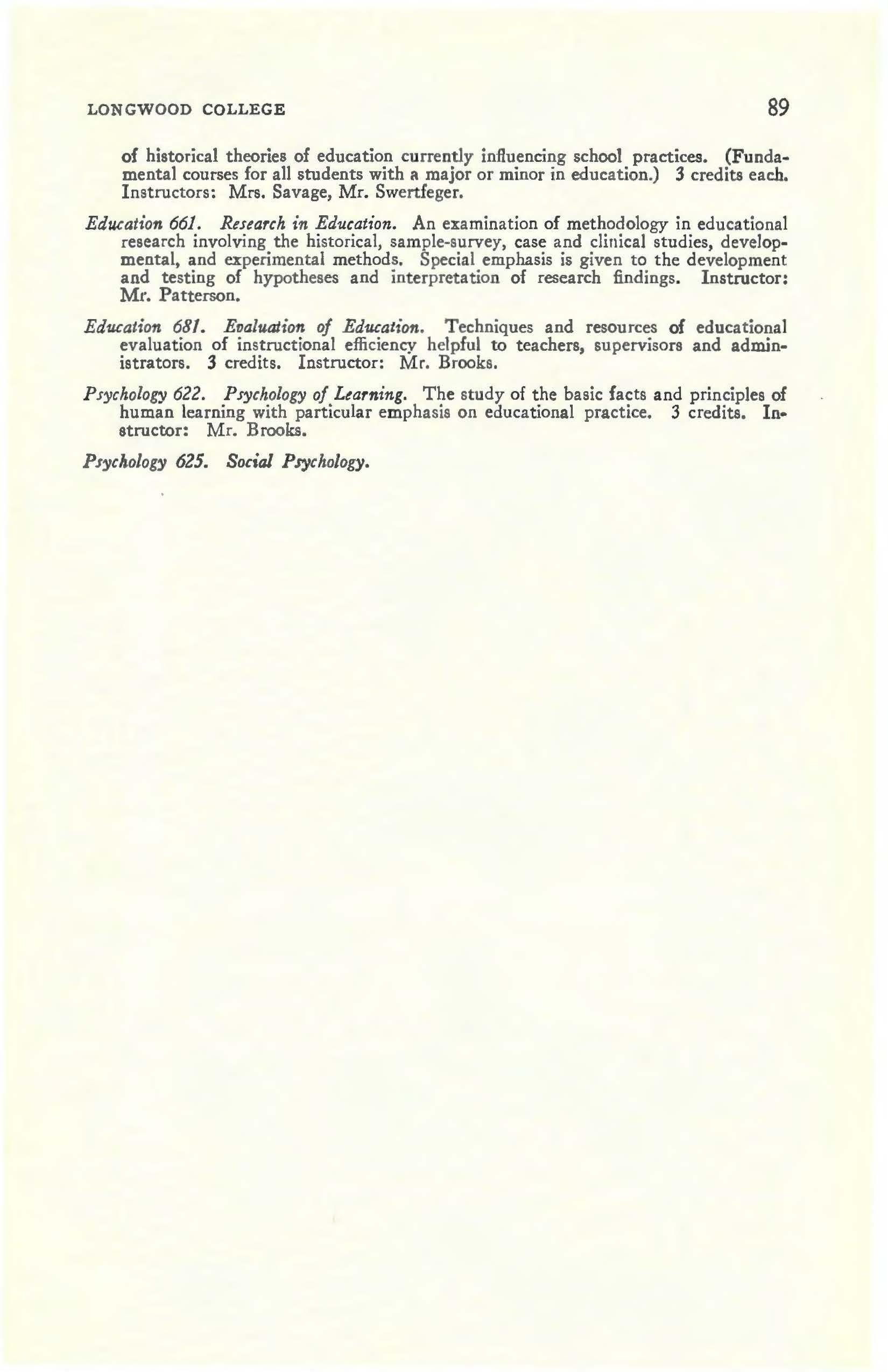
Psychology 622. Psychology of Learning. The study of the basic facts and principles of human learning with particular emphasis on educational practice. 3 credits. In• structor: Mr. Brooks.
Psycliology 625. Social Psychology.
Miss Barnett, Mrs. Davis , Mr. Gibb, Mr. Gresham, Mr. Meeker, Mrs. Moore, Miss Nichols, Mrs. Schlegel, Mr. White, Mr. Wiles, *Mr. Wiley
The Department of English offers courses in writing, literature, linguistics, speech, dramatic art, and in the tea ching of English. The Department seeks to coordinate its work with that of other departments and with the counseling program of the College. It seeks the cooperation of all instructors in securing and maintaining the use of creditable English in all classes. Improvement in the command and effective use of the language is further motivated by the extracurricular activities sponsored by the Department.
In general, the Department attempts to provide its majors with a philosophy of language, a philosophy of literature, and some skill in the communication and interpretive arts. The following courses totaling 30 semester hours are required for an English major in curricula for the A.B. degree, the A.B. degree in Secondary Education, and the B.S. degree in Secondary Education: (1) English 111-112; (2) English 211-212; (3) English 321, 322; (4) English 421 or 422; (5) English 505; and (6) six hours of approved elective courses from Departmental offerings. Students taking English as their major in secondary education curricula should also take English 400. Studies in the related fields of history and the social sciences, foreign languages, music, art, and philosophy are recommended as general education electives.
Twenty-four semester hours of course work in English are required for certification to teach English in the secondary schools of Virginia, and the normal pattern of courses is indicated in the first five categories listed above. For certification to teach speech, dramatic art, or journalism as well as English, 6 additional hours in each field are required. The Department also assists in sponsoring a Cooperative Program in Speech Correction and Audiology with the University of Virginia, described elsewhere in this catalogue.
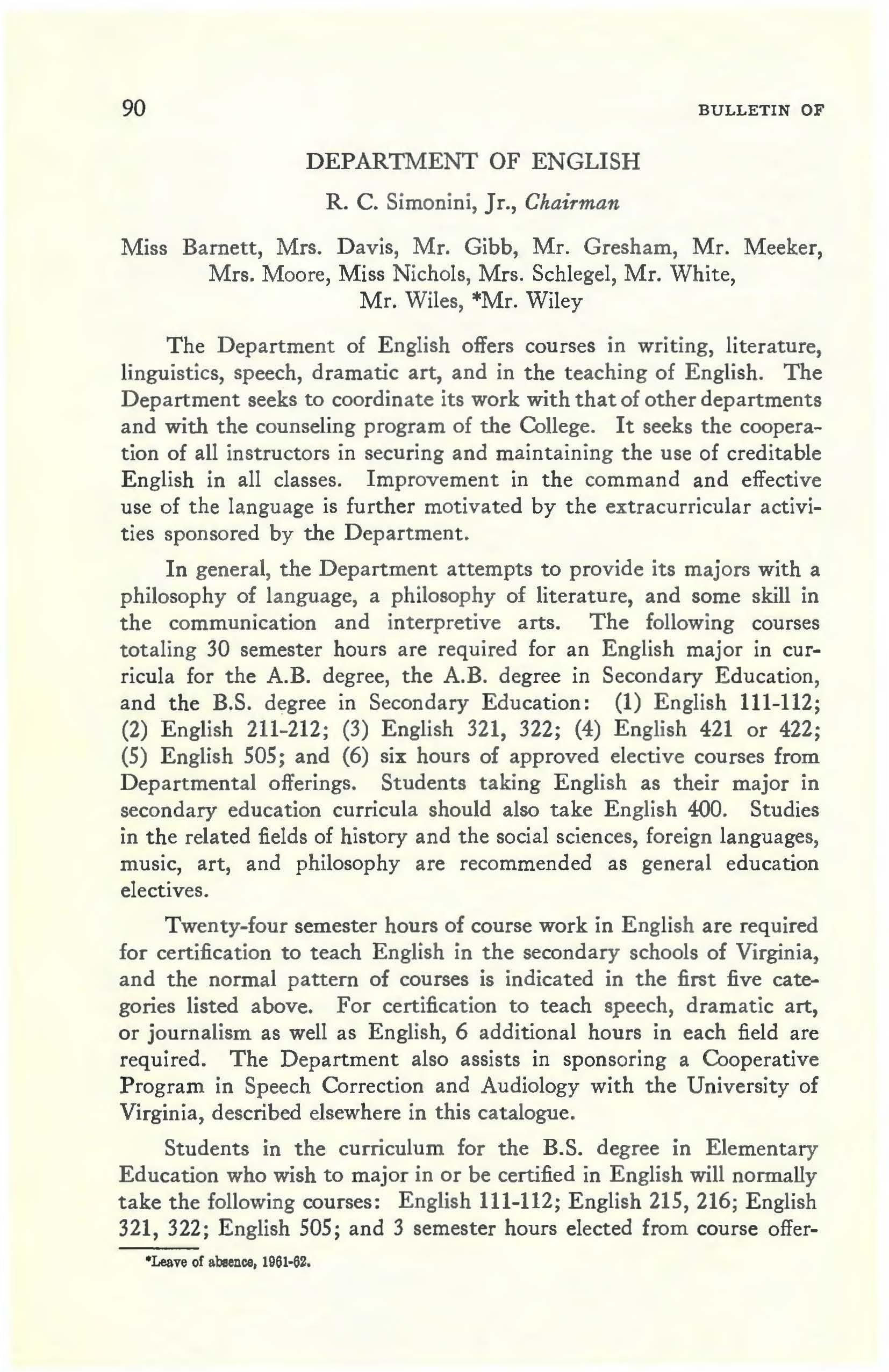
Students in the curriculum for the B.S. degree in Elementary Education who wish to major in or be certified in English will normally take the following courses: English 111-112; English 215, 216; English 321, 322; English 505; and 3 semester hours elected from course offer-
•Leave of absence, 1961-62.
ings in writing, literature, or language. English 325 and 326 may be counted towards the English major but not within the basic 24 hours required for certification.
An English placement test is administered to all beginning freshmen prior to registration for classes. Students will be placed in appropriate sections of either English 111 or 112 according to their performance on this test.
In order to be assured that Longwood students maintain the standards of English usage and reading comprehension required in English 112, juniors are required to take a test in correctness and effectiveness of written expression and reading ability during the first semester of the junior year. Satisfactory achievement on this test is a prerequisite for graduation in all curricula. Those failing to attain an acceptable standard on the test are expected to do remedial work and may be required to repeat the test at a stated time within a year. This regulation applies also to transfer students.
English 111-112. Freshman English. Correctness of expression in description, narration, and expos ition empha size d in first semester; effective use of rhetoric, logic, and style in exposition and persuasion emphasi zed in second semester together with training in library research and documentation. First and second semesters; 3, 4, or 5 periods a week according to placement; 3 credits each semester. Instructors: The Staff.
English 220. Business English . Writing of business letters and reports; study of business vocabulary; reading of professional business literature. Prerequisite: English 111-112. Offered each semester; 3 periods a week; 3 credits. Instructor: Mrs. Moore.
English 232. .Advanced Expository Writing. Journalism, criticism, argument, and expository description. Students wishing journalism certification will also serve on the student newspaper as a part of the work for this course. Prerequisite: English 111-112 or consent of instructor. Second semester; 3 periods a week; 3 credits. Instructor: Mr. White.
English 351. Creative Writing. Poetry, the short story, the novel, and narrative description. Prerequisite: English 111-112 or consent of instructor. First semester; 3 periods a week; 3 credits. Instructor: Mr. White.
English 211-212. Survey of English Literature. The literature of England from the Old English Period to the Twentieth Century. (Not open to students who have completed English 215, 216.) Prerequisite: English 111-112. First and second semesters; 3 periods a week; 3 credits each semester. Instructors: Miss Nichols, Mrs. Moore, Mr. White,
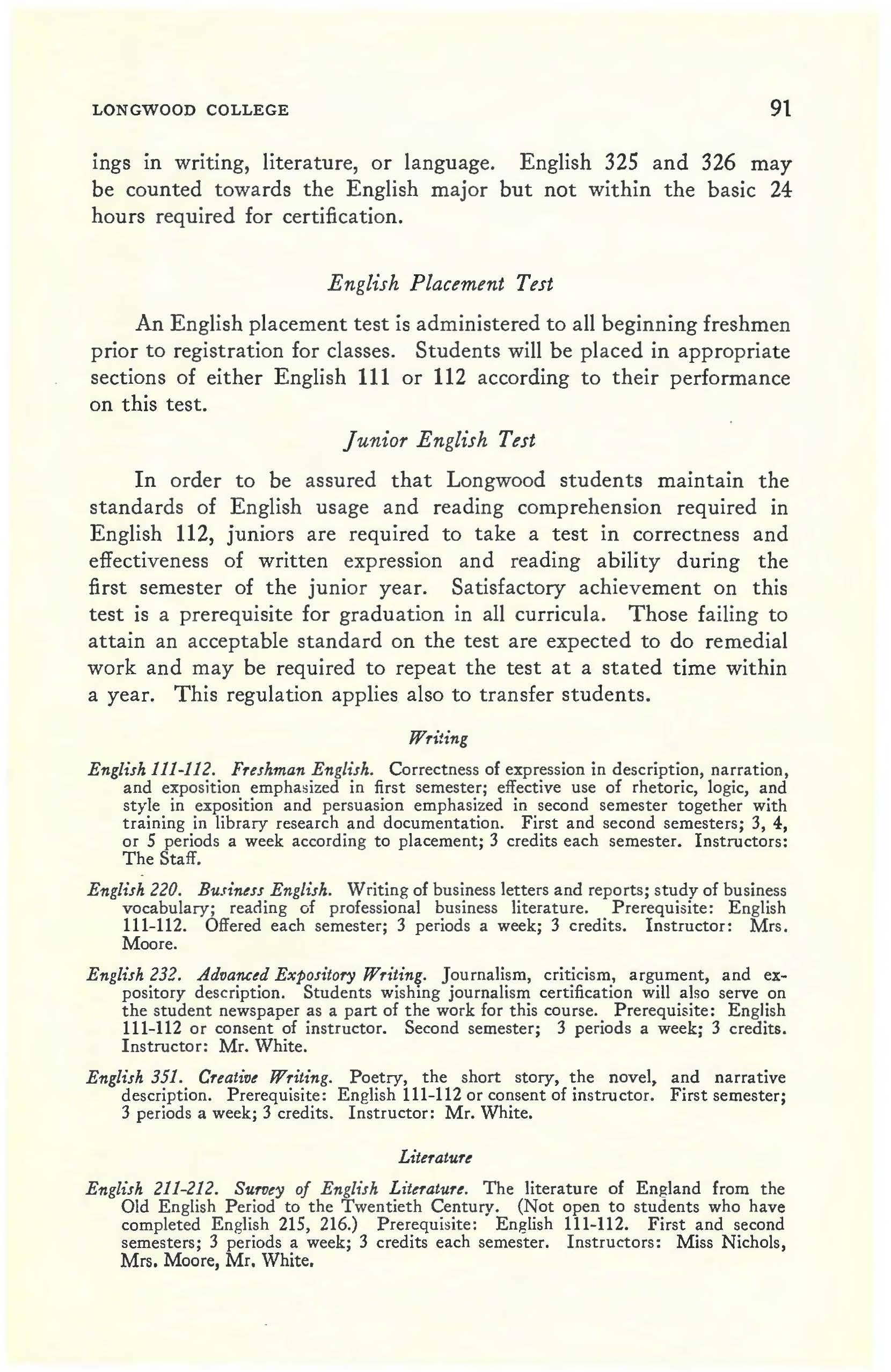
English 215, 216. Introduction to Literature. Selected figures, types, and themes of world literature from the Greek Period to modern times. (Not open to students who have completed English 211-212 or 421, 422.) Prerequisite: English 111-112. First and second semesters; 3 periods a week; 3 credits each semester. Instructors: Mrs. Davis, Mr. Gibb, Mrs. Schlegel.
English 247. Bible Literature. The Old and New Testaments as works of literature. Second semester; 3 periods a week; 3 credits. Instructor: Mrs. Schlegel.
English 321, 322. Survey of American Literature. First semester: selected American writers from Washington Irving to Mark Twain. Second semester: selected American writers from Henry James to William Faulkner. Prerequisite: English 111-112. First and second semesters; 3 periods a week; 3 credits each semester. Instructors: Mr. Meeker, Mrs. Moore, Mr. White.
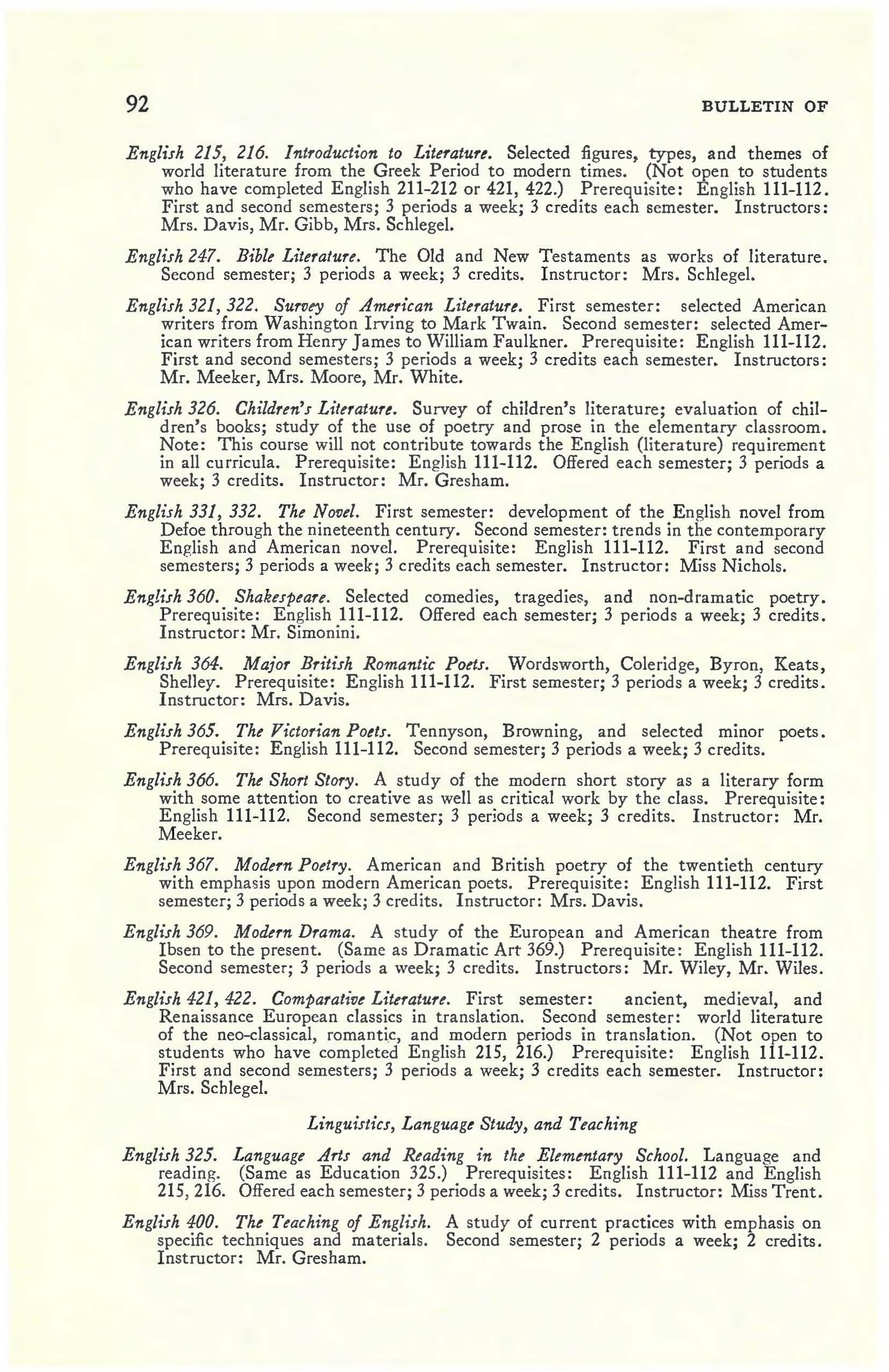
English 326. Children's Literature. Survey of children's literature; evaluation of children's books; study of the use of poetry and prose in the elementary classroom. Note: This course will not contribute towards the English (literature) requirement in all curricula. Prerequisite: English 111-112. Offered each semester; 3 periods a week; 3 credits. Instructor: Mr. Gresham.
English 331, 332. The Novel. First semester: development of the English novel from Defoe through the nineteenth century. Second semester: trends in the contemporary English and American novel. Prerequisite: English 111-112. First and second semesters; 3 periods a week; 3 credits each semester. Instructor: Miss Nichols.
English 360. Shakespeare. Selected comedies, tragedies, and non-dramatic poetry. Prerequisite: English 111-112. Offered each semester; 3 periods a week; 3 credits. Instructor: Mr. Simonini.
English 364. Major British Romantic Poets. Wordsworth, Colerid ge, Byron, Keats, Shelley. Prerequisite: English 111-112. First semester; 3 periods a week; 3 credits. Instructor: Mrs. Davis.
English 365. The /Tictorian Poets. Tennyson, Browning, and selected minor poets. Prerequisite: English 111-112. Second semester; 3 periods a week; 3 credits.
English 366. The Short Story. A study of the modern short story as a literary form with some attention to creative as well as critical work by the class. Prerequisite: English 111-112. Second semester; 3 periods a week; 3 credits. Instructor: Mr. Meeker.
English 367. Modern Poetry. American and British poetry of the twentieth century with emphasis upon modern American poets. Prerequisite: English 111-112. First semester; 3 periods a week; 3 credits. Instructor: Mrs. Davis.
English 369. Modern Drama. A study of the European and American theatre from Ibsen to the present. (Same as Dramatic Art 369.) Prerequisite: English 111-112. Second semester; 3 periods a week; 3 credits. Instructors: Mr. Wiley, Mr. Wiles.
English 421, 422. Comparative Literature. First semester: ancient, medieval, and Renaissance European classics in translation. Second semester: world literature of the neo-classical, romantic, and modern periods in translation. (Not open to students who have completed English 215, 216.) Prerequisite: En glish 111-112. First and second semesters; 3 periods a week; 3 credits each semester. Instructor: Mrs. Schlegel.
English 325. Language Arts and Reading in the Elementary School. Language and reading. (Same as Education 325.) Prerequisites: English 111-112 and English 215 , 216. Offered each semester; 3 periods a week; 3 credits. Instructor: Miss Trent.
English 400. The Teaching of English. A study of current practices with emphasis on specific techniques and materials. Second semester; 2 periods a week; 2 credits. Instructor: Mr. Gresham.
English 412. History of the English Language. Historical linguistics; etymology; dialects; lexicography; orthography; semantics. Prerequisite: English 111-112. Second semester; 3 periods a week; 3 credits. Instructor: Mr. Simonini.
Directed Teaching ~f English in the High School. Students majoring in English, preparing to teach English in the high school, carry on directed teaching in this field during their senior year as Education 400, under a general supervisor, supervising teacher, and a consultant in the Department of English. Consultant: Mr. Gresham.
Developmental Reading. Individualized programs designed to improve reading speed, comprehension, and study habits. Offered each semester; 2 periods a week; no credit. Instructor: Mr. Gresham.
Speech 101. Fundamentals of Public Speech. Informative talks; persuasive speaking; oral interpretation. Offered each semester; 2 periods a week; 2 credits. Instructors: Miss Barnett, Mr. Wiles, Mr. Wiley.
Speech 201. Discussion and Debate. Conduct of the democratic meeting; group discussion; formal debate. Second semester; 3 periods a week; 3 credits, Instructor: Miss Barnett.
Speech 311. Radio, Television, and Mass Communications. Radio skills with studio practice; elementary television theory and techniques; function of radio and television media in American culture. First semester; 2 periods a week; 2 credits. Instructor: Miss Barnett.
Speech 312. Persuasion. Advanced public speaking with particular emphasis on the logic and rhetoric of persuasive speech. First semester; 3 periods a week; 3 credits, Instructor: Miss Barnett.
Speech 401. Speech for the Classroom Teacher. The role of speech in teaching; physiology of speech, voice training, phonetics, and practice in oral interpretation, public address, and group discussion techniques. Second semester; 2 periods a week; 2 credits. Instructor: Miss Barnett.
Dramatic Art 101,102. Play Production. A laboratory course. First semester; principles of play production; study in lighting, costumes, and scenery. Second semester: practice in directing; study of roles and scenes. First and second semestern; 3 double periods a week; 3 credits each semester. Instructors: Mr. Wiley, Mr. Wiles.
Dramatic Art 301. Problems in Directing. Problems in directing with particular reference to the educational theatre, theatre organization, styles of presentation, composition and picturization, and relationships between the director and other theatre workers. Students will direct one-act plays and assist in direction of the major play of the semester. Prerequisite: Dramatic Art 101 or 102. First semester; 2 double periods a week; 2 credits. Instructor: Mr. Wiley.
Dramatic Art 369. Modern Drama. A study of the European and American theatre from Ibsen to the present. (Same as English 369.) Prerequisite: Engiish 111-112. Second semester; 3 periods a week; 3 credits. Instructors: Mr. Wiley, Mr. Wiles.
The following basic courses are required for both a major and minor in English in the program for the degree of Master of Arts in Education: English 505, 522, and 651. These courses, dealing with fundamental principles of linguistic andJiterary analysis and composition, are designed for teachers of language arts on both the elementary and secondary levels. Students electing to take a double minor will choose any two of these courses. The graduate major in English requires 9 additional semester hours of courses elected from departmental offerings.
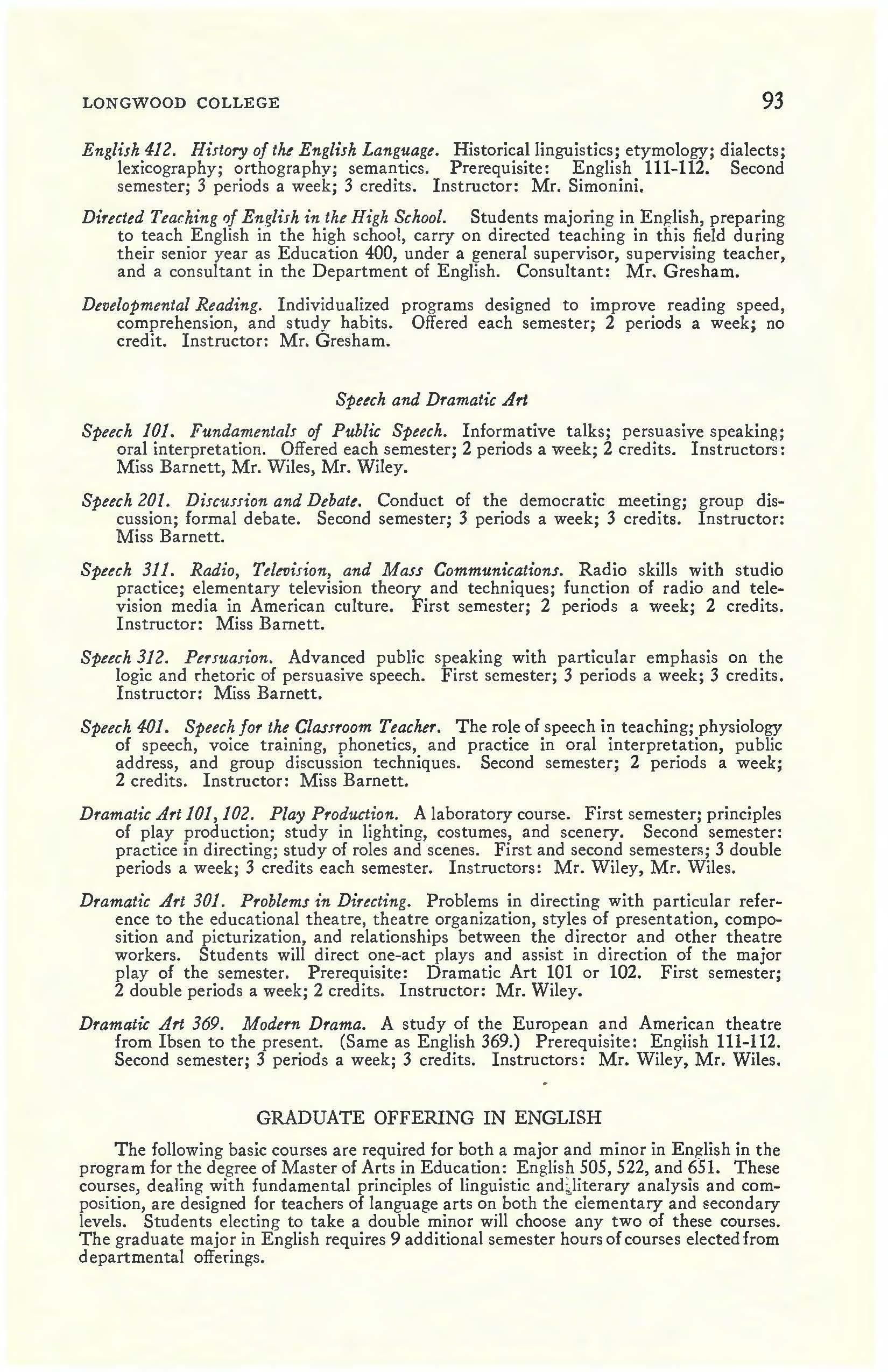
English 505. Modern English Grammar. Structural linguistics: phonology, morphology, syntax, usage. Prerequisite: 2 years of English. First semester; 3 periods a week; 3 credits. Instructor: Mr. Simonini.
English 522. Practical Literary Criticism. A study of the various methods of judging and appreciating literature. Historical, psychological, philosophical, and esthetic approaches will be demonstrated in analyses of selected works. Prerequisite: 2 years of English. Second semester; 3 periods a week; 3 credits. Instructor: Mr. Meeker.
English 532. Literature of the South. A study of literature produced in the Southern United States from Poe to the present. Prerequisite: 2 years of English. First semester; 3 periods a week; 3 credits. Instructor: Mr. Meeker.
English 541. World Classics in Translation. A study of the epic as a literary form, including Homer, Dante, Milton, and Byron. Prerequisite: 2 years of English. 3 credits. Instructor: Mrs. Schlegel.
English 600. Thesis Research. Study of a selected topic for the Master's thesis under the direction of a departmental adviser. 6 credits.
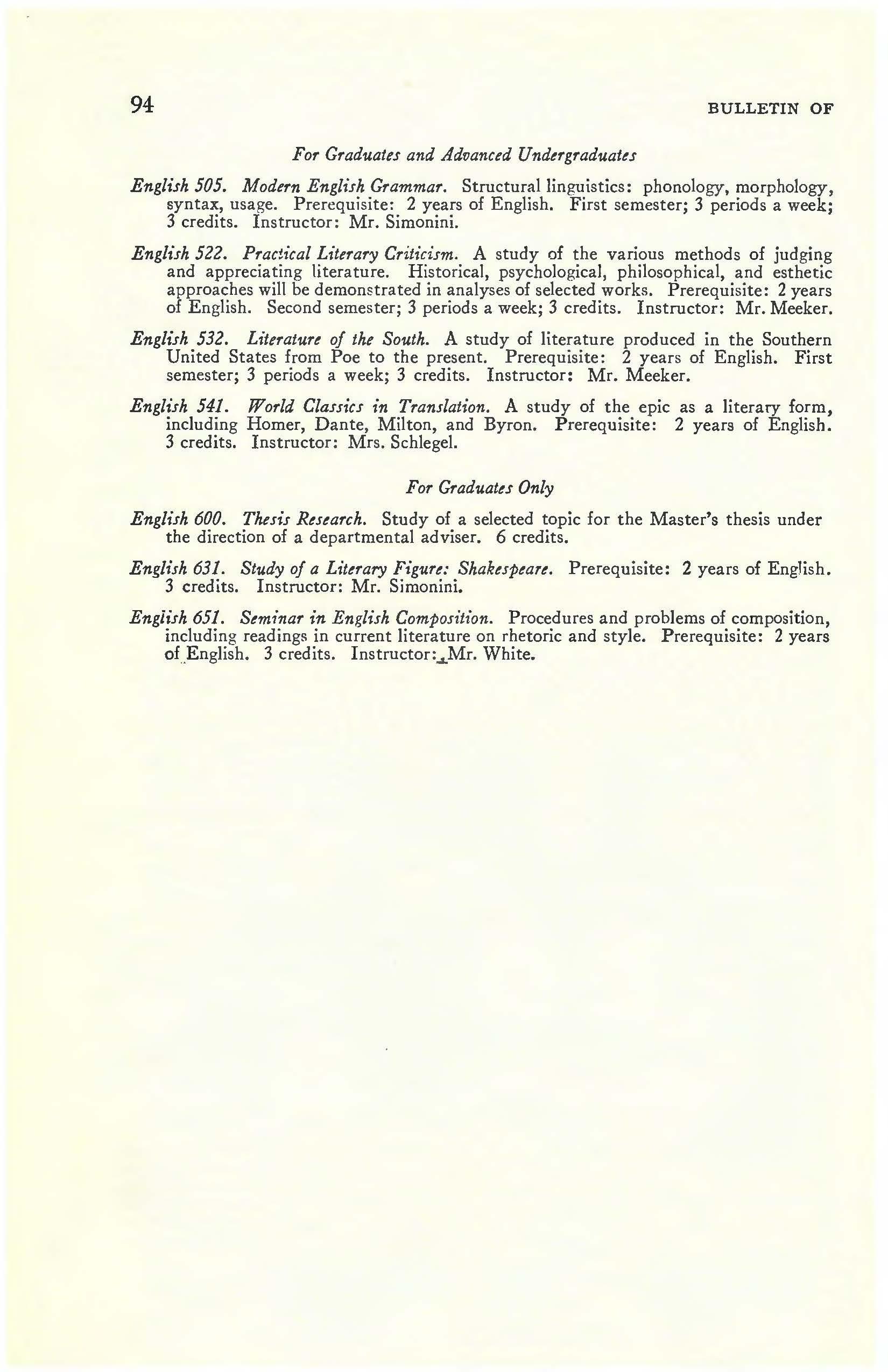
English 631. Study of a Literary Figure: Shakespeare. Prerequisite: 2 years of English. 3 credits. Instructor: Mr. Simonini.
English 651. Seminar in English Composition. Procedures and problems of composition, including readings in current literature on rhetoric and style. Prerequisite: 2 years of.English. 3 credits. Instructor:..._Mr. White.
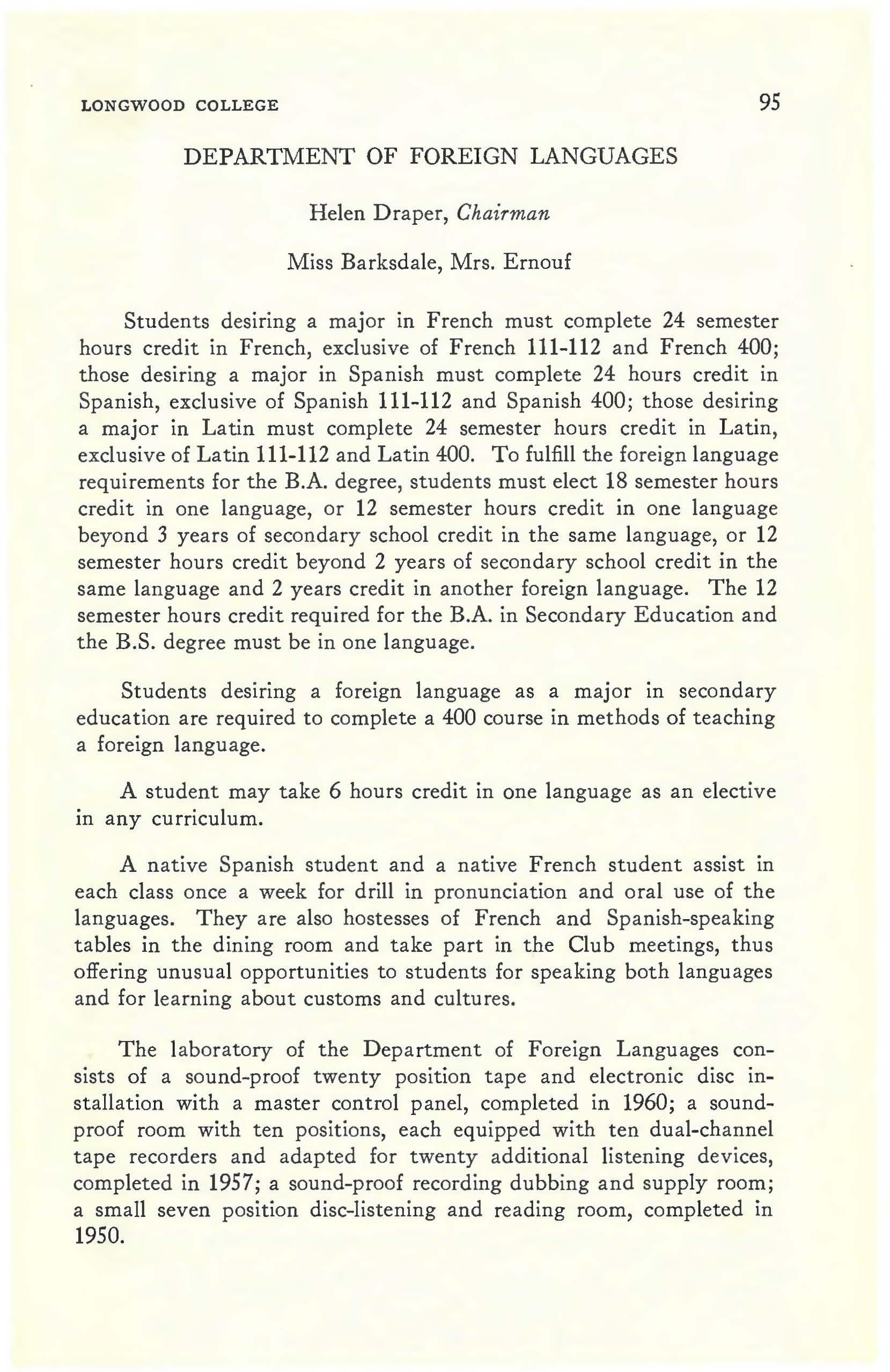 Helen Draper, Chairman Miss Barksdale, Mrs. Ernouf
Helen Draper, Chairman Miss Barksdale, Mrs. Ernouf
Students desiring a major in French must complete 24 semester hours credit in French, exclusive of French 111-112 and French 400; those desiring a major in Spanish must complete 24 hours credit in Spanish, exclusive of Spanish 111-112 and Spanish 400; those desiring a major in Latin must complete 24 semester hours credit in Latin, exclusive of Latin 111-112 and Latin 400. To fulfill the foreign language requirements for the B.A. degree, students must elect 18 semester hours credit in one language, or 12 semester hours credit in one language beyond 3 years of secondary school credit in the same language, or 12 semester hours credit beyond 2 years of secondary school credit in the same language and 2 years credit in another foreign language. The 12 semester hours credit required for the B.A. in Secondary Education and the B.S. degree must be in one language.
Students desiring a foreign language as a major in secondary education are required to complete a 400 course in methods of teaching a foreign language.
A student may take 6 hours credit in one language as an elective m any curriculum.
A native Spanish student and a native French student assist in each class once a week for drill in pronunciation and oral use of the languages. They are also hostesses of French and Spanish-speaking tables in the dining room and take part in the Club meetings, thus offering unusual opportunities to students for speaking both languages and for learning about customs and cultures.
The l aboratory of the Department of Foreign Languages consists of a sound-proof twenty position tape and electronic disc installation with a master control panel, completed in 1960; a soundproof room with ten positions, each equipped with ten dual-channel tape recorders and adapted for twenty additional listening devices, completed in 1957; a sound-proof recording dubbing and supply room; a small seven position disc-listening and reading room, comp leted in 1950.
French 111-112. Beginner's French. Topics and readings about France. First and second semesters; 5 periods a week; 3 credits each semester. Instructor: Mrs. Ernouf.
French 121-122. Intermediate French. Topics and reading about French life and culture. Prerequisite: a minimum of two years of high school or one year of college French. First and second semesters; 3 periods a week; 3 credits each semester. Instructor: Miss Draper.
French 221-222. Aduanced French. Oral and written language; reading of modern French writers. Prerequisite: Intermediate French. First and second semesters; 3 periods each week; 3 credits each semester, Instructor: Miss Draper.

French 311. Composition and Grammar. Practice in speaking and writing modern French. Prerequisite: French 121-122. First semester; 2 periods a week; 2 credits. Instructor: Miss Draper.
French 321-322. A Survey of French Literature. Prerequisite: Intermediate French. First and second semesters; 3 periods a week; 3 credits each semester. Instructor: Miss Draper.
French 331. French Literature of the Seuenteenth Century. Prerequisite: French 221-222 or French 321-322. Offered on demand. 3 periods a week; 3 credits. Instructor: Miss Draper.
French 332. French Literature of the Nineteenth Century. Prerequisite: French 221-222 or French 321-322. Offered on demand. 3 periods a week; 3 credits. Instructor: Miss Draper.
French 400. Methods of Teaching French. First semester; 1 period a week; 1 credit. Instructor: Miss Draper.
French 421, 422. Contemporary French Literature. Prerequisite: French 221-222 or French 321-322. First and second semesters; 3 periods a week· 3 credits each semester. Instructor: Miss Draper.
French 431,432. The Modern French Theatre. Extensive reading and study of French drama of the nineteenth and twentieth centuries. Prerequisite: French 221-222 or French 321-322. First and second semesters; 3 periods a week; 3 credits. Offered upon demand. Instructor: Miss Draper.
Spanish 111-112. Beginners' Spanish. Topics and readings about Spain and Mexico. First and second semesters; 5 periods a week; 3 credits each semester. Instructor: Miss Barksdale.
Spanish 121-122. Intermediate Sp_anish. Topics and readings about Latin-American life and culture. Prerequisite: A minimum of two years of high school or one year of college Spanish. Instructor: Miss Barksdale.
Spanish 221-222. Aduanced Spanish. Language and reading of selected works of contemporary Spanish and -Spanish-American writers. Prerequisite: Intermediate Spanish. First and second semesters; 3 periods a week; 3 credits each semester. Instructor: Miss Barksdale.
Spanish 321-322. Suruey of Spanish Literature. Prerequisite: Advanced Spanish. First and second semesters; 3 periods a week; 3 credits each semester. Instructor: Mrs. Ernouf.
Spanish 400. Methods of Teaching Spanish. First semester; 1 period a week; 1 credit. Instructor: Miss Barksdale,
Spanish 411. Composition and Grammar. Practice in writing and speaking; structure and usage of Modern Spanish. Prerequisite: Spanish 221-222. First semester; 2 periods a week; 2 credits. Instructor: Mrs. Ernouf.
Spanish 421, 422. Spanislz,..American Literature. Prerequisite: Advanced Spanish. First and second semesters; 3 periods a week; 3 credits each semester. Offered on demand. Instructor: Mrs. Ernouf.
Spanish 451, 452. Survey of the Spanish Drama. Prerequisite: Advanced Spanish. First and second semesters; 3 periods a week; 3 credits each semester. Instructor: Mrs. Ernouf.
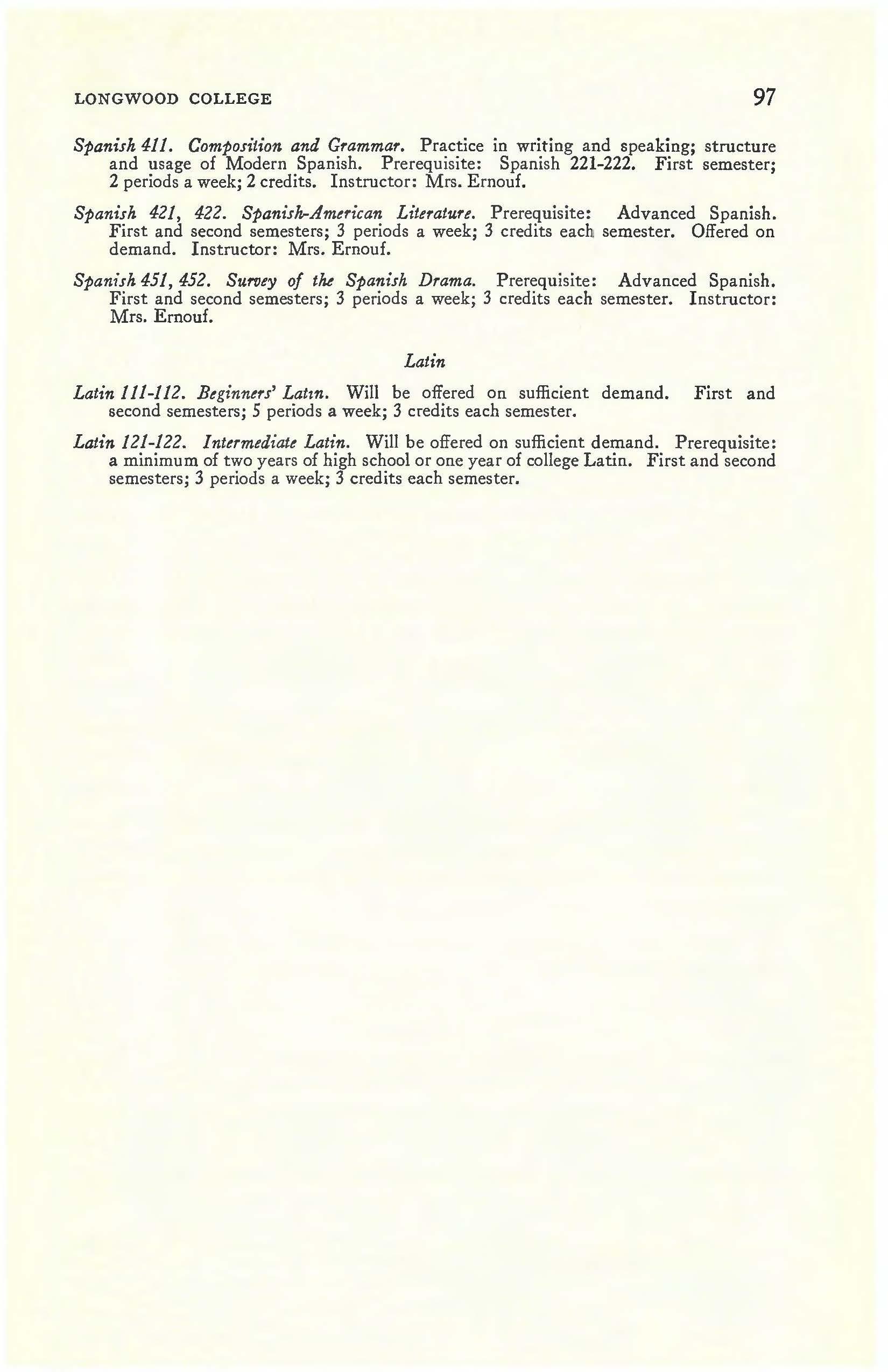
Latin 111-112. Beginners' Latin. Will be offered on sufficient demand. First and second semesters; 5 periods a week; 3 credits each semester.
Latin 121-122. Intermediate Latin. Will be offered on sufficient demand. Prerequisite: a minimum of two years of high school or one year of college Latin. First and second semesters; 3 periods a week; 3 credits each semester.

Mr. Berkis, Mr. Bittinger, Mrs. Cover, Mr. Helms, Mr. Lane, Mr. Magnusson, Mr. Moss, Mr. Schlegel, Mr. Sneller, Mr. Vieira
The Department of History and the Social Sciences attempts to integrate the whole field of the social sciences.
The basic requirements for a major in history are History 111112, 221-222, and 18 credits in history courses on the junior-senior level. All history majors are earnestly urged to explore the other social sciences by way of their electives.
The subject matter of geography includes materials from both the natural and the social science fields. Since major emphasis is placed upon the life of people as it is related to natural environment, courses in geography are counted as credits in social science. A major in this field requires 30 credits.
In sociology a major requires Economics 443-444, Government 335-336 and 18 credits in sociology, which should include Sociology 221, 222.
Students preparing to enter social welfare work should take at least 18 credits in sociology, including social psychology; 8 credits in biology; 6 credits in economics; and 6 credits in American government.
A major in the social sciences requires 30 semester hours, not more than 15 of which may be in any one social science.
History 111-112. History of Ciuilization. A survey course in world civilization. First and second semesters; 3 periods a week; 3 credits each semester. Instructors: The Staff.
History 221-222. American History. An introductory survey course in American history. First and second semesters; 3 periods a week; 3 credits each semester. Instructors: The Staff.
History 331. American Ciuil War and Reconstruction. Prerequisite: History 221-222. Alternate years. Offered second semester 1962-63; 3 periods a week; 3 credits. Instructor: Mr. Schlegel.
History 334. Domestic United States History Since 1900. Prerequisite: History 221-222. Offered second semester; 3 periods a week; 3 credits, Instructor: Mr. Sneller,
History 335. Amnican. Diplomatic History Since the Ciuil War. Prerequisite: History 221-222. Offered first semester; 3 periods a week; 3 credits. Instructor: Mr. Sneller.
History 337, 338. Southern. History. First semester: the Old South; second semester: the New South. Prerequisite: History 221-222. First and second semesters; 3 periods a week; 3 credits each semester. Instructor: Mr. Simkins.
History 340. MedierJal History. Study of Europe from the Fall of Rome to the Renaissance. Prerequisite: History 111-112. Alternate years. Offered first semester 1963-64; 3 periods a week; 3 credits Instructor: Mr. Berkis.
History 341. European. History, Renaissance to Waterloo. Early modern European history. Prerequisite: History 111-112. Alternate years. Offered second semester 1962-63; 3 periods a week; 3 credits. Instructor: Mr Berkis.
History 342 . European. History, Waterloo to 1870. Nineteenth century European history. Prerequisite: History 111-112. Alternate years. Offered second semester 1962-63; 3 periods a week; 3 credits. Instructor: Mr. Berkis.
History 343. European. History, 1870 to the Present. Twentieth century European history. Prerequisite: History 111-112. Alternate years. Offered second semester 1962-63; 3 periods a week; 3 credits. Instructor: Mr. Berkis.
Histor1344 . European Biography . Study of the lives of selected individuals in European hi story since 1300. Prerequisite: History 111-112. Alternate years . Offered second semester 1962-63; 3 periods a week; 3 credits. Instructor: Mr. Helms.
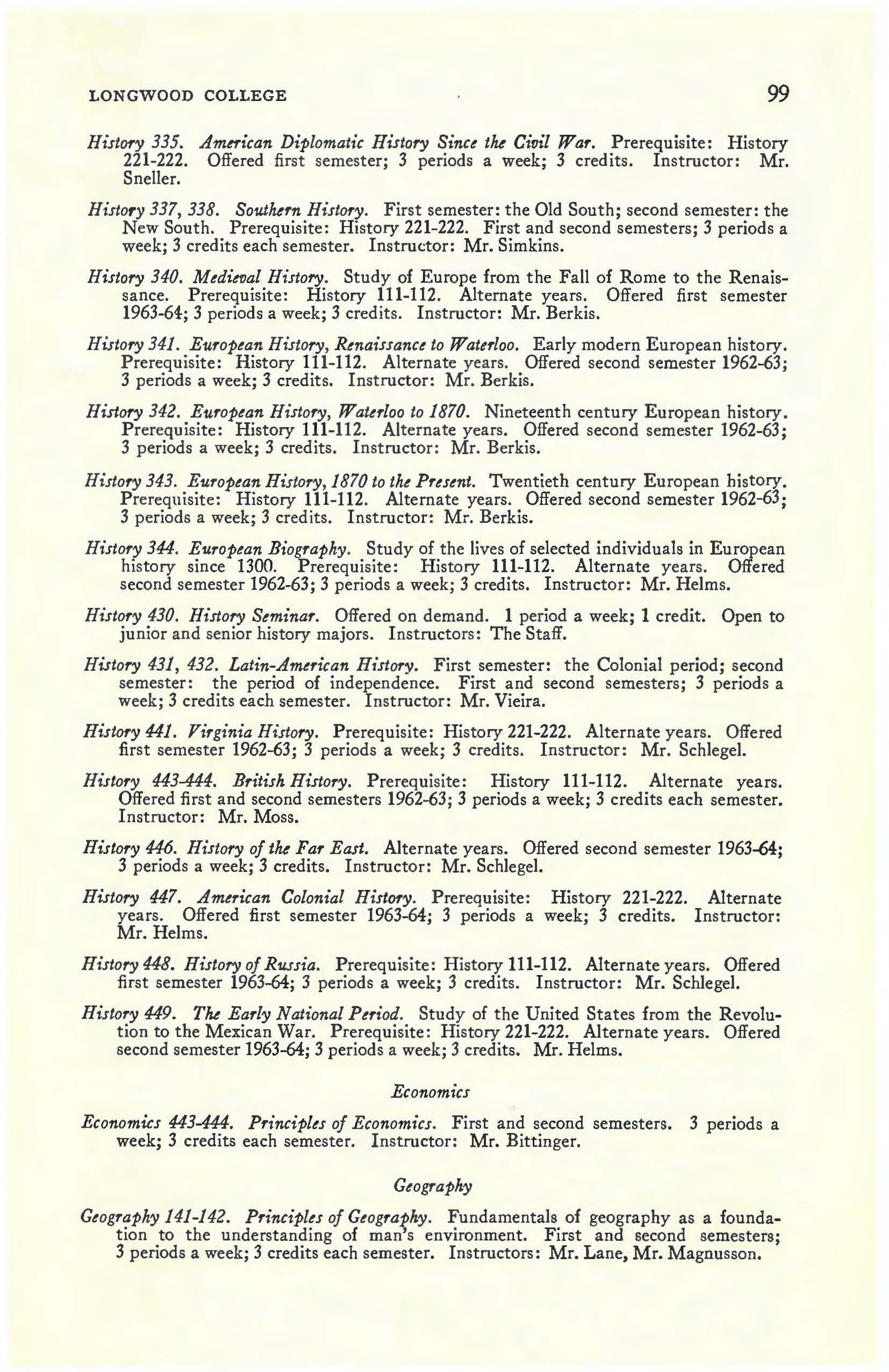
History 430. History Seminar. Offered on demand. l period a week; 1 credit. Open to junior and senior history majors. Instructors : The Staff.
History 431, 432. Latin-American. History. First semester: the Colonial period; second semester: the period of independence . First and second semesters; 3 periods a week; 3 credits each semester. Instructor: Mr. Vieira.
History 441. Yirginia History. Prerequisite: History 221-222. Alternate years. Offered first semester 1962-63; 3 periods a week; 3 credits. Instructor: Mr. Schlegel.
History 443-444. British History. Prerequisite: History 111-112. Alternate years. Offered first and second semesters 1962-63; 3 periods a week; 3 credits each semester. Instructor: Mr. Moss.
History 44-0. History of the Far East. Alternate years. Offered second semester 1963-64; 3 periods a week; 3 credits. Instructor: Mr. Schlegel.
History 447. American. Colonial History. Prerequisite: History 221-222. Alternate years. Offered first semester 1963-64; 3 periods a week; 3 credits. Instructor: Mr. Helms.
History 448. History of Russia. Prerequisite: History 111-112. Alternate years. Offered first semester 1963-64; 3 periods a week; 3 credits Instructor: Mr. Schlegel.
History 449. The Early National Period. Study of the United States from the Revolution to the Mexican War. Prerequisite : History 221-222. Alternate years. Offered second semester 1963-64; 3 periods a week; 3 credits. Mr. Helms.
Econ.omiu 443-444. Principles of Economics . First and second semesters. 3 periods a week; 3 credits each semester. Instructor: Mr. Bittinger.
Geography 141-142. Principles of Geografhy. Fundamentals of geography as a foundation to the understanding of man s environment. First and second semesters; 3 periods a week; 3 credits each semester. Instructors: Mr. Lane, Mr. Magnusson.
Geography 211, 212. Geography for Teachers. An experimental and practical approach in teaching world and regional geography. Skills involved in reading and inter-,/ 0 preting geographic data will be emphasized. First and second semesters; 3 periods a week; 3 credits each semester. Instructors: Mr. Lane, Mr. Magnusson.
Geography 242. Economic Geography. Relation of geographic factors to economic conditions in d'ctermining the nature and location of the several productive occupations and the distribution of the output of these occupations, including their transportation and marketing. Second semester; 3 periods a week; 3 credits. Instructor: Mr. Magnusson.
Geography 353. Geograph•~ Virginia. Geographical appraisal of Virginia, including the ge0Jogf,~;1ls, climate, economic minerals, original vegeta-VO tion, and the human geography of Virginia, emphasizing settlement and population, J agrjculture, industries, and transportation, Second semester; 3 periods a week; 3 credits. Instructor: Mr. Lane. r.;.,,.;}-f 1'
Geography 354. Weather, Climate, and Man. An elementary background of various weat~er phenomena and climatic patterns. Particular emphasis is given to the effects '\ ,,(,, pf weather and climate upon man and his activities. Alternate years. Offered first 1q1,;') 'f'semeste1 ~J periods a week; 3 credits. Instructor: Mr. Lane.
Geography 356. Conseroation of Natural Resources. Survey of reso u rce problems and related conservation techniques in the United States. Particular emphasis is placed V upon the resource conservation problems of the Southeastern States, Alternate years. Offered first semester 1962-63; 3 periods a week; 3 credits. Instructor: Mr. Lane.
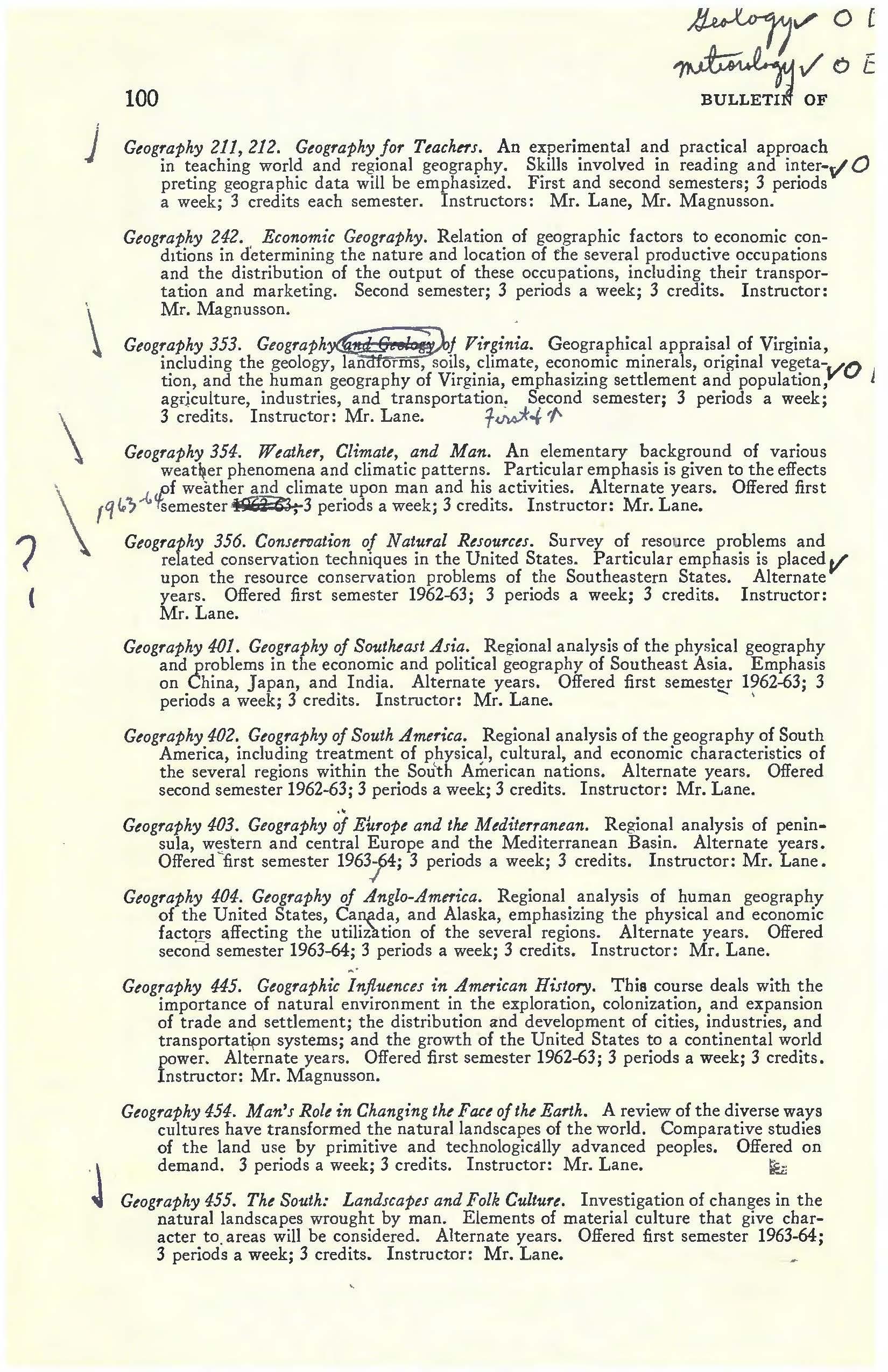
Geography 401. Geography of Southeast Asia. Regional analysis of the physical geography and problems in the economic and political geography of Southeast Asia. Emphasis on China, Japan, and India. Alternate years. Offered first semester 1962-63; 3 periods a week; 3 credits. Instructor: Mr. Lane. .._ '
Geography 402. Geography of South America. Regional analysis of the geography of South America, including treatment of physical, cultural, and economic characteristics of the several regions within the Sou'th American nations. Alternate years. Offered second semester 1962-63; 3 periods a week; 3 credits. Instructor: Mr. Lane.
Geography 403. Geography ~j Eilrope and the Mediterranean. Regional analysis of peninsula, western and central Europe and the Mediterranean Basin. Alternate years. Offered first semester 1963f4; 3 periods a week; 3 credits. Instructor: Mr. Lane.
Geography 404. Geography of Anglo-America. Regional analysis of human geography of the United States, Ca11t1da, and Alaska, emphasizing the physical and economic facto.rs affecting the utilization of the several regions. Alternate years. Offered second semester 1963-64; 3 periods a week; 3 credits. Instructor: Mr. Lane.
Geography 445. Geographic Influences in American History. This course deals with the importance of natural environment in the exploration, colonization, and expansion of trade and settlement; the distribution and development of cities, industries, and transportatipn systems; and the growth of the United States to a continental world power. Alternate years. Offered first semester 1962-63; 3 periods a week; 3 credits. Instructor: Mr. Magnusson.
Geography 454. Man's Role in Changing the Face of the Earth. A review of the diverse ways cultures have transformed the natural landscapes of the world. Comparative studies of the land use by primitive and technologically advanced peoples, Offered on demand. 3 periods a week; 3 credits. Instructor: Mr. Lane, .J
Geography 455. The South: Landscapes and Folk Culture. Investigation of changes in the natural landscapes wrought by man. Elements of material culture that give character to. areas will be considered. Alternate years. Offered first semester 1963-64; 3 periods a week; 3 credits. Instructor: Mr. Lane.
Gooernment 335-336. Federal, State and Local GOTJernment. First and second semesters; 3 periods a week; 3 credits each semester. Instructor: Mr. Bittinger,
Sociology 221. Introductory Sociology. The study of princip les and comparisons in society and culture as these relate to social groups and institutions, First semester; 3 periods a week; 3 credits. Instructor: Mrs. Cover.
Sociology 222. Sociology of Child Deoelopment. Second semester; 3 periods a week; 3 credits. Instructor: Mr s. Cover.
Sociology 331. Social Psychology. Alternate years. Offered first semester 1962-63; 3 periods a week; 3 credits. Instructor: Mrs. Cover.
Sociology 332. Race and Cullural Minorities. Second semester; 3 periods a week; 3 credits. Instructor: Mrs. Cover.
Soci ology 335 Juvenile Delin q_uency. The nature of delinquent behavior. Social determinants of delinquency. Methods of detention, probation and parole, court administration. Alternate years. Offered second semester 1962-63; 3 periods a week; 3 credits. Instructor: Mro. Cover.
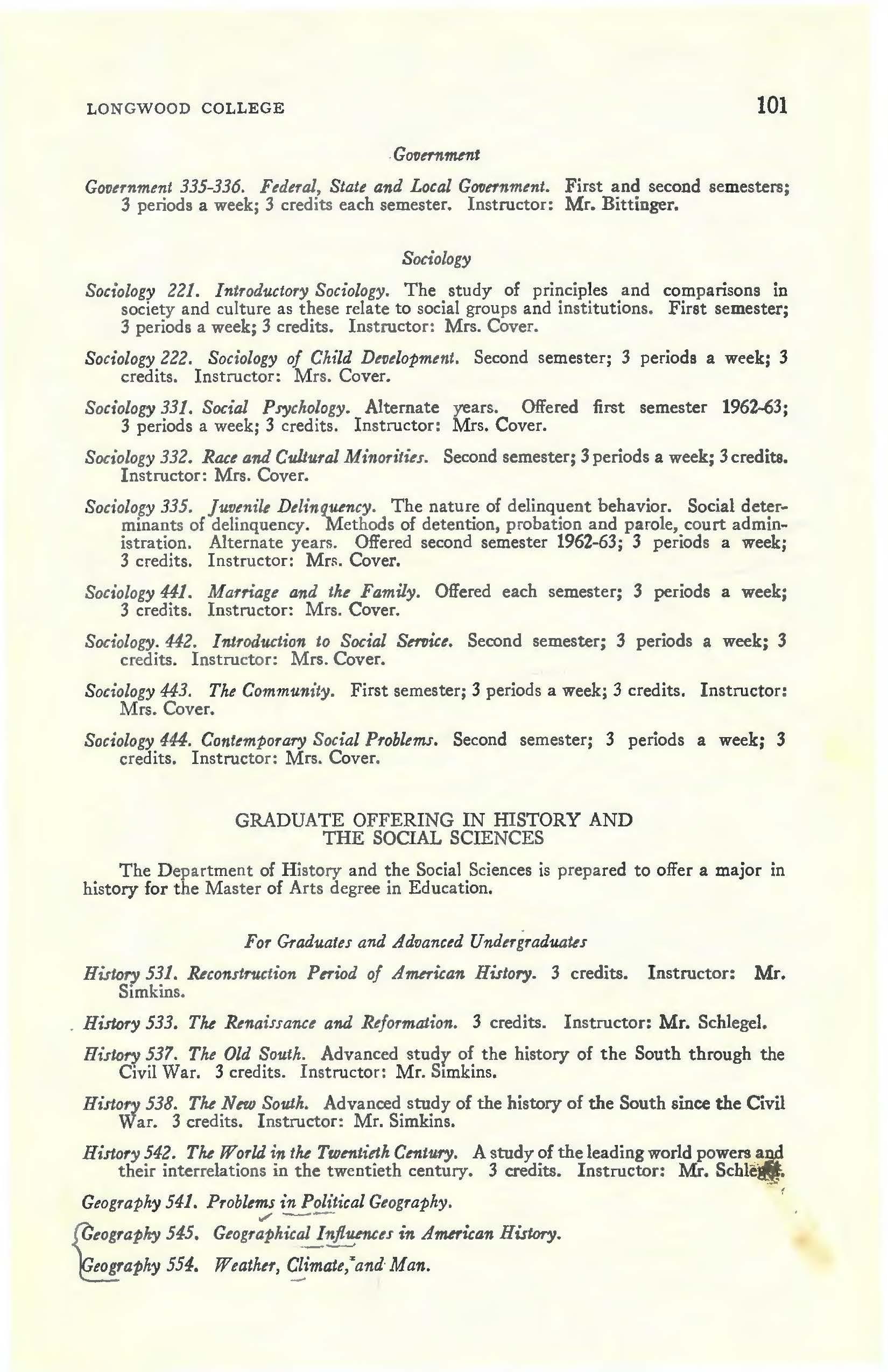
Sociology 441. Marriage and the Family. Offered each semester; 3 periods a week; 3 credits. Instructor: Mrs. Cover.
Sociology. 442. Introduction to Social Stf'flict. Second semester; 3 periods a week; 3 credits. Instructor: Mrs. Cover.
Sociology 443. The Community. First semester; 3 periods a week; 3 credits, Instructor: Mrs. Cover.
Sociology 444. Contemporary Social Problem,. Second semester; 3 periods a week; 3 credits. Instructor: Mrs. Cover.
The Department of History and the Social Sciences is prepared to offer a major in history for the Master of Arts degree in Education.
Hirtor, 531. Reconstruction Period of American Hirtory. 3 credits. Instructor: Mr. Simkins•
History 533. The Renaissance and Reformation. 3 credits. Instructor: Mr. Schlegel.
History 537. The Old South. Advanced study of the history of the South through the Civil War, 3 credits. Instructor: Mr. Simkins.
History 538. The New South. Advanced study of the history of the South since the Civil War. 3 credits. Instructor: Mr. Simkins.
History 542. The World in the Twentieth Century. A study of the leading world powers a!M1 their interrelations in the twentieth century. 3 credits. Instructor: Mr. SchleitlJ, ' Geography 541. Problems in Political Geography. {!Jeograpky 545. Geographical I1!fl_,uences in American History.
~aphy 554. Weather, (!!jmate;and Man.
History 621. Economic History of the British Empire in the 17th and 18th Centuries. A comprehensive examination of mercantilism as applied, and as it worked out, in the British colonial world in the Americas. 3 credits. Instructor: Mr. Moss.
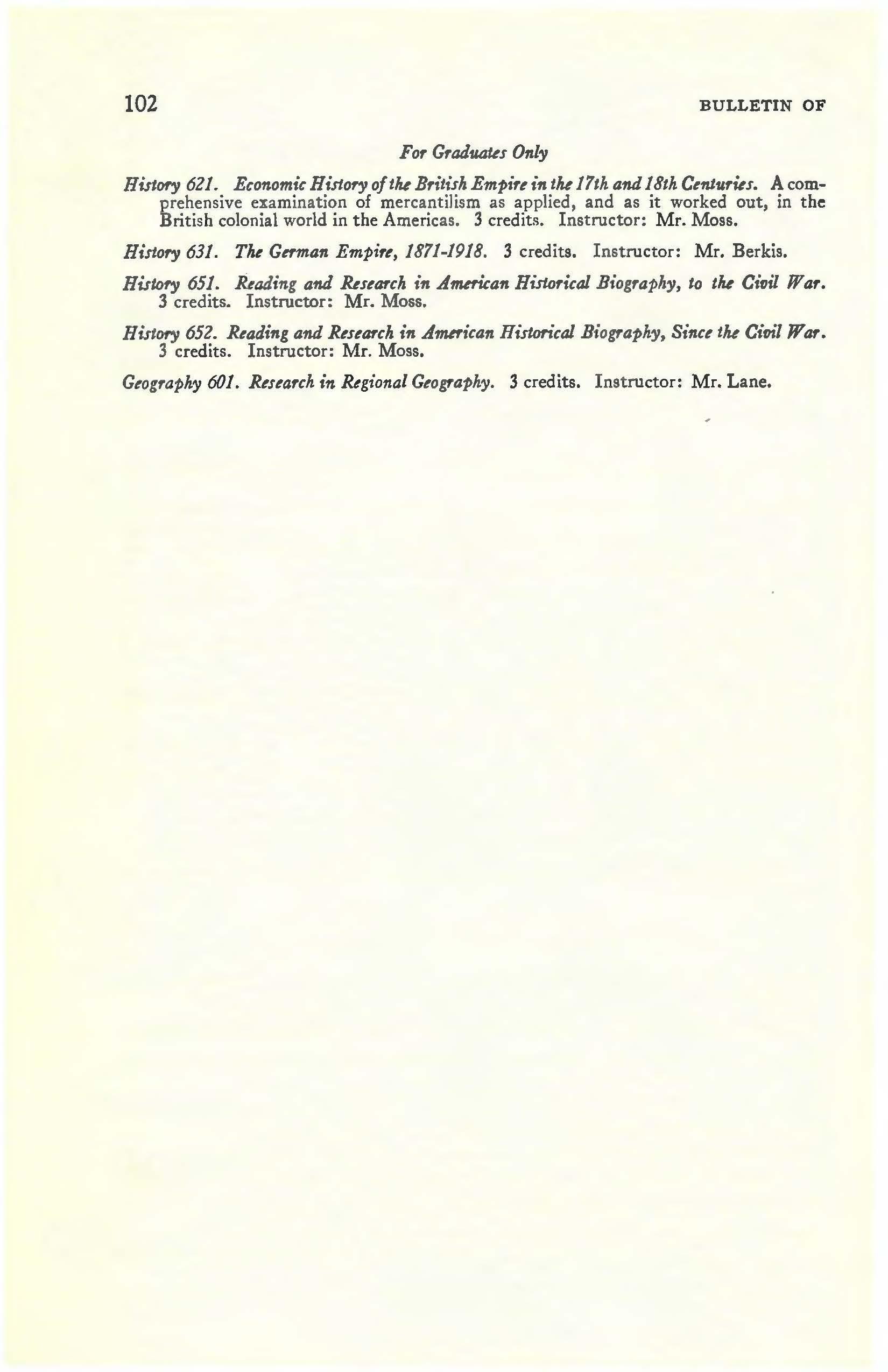
History 631. The German Empire, 1871-1918. 3 credits. Instructor: Mr. Berkis.
History 651. Reading and Research in American Historical Biography, to the Cioil War. 3 credits. Instructor: Mr. Moss.
History 652. Reading and Research in American Historical Biography, Since the Cioil War. 3 credits. Instructor: Mr. Moss.
Geography 601. Research in Regional Geography. 3 credits. Instructor: Mr. Lane.
The Department of Home Economics offers students an opportunity to prepare for teaching home economics in the public schools and to prepare for positions as home economists in business. Speci 1l emphasis is placed upon the development of the student in the areas of home and family living in all home economics courses. Students meeting the requirements for a Bachelor of Science degree in Home Economics Education are qualified to teach in state and federal reimbursed secondary schools.
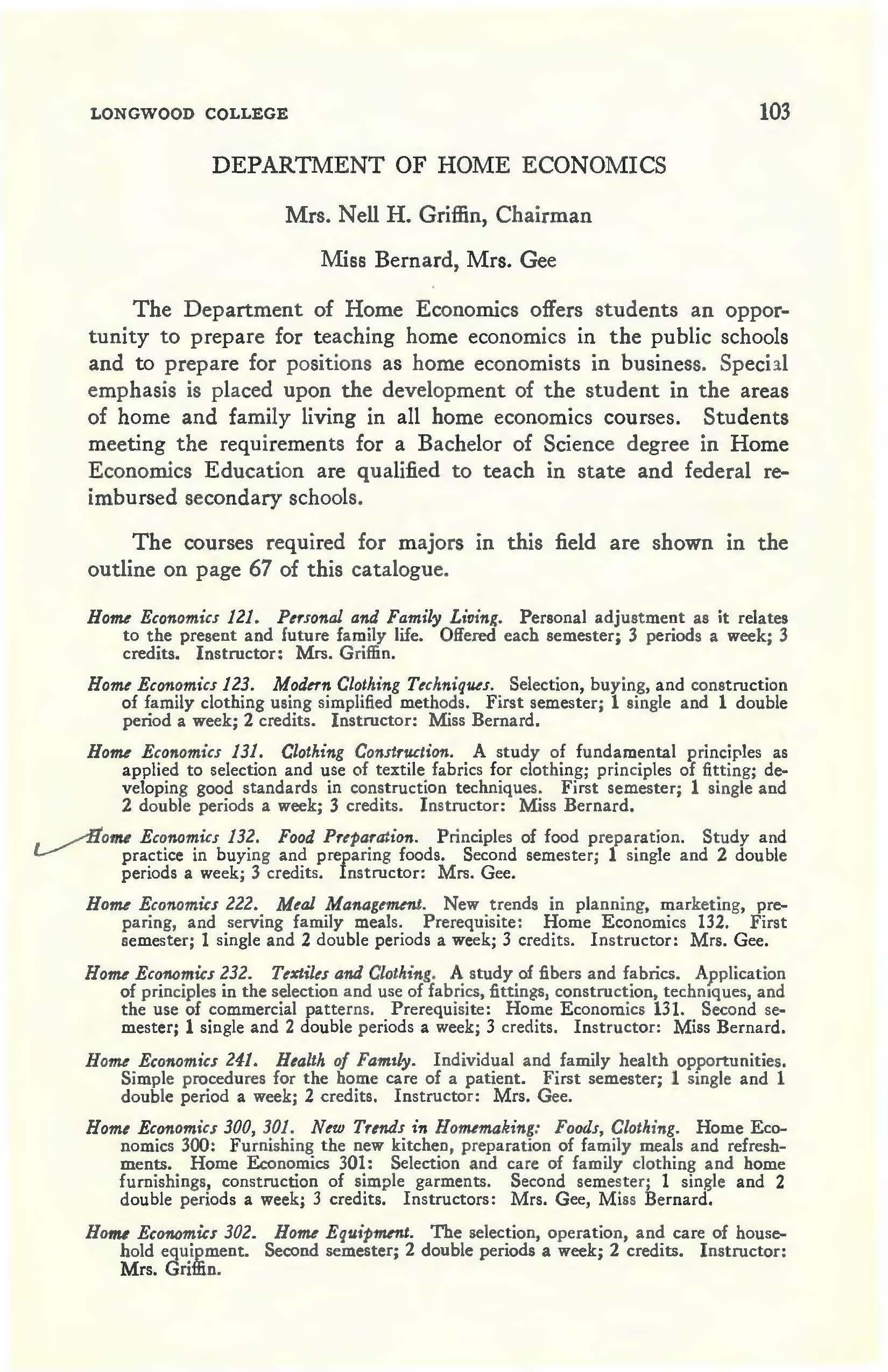
The courses required for majors m this field are shown in the outline on page 67 of this catalogue.
Hoflll! Economics 121. Personal o.nd Family Li11ing. Personal adjustment as it relates to the present and future family life. Offered each semester; 3 periods a week; 3 credits. Instructor: Mrs. Griffin.
Homt Economics 123. Modtrn Clothing Ttchniquu. Selection, buying, and construction of family clothing using simplified methods. First semester; 1 single and 1 double period a week; 2 credits. Instructor: Miss Bernard.
Hoflll! Economics 131. Clothing Construction. A study of fundamental princirles as applied to selection and use of textile fabrics for clothing; principles of fitting; developing good standards in construction techniques. First semester; 1 single and 2 double periods a week; 3 credits. Instructor: Miss Bernard.
Aome Economics 132. Food Prt,Po.ration. Principles of food preparation. Study and ,___,,,,- practice in buying and preparing foods. Second semester; 1 single and 2 double periods a week; 3 credits. Instructor: Mrs. Gee.
Hoflll! Economics 222. Mto.l Managm,mt. New trends in plann ing, marketing, preparing, and serving family meals. Prerequisite: Home Economics 132. First semester; 1 single and 2 double periods a week; 3 credits. Instructor: Mrs. Gee.
Hoflll! Economics 232. Ttxtilu and Clothing A study of fibers and fabrics. Application of principles in the selection and use of fabrics, fittings, construction, techniques, and the use of commercial patterns, Prerequisite: Home Economics 131. Second semester; 1 single and 2 double periods a week; 3 credits, Instructor: Miss Bernard,
Hoflll! Economics 241. Htalth of Family. Individual and family health opportunities. Simple procedures for the home care of a patient. First semester; 1 single and 1 double period a week; 2 credits, Instructor: Mrs. Gee.
Homt Economics 300, 301. Ntw Trmds in Homtmaking: Foods, Clothing. Home Economics 300: Furnishing the new kitchen, preparation of family meals and refreshments. Home Economics 301: Selection and care of family clothing and home furnishings, construction of simple garments. Second semester; 1 single and 2 double periods a week; 3 credits. Instructors: Mrs. Gee, Miss Bernard.
Home Economics 302. Hoflll! Equipmtnt. The selection, operation, and care of household equiement. Second semester; 2 double periods a week; 2 credits. Instructor: Mrs. Griffin.
Home Economics 322. Adflanced Clothing. Advanced work in fabrics, pattern adjustments, :fittings and construction. Prerequisites: Home Economics 232. First semester; 1 single and 2 double periods a week; 3 credits. Instructor: Miss Bernard.
Home Economics 334. Child Droelopment. The physical, social and emotional development of the child in the family. Second semester; 3 periods a week; 3 credits, Instructor: Miss Bernard.
Home Economics 336. Teaching of Yocational Home Economics. The organization of teaching materials, principles of teaching and evaluation procedures for vocational home economics programs in secondary school s. Second semester; 3 periods a week; 3 credits. Instructor: Mrs. Griffin.
Home Economics 345. Nutrition. The fundamental principles of human nutrition. Prerequisite: Home Economics 132. First semester; 2 single and 1 double period a week; 3 credits. Instructor: Mrs. Gee.
Home Economics 347. Housing. A study of housing standards; aesthetic and economic factors influencing the planning of housing for the family. First semester; 2 double periods a week; 2 credits, Instructor: Miss Bernard.
Home Economics 348. Home Furnishings. The aesthetic and economic factors influencing the selection of furnishings for the home. Second semester; 1 single and 2 double periods a week; 3 credits. Instructor: Mrs, Gee.
Home Economics 414. Children's Clothes. Planning, selecting, and constructing of clothing for children. Prerequisite: Home Economics 232. Offered on demand. First semester; 1 single and 2 double periods a week; 3 credits. Instructor: Miss Bernard.
Home Economics 421. Home Economics for Elementary Teachns. Aspects of home and family living as applied to the elementary school program. Not offered 1962-63. 3 periods a week; 3 credits. Instructor: Mrs. Griffin.
Home Economics 424. Tailoring. Tailoring techniques as a p p lied to construction of suits or coats. Prerequisite: Home Economics 322. Offered second semester 1962-63; 1 single and 2 double periods a week; 3 credits. Instructor: Miss Bernard.
Home Economics 431. Special Problems in Homemaking Education. The responsibilities and activities of the home economics teacher in the total school and community program. First semester; 3 periods a week; 3 credits. Instructor: Mrs. Griffin.
HomeZEconomics;441. Home Management Residence. Senior home economics students are required to live in the home management house approximately one-half semester. Directed experiences in family living and home management. Prerequisites: Home Economics 222, 345. Offered each semester; 4 credits. Instructor: Mrs. Gee,
Home Economics 443. Money Management. A study of the needs and desires of consumers, and the use of family income. Offered each semester; 3 periods a week; 3 credits. Instructor: Miss Bernard.
Home Economics 450. Experimental Cookery. Experimentation in factors affecting food preparation, Comparative studies of published experimental data. Not offered 1962-63. Prerequisite: Home Economics 222. First semester; 2 single and 1 3-hour period a week; 3 credits. Instructor: Mrs. Gee.
Home Economics 452. Demonstration Techniques. Study of techniques used in commercial : demonstrations. Practice in radio, TV, and audience presentations of home economics materials Prerequisite: Home Economics 222. First semester; 1 single and 2 double periods a week; 3 credits. Instructor: Mrs. Gee.
A minor in Hom(Economics requires the completion of three courses in the :field. Courses are chosen through consultation with the Chairman of _the Department. Home Economics 501 and 503 are required courses for students who desire to make Home Economics one of the two minor :fields in the elementary education program.
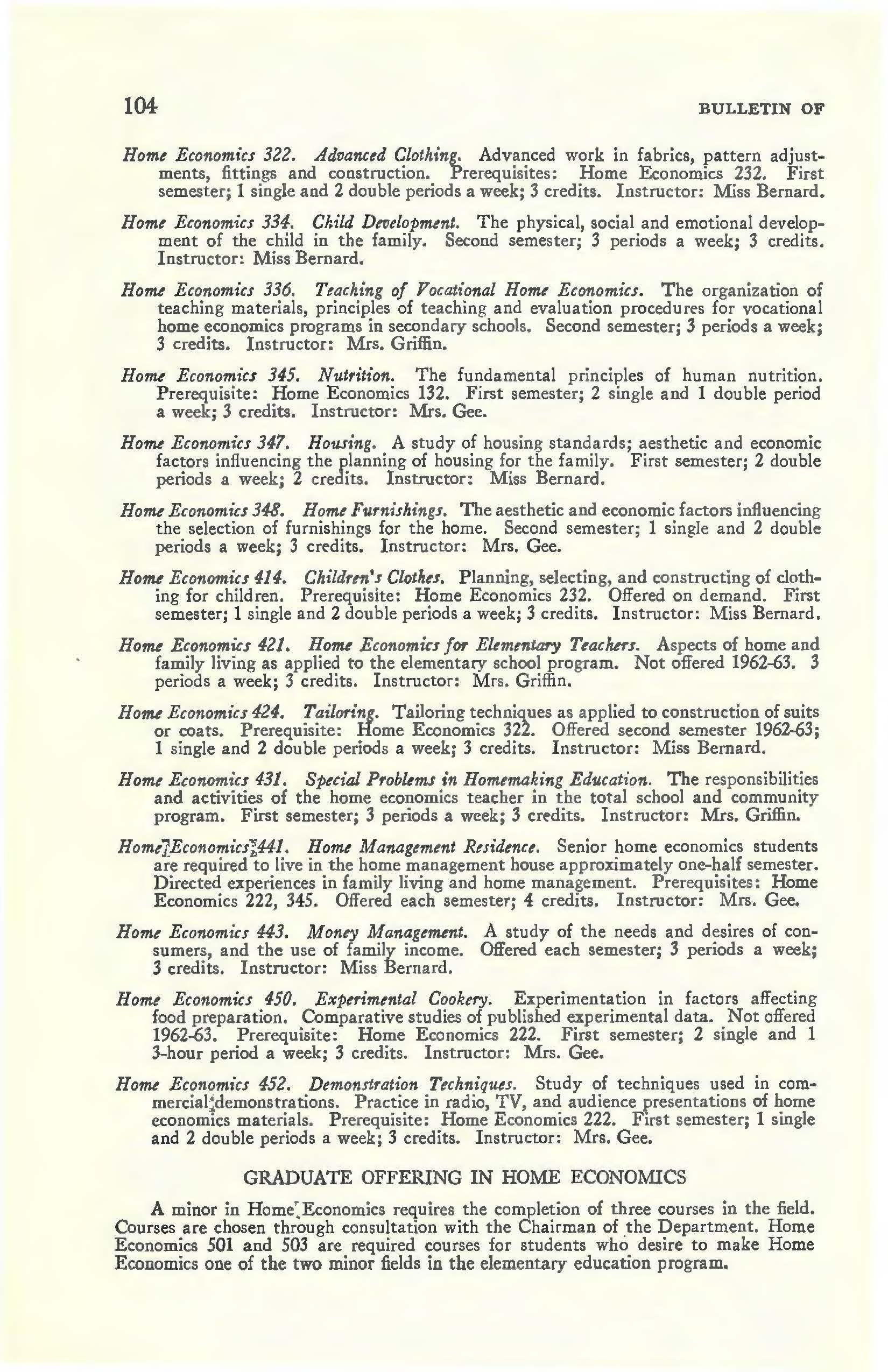
Home Economics 501. Home Economics in the Elementary School. A study of the various aspects of home and family life included in the program for elementary schools. Emphasis placed on family relations, housing, nutrition, appearance, health, and clothing needs as related to the child. Prerequisite: 3 semester hours in home economics; 3 credits. ~_,_ lnstructor: lMrs. Griffin.
Home Economics 503. Family Relations. A study of modern family life, the interpersonal relationships of family members. Emphasis is placed on the developmental stages in the life cycle of families. 3 credits. Instructor: Mrs. Griffin.
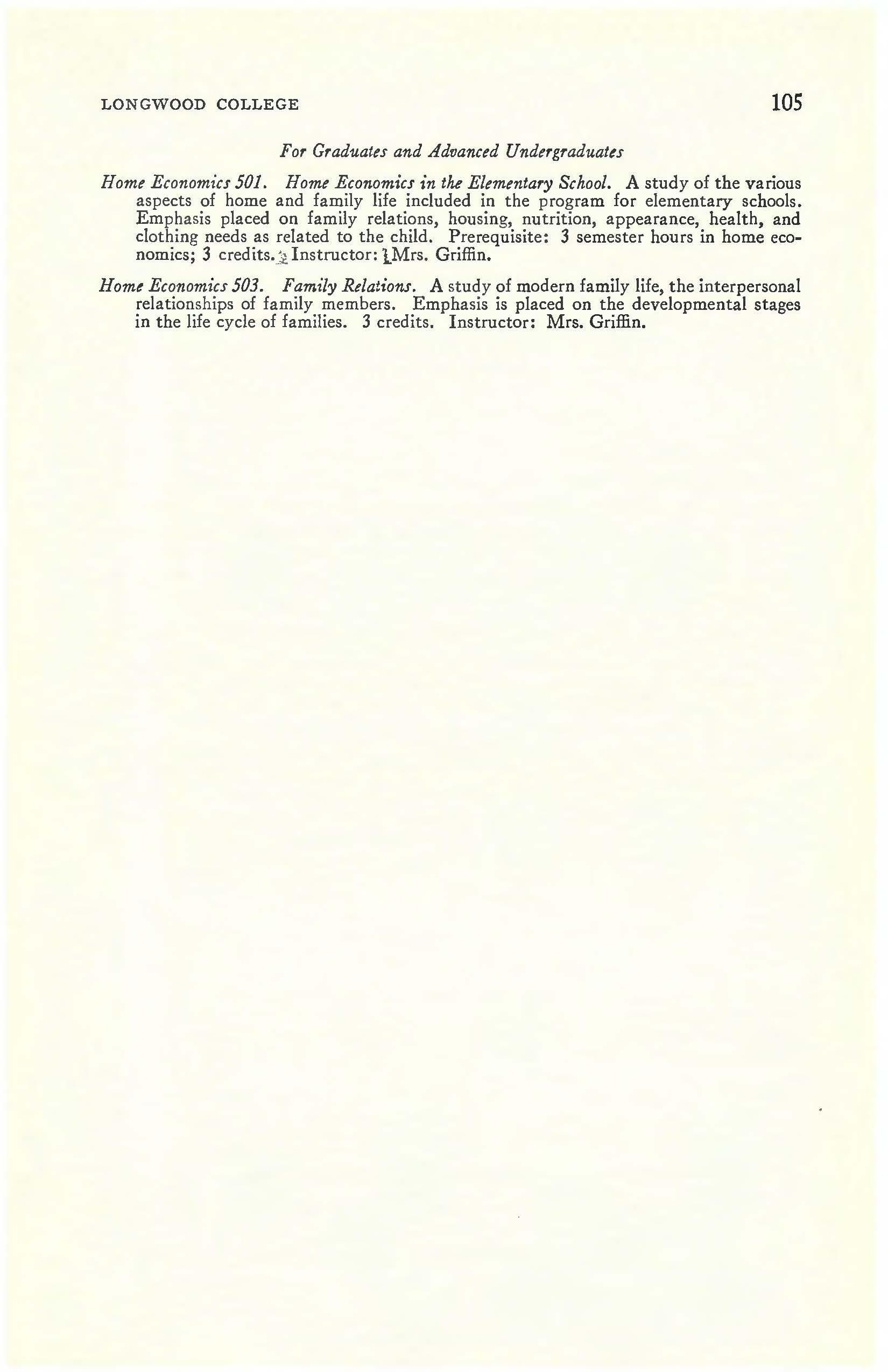
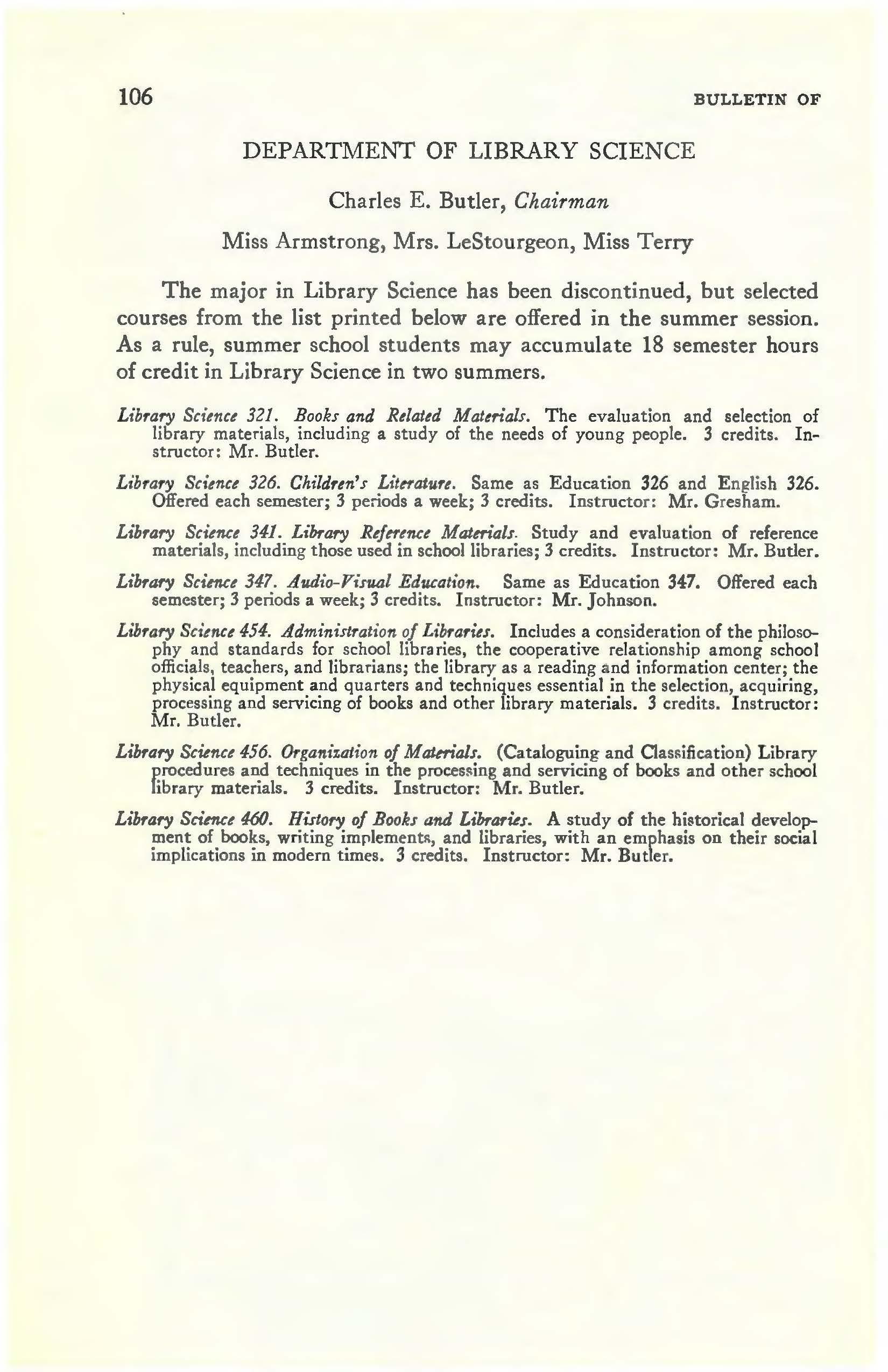 Charles E. Butler, Chairman Miss Armstrong, Mrs. LeStourgeon, Miss Terry
Charles E. Butler, Chairman Miss Armstrong, Mrs. LeStourgeon, Miss Terry
The major in Library Science has been discontinued, but selected courses from the list printed below are offered in the summer session. As a rule, summer school students may accumulate 18 semester hours of credit in Library Science in two summers.
Library Science 321. Books and Related Materials. The evaluation and selection of library materials, including a study of the needs of young people. 3 credits. Instructor: Mr. Butler.
Library Science 326. Children's Literature. Same as Education 326 and English 326. Offered each semester; 3 periods a week; 3 credits. Instructor: Mr. Gresham.
Library Science 341. Library Reference Materials. Study and evaluation of reference materials, including those used in school libraries; 3 credits. Instructor: Mr. Butler.
Library Science 347. Audio-Yisual Education. Same as Education 347. Offered each semester; 3 periods a week; 3 credits. Instructor: Mr. Johnson.
Library Science 454. Administration of Libraries. Includes a consideration of the philosophy and standards for school libraries, the cooperative relationship among school officials, teachers, and librarians; the library as a reading and information center; the physical equipment and quarters and techniques essential in the selection, acquiring, processing and servicing of books and other library materials. 3 credits. Instructor: Mr. Butler.
Library Science 456. O,gani:r.ation of Materials. (Cataloguing and Oassification) Library procedures and techniques in the processing and servicing of books and other school library materials. 3 credits. Instructor: Mr. Butler.
Library Science 460. History of Books and Libraries. A study of the historical development of books, writing implementR, and libraries, with an emphasis on their social implications in modern times. 3 credits. Instructor: Mr. Butler.
The Department of Mathematics offers two types of courses: (1) those designed to meet the needs of students who plan to teach in the elementary and secondary schools of the State: (2) those designed to provide the mathematics required of students for the B.A. degree and the B.S. degree.
A major in mathematics in the programs leading to teaching in the secondary schools requires a minimum of 24 semester hours as follows: Mathematics 161, 162 (or 155, 156), 345, 346, 447, 451, 460, and at least three credits from the following electives: Mathematics 231, 235, 342, 521, 525, 531, 543, 545, 546, 550.
A major in mathematics for the B.A. degree or the B.S. degree requires a minimum of 24 semester hours as follows: Mathematics 161, 162 (or 155, 156), 345, 346, 447, 460, and at least six credits from the following electives: Mathematics 231, 235, 342, 521, 525, 531, 543, 545, 546, 550.
Students majoring in mathematics are urged to elect general physics and other courses lending themselves to mathematical interpretations.
One and ·one-half units of high school credits in algebra and one unit in geometry are prerequisites for a major in mathematics in any curriculum.
Mathematics 123. Mathematics for Teachers in the Elementary School. The subject matter of arithmetic from the teacher's point of view; emphasis on meanings and understandings; social usage of certain topics; analysis and solution of problems. Both semesters; 3 periods a week; 3 credits. Required for the B.S. degree in Elementary Education. Instructor: Mrs. Magnifico.
Mathematics 155,156. Elements of College Mathematics. A correlation of the fundamental concepts of algebra, trigonometry, and analytic geometry. (Mathematics majors, science majors, and others desiring a course of a more comprehensive and rigorous nature should elect Mathematics 161, 162.) First and second semesters; 3 periods a week; 3 credits each semester. Instructors: The Staff.
Mathematics 161, 162. Fundamentals of College Mathematics. A close correlation of the essentials of algebra, trigonometry, analrtic geometry, and the elementary calculus, with emphasis upon the interrelation of the various branches of mathematics; applications of mathematics to other fields, including the physical sciences, engineering, and statistics. First and second semesters; 3 periods a week; 3 credits each semester. Instructor: Mrs. Badger.
Mathematics 221. Business Mathematics. Offered both semesters; 3 periods a week; 3 credits. Required for the degree of Bachelor of Science in Home Economics and the degree of Bachelor of Science in Business Education. Instructors: The Staff.
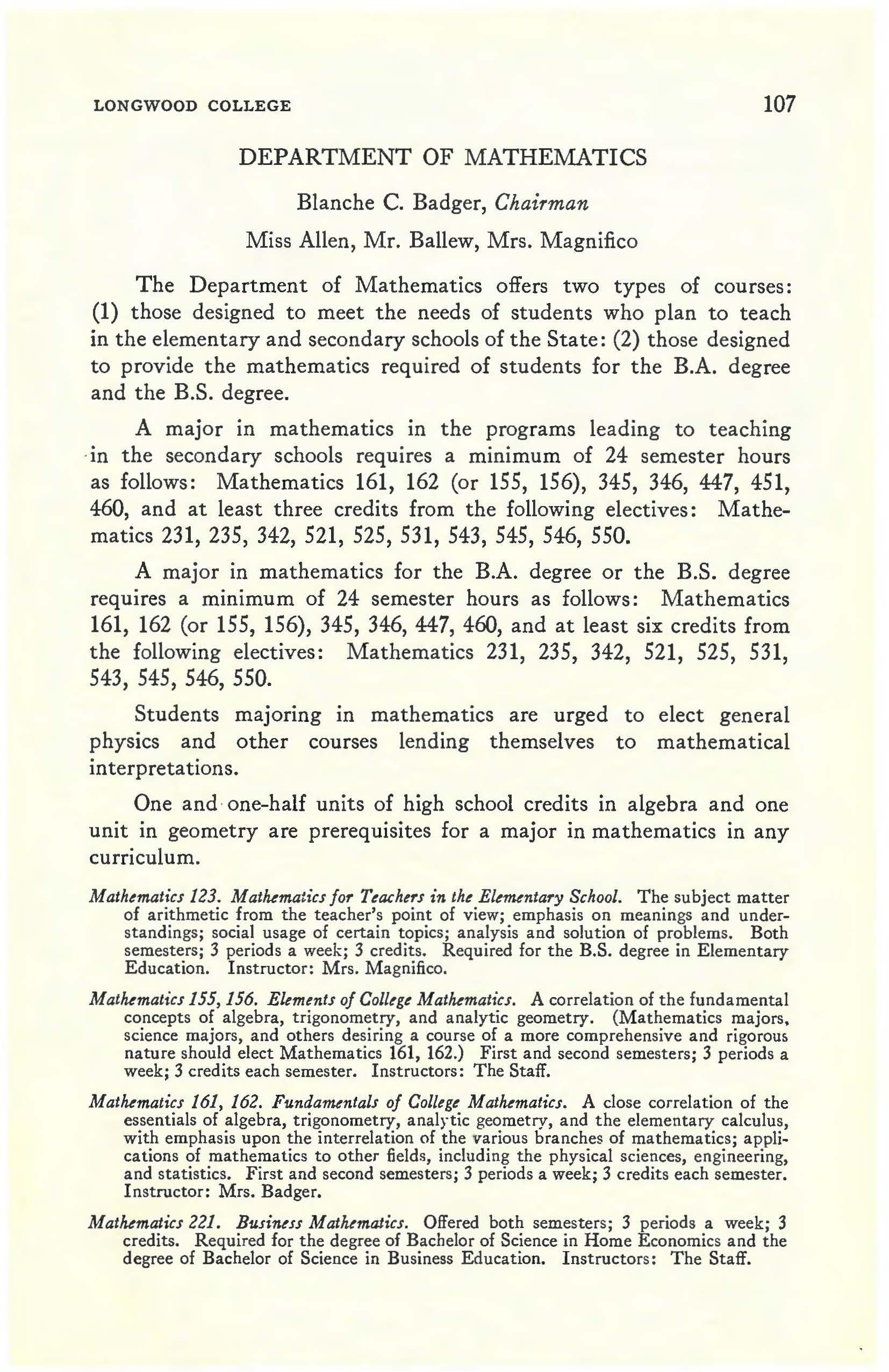
Mathematics 231. Analytic Geometry. First semester; 3 periods a week; 3 credits. Instructor: Mr. Ballew.
Mathematics 235. Advanced Geometry. An extension of elementary geometry with emphasis on contemporary geometry. Some theorems of historic interest will be considered, Alternate years. Offered second semester 1962-63; 3 periods a week; 3 credits. Instructor: Mr. Ballew.
Mathematics 323. Mathematics for Teachers in the Elementary School. A continuation of the subject matter of arithmetic from the teacher's point of view as described in Mathematics 123. Use is made of materials currently recommended by national groups to improve the mathematics curriculum. Offered each semester; 3 periods a week; 3 credits. Instructor: Mrs. Magnifico.
Mathematics 342. Advanced Algebra. Topics in traditional and modern algebra not considered in Mathematics 155 or 161. Alternate years. Offered second semester 1963-64; 3 periods a week; 3 credits. Instructor: Mr. Ballew,
Mathematics 345, 346. The Differential and Integral Calculus. First and second semesters; 3 periods a week; 3 credits each semester. Instructor: Mrs. Badger.
Mathematics 447. Advanced Calculus. Advanced topics in calculus not considered in Mathematics 345 or 346. Open to students who have completed a year's study of the calculus. First semester; 3 periods a week; 3 credits. Instructor: Miss Allen.
Mathematics 451. The Teaching of High School Mathematics. Alternate years. Offered first semester 1963-64; 3 periods a week; 3 credits. Instructor: Mrs. Magnifico.
Mathematics 460. Differential Equations. Primarily a study of ordinary differential equations of the first and second order with applications to elementary work in mechanics and physics. Second semester; 3 periods a week; 3 credits. Instructor: Miss Allen,
The Department of Mathematics offers a graduate minor in mathematics for teachers in the secondary school. One full year of differential and integral calculm is prerequisite for graduate study in mathematics. To meet the nine-hour requirement for a graduate minor three courses may be selected from those listed below.
Mathematics 521. Solid Analytic Geometry.
Mathematics 525. Statistics. Theory and practical applications of stat1st1cs. Alternate years. Offered first semester 1962-63; 3 credits. Instructor: Mrs, Magnifico.
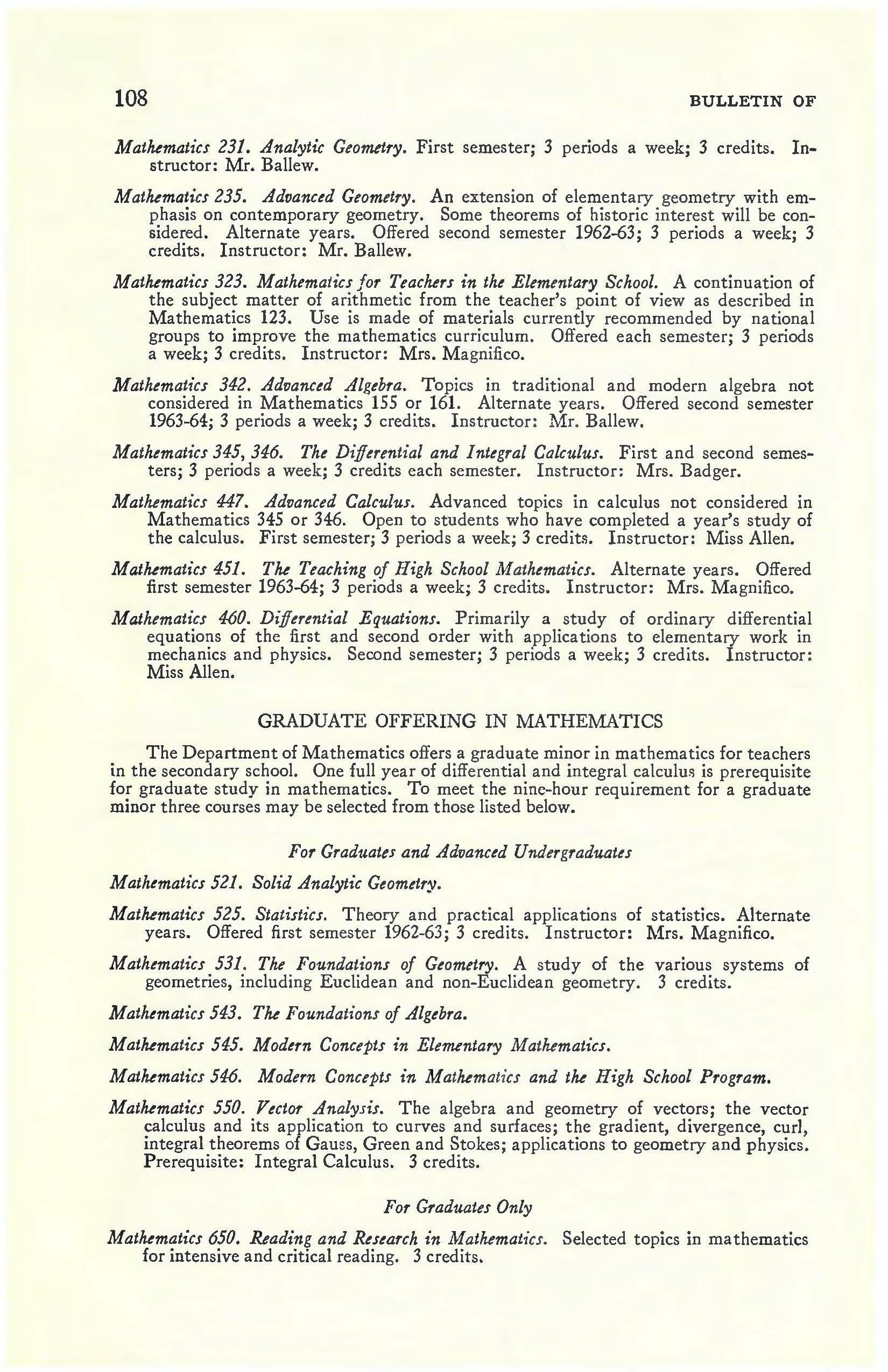
Mathematics 531. The Foundations of Geometry. A study of the various systems of geometries, including Euclidean and non-Euclidean geometry. 3 credits.
Mathematics 543. The Foundations of Algebra.
Mathematics 545. Modern Concepts in Elementary Mathematics.
Mathematics 546. Modern Concepts in Mathematics and the High School Program.
Mathematics 550. Yector Analysis. The algebra and geometry of vectors; the vector calculus and its application to curves and surfaces; the gradient, divergence, curl, integral theorems of Gauss, Green and Stokes; applications to geometry and physics, Prerequisite: Integral Calculus. 3 credits.
Mathematics 650. Reading and Research in Mathematics. Selected topics in mathematics for intensive and critical reading. 3 credits.
John W. Molnar, Chairman
Mr. Adams, Miss Clark, Miss Curnutt, Mr. McCombs, Mr. Olson, Miss Reilly, Mr. Smith
The 1962-63 course descrip tio ns of the Department of Music are presented in a separate Bulletin of the College. It will be sent on request and may be obtained by writing to the Dean of the College.

The required courses for the B.S. in Elementary Education are Music 128 (or Music 126 or Music 127), Music 129, and Music 226, 227. A student may obtain Advanced Standing in any or all of these courses upon the successful completion of examinations admin istered by the Department of Music.
Students enrolled in the B.A. degree who plan to major in music should enroll in Music 128, 129, and Music 177, 178 during their freshman year. A major in the B.A. degree program requires the following courses in addition to the above: Music 211-212; Music 311-312; completion of Music 478; Music 465, 466; plus sufficient electives in music to total 42 hours.
Students enrolled in the B.A. degree who plan to major in music with emphasis in sacred music should enroll in Music 128, 129, and Music 177, 178 in their freshman year. Such an emphasis requires the following: Music 211-212; Music 311-312; Music 276 (Piano); completion of Music 478 in either voice or organ, and Music 276 in the one not chosen for concentration; plus sufficient electives in music to total 42 hours.
Miss Burger, Mr. French, Mr. Jeffers, Mr. Lane, Mr. Neveu, Miss Siler, Miss Wells v q
The Department of Natural Sciences offers courses in astronomy, biology, chemistry, general science, geology, meteorology, and physics.
The aim of the Department is to prepare students to teach science in elementary and secondary schools and to equip them to carry on graduate study.
The work of the first year which is in most cases prereqms1te to further work in that field is designed to meet the science requirements in other curricula of the College.
A major may be taken in biology, chemistry, or general science. A student majoring in biology or chemistry shall have 24 semester hours in the primary field and 8 semester hours in a second field. The B.S. degree requires a year in a third science which is strongly recommended for majors in other curricula.
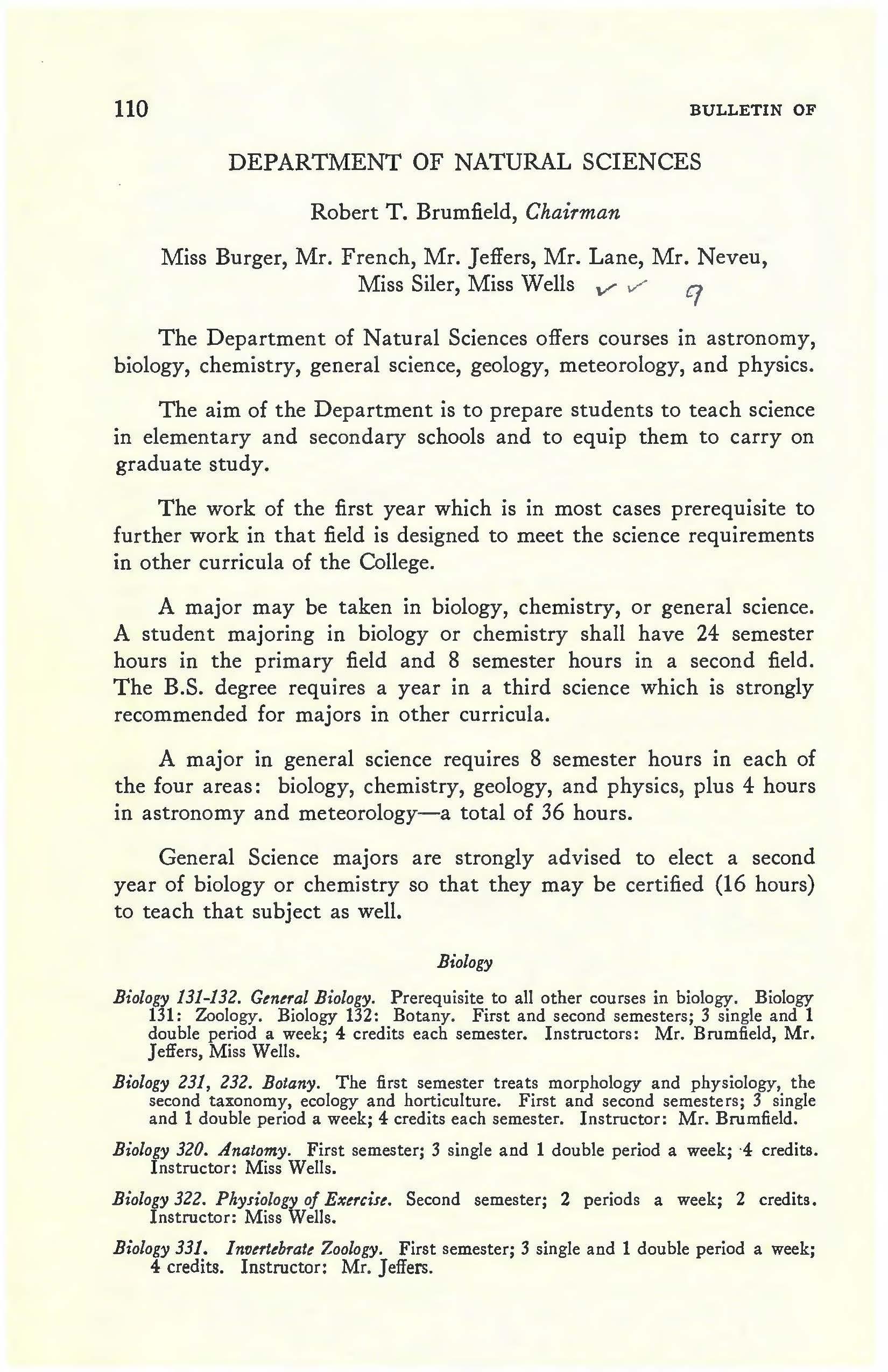
A major in general science requires 8 semester hours in each of the four areas: biology, chemistry, geology, and physics, plus 4 hours in astronomy and meteorology-a total of 36 hours.
General Science majors are strongly advised to elect a second year of biology or chemistry so that they may be certified (16 hours) to teach that subject as well.
Biology 131-132. General Biology. Prerequisite to all other courses in biology. Biology 131: Zoology. Biology 132: Botany. First and second semesters; 3 single and 1 double period a week; 4 credits each semester. Instructors: Mr. Brumfield, Mr. Jeffers, Miss Wells.
Biology 231, 232. Botany. The first semester treats morphology and physiology, the second taxonomy, ecology and horticulture. First and second semesters; 3 single and 1 double period a week; 4 credits each semester. Instructor: Mr. Brumfield.
Biology 320. Anatomy. First semester; 3 single and 1 double period a week; ·4 credits. Instructor: Miss Wells.
Biology 322. Physiology of Exercise. Second semester; 2 periods a week; 2 credits. Instructor: Miss Wells.
Biology 331. Inr1ertebrate Zoology. First semester; 3 single and 1 double period a week; 4 credits. Instructor: Mr. Jeffers.
Biology 332. Comparative Anatomy. Alternates with Biology 333. Offered second semester 1962-63; 2 single and 2 double periods a week; 4 credits. Instructor: Mr. Jeffers.
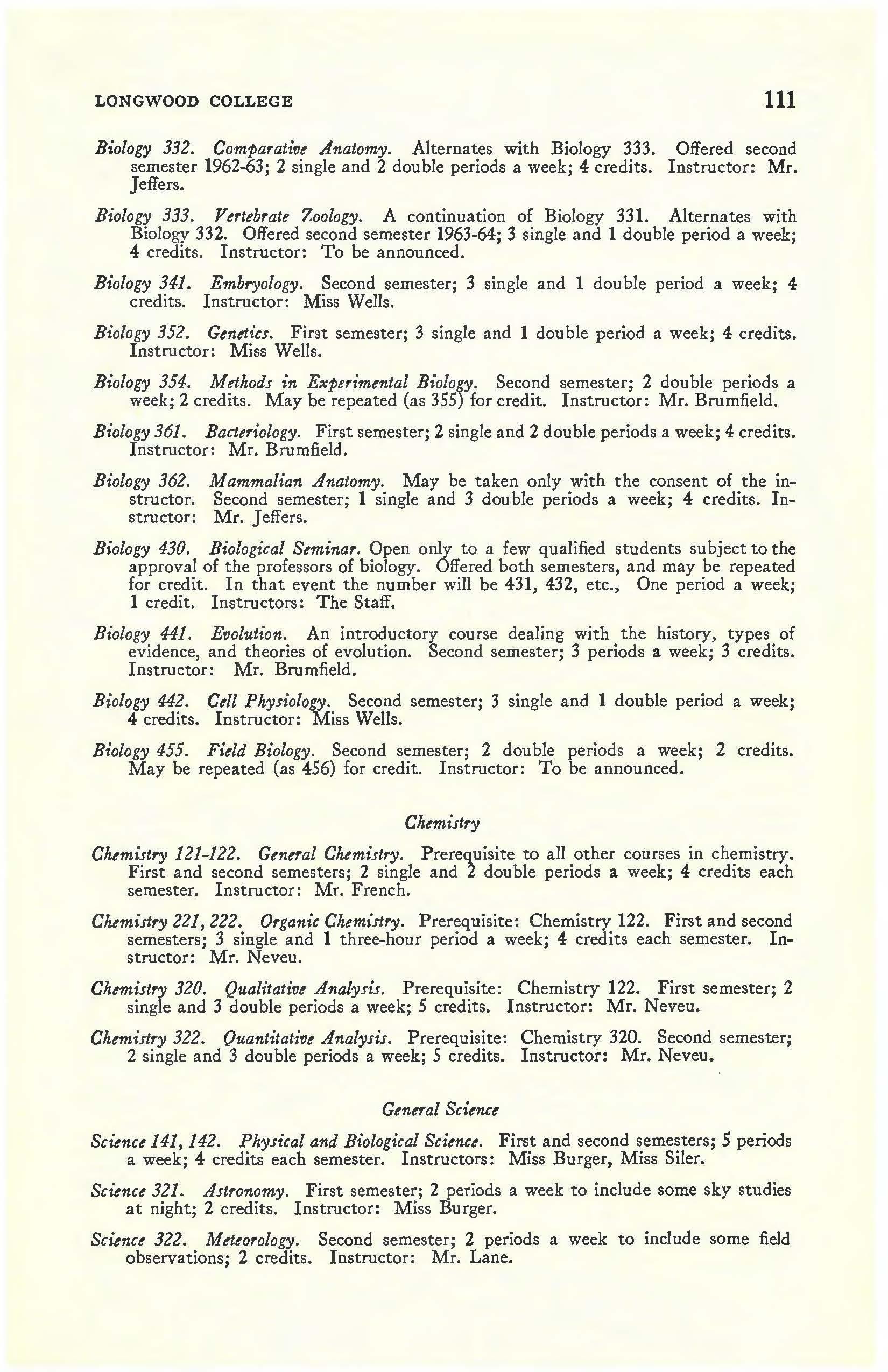
Biology 333. Yertebrate 7.oology. A continuation of Biology 331. Alternates with Biology 332. Offered second semester 1963-64; 3 single and 1 double period a week; 4 credits. Instructor: To be announced.
Biology 341. Embryology. Second semester; 3 single and 1 dou hie period a week; 4 credits. Instructor: Miss Wells.
Biology 352. Genetics. First semester; 3 single and 1 double period a week; 4 credits. Instructor: Miss Wells.
Biology 354. Methods in Experimental BiolottY· Second semester; 2 double periods a week; 2 credits. May be repeated (as 355) for credit. Instructor: Mr. Brumfield.
Biology 361. Bacteriology. First semester; 2 single and 2 double periods a week; 4 credits. Instructor: Mr. Brumfield.
Biology 362. Mammalian Anatomy. May be taken only with the consent of the instructor. Second semester; 1 single and 3 dou hie periods a week; 4 credits. Instructor: Mr. Jeffers.
Biology 430. Biological Seminar. Open only to a few qualified students subject to the approval of the professors of biology. Offered both semesters, and may be repeated for credit. In that event the number will be 431, 432, etc., One period a week; 1 credit. Instructors: The Staff.
Biology 441. Evolution. An introductory course dealing with the history, types of evidence, and theories of evolution. Second semester; 3 periods a week; 3 credits. Instructor: Mr. Brumfield.
Biology 442. Cell Physiology. Second semester; 3 single and 1 double period a week; 4 credits. Instructor: Miss Wells.
Biology 455. Field Biology. Second semester; 2 double periods a week; 2 credits. May be repeated (as 456) for credit. Instructor: To be announced.
Chemistry 121-122. General Chemistry. Prerequisite to all other courses in chemistry. First and second semesters; 2 single and 2 double periods a week; 4 credits each semester. Instructor: Mr. French.
Chemistry 221,222. Organic Chemistry. Prerequisite: Chemistry 122. First and second semesters; 3 single and 1 three-hour period a week; 4 credits each semester. Instructor: Mr. Neveu.
Chemistry 320. Qualitative Analysis. Prerequisite: Chemistry 122. First semester; 2 single and 3 double periods a week; 5 credits. Instructor: Mr. Neveu.
Chemistry 322. Quantitative Analysis. Prerequisite: Chemistry 320. Second semester; 2 single and 3 double periods a week; 5 credits. Instructor: Mr. Neveu.
Science 141, 142. Physical and Biological Science. First and second semesters; 5 periods a week; 4 credits each semester. Instructors: Miss Burger, Miss Siler.
Science 321. Astronomy. First semester; 2 periods a week to include some sky studies at night; 2 credits. Instructor: Miss Burger.
Science 322. Meteorology. Second semester; 2 periods a week to include some field observations; 2 credits. Instructor: Mr. Lane.
Science 342. Science for Elementary Teachers. Required for the B.S. degree in Elementary Education. Offered each semester; 4 periods a week; 4 credits. Instructor: Miss Burger.
Science 352. Science for Secondary Teachers. Second semester; 1 single and 2 double periods a week; 3 credits. Instructor: Miss Burger.
Geology 111. Elements of Geology (Physical). The origin of scenery or landforms, the classification of rocks and minerals, and the structure of the earth. First semester; 3 single and 1 double period a week; 4 credits. Instructor: Mr. Lane.
Geology 112. Elements of Geology (Historical). Geography of the past dealing with the plants and animals of pre-historic time. Second semester; 3 single and 1 double period a week; 4 credits. Instructor: Mr. Lane.
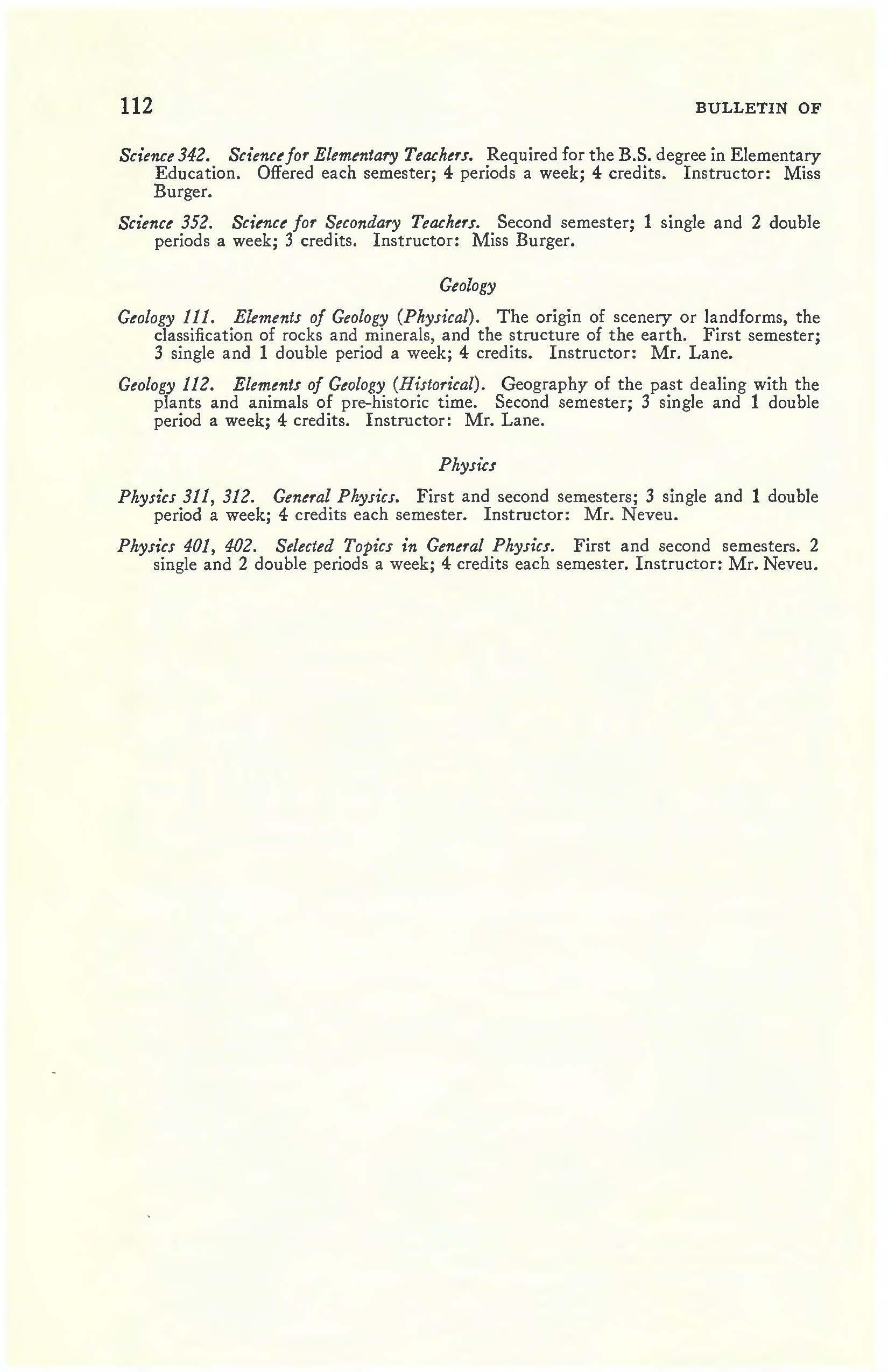
Physics 311, 312. General Physics. First and second semesters; 3 single and 1 double period a week; 4 credits each semester. Instructor: Mr. Neveu.
Physics 401, 4()2. Selected Topics in General Physics. First and second semesters. 2 single and 2 double periods a week; 4 credits each semester. Instructor: Mr. Neveu.
Mrs. Bobbitt, Miss Brockenbrough, Mrs. Harriss, Mrs. Landrum
The Department has a two-fold purpose: first, to provide professional courses in physical and health education that will prepare students to teach Physical Education in the elementary schools, high schools and colleges, and Health Education in elementary and high schools; second, to provide opportunity for all students to engage in developmental and recreational activities.
A regulation suit is required in all activity courses. The suits are purchased through the College. See page 44.
The swimming pool will be open to students at certain hours for recreational purposes. Those desiring this privilege must register at the swimming pool office and wear the regulation swimming suit.
All students are required to pass a beginner's swimming test or a course in swimming before the end of the junior year and two years of activity courses in Physical Education, unless excused by the College Physician.
A degree of Bachelor of Science with a major in Physical Education requires 30 semester hours. Required courses are: Physical Education 102, 103, 137, 202, 203, 212, 232, 250, 302, 303, 322, 329, 339, 340, 353, 354, 360, and 402; Health Education 239, 342, and 343. Physical Education 214, 321, 328, 330 are recommended as electives.
Students with a major in Physical Education who have not had a course in physiology and anatomy are required to take Biology 320, 322, as prerequisites for Physical Education 339.
It is desirable for the teacher of Physical Education or a worker in the field of recreation to have ability in music, dancing, handcrafts, camping and various sports. It is recommended that they enroll in Music 193. (Piano.)
All students with a major in Physical Education are expected to participate in the intramural program offered by the Athletic Association and the May Day festival.
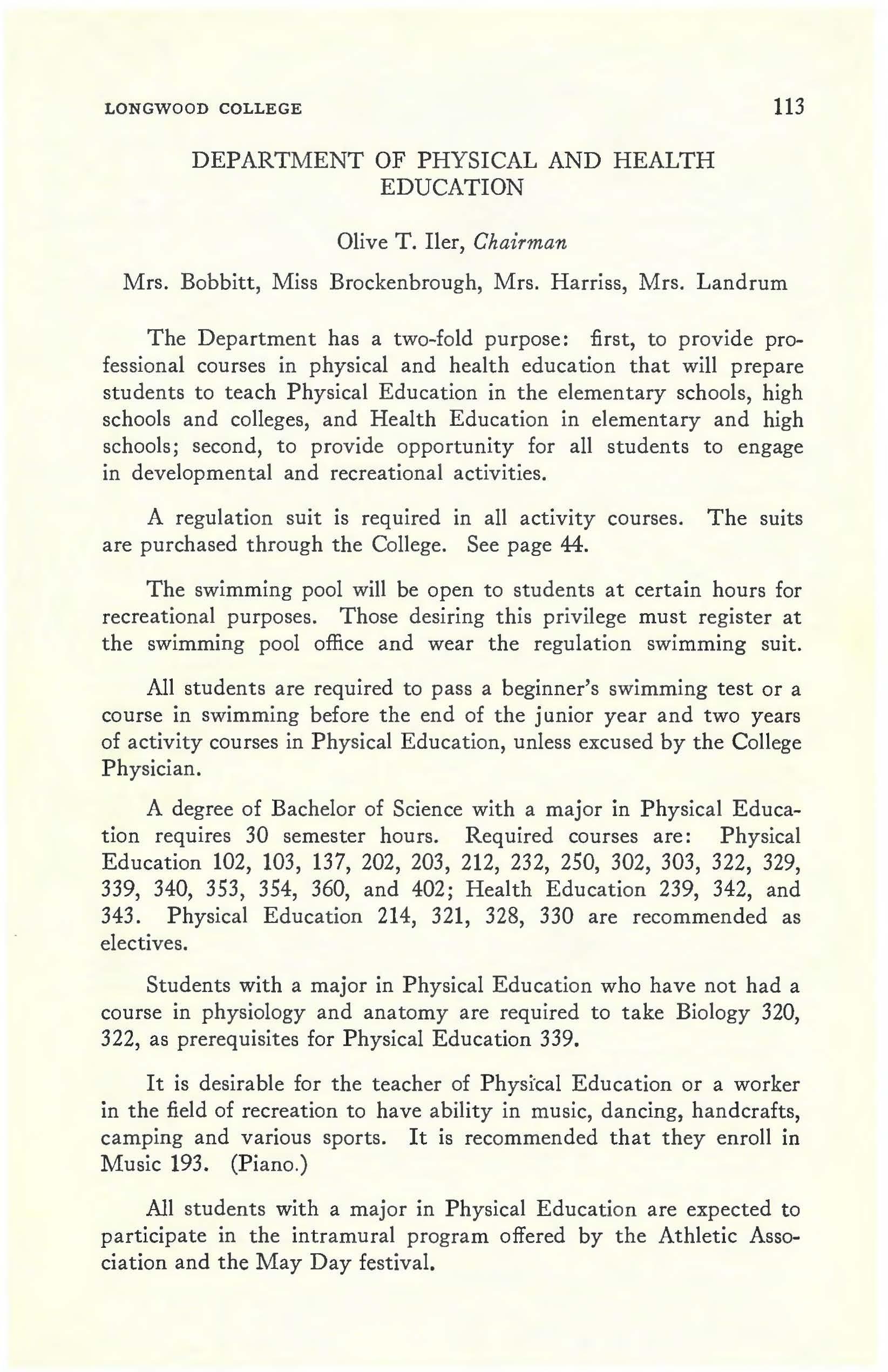
Physical Education 102-103. Basic Techniques. Techniques of act1v1t1es basic to the physical education and recreation programs; hockey, golf, folk dancing, gymnastics, stunts and tumbling, archery. Required of all physical education majors. Offered first and second semesters 1962-63; 2 periods a week; ½ credit each semester. Instructors: The Staff.
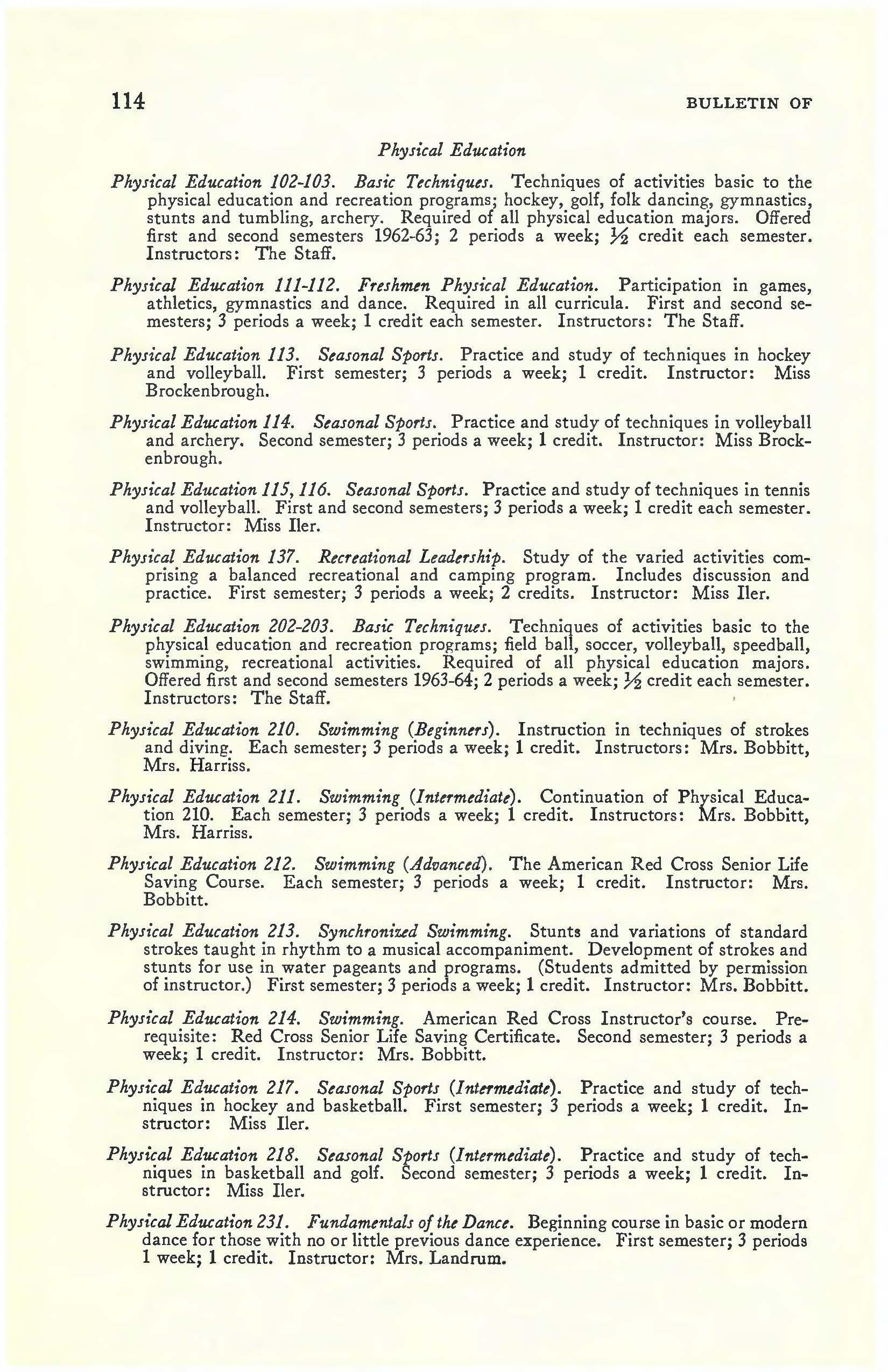
Physical Education 111-112. Freshmen Physical Education. Participation in games, athletics, gymnastics and dance. Required in all curricula. First and second semesters; 3 periods a week; 1 credit each semester. Instructors: The Staff.
Physical Education 113. Seasonal Sports. Practice and study of techniques in hockey and volleyball. First semester; 3 periods a week; 1 credit. Instructor: Miss Brockenbrough.
Physical Education 114. Seasonal Sports. Practice and study of techniques in volleyball and archery. Second semester· 3 periods a week· 1 credit. Instructor: Miss Brockenbrough.
Physical Education 115,116. Seasonal Sports. Practice and study of techniques in tennis and volleyball. First and second semesters; 3 periods a week; 1 credit each semester. Instructor: Miss Iler.
Physical Education 137. Recreational Leadership. Study of the varied activities comprising a balanced recreational and camping program. Includes discussion and practice. First semester; 3 periods a week; 2 credits. Instructor: Miss Iler.
Physical Education 202-203. Basic Techniques. Techniques of activities basic to the physical education and recreation programs; field ball, soccer, volleyball, speedball, swimming, recreational activities. Required of all physical education majors. Offered first and second semesters 1963-64; 2 periods a week; ½ credit each semester. Instructors: The Staff.
Physical Education 210. Swimming (Beginners). Instruction in techniques of strokes and diving. Each semester; 3 periods a week; 1 credit. Instructors: Mrs. Bobbitt, Mrs. Harriss.
Physical Education 211. Swimming (Intermediate). Continuation of Physical Education 210. Each semester; 3 periods a week; 1 credit. Instructors: Mrs. Bobbitt, Mrs. Harriss.
Physical Education 212. Swimming (Ad'Oanced). The American Red Cross Senior Life Saving Course. Each semester; 3 periods a week; 1 credit. Instructor: Mrs. Bobbitt.
Physical Education 213. Synchroniud Swimming. Stunts and variations of standard strokes taught in rhythm to a musical accompaniment. Development of strokes and stunts for use in water pageants and programs. (Students admitted by permission of instructor.) First semester; 3 periods a week; 1 credit. Instructor: Mrs. Bobbitt.
Physical Education 214. Swimming. American Red Cross Instructor's course. Prerequisite: Red Cross Senior Life Saving Certificate. Second semester; 3 periods a week; 1 credit. Instructor: Mrs. Bobbitt.
Physical Education 217. Seasonal Sports (Intermediate). Practice and study of techniques in hockey and basketball. First semester; 3 periods a week; 1 credit. Instructor: Miss Iler.
Physical Education 218. Seasonal Sports (Intermediate). Practice and study of techniques in basketball and golf. Second semester; 3 periods a week; 1 credit. Instructor: Miss Iler.
Physical Education 231. Fundamentals of the Dance. Beginning course in basic or modern dance for those with no or little previous dance experience. First semester; 3 periods 1 week; 1 credit. Instructor: Mrs. Landrum.
Physical Education 232. Modern Dance. Intermediate course in modern dance for the student who has acquired a vocabulary of movement. Prerequisite: Physical Education 231 or upon recommendation of instructor. Second semester; 3 periods a week; 1 credit. Instructor: Mrs. Landrum.
Physical Education 250. History and Principles of Physical Education. Historical survey of the field of physical and health education; present day trends and practices; theoretical concepts and underlying principles. Alternate years. OJfered_second semester 1963-64; 2 periods a week; 2 credits. Instructor: Miss Iler.
Physical Education 302-303. Basic Techniques. Techniques of activities basic to the physical education and recreation programs; tennis, social dance, basketball, field and track, softball. Required of all physical education majors. Offered first and second semesters 1964-65; 2 periods a week; ½ credit each semester. Instructors: The Staff.
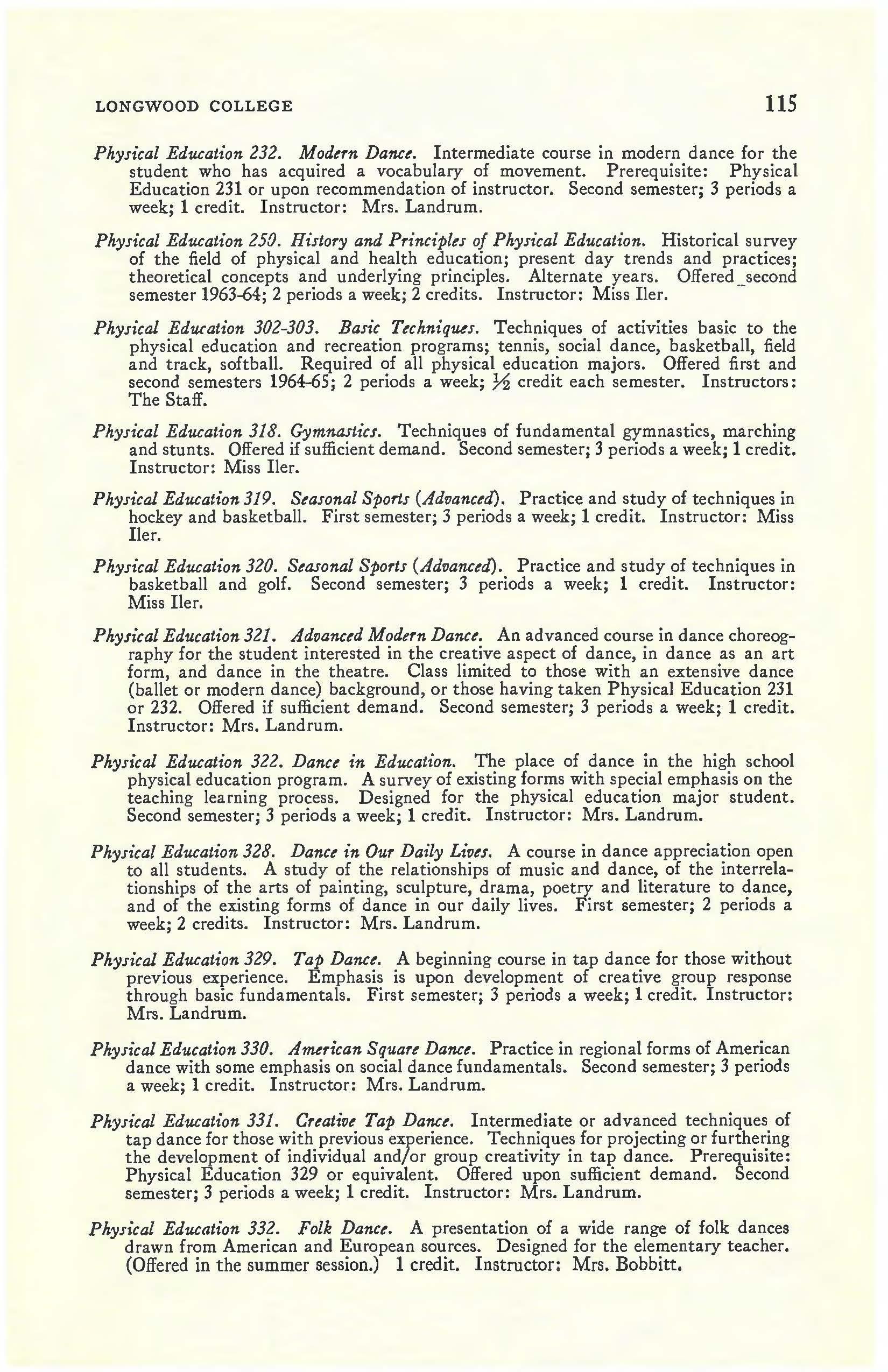
Physical Education 318. Gymnastics. Techniques of fundamental gymnastics, marching and stunts. Offered if sufficient demand. Second semester; 3 periods a week; 1 credit. Instructor: Miss Iler.
Physical Education 319. Seasonal Sports (Advanmf). Practice and study of techniques in hockey and basketball. First semester; 3 periods a week; 1 credit. Instructor: Miss Iler.
Physical Education 320. Seasonal Sports (Advancea). Practice and study of techniques in basketball and golf. Second semester; 3 periods a week; 1 credit. Instructor: Miss Iler.
Physical Education 321. Advanced Modern Dance. An advanced course in dance choreography for the student interested in the creative aspect of dance, in dance as an art form, and dance in the theatre. Class limited to those with an extensive dance (ballet or modern dance) background, or those having taken Physical Education 231 or 232. Offered if sufficient demand. Second semester; 3 periods a week; 1 credit. Instructor: Mrs. Landrum.
Physical Education 322. Dance in Education. The place of dance in the high school physical education program. A survey of existing forms with special emphasis on the teaching learning process. Designed for the physical education major student. Second semester; 3 periods a week; 1 credit. Instructor: Mrs. Landrum.
Physical Education 328. Dance in Our Daily Lives. A course in dance appreciation open to all students. A study of the relationships of music and dance, of the interrelationships of the arts of painting, sculpture, drama, poetry and literature to dance, and of the existing forms of dance in our daily lives. First semester; 2 periods a week; 2 credits. Instructor: Mrs. Landrum.
Physical Education 329. Tap Dance. A beginning course in tap dance for those without previous experience. Emphasis is upon development of creative group response through basic fundamentals. First semester; 3 periods a week; 1 credit. Instructor: Mrs. Landrum.
Physical Education 330. American Square Dance. Practice in regional forms of American dance with some emphasis on social dance fundamentals. Second semester; 3 periods a week; 1 credit. Instructor: Mrs. Landrum.
Physical Education 331. Creative Tap Dance. Intermediate or advanced techniques of tap dance for those with previous experience. Techniques for projecting or furthering the development of individual and/or group creativity in tap dance. Prerequisite: Physical Education 329 or equivalent. Offered upon sufficient demand. Second semester; 3 periods a week; 1 credit. Instructor: Mrs. Landrum.
Physical Education 332. Folk Dance. A presentation of a wide range of folk dances drawn from American and European sources. Designed for the elementary teacher. (Offered in the summer session.) 1 credit. Instructor: Mrs. Bobbitt.
Physical Education 339. Kinesiology. Development of the understanding of the factors involved in scientific analysis of movement, and a study of the various methods of approaching the solving of motor problems in physical education. Prerequisites: Biology 320, 322. First semester; 3 periods a week; 3 credits. Instructor: Mrs. Landrum.
Physical Education 340. The Body Mechanics, Adapted and Corrective Physical Education Program. Analysis of teaching body mechanics in a general program of physical education, study and analysis of an adapted program within the physical education program, and development of procedures for a corrective physical education program. Prerequisites: Physical Education 339 and Biology 322. Second semester; 3 periods a week; 2 credits. Instructor: Mrs. Landrum.
Physical Education 349. Games and Rhythms for the Elementary School. Practice and theory in games and rhythms adapted to the elementary school curriculum. Open only to experienced teachers. (Offered in the summer session.) 3 credits. Instructor: Mrs. Bobbitt.
Physical Education 353-354. Principles and Procedures of Teaching Physical Education in Junior and Senior High Schools. Physical education principles and activities for junior and senior high school girls. First and second semesters; 2 single and 1 laboratory period a week; 2 credits each semester. Instructor: Miss Iler.
Physical Education 360. Physical Education in the Elementary Schools. Physical Education principles and activities for the elementary school. Required for the R.S. Degree in Elementary Education. Prerequisite: Physical Education 111-112. Offered each semester; 5 periods a week; 2 credits. Instructor: Miss Brockenbrough.
Physical Education 402. Organization and Administration of Physical Education. Problems and procedures in physical education, with special emphasis on the Virginia program. Second semester; 3 periods a week; 2 credits. Instructor: Miss Iler.
Health Education 239. First Aid, Safety and Driver Education. Meets the requirement of basic American Red Cross courses in first aid and accident prevention; certificates are issued to those who complete the course. Second semester; 4 periods a week; 3 credits. Instructor: Miss Brockenbrough.
Health Education 341. Personal Health. This course is planned to build an understanding of health factors appropriate to college and adult living, including health guidance in relations to the home, school and community. Each semester; 2 periods a week; 2 credits. Instructors: Miss Brockenbrough, Mrs. Bobbitt, Mrs. Harriss.
Health Education 342. Methods and Materials of Teaching Health in the Elementary and Secondary Schools. Study of aims, methods and materials for health education instruction and guidance in the elementary and secondary schools. Prerequisite: Health Education 341. Alternate years. Offered first semester 1963-64; 2 periods a week; 2 credits. Instructor: Miss Brockenbrough.
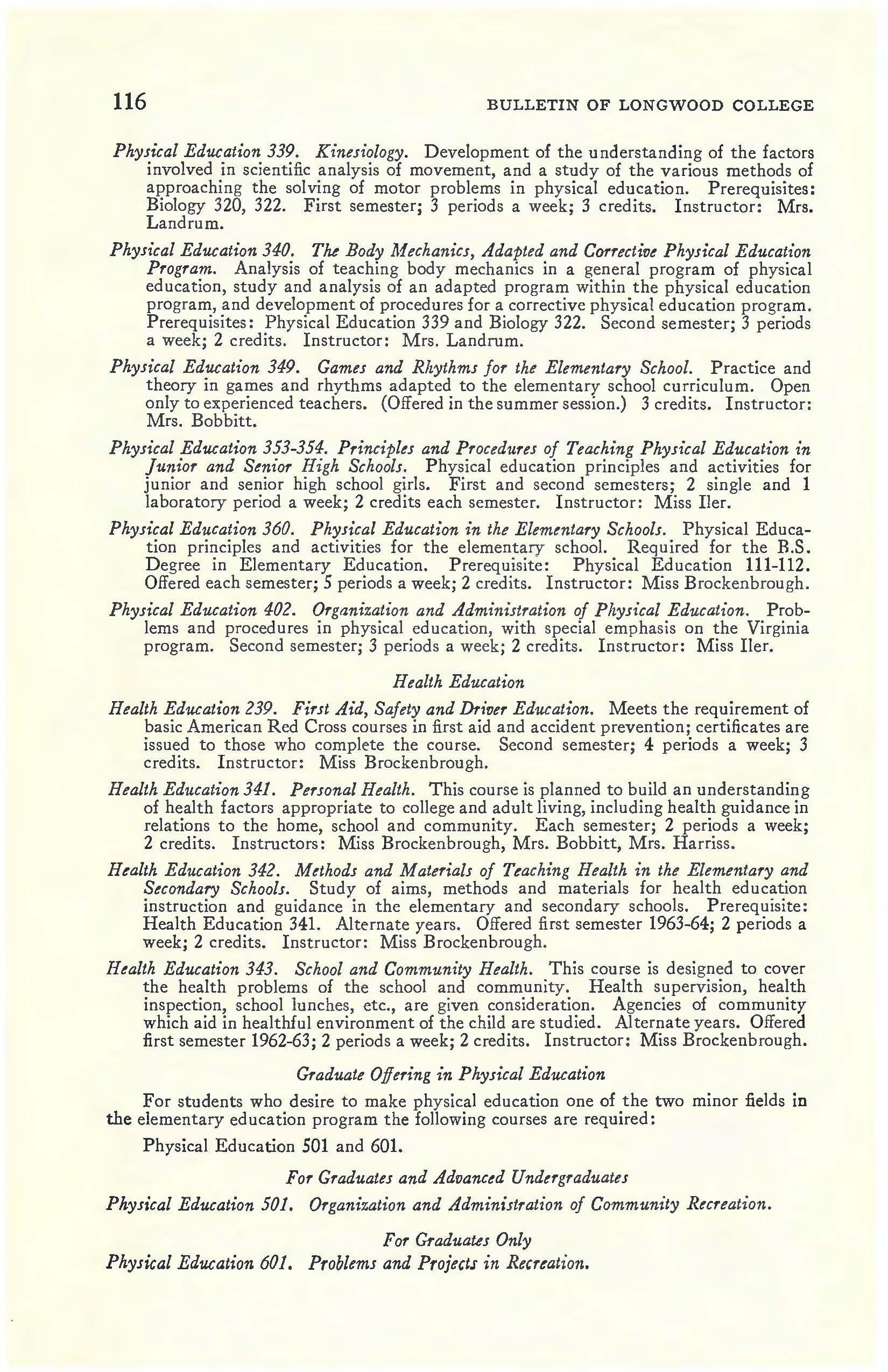
Health Education 343. School and Community Health. This course is designed to cover the health problems of the school and community. Health supervision, health inspection, school lunches, etc., are given consideration. Agencies of community which aid in healthful environment of the child are studied. Alternate years. Offered first semester 1962-63; 2 periods a week; 2 credits. Instructor: Miss Brockenbrough.
For students who desire to make physical education one of the two minor fields in the elementary education program the following courses are required: Physical Education 501 and 601.
For Graduates and Advanced Undergraduates
Physical Education 501. Organization and Administration of Community Recreation.
For Graduates Only
Physical Education 601. Problems and Projecti in Recreation.
The Alumnae Association serves both the College and its former students. It keeps the alumnae informed of the activities of the College and keeps the College informed as to the problems and needs of the alumnae. The Association is a kind of clearing house through which the alumnae and the College can work together to their mutual benefit. It also serves to keep former students of the College interested in one another by organizing them into local associations and bringing them back to the College on specia l occasions.
The Association operates in many ways. It keeps a record of former students, holds reunions, aids worthy students through the Fraser Memorial Loan Fund, Cunningham Memorial Loan Fund, J. L. Jarman Loan Fund, Mary White Cox Memorial Loan Fund, and Jennie Masters Tabb Memorial Fund, and organizes local chapters of alumnae in counties and cities. It makes available the College news through The Rotunda, the weekly publication of the College, and the Alumnae Magazine, and brings to the attention of the College the achievements and needs of individual alumnae. It holds an annual meeting at the College on Founders Day in March.
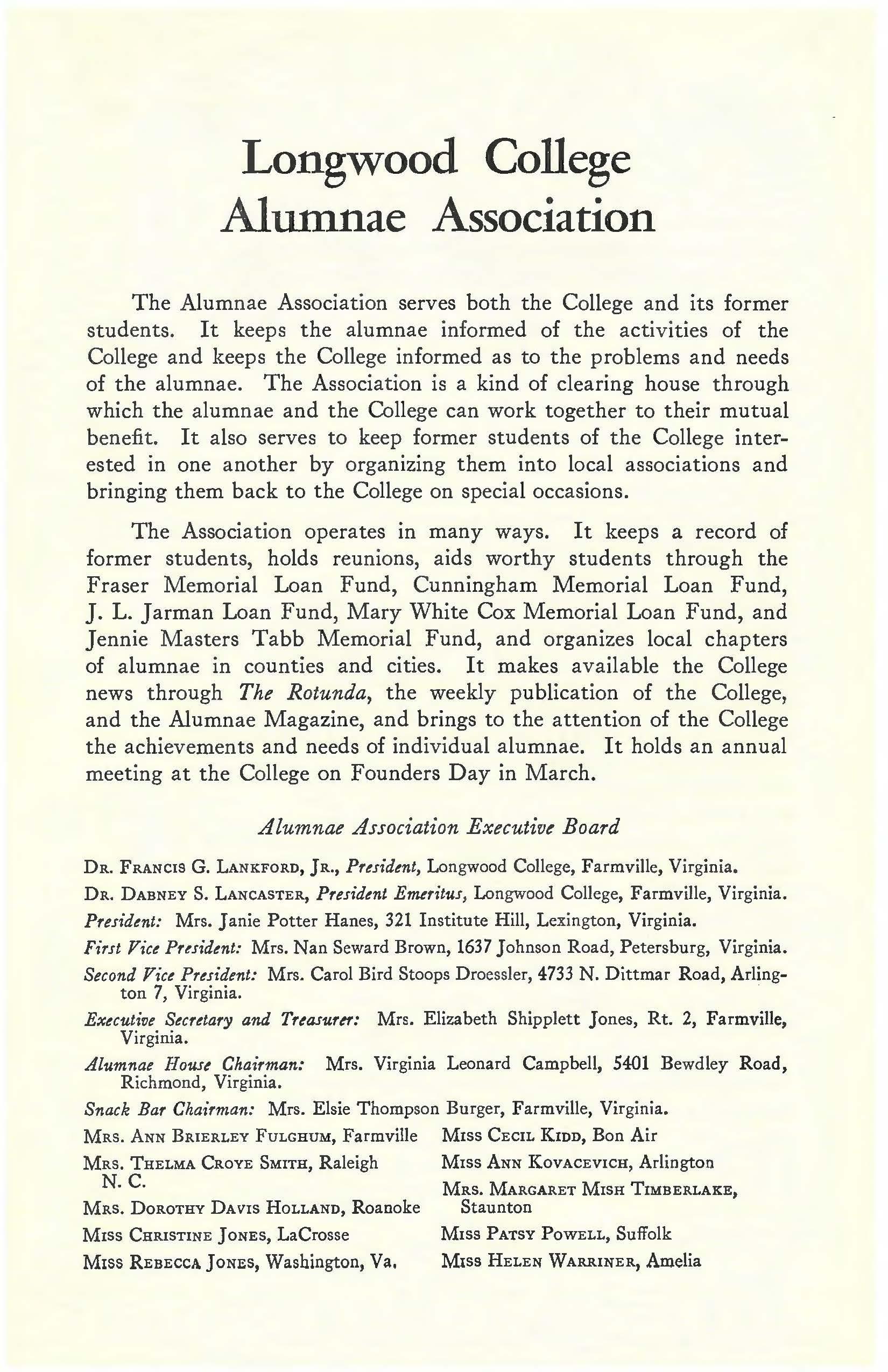
DR. FRANCIS G. LANKFORD, JR., President, Longwood College, Farmville, Virginia, DR. DABNEY S. LANCASTER, President Emeritus, Longwood College, Farmville, Virginia. President: Mrs. Janie Potter Hanes, 321 Institute Hill, Lexington, Virginia.
First Vice President: Mrs. Nan Seward Brown, 1637 Johnson Road, Petersburg, Virginia.
Second Vice President: Mrs. Carol Bird Stoops Droessler, 4733 N. Dittmar Road, Arlington 7, Virginia.
Executive Secretary and Treasurer: Mrs. Elizabeth Shipplett Jones, Rt. 2, Farmville, Virginia.
Alumnae Howe Chairman: Mrs. Virginia Leonard Campbell, 5401 Bewdley Road, Richmond, Virginia.
Snack Bar Chairman: Mrs. Elsie Thompson Burger, Farmville, Virginia.
MRs. ANN BRIERLEY FuLGHUM, Farmville
MRs. THELMA CRoYE SMITH, Raleigh N.C.
MRs. DoROTHY DAVIS HOLLAND, Roanoke
Mrss CHRISTINE JONES, La Crosse
M1ss REBECCA JONES, Washington, Va,
Mrss CECIL KIDD, Bon Air
Miss ANN KovACEVICH, Arlington
MRs. MARGARET M1sH TIMBERLAKE, Staunton
Miss PATSY PowELL, Suffolk
Mrss HELEN WARRI:NER1 Amelia
MRs. MARGARET YouNG MILLINER, Onley, Va.
MRs. GRACE SCALES EVANS, Rt. 2, Fredrick Road, Ellicott City, Md.
MRs. MARGARET LAWRENCE GRAYSON, Roanoke St., Blacksburg, Va.
MRS. FRANCES ARMENTROUT IRwrn, 1654 Sterling Road, Charlotte, N. C.
Miss ELLEN MINOR JoNES, Clifton Forge, Va.
MRS. RuTH CooK EvANS, 327 Hawthorne St., Covington, Va.
Miss MARY GEORGE BoLEN, Culpeper, Va.
MRS. KATHRYN GRACE KAPPES B1sHOP, 220 Robertson Ave., Danville, Va.
MRS. EMMA RuTH WEBB WATKINS, 304 Battery Ave., Emporia, Va.
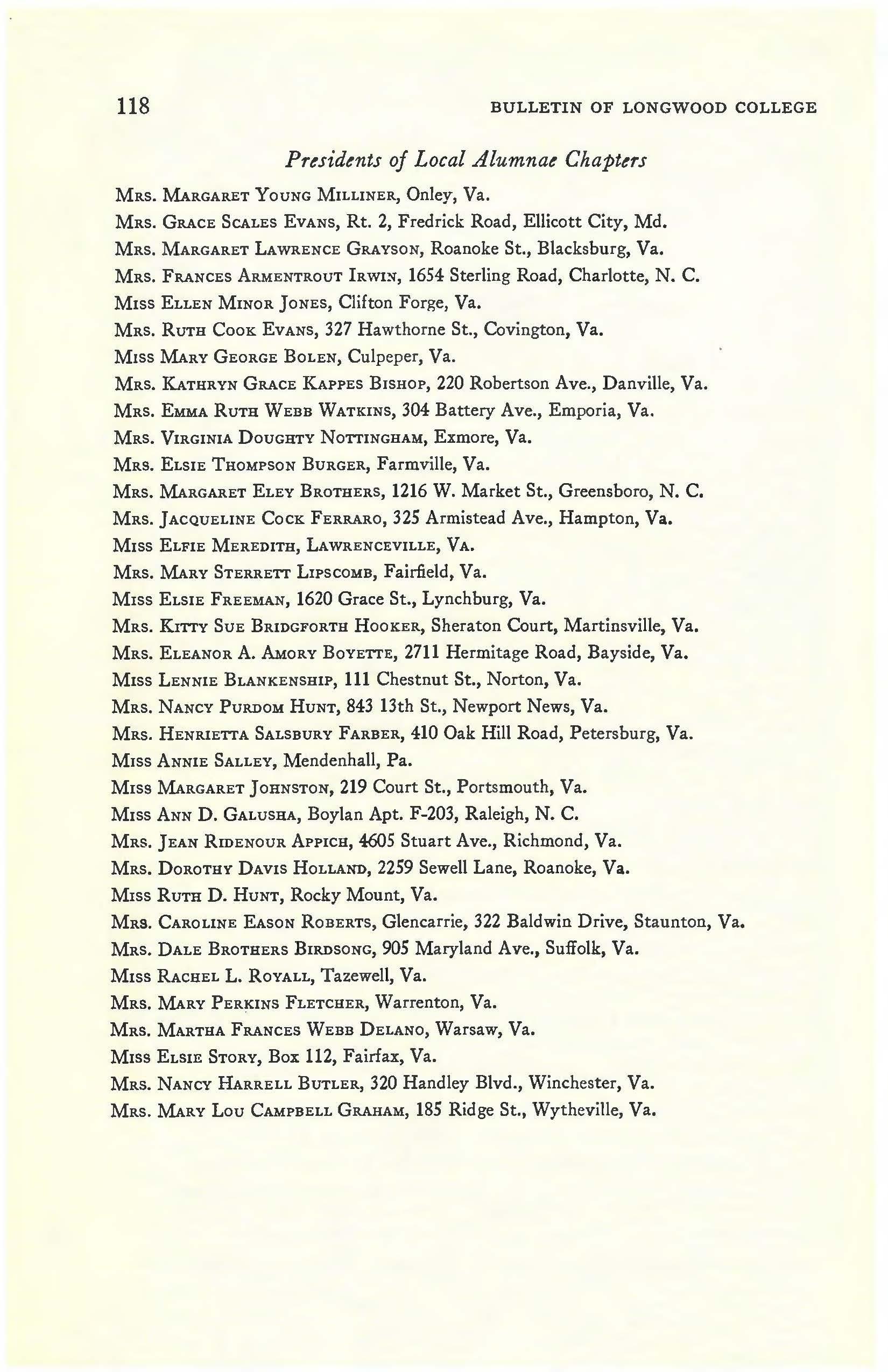
MRS. VIRGINIA DouGHTY NoTTINGHAM, Exmore, Va.
MRS. ELSIE THOMPSON BURGER, Farmville, Va.
MRs. MARGARET ELEY BROTHERS, 1216 W. Market St., Greensboro, N. C.
MRs. JACQUELINE CocK FERRARO, 325 Armistead Ave., Hampton, Va.
Miss ELFIE MEREDITH, LAWRENCEVILLE, VA.
MRs. MARY STERRETT LIPSCOMB, Fairfield, Va.
Miss ELSIE FREEMAN, 1620 Grace St., Lynchburg, Va.
MRs. KITTY SuE BRIDGFORTH HooKER, Sheraton Court, Martinsville, Va.
MRs. ELEANOR A. AMoRY BoYETTE, 2711 Hermitage Road, Bayside, Va.
Miss LENNIE BLANKENSHIP, 111 Chestnut St., Norton, Va.
MRs. NANCY PURDOM HuNT, 843 13th St., Newport News, Va.
MRs. HENRIETTA SALSBURY FARBER, 410 Oak Hill Road, Petersburg, Va.
Miss ANNIE SALLEY, Mendenhall, Pa.
Miss MARGARET JOHNSTON, 219 Court St., Portsmouth, Va.
Miss ANN D. GALUSHA, Boylan Apt. F-203, Raleigh, N. C.
MRs. JEAN RIDENOUR APPICH, 4605 Stuart Ave., Richmond, Va.
MRs. DoROTHY DAVIS HoLLAND, 2259 Sewell Lane, Roanoke, Va.
Miss RuTH D. HuNT, Rocky Mount, Va.
MRS. CAROLINE EASON ROBERTS, Glencarrie, 322 Baldwin Drive, Staunton, Va,
MRS. DALE BROTHERS BIRDSONG, 905 Maryland Ave., Suffolk, Va.
Miss RACHELL. RoYALL, Tazewell, Va.
MRs. MARY PERKINS FLETCHER, Warrenton, Va.
MRs. MARTHA FRANCES WEBB DELANO, Warsaw, Va.
Miss ELSIE STORY, Box 112, Fairfax, Va.
MRs. NANCY HARRELL BuTLER, 320 Handley Blvd., Winchester, Va.
MRs. MARY Lou CAMPBELL GRAHAM, 185 Ridge St., Wytheville, Va.
Total Enrollment. ........................................ 1,645
SUMMER SESSION, 1961
Virginia Students........... . . . . . . . . . . . . . . . . . . . . . . . . . . . . . . . 454
Non-Virginia Students..................................... 18 472 SESSION, 1961-62 (oN NOVEMBER 1, 1961)
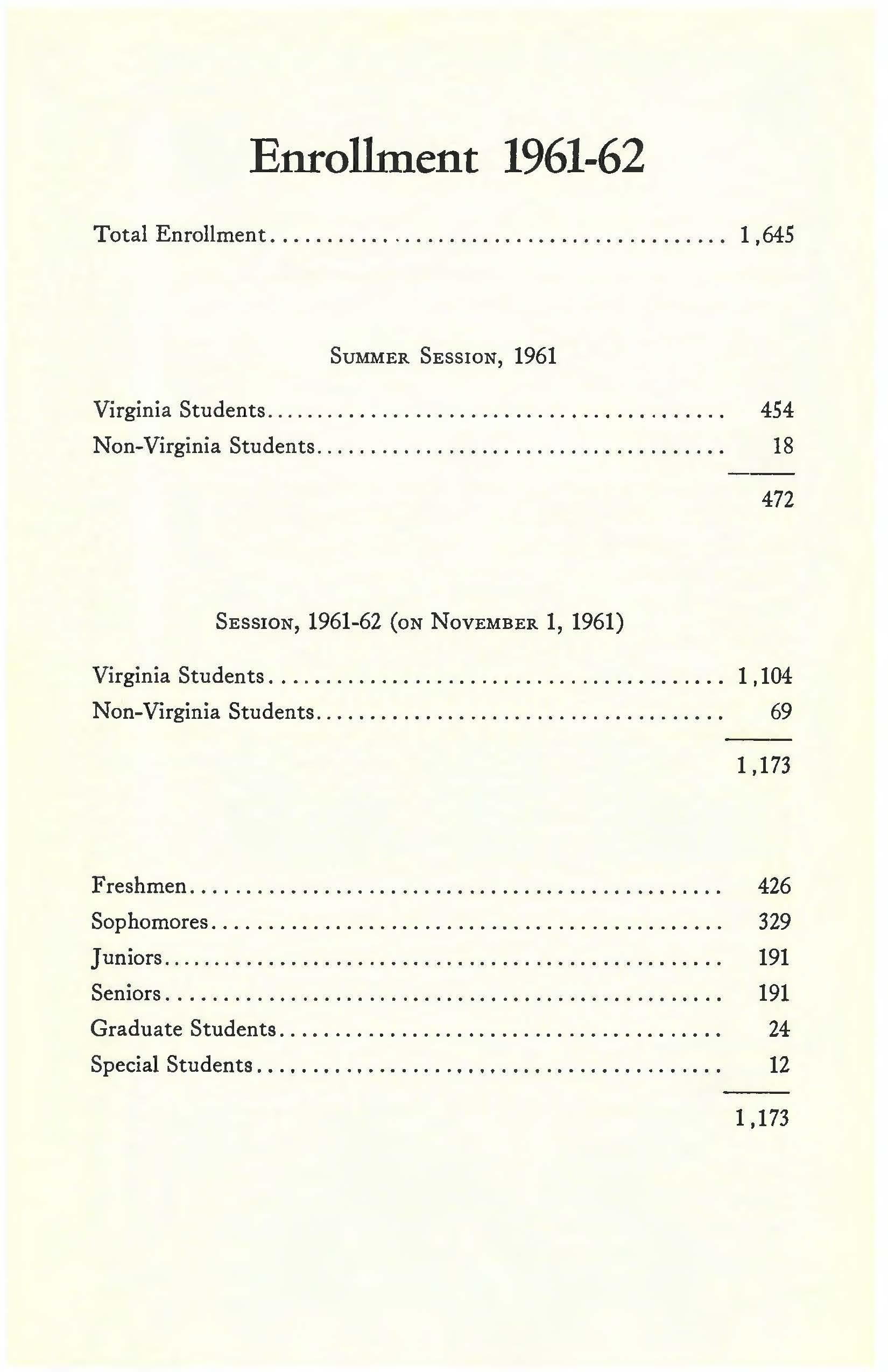
Virginia Students. . . . . . . . . . . . . . . . . . . . . . . . . . . . . . . . . . . . . . . . . 1 , 104 Non-Virginia Students..................................... 69 1,173
Freshmen. . . . . . . . . . . . . . . . . . . . . . . . . . . . . . . . . . . . . . . . . . . . . . . . 426 Sophomores. . . . . . . . . . . . . . . . . . . . . . . . . . . . . . . . . . . . . . . . . . . . . . 329 Juniors................................................... 191 Seniors. . . . . . . . . . . . . . . . . . . . . . . . . . . . . . . . . . . . . . . . . . . . . . . . . . 191 Graduate Students. . . . . . . . . . . . . . . . . . . . . . . . . . . . . . . . . . . . . . . . 24
Special Students. . . . . . . . . . . . . . . . . . . . . . . . . . . . . . . . . . . . . . . . . . 12 1,173
Absences.......................... 54 Course changes.................... 52 Academic and professional life....... 34 Course numbers................... 51 Academic honors................... 58 Credits........................... 52 Academic regulations 51 Accreditation ......... ........... .. 1, 22 Adjustments in curriculum requirements ............ , . . . . . . . 52
Cultural, social and recreational life.... . . . . . . . . . . . . . . . . . . . . . . . . . 32 Day students....... .............. . 42 Departments of instruct ion ..••.... , 79 Administrative officers.... 6 Dining room ..... , .. , .. ,,, ... ,.,.,, 18 Administrative offices . . . . . . . . . . . . . • 18 Diploma fee....................... 44 Admission requirements............. 25 Advanced standing................. 53 Alumnae Association ..............• 117 Application blank.. . . . . . . . . . . . . . . . . 123 Application fee , , , 43 Art............................... 81 Athletic Association................ 36 Athletic facilities................... 18 Auditorium....................... 19 Auditor's fee....................... 43 Band............................. 38 Biology .••....•••...........•. , ll0 Board, room, laundry, fees. , . , , , , , , , 41 Book Shop , •• , •..... ,.,,. 18
Dormitories ......•...•..•••• , 20 Dramatics , ....••.... , .•..•.... 38, 93 Economics. . . . . . . • • . • • . • . . • . . . . • . . 99 Education......................... 86 Educational Objecti ves. , , , 15 Employment. .......•..• , 46 English , •...... , , 90 Enrollment 1961-62 •••••....•••.... 119 Examinations ,44, 58 Expenses.......................... 41 Faculty, college ..•....••.••.••... ,. 8 Financial assistance • • . • • • • • . • . • . . . . 45 Foreign languages ... , ... , ... ,,,.... 95 French ...•.....•... , ... , .. , . , , . . . . 96
Business education .. , . , .. , .... , .. , . 83 Freshman Year ........ , , ........ , , 60 Calendar, 1962-63 .................. 2, 3 Campus ........................... 18 Campus Bank..................... 45
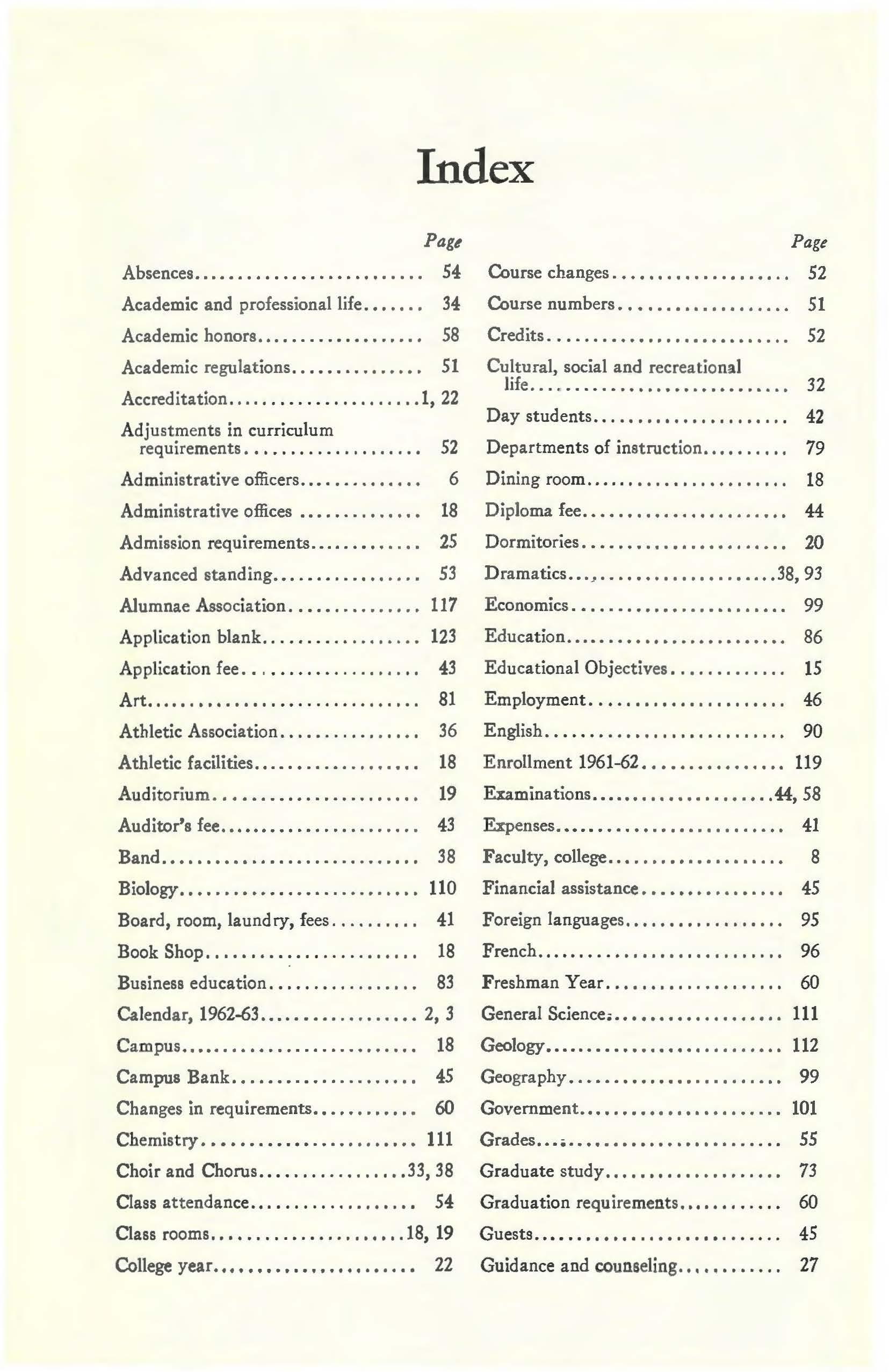
Changes in requirements.. . . • . . . • . . • 60 Chemistry. • • • • • • • • • 1 ll Choir and Chorus ,,,, ,,, 33, 38 Class attendance ........... ,.,..... 54 Class rooms ...................... 18, 19 College year ........... , , • , • , . , . . . • 22
General Science, , ,.,,,,., 111 Geology. . . . .. . . . • • • . • • • • • . . . . . . • . . ll2 Geography ..•...•••.••• , , , 99 Government .•••.••• , ••• , • • • . . . . . . . 101 Grades ,........................ 55 Graduate study., ...••..•...••.. , , 73 Graduation requirements .• ,......... 60 Guests ....................... ,.. .. 45 Guidance and counseling ,,,....... 27
Page
Gymnasium suits. • • • 44 Health service ,............ 28
History and social sciences . . . . . . . . . . 98
History of the college............... 16
Home economics ...•.....•......... 103 Home management house........... 20
Honor Code ........... ,.,,,,...... 35
Honor societies. . . . . . . . . . . • • .. . . . . . 36
Philosophy. • • • • • • • • 87 Physical and health education ....... 113 Physics ......................•.... 112 Placement service.................. 29 Post office. . • . • • . . • • • . . . . . . . . . . . . . . 18
Prerequisites for student teaching.... 57 Programs of study. . . . . . . . . . . . . . . . . 63 Psychology... . . . . . . . . . . . . . . . . . . . . . 86
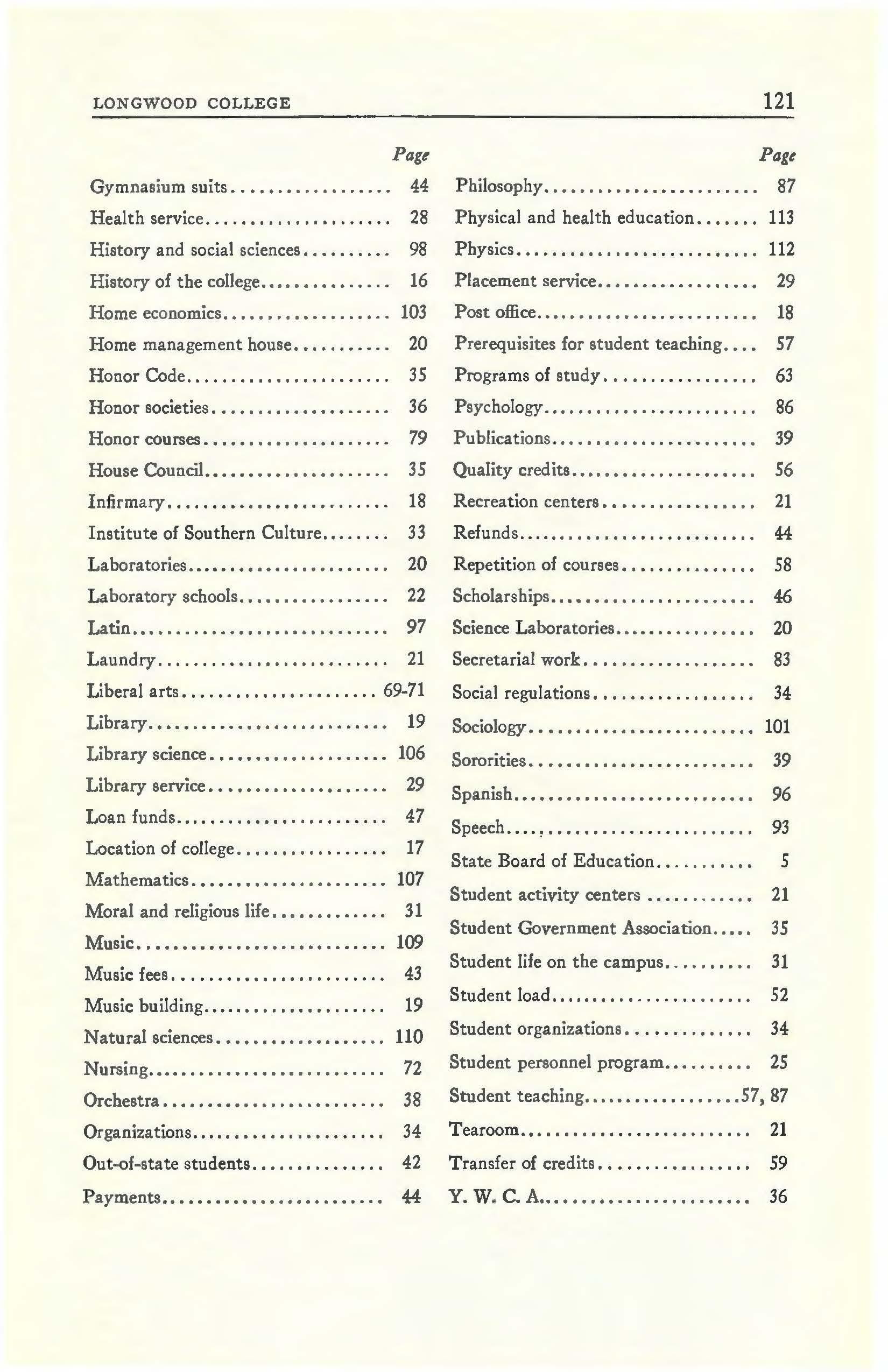
Honor courses..................... 79 Publications....................... 39
House Council..................... 35 Infirmary.................... . . . . . 18 Institute of Southern Culture........ 33 Laboratories....................... 20 Laboratory schools................. 22 Latin 97 Laundry .. , ....... , , .. , .. , . . . . . . . . 21
Liberal arts. , ..... , , .. , •. , ....... 69-71
Library........................... 19 Library science. • • • 106 Library service. • • • • • .. .. • .. .. . .. .. 29
Loan funds........................ 47
Location of college. 17 Mathematics ...................... 107 Moral and religious life............. 31 Music •.•••...••.•••••..•••....... 109 Music fees ........•... , ,,...... 43 Music building..................... 19 Natural sciences .•• , 110 Nursing........................... 72 Orchestra • • • • • • 38 Organizations...................... 34 Out-of-state students............... 42
Quality credits..................... 56 Recreation centers.. • • • 21 Refunds........................... 44 Repetition of courses. . . . . . . . . . . . . . . 58 Scholarships....................... 46 Science Laboratories................ 20 Secretarial work. . . . .. . . . . . . • . .. . .. 83 Social regulations.................. 34 Sociology. . • . • • • . • • • • . . . . . . . . . . • . • 101 Sororities. . • • • • • . . • • • . . . • . . . . . . . . • 39 Spanish .••••••••.••••........• ,... 96 Speech .... ,....................... 93 State Board of Education........... 5 Student activity centers • 21 Student Government Association..... 35 Student life on the campus.......... 31 Student load.. • 52 Student organizations. . . . . . . . . . . . . . 34 Student personnel program... • 25 Student teaching .................. 57, 87 Tearoom.......................... 21 Transfer of credits . . . . . . . . . . . . . . . • . 59 Payments......................... 44 Y. W. C. A........................ 36
Communications relative to general college policies should be addressed to the President of the College.
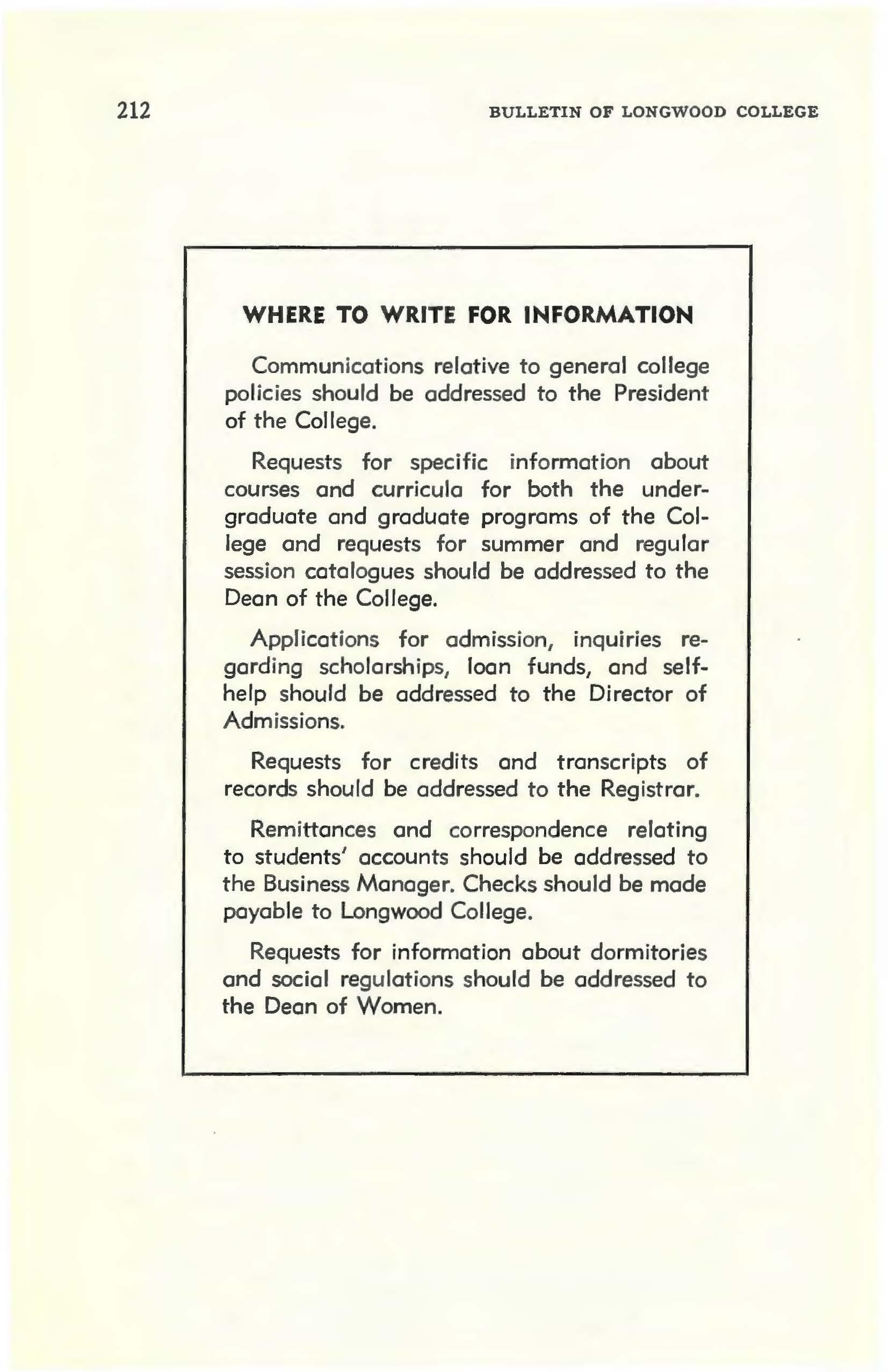
Requests for specific information about courses and curricula for both the undergraduate and graduate programs of the College and requests for summer and regular session catalogues should be addressed to the Dean of the College.
Applications for admission, inquiries regarding scholarships, loon funds, and selfhelp should be addressed to the Director of Admissions.
Requests for credits and transcripts of records should be addressed to the Registrar.
Remittances and correspondence relating to students' accounts should be addressed to the Business Manager. Checks should be made payable to Longwood College.
Requests for information about dormitories and social regulations should be addressed to the Deon of Women.
Preliminary Application for Admission (Tilis application must be accompanied by a fee of $10.00)

Dat. ________________ Name (print) __________________________ fint middle last Street or R. F. D------------------------Town or City______________.....,ta....____________
Name of parent or guardiaJ.L-______________________
Name and address of high school from which you have been or will be graduated
Directions for
Fill out the _preliminary application above and mail it to the Director of Admissions, Longwood College, Farmville, Virginia.
Submit with the application an application fee of ten dollars. Send check or money order made payable to Longwood College. DO NOT send cash.
If you have attended any other colle~e or university, request that the registrar of that institution send an official transcnpt of your record,
Date of graduation from high schoo.____________ ,ames and addresses of college you have attend .....______________________ (ovu) ----------------------------------------------------------------------------.. ---2. 3. 4.
When the College receives the preliminary application, a detailed application blank will be mailed to you. This must be filled out and returned before the Committee on Admissions can begin its consideration of your application.
Will you be a boarding student? _____________________
Date that you wish to entel'.-----------------------
Have you taken the College Boaro Scholastic Aptitude Test?______R,ive your scores been sent to Longwood College?______
Your signatu.,_____________________________
